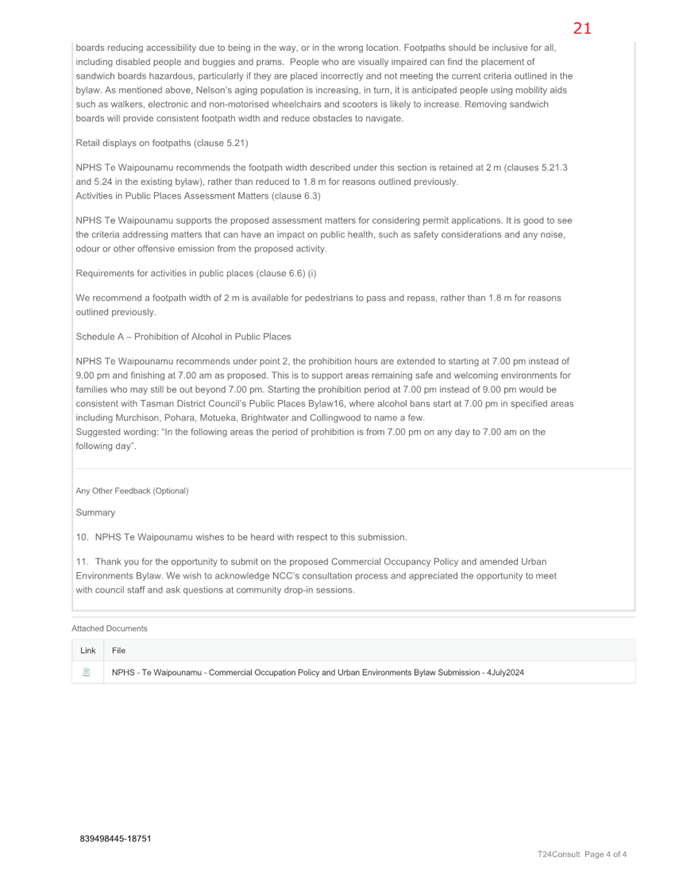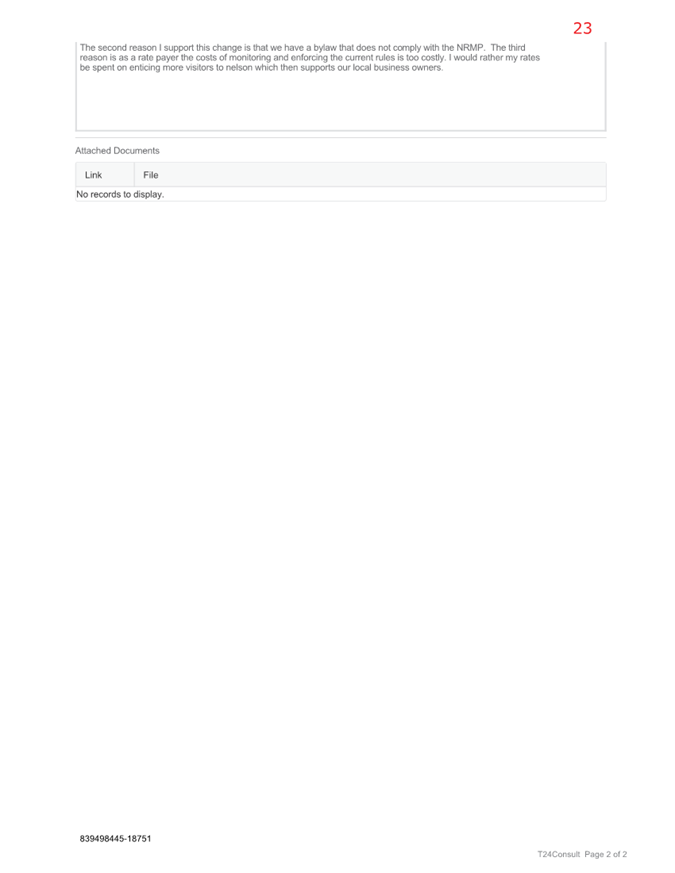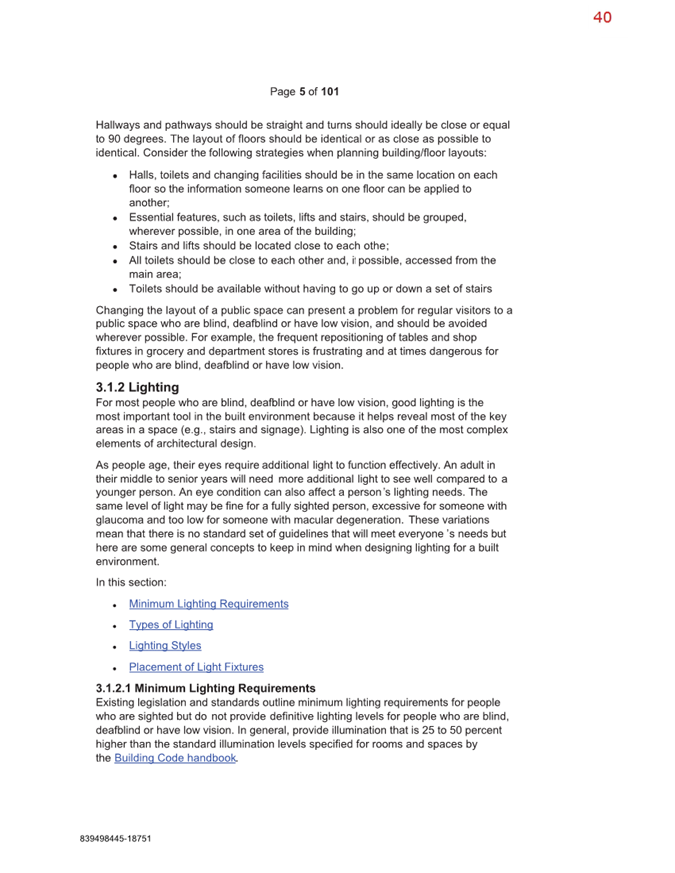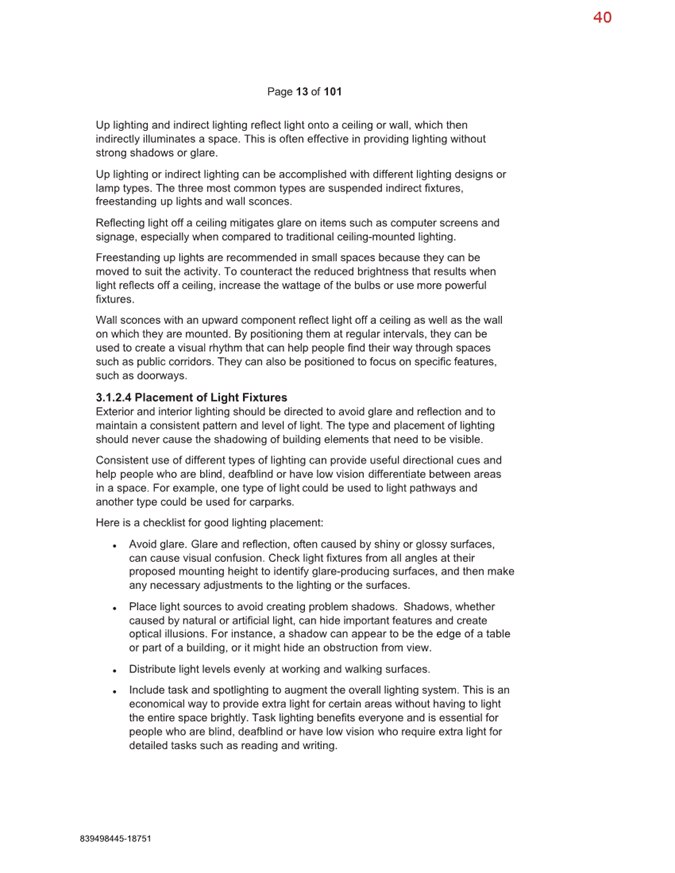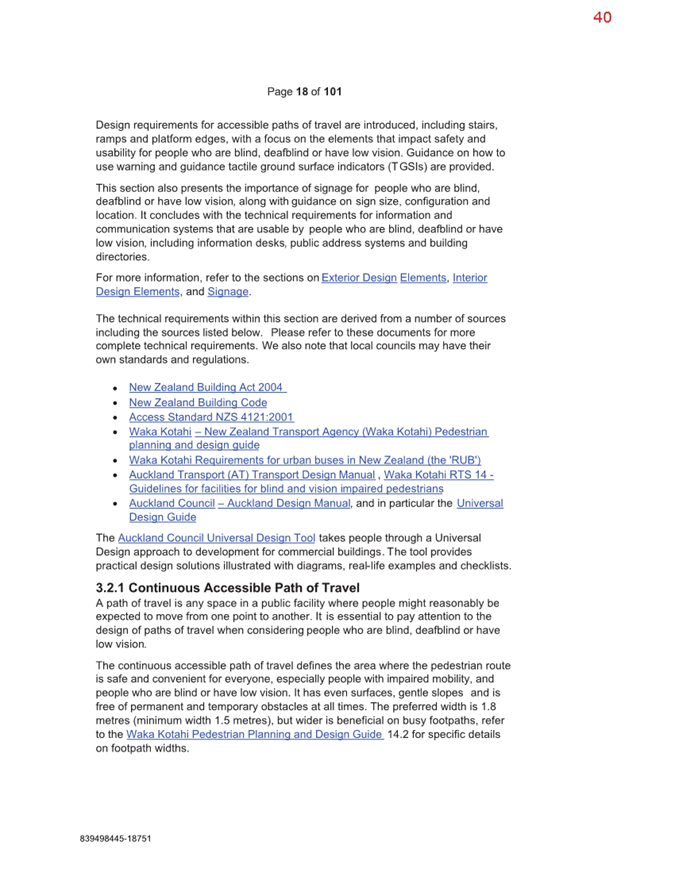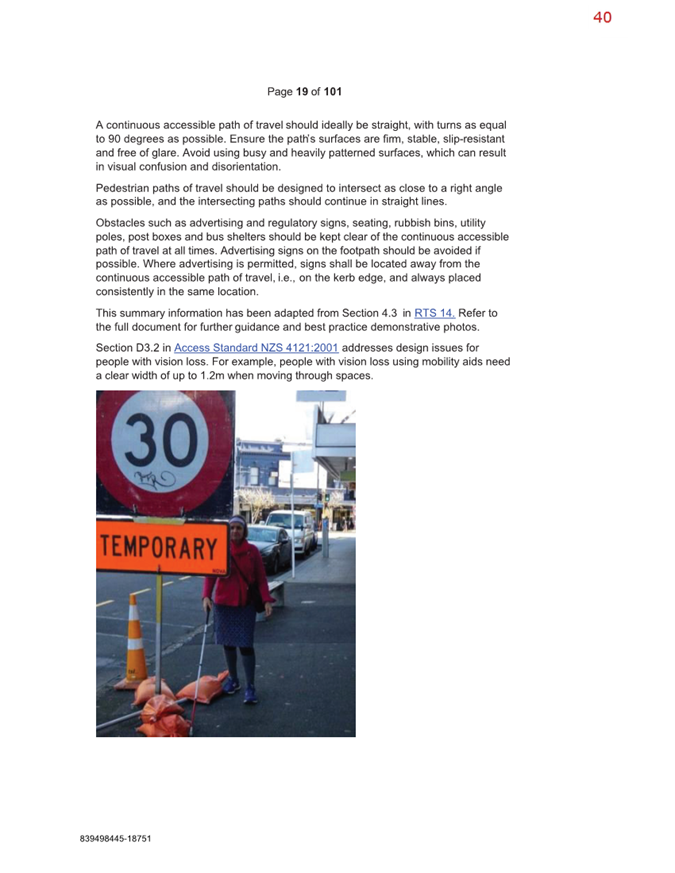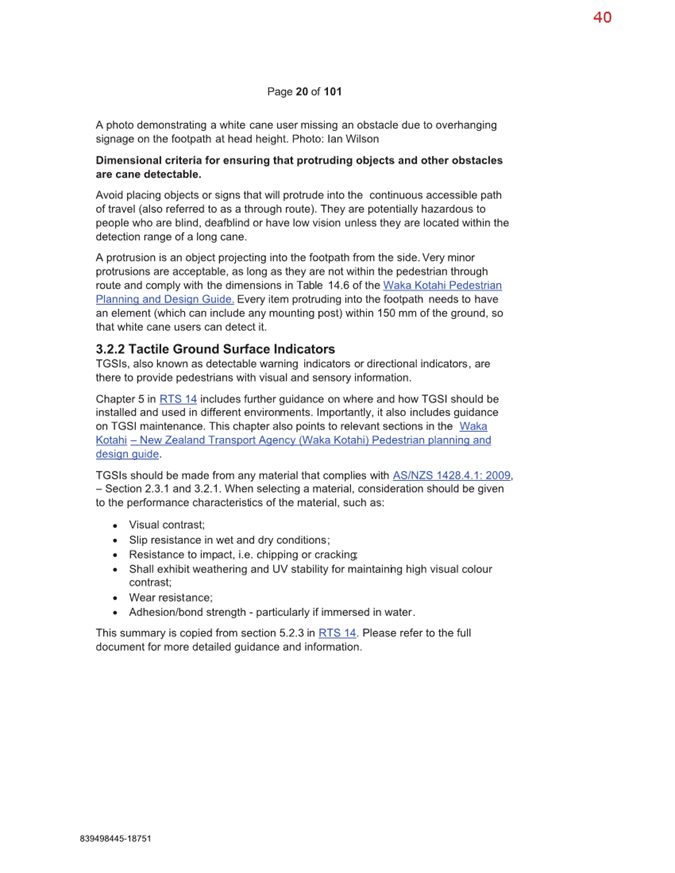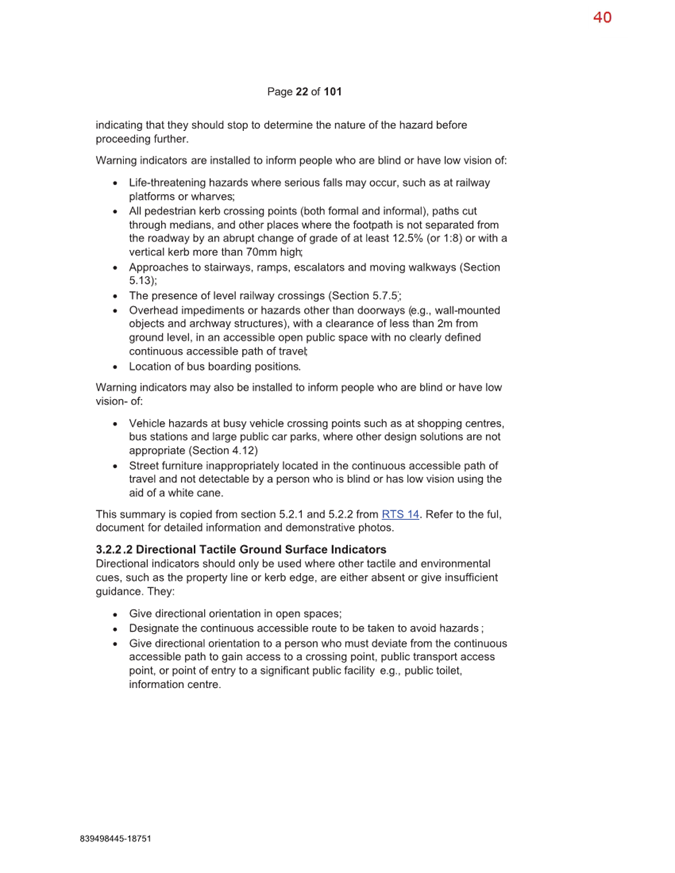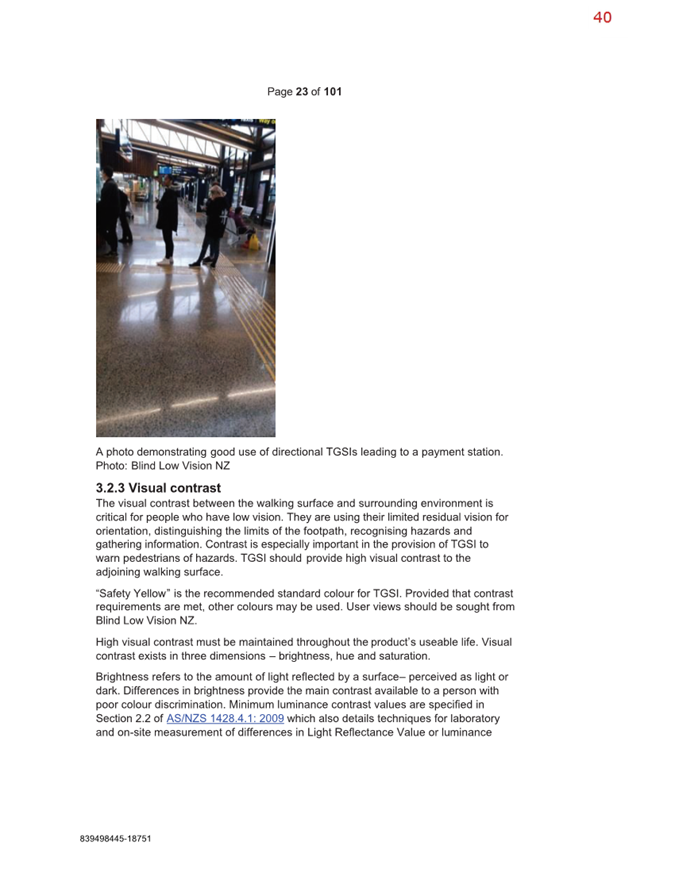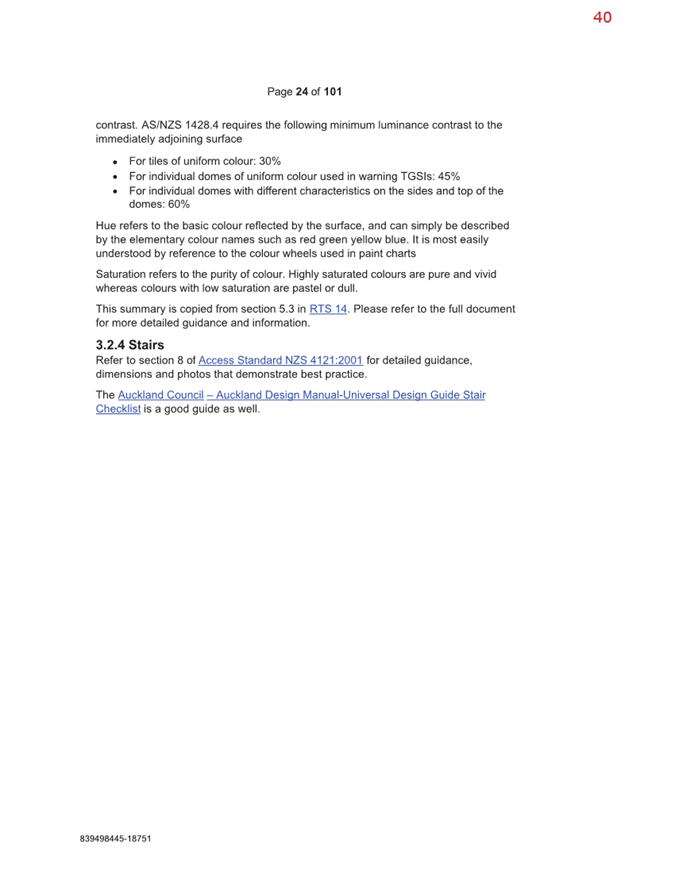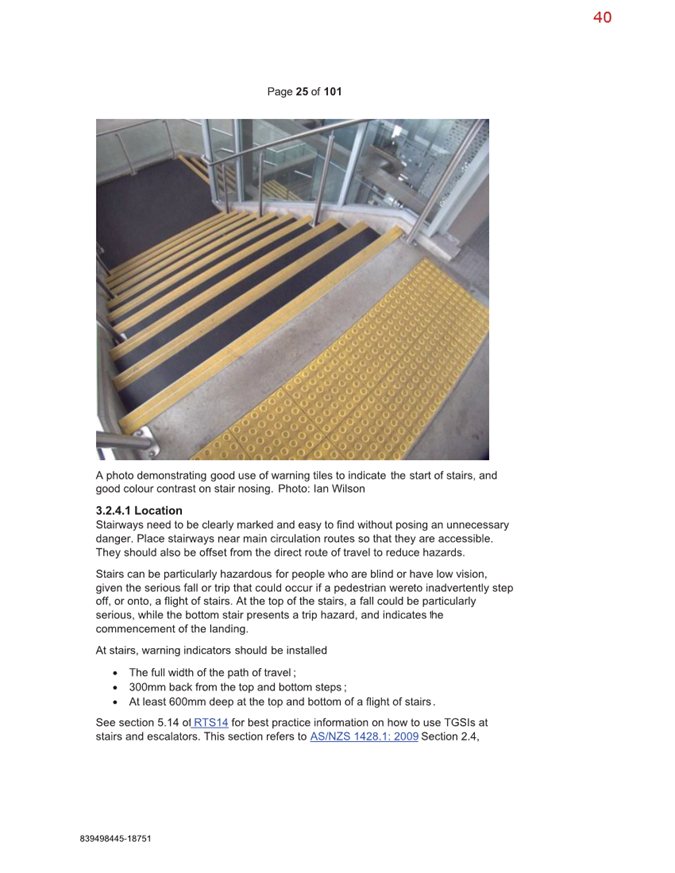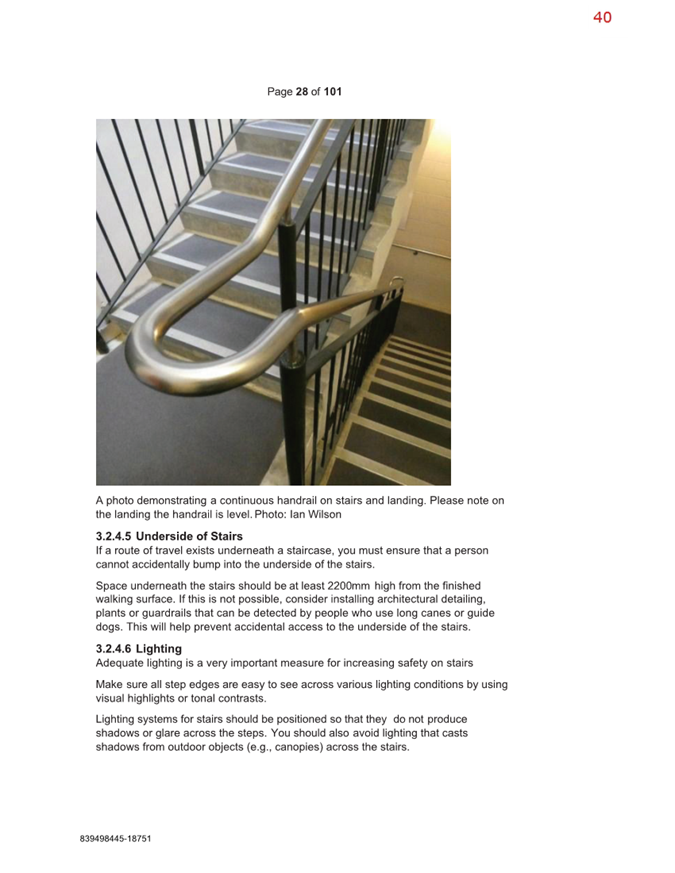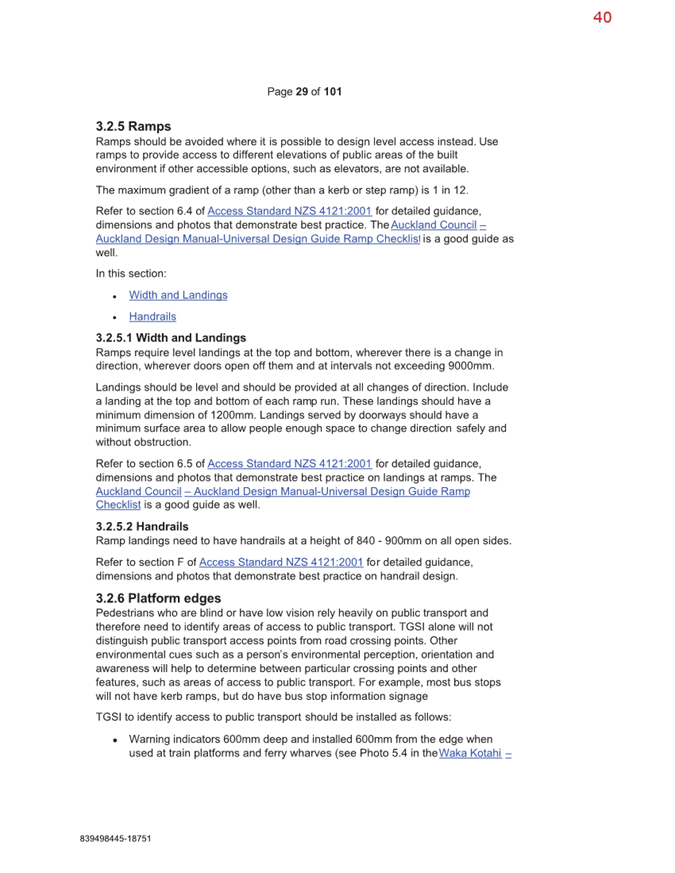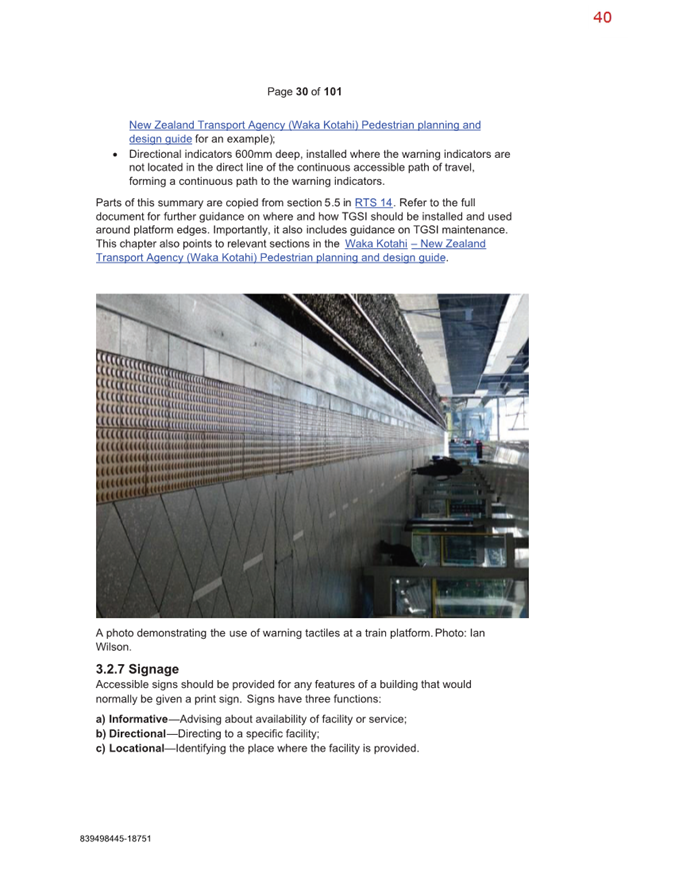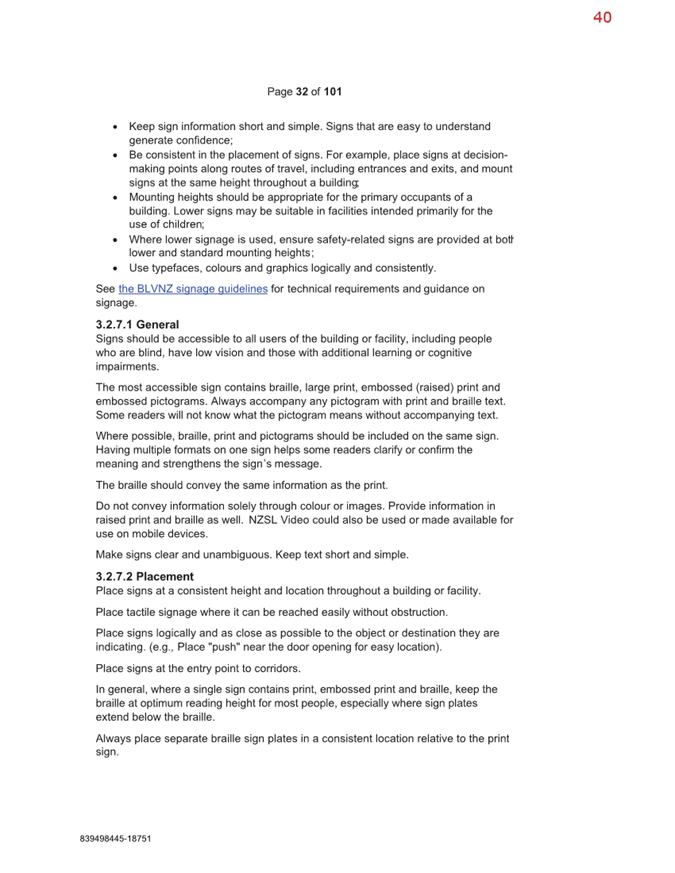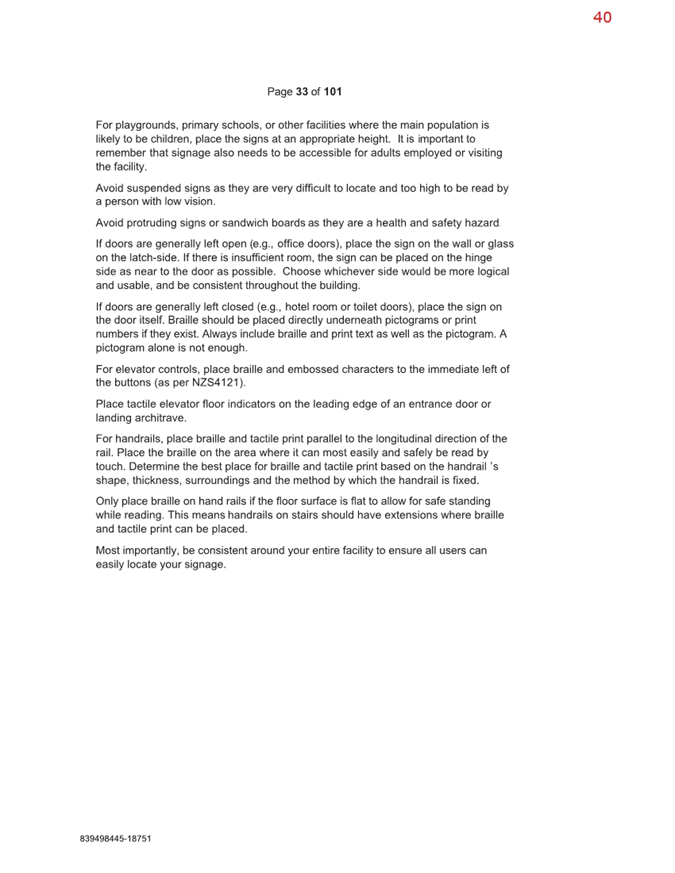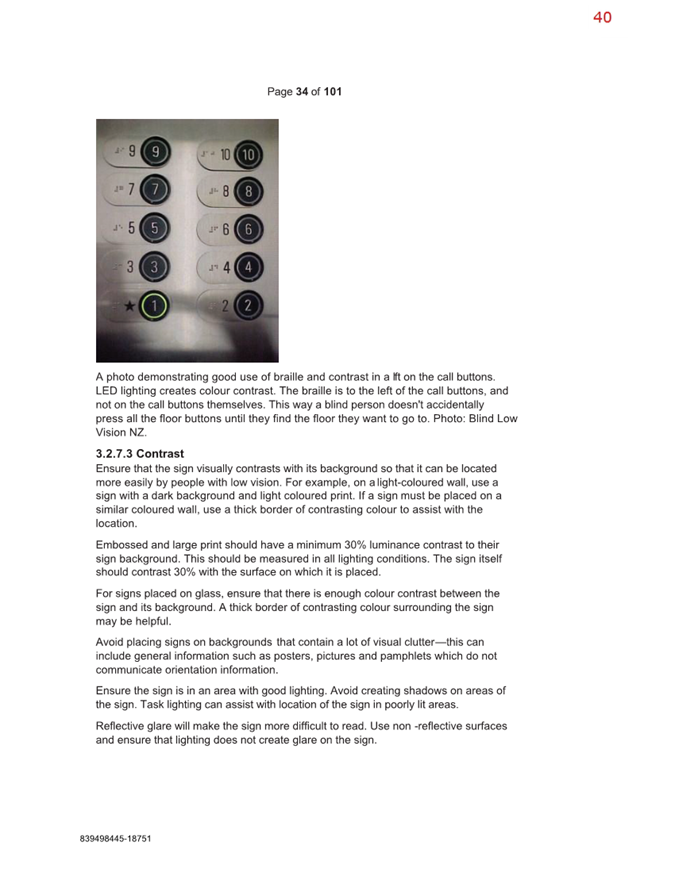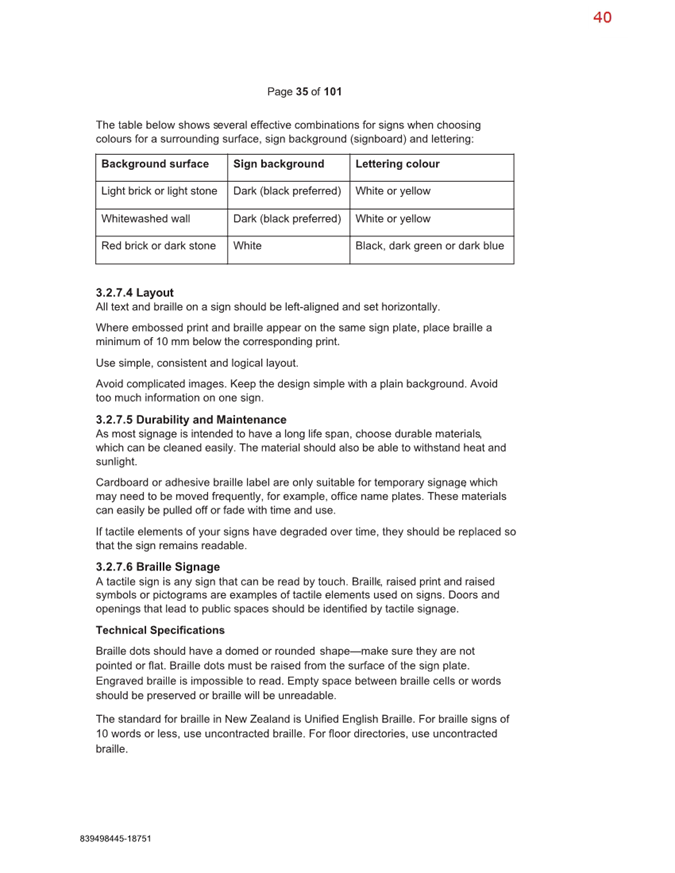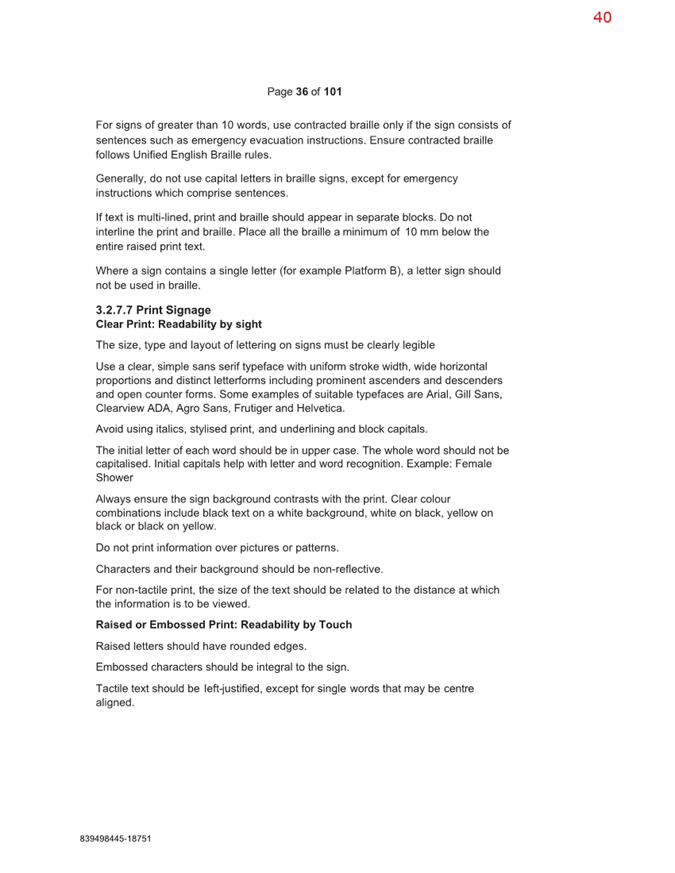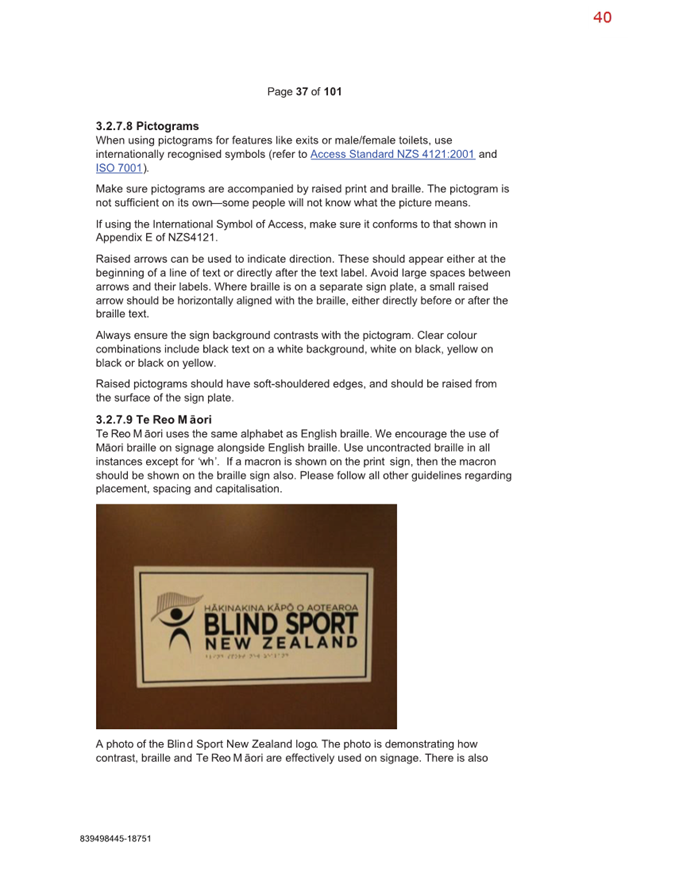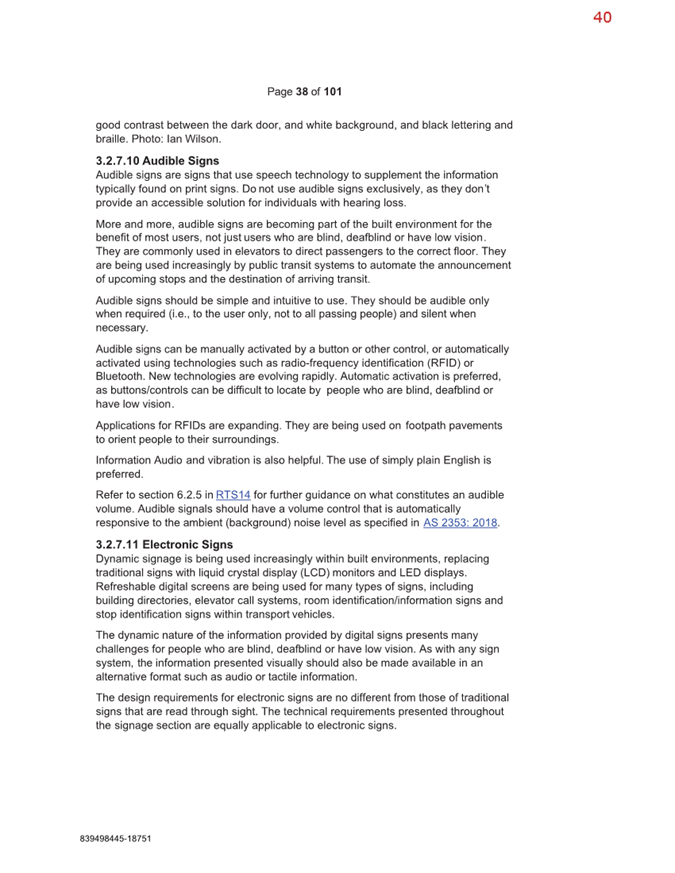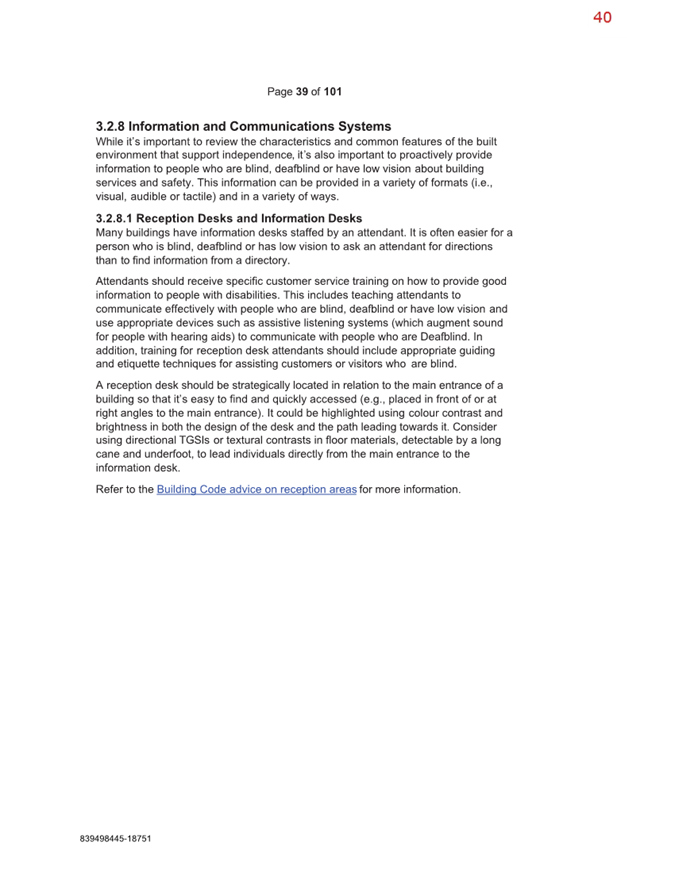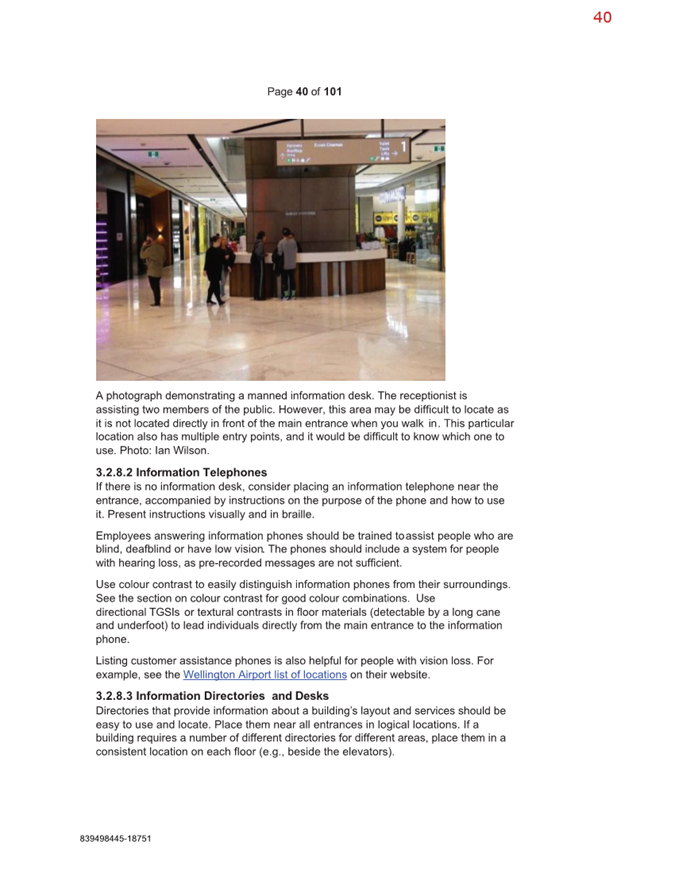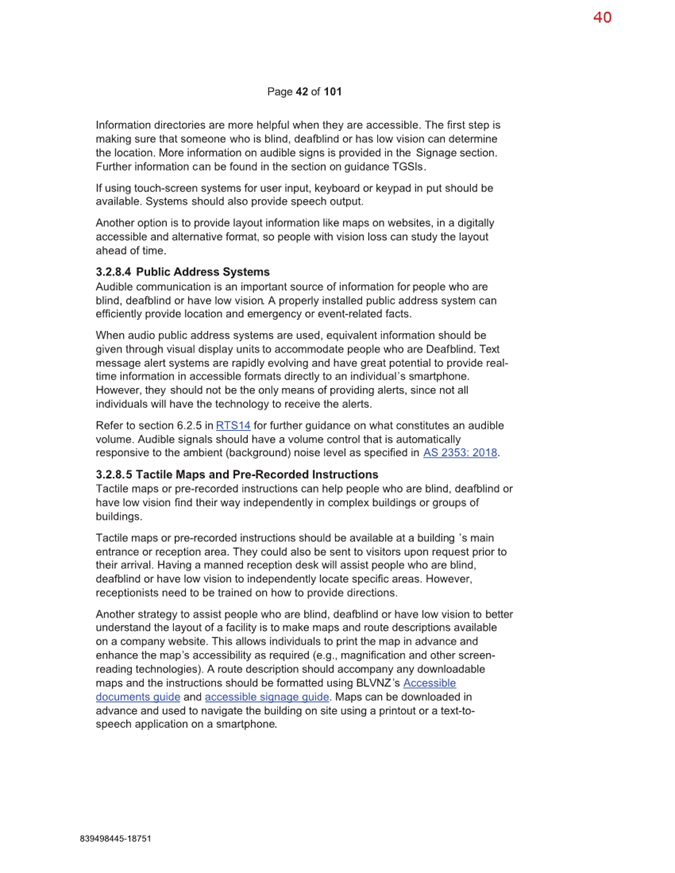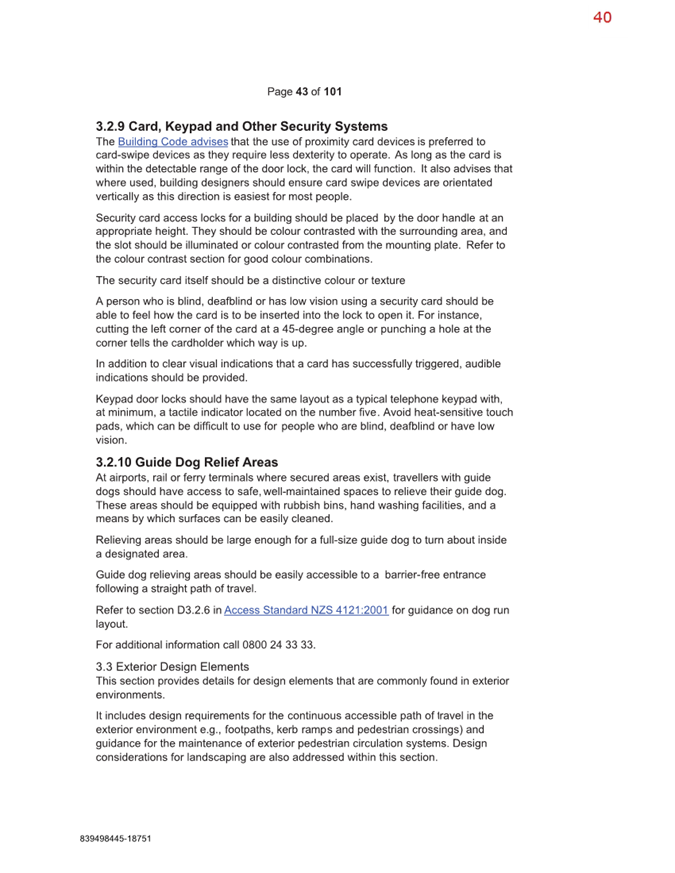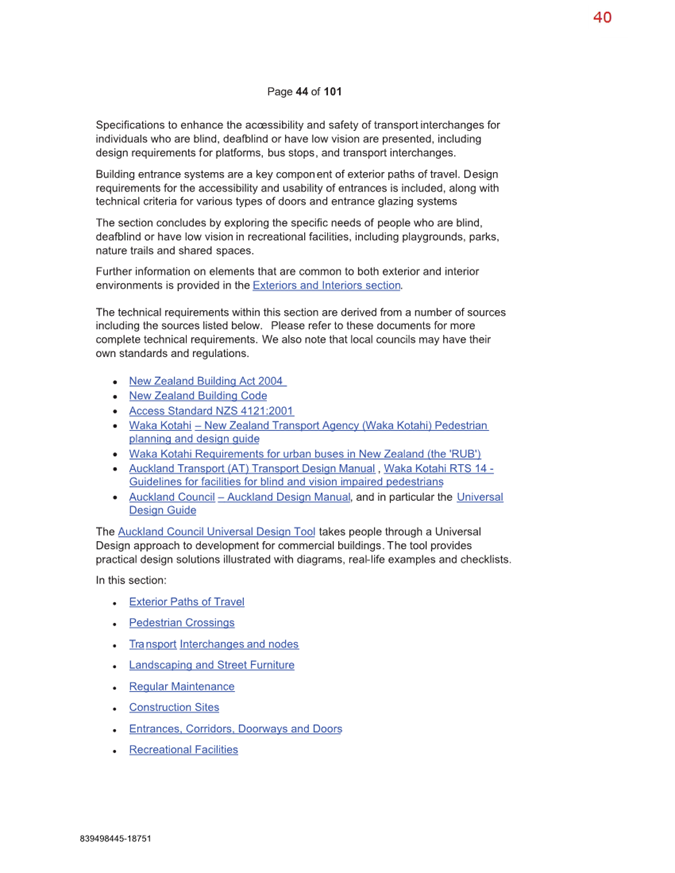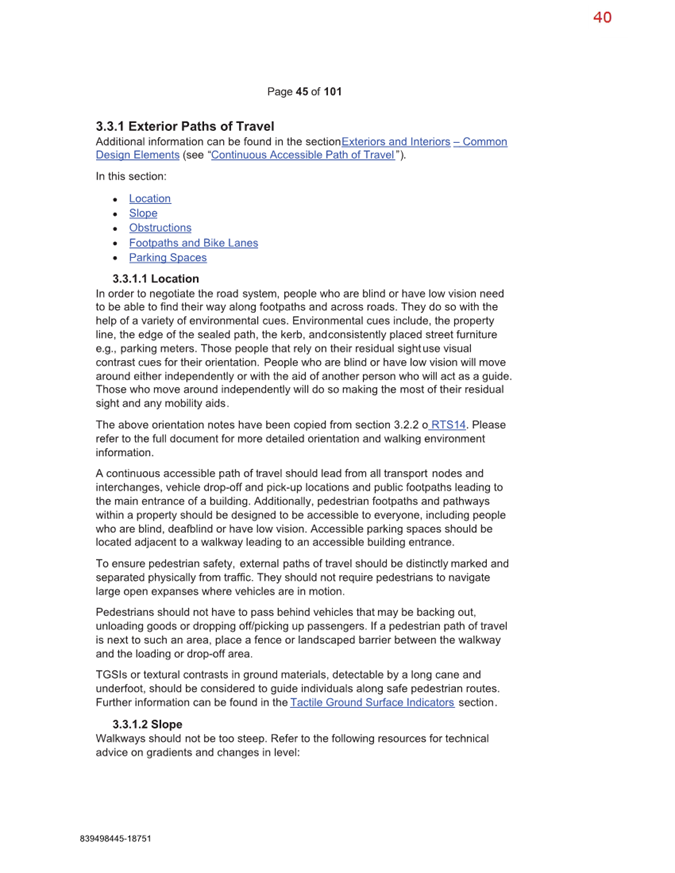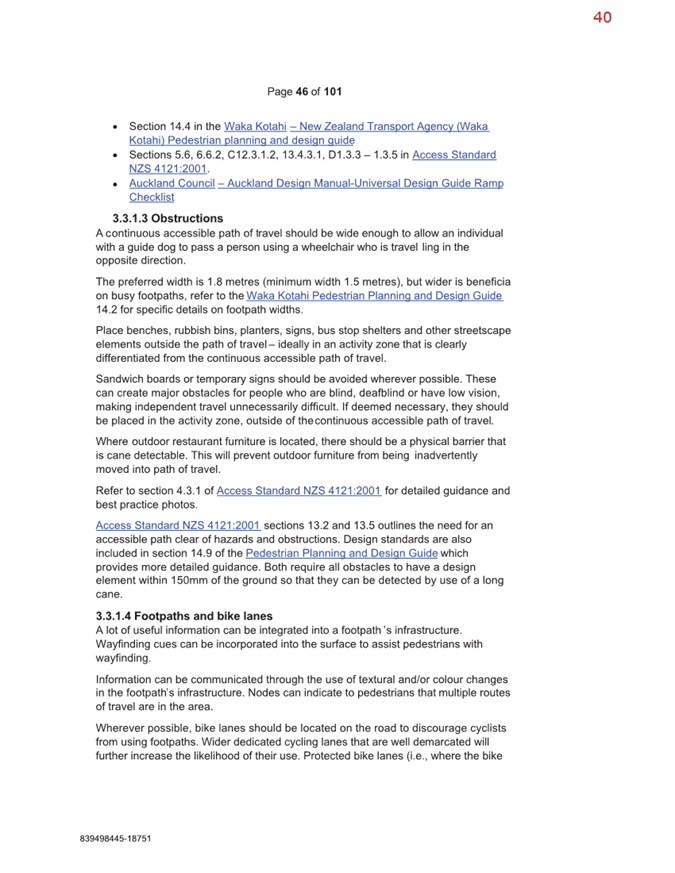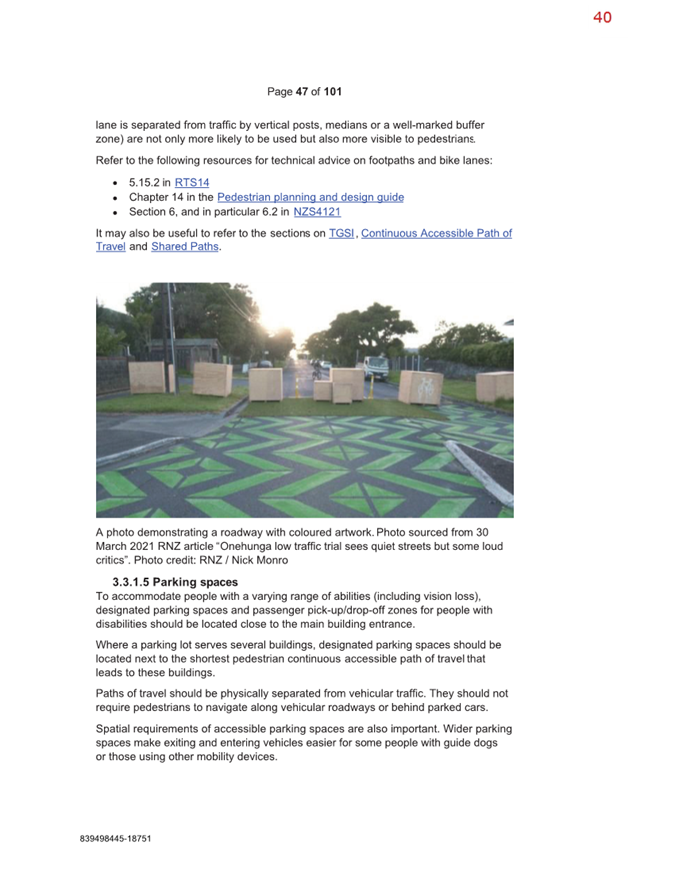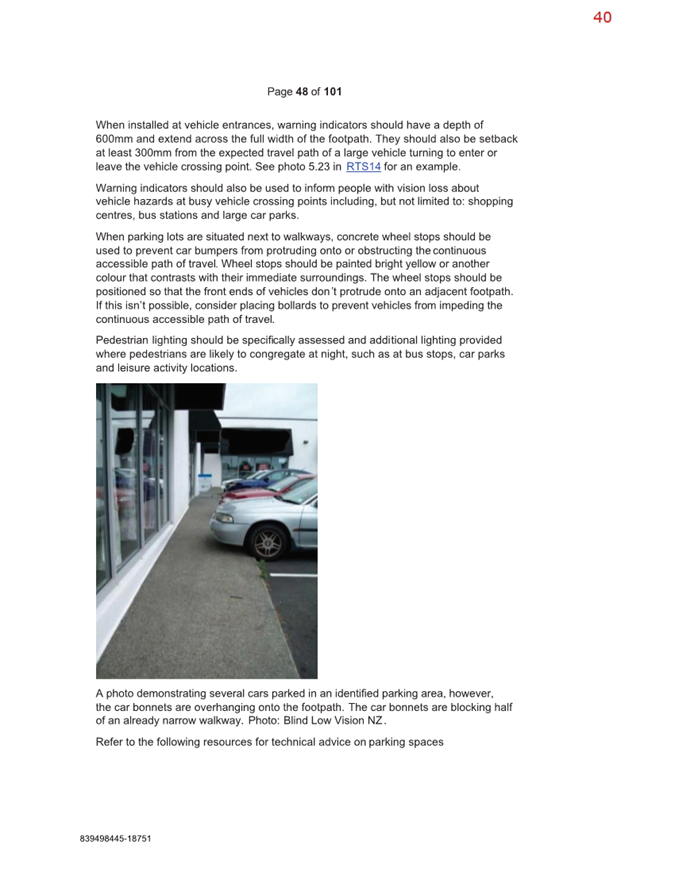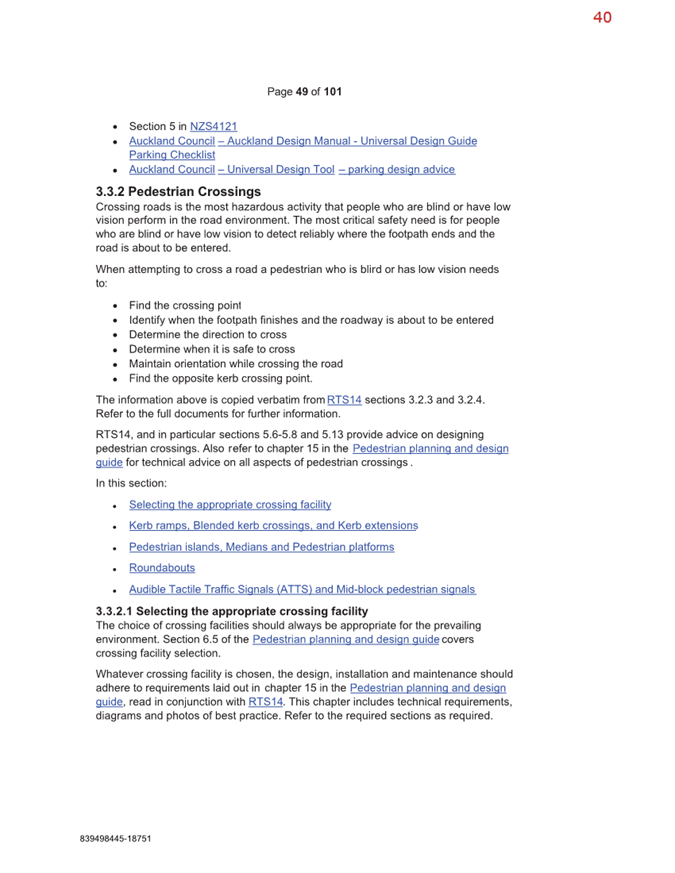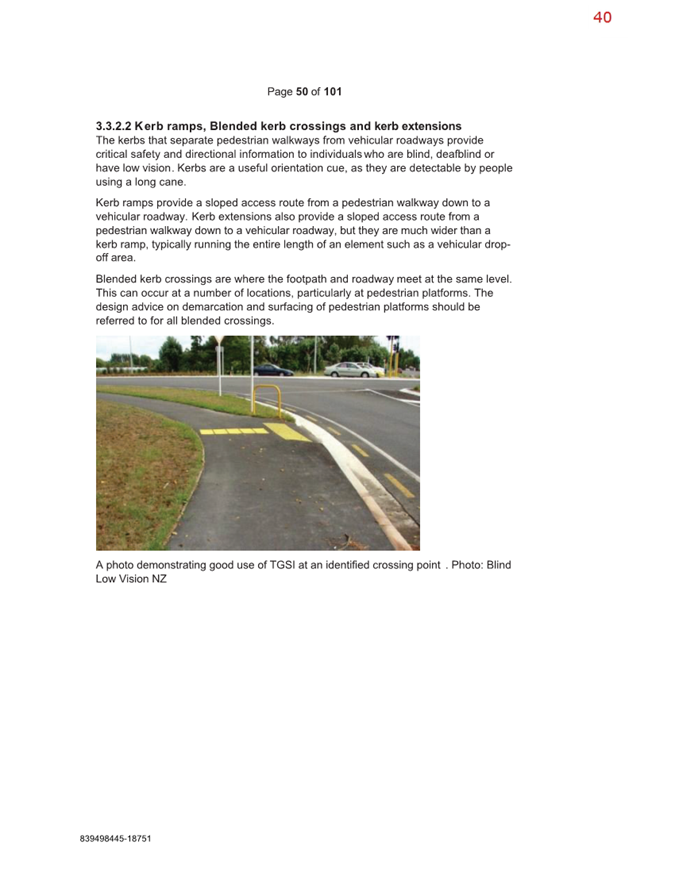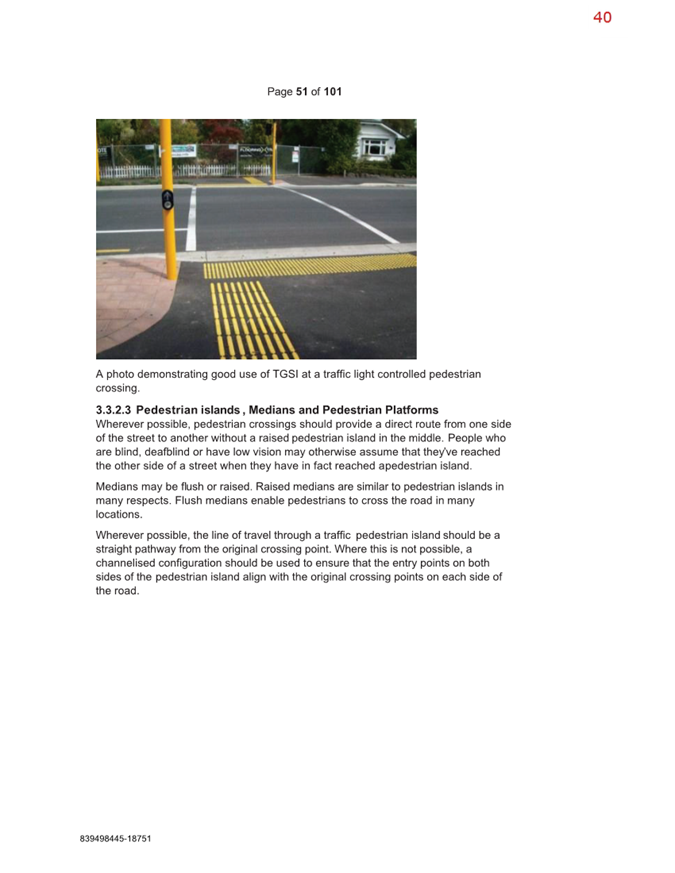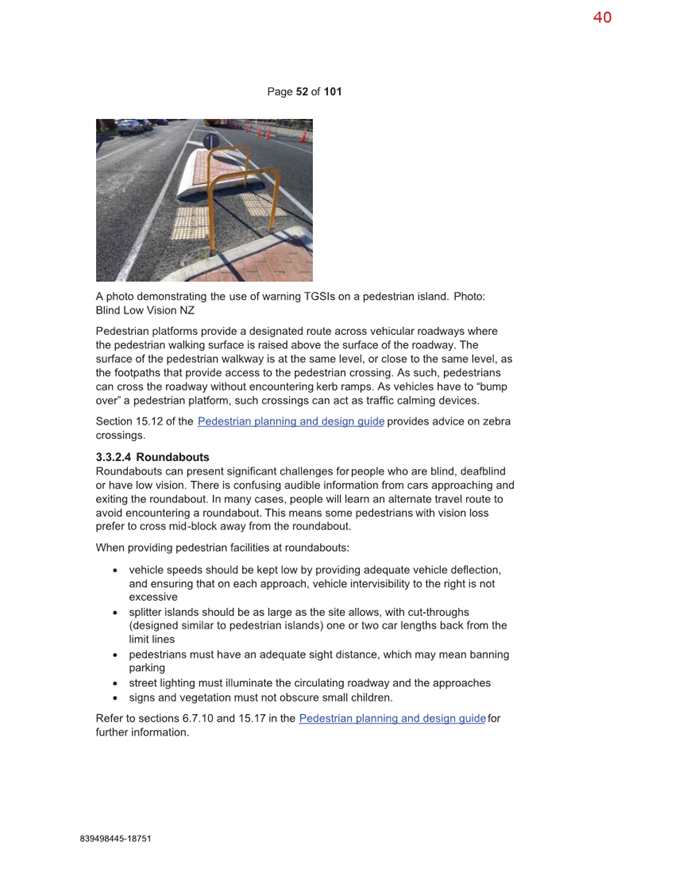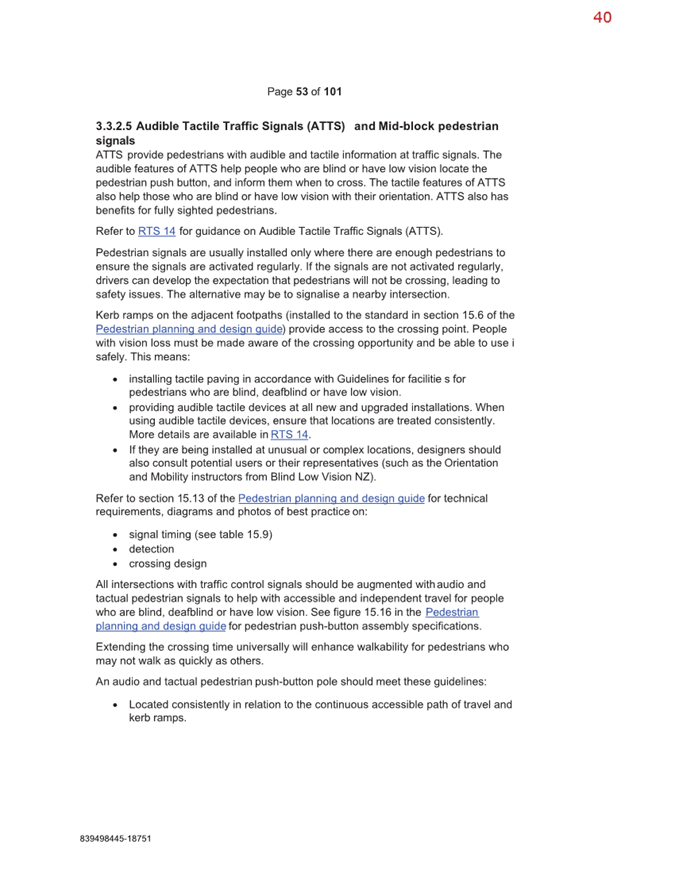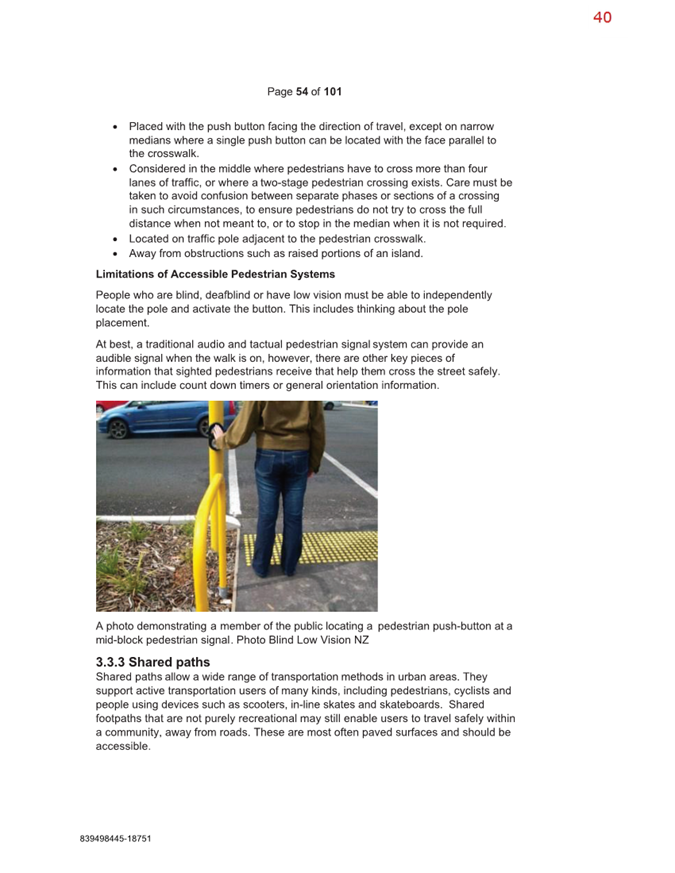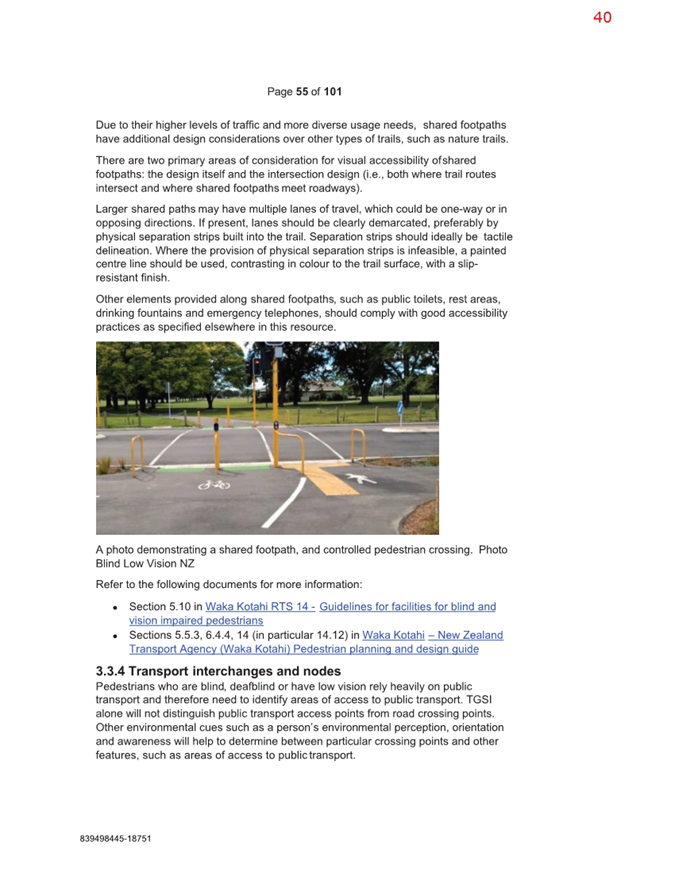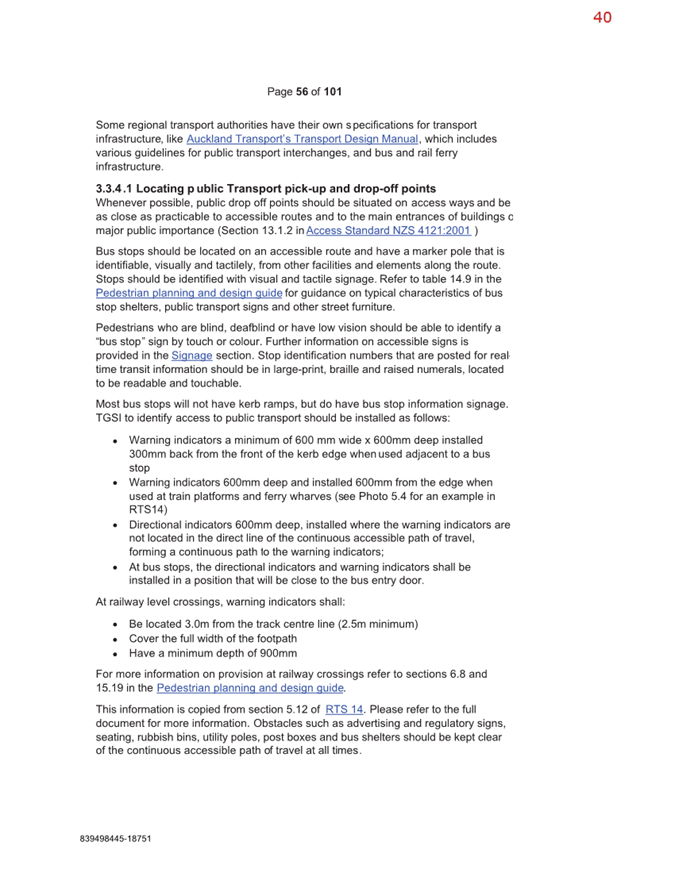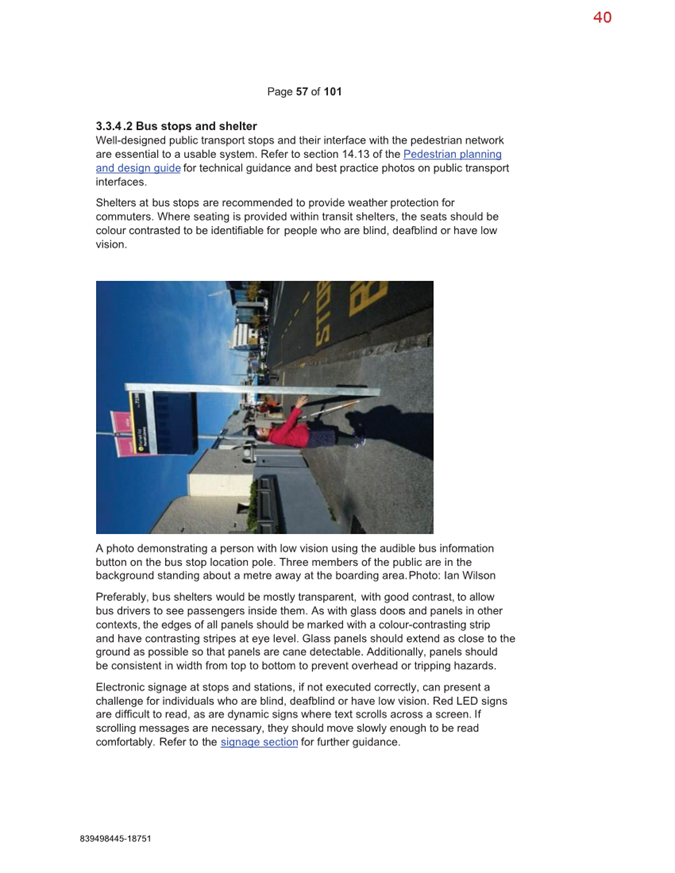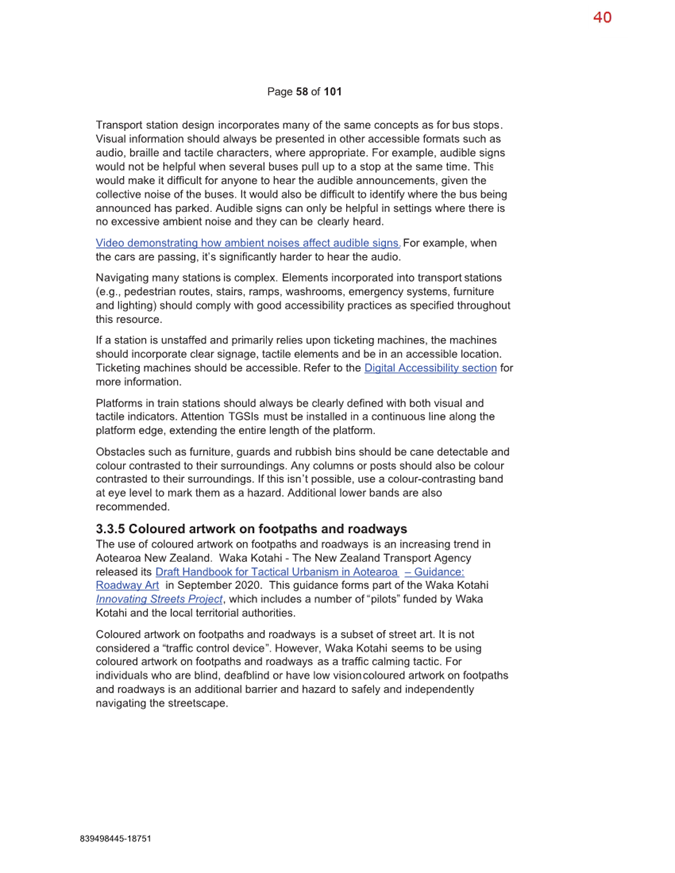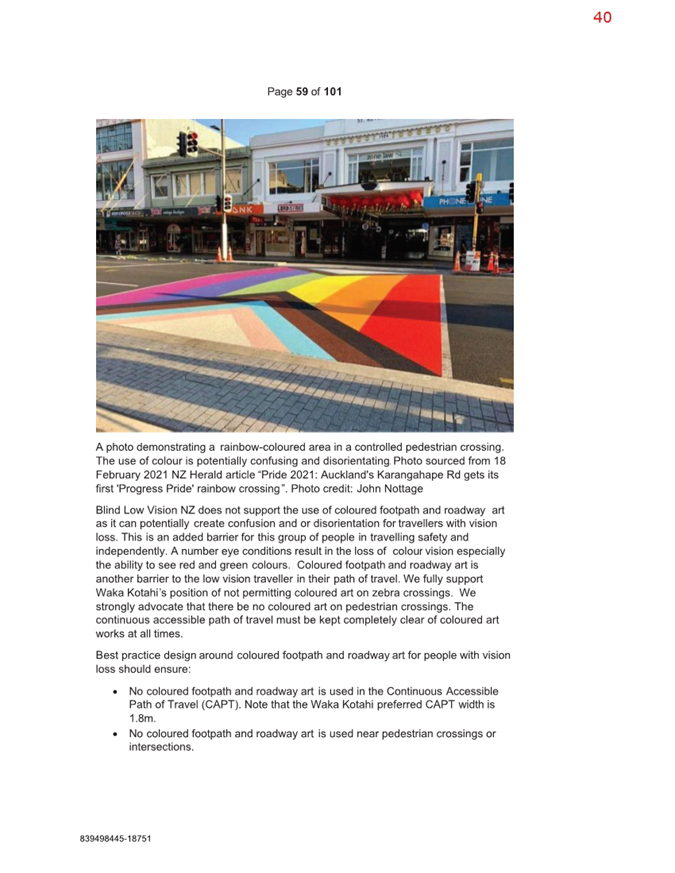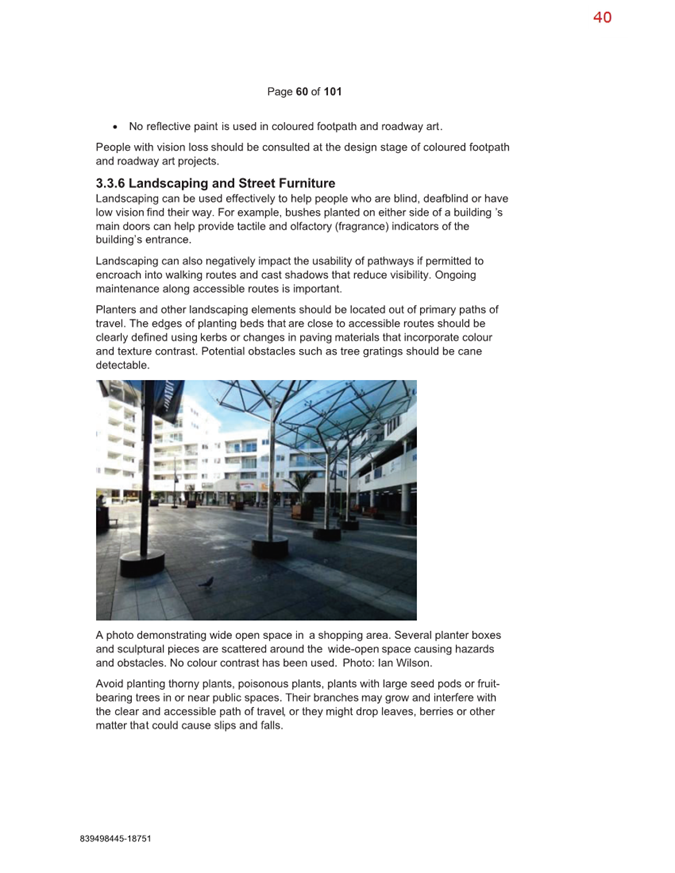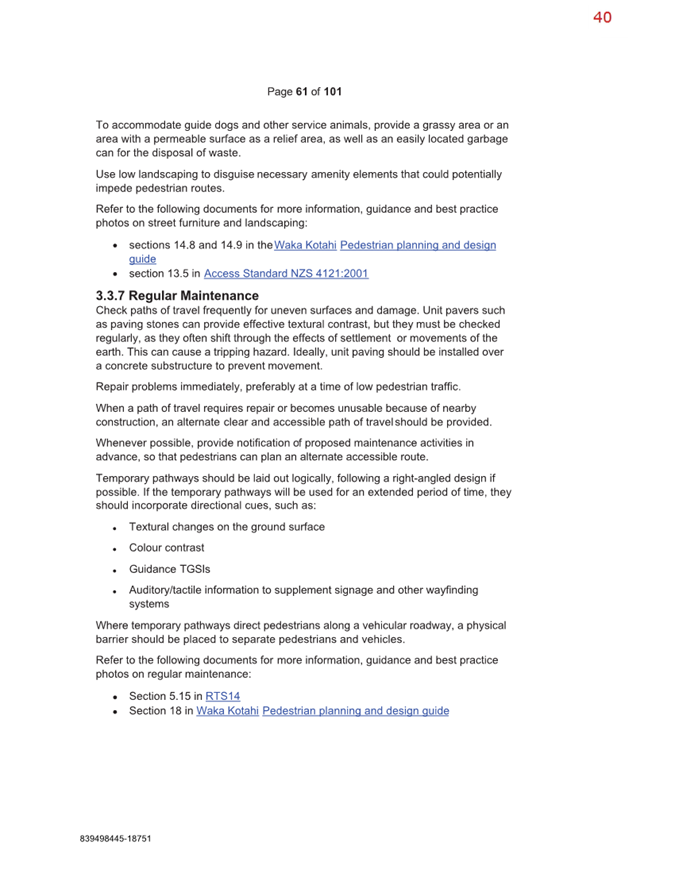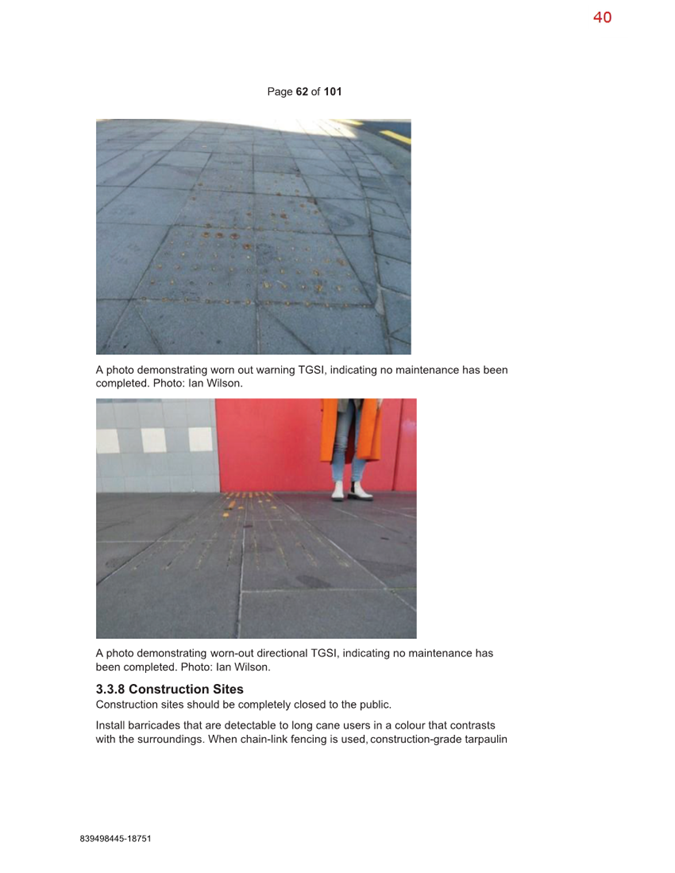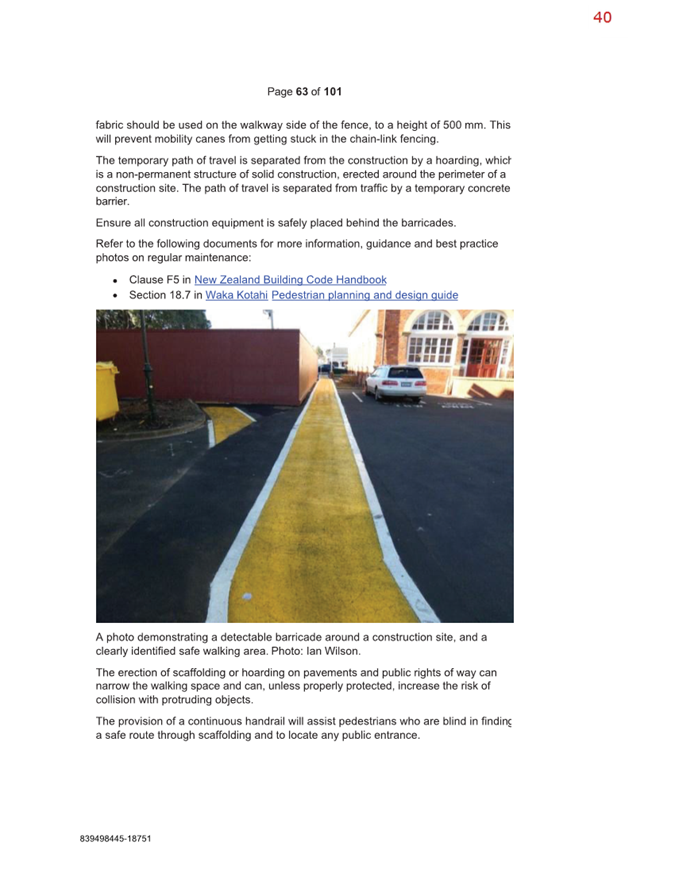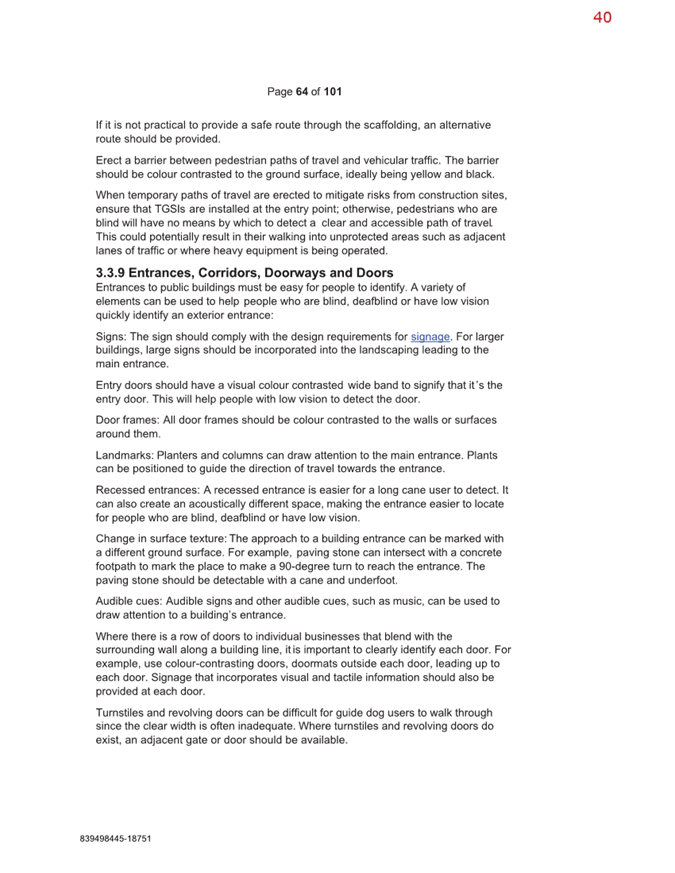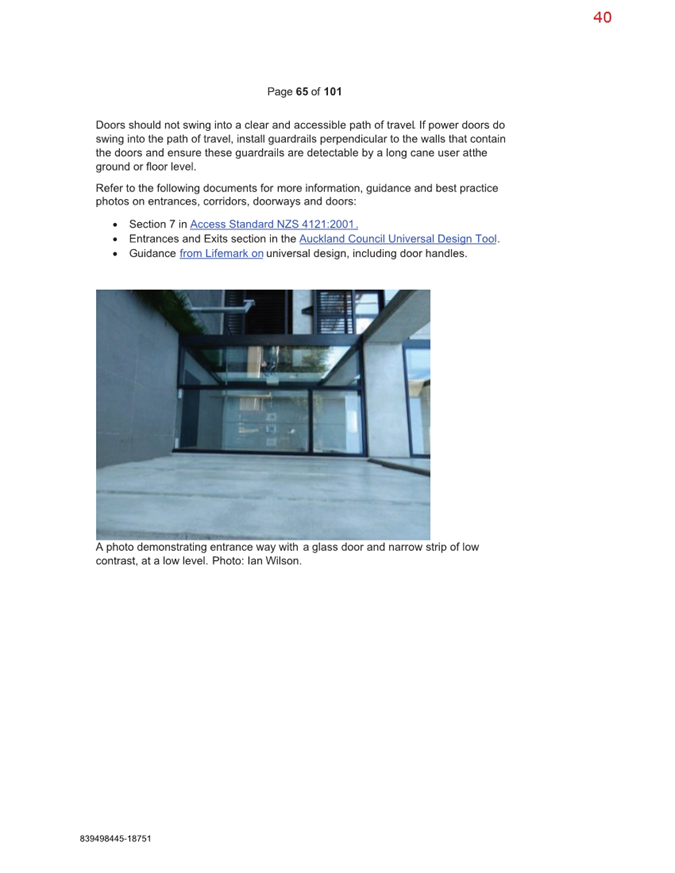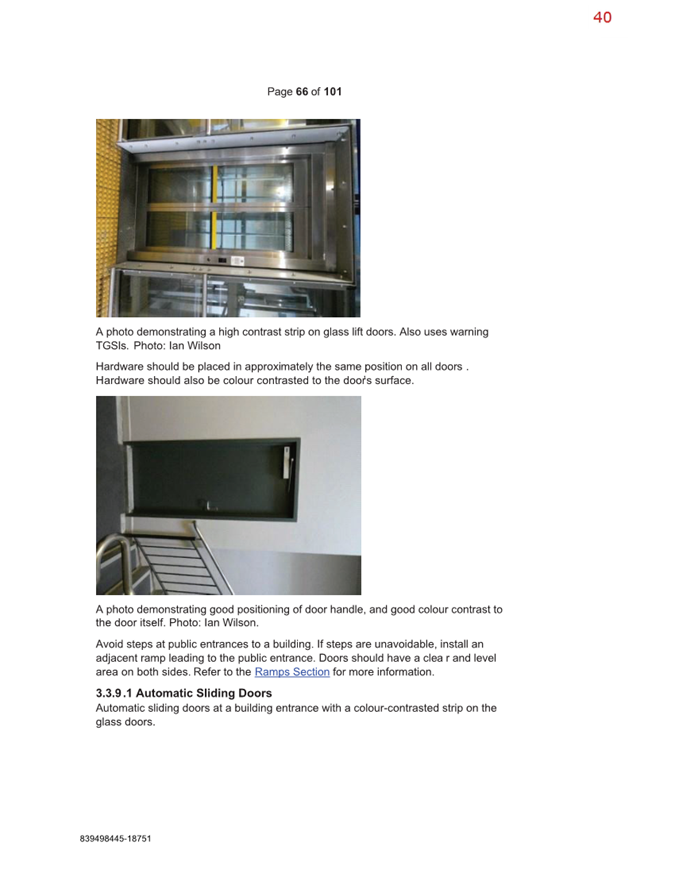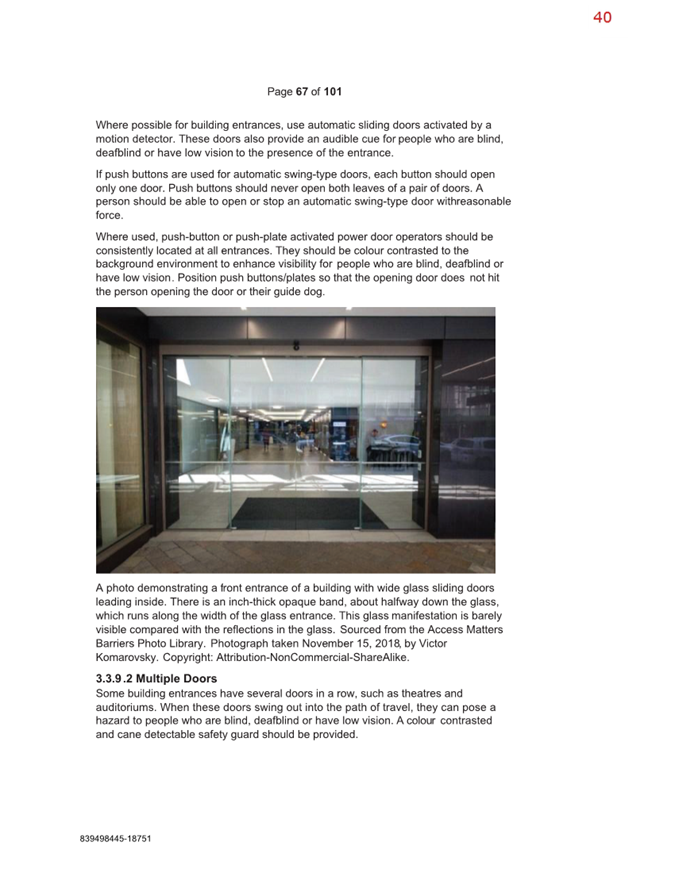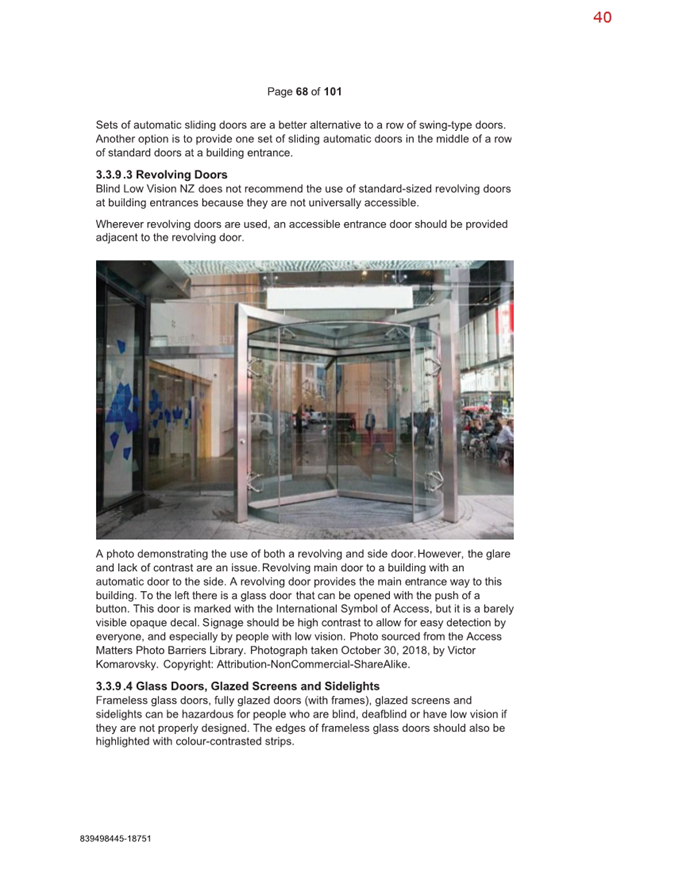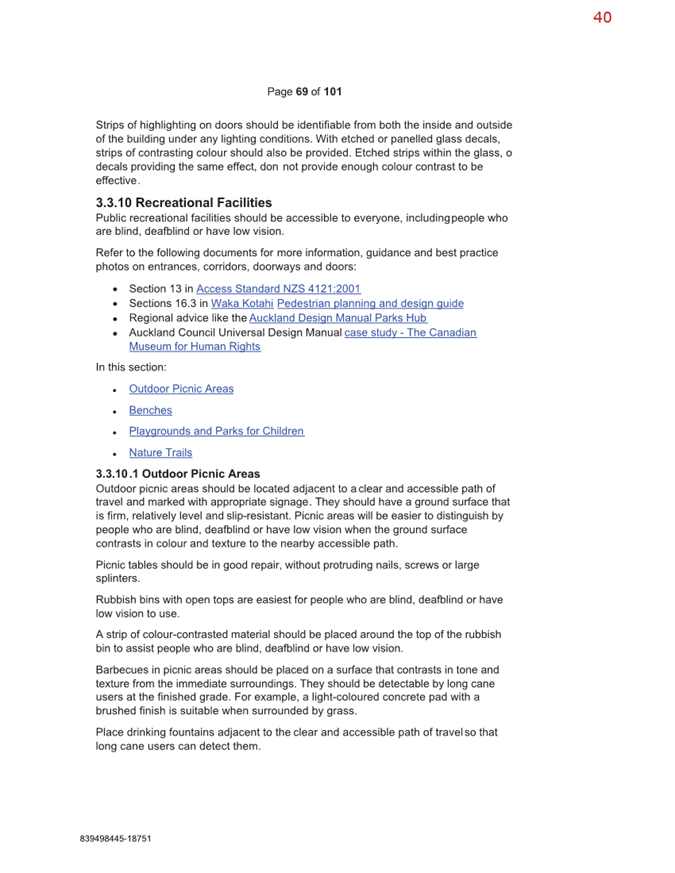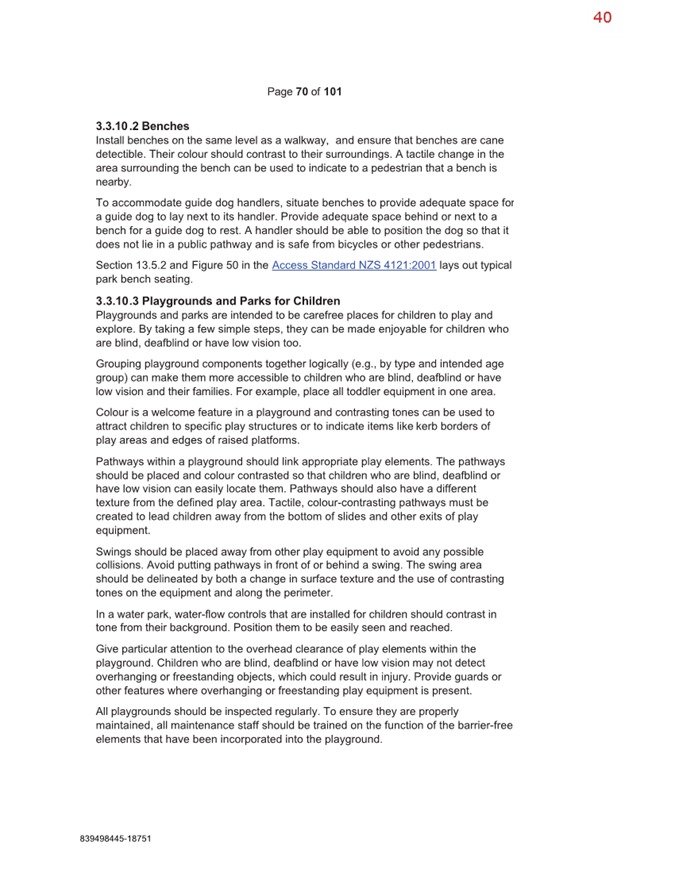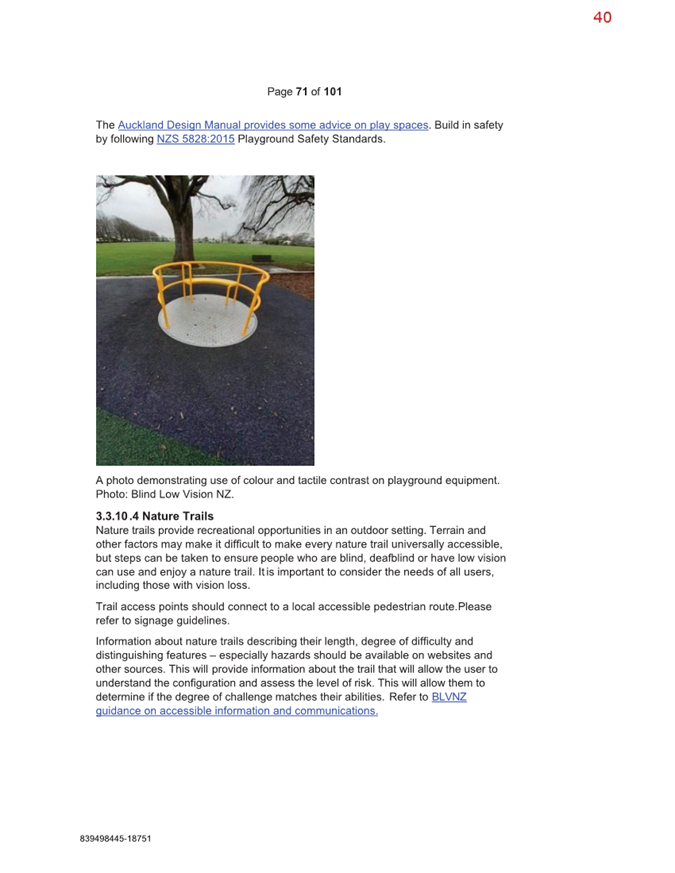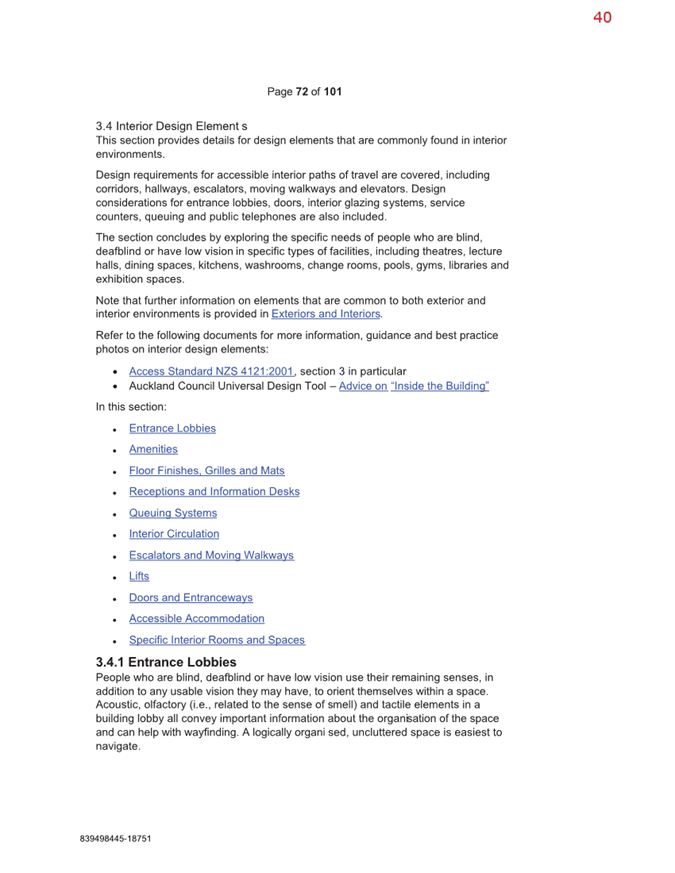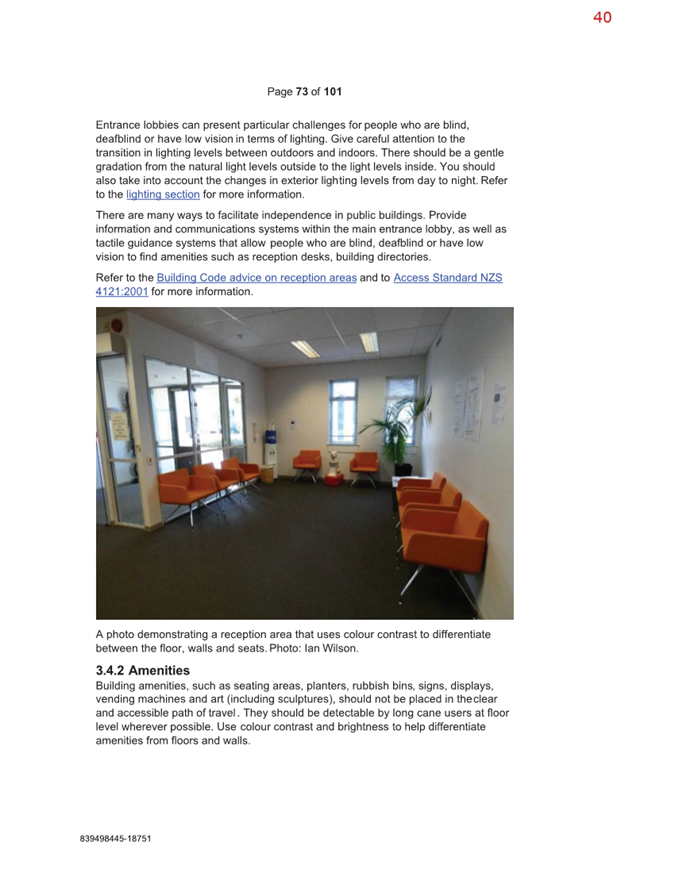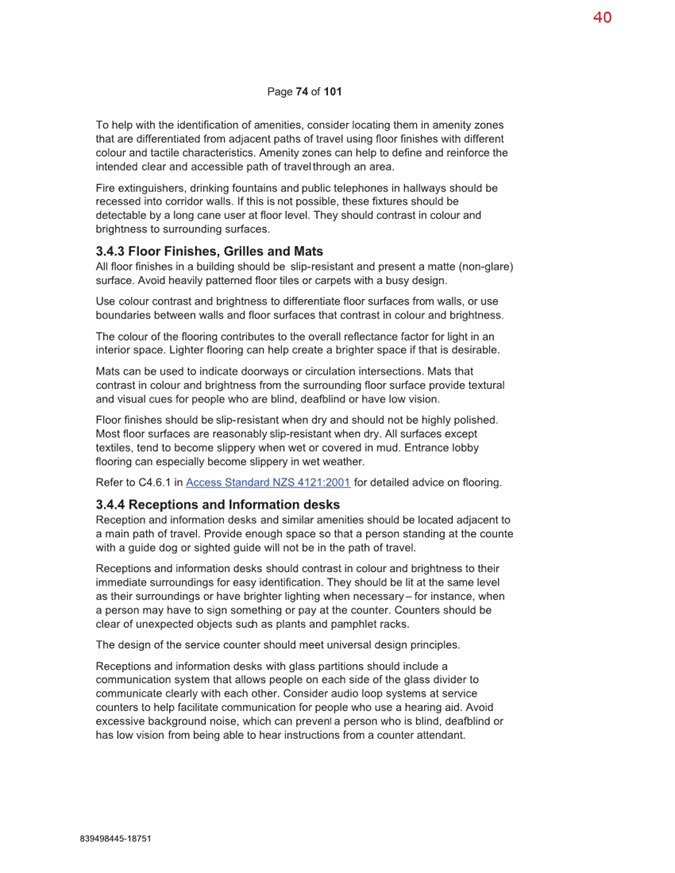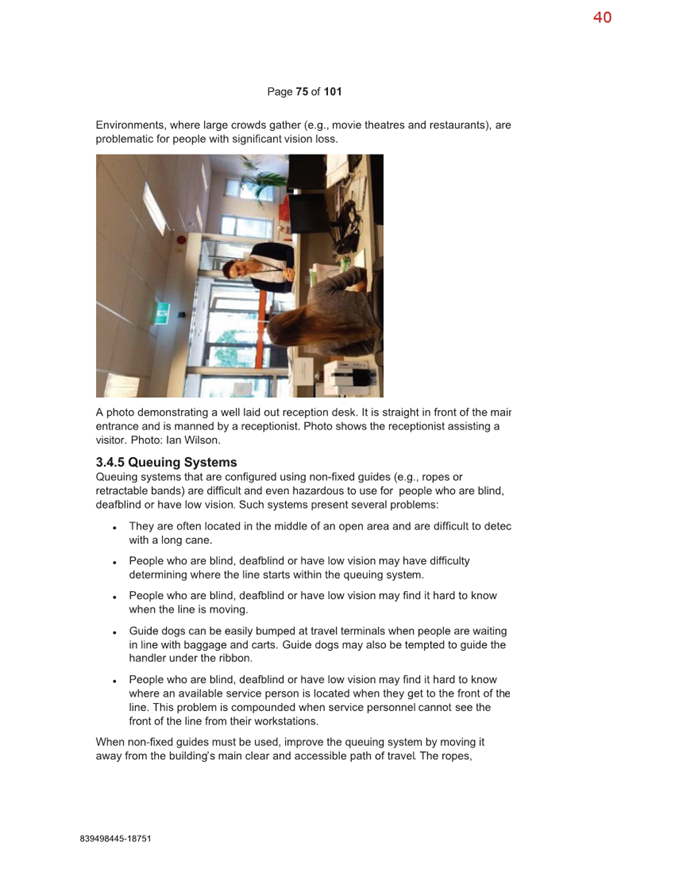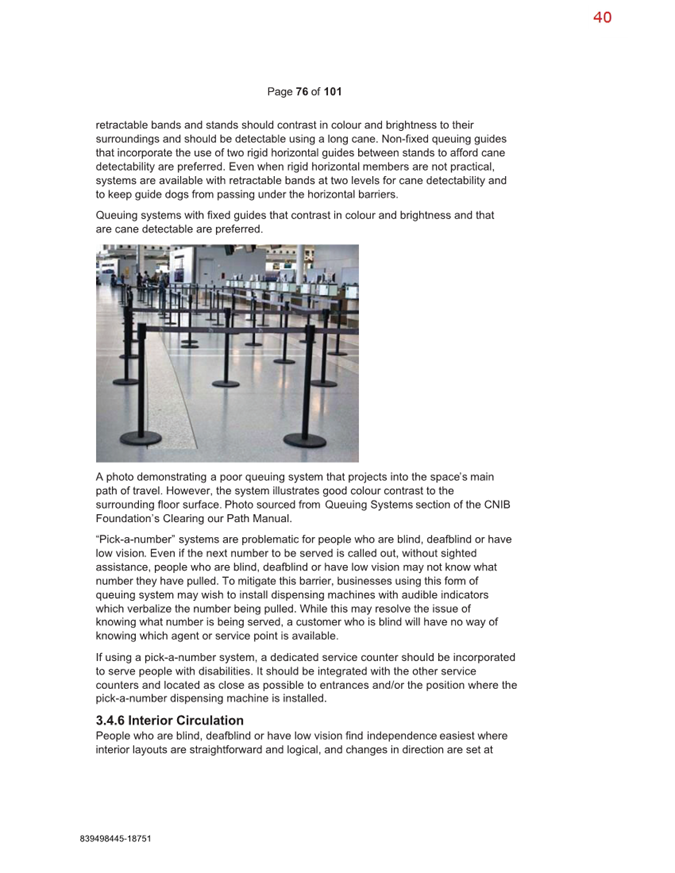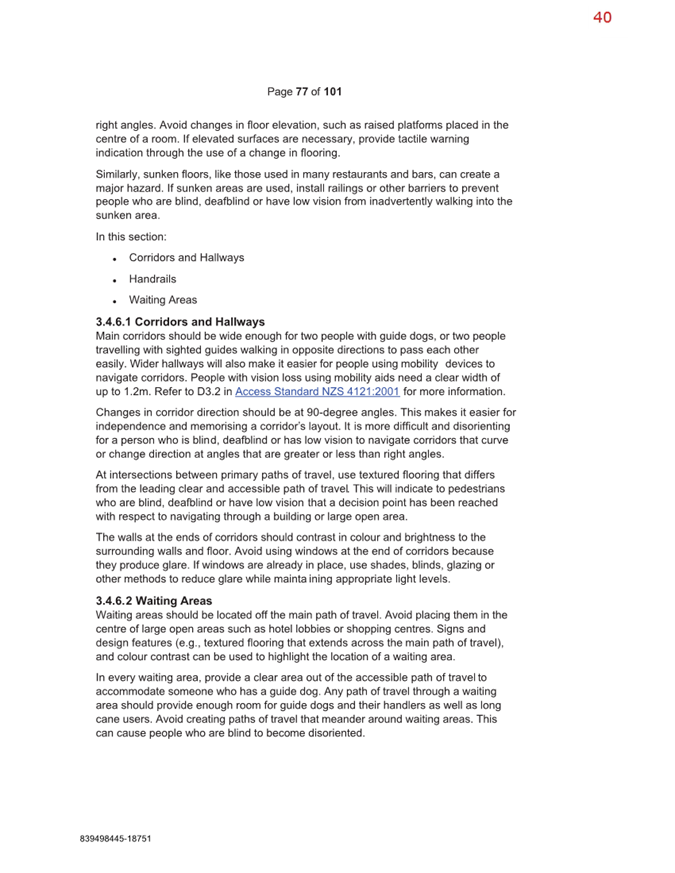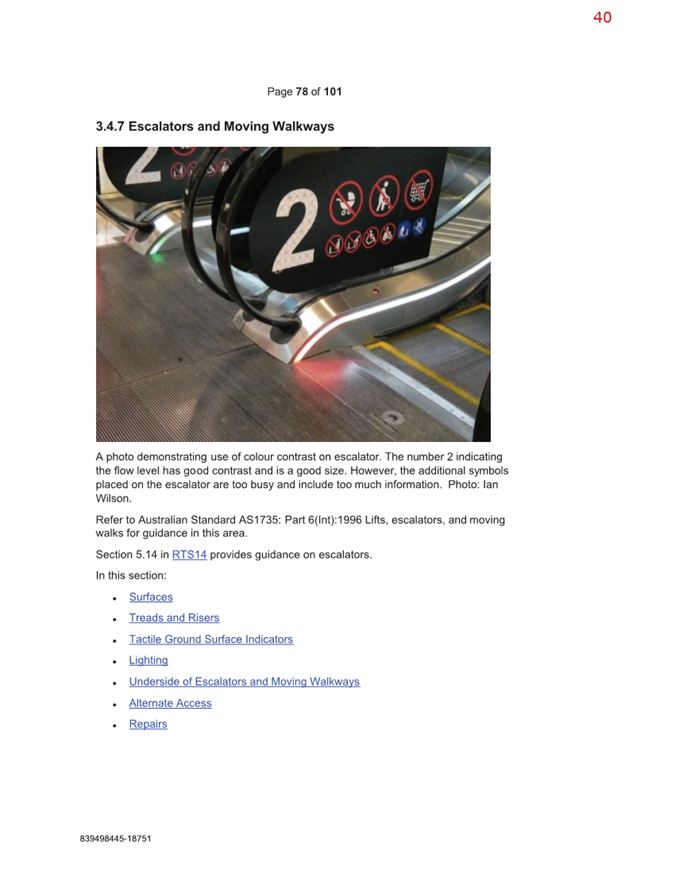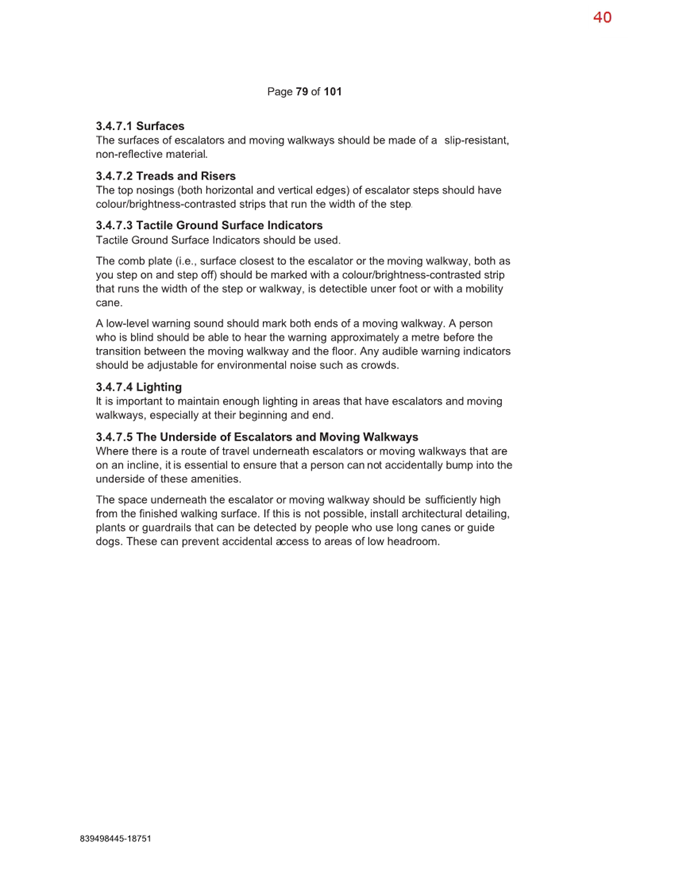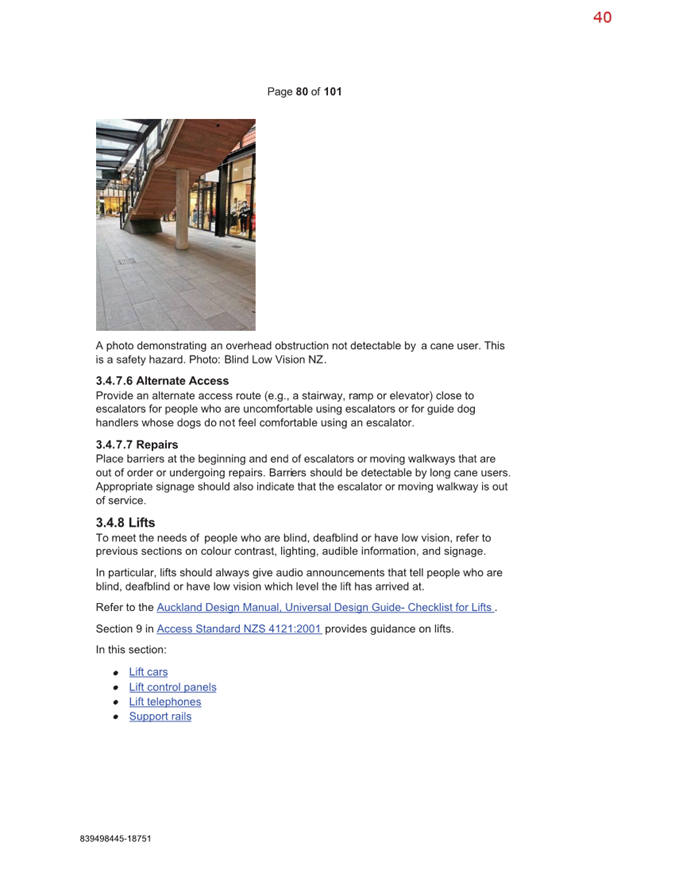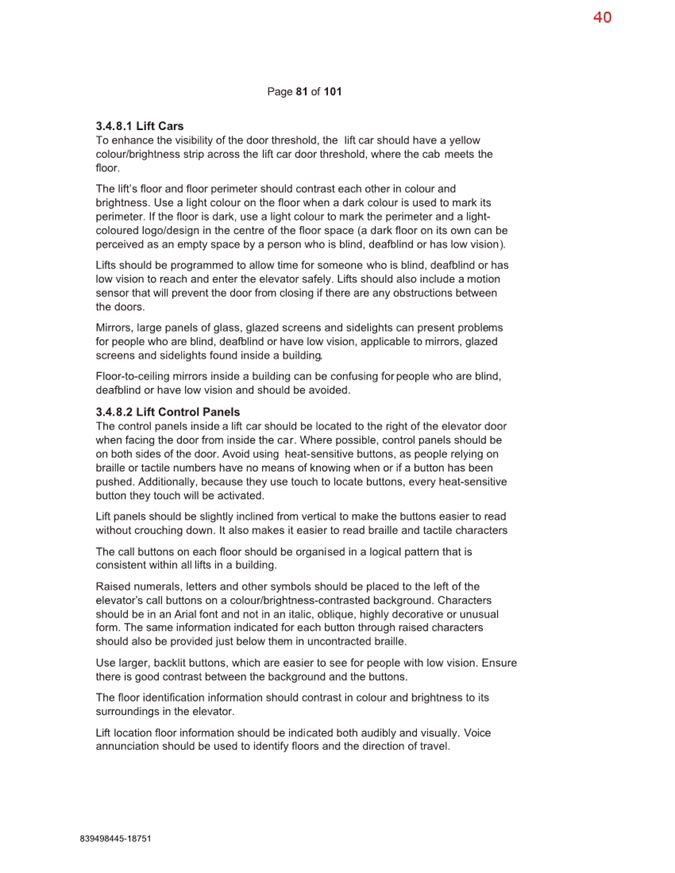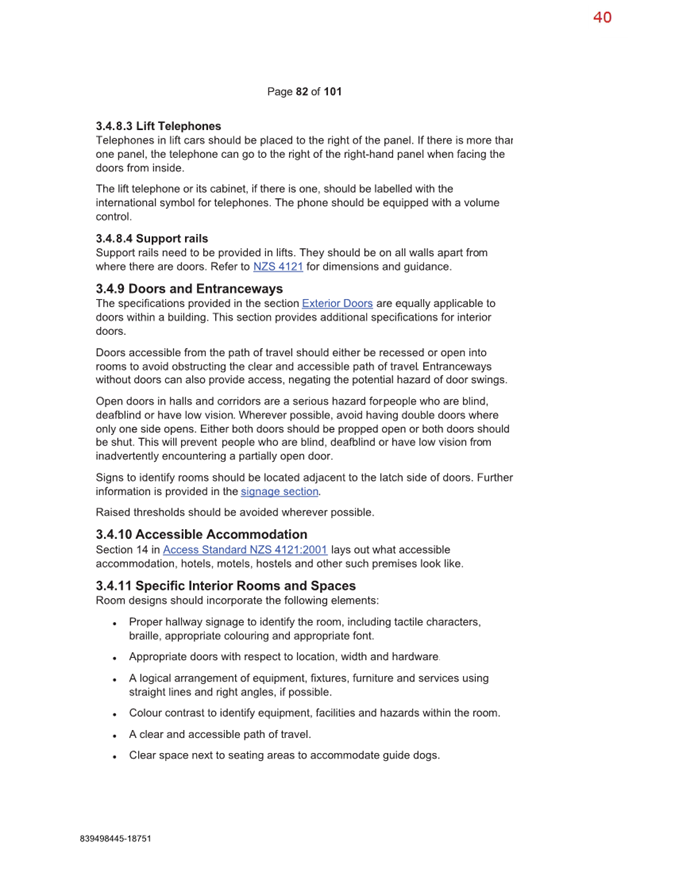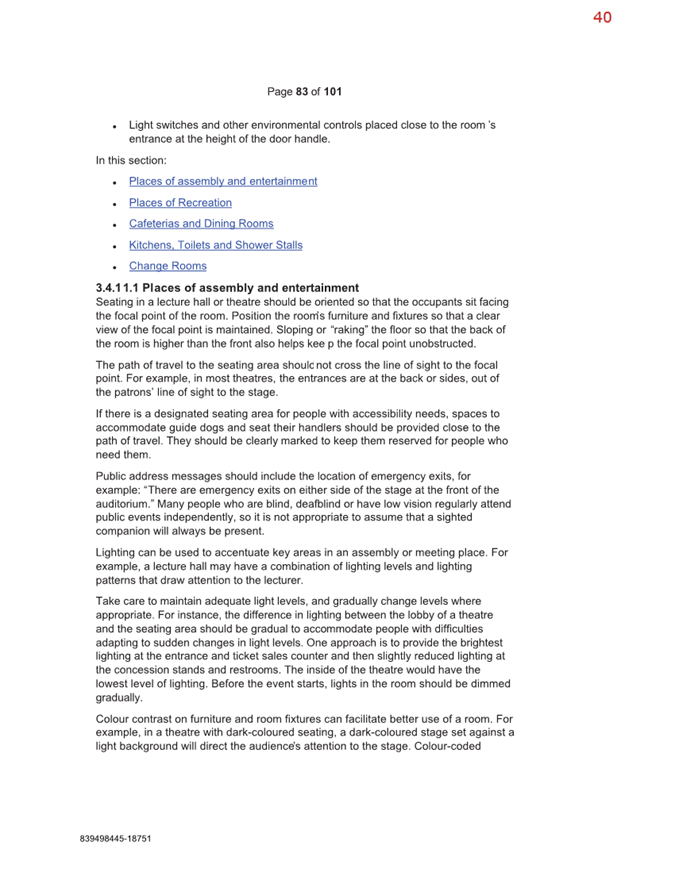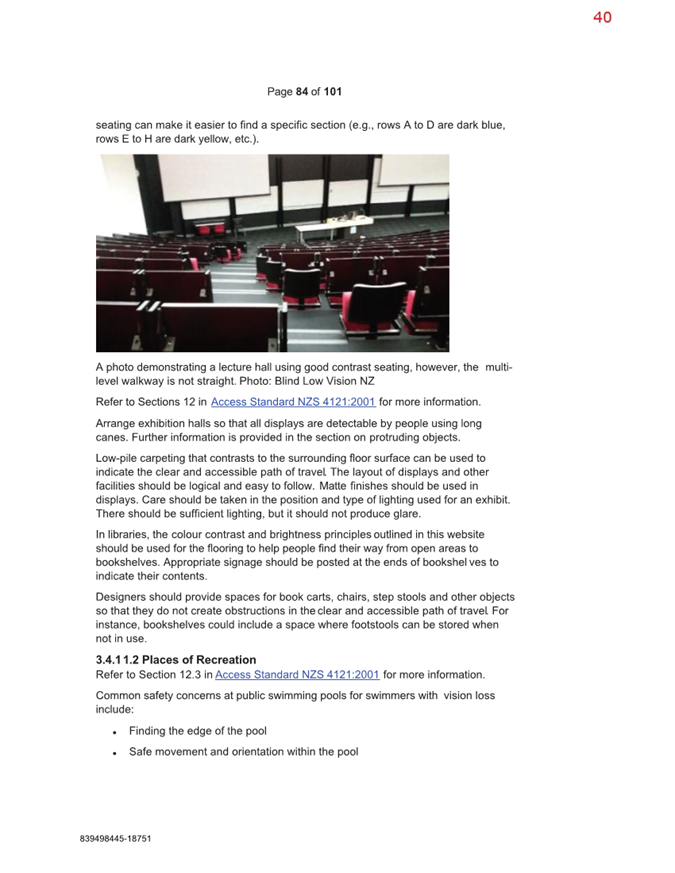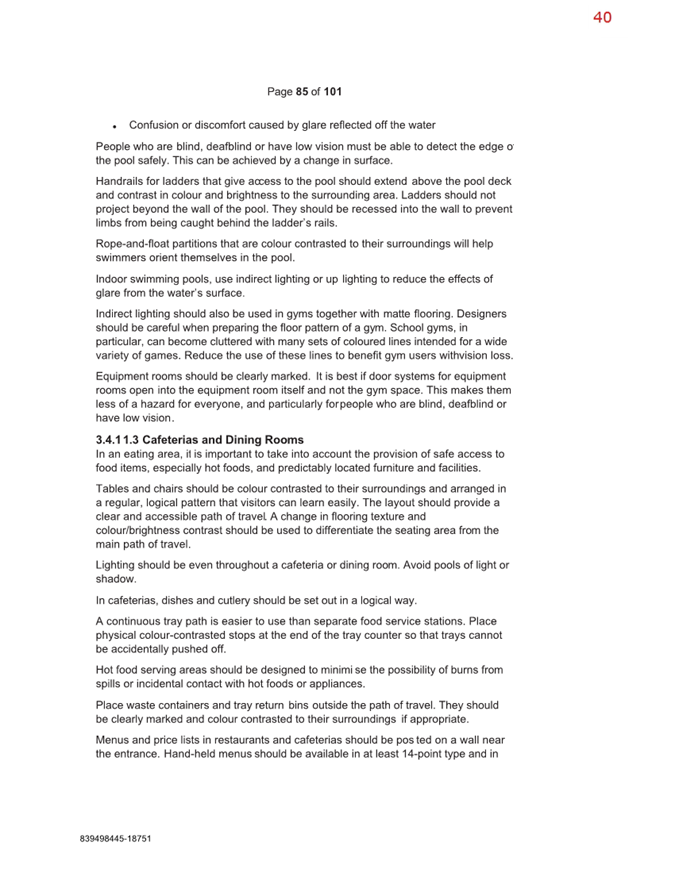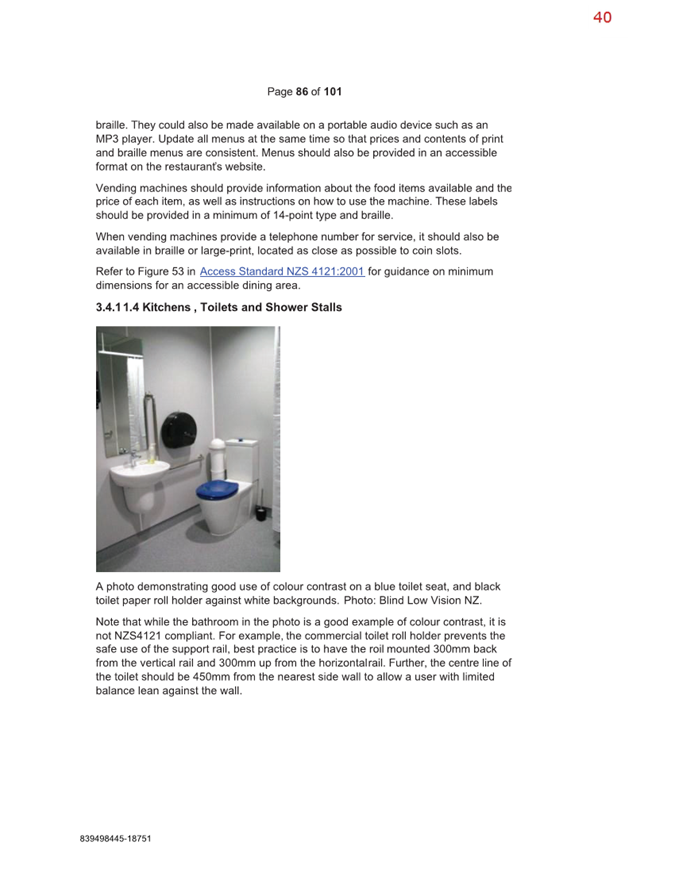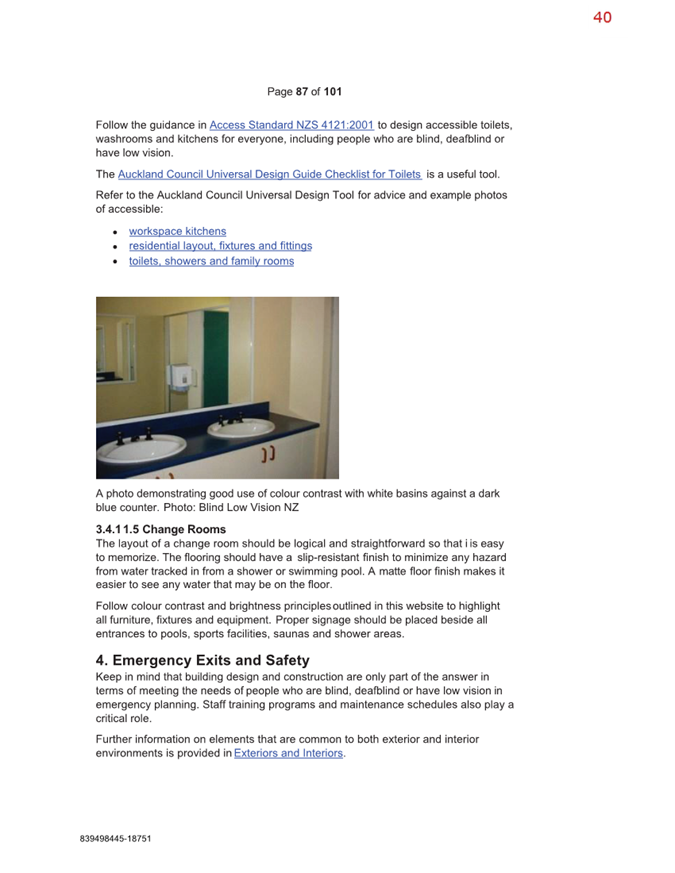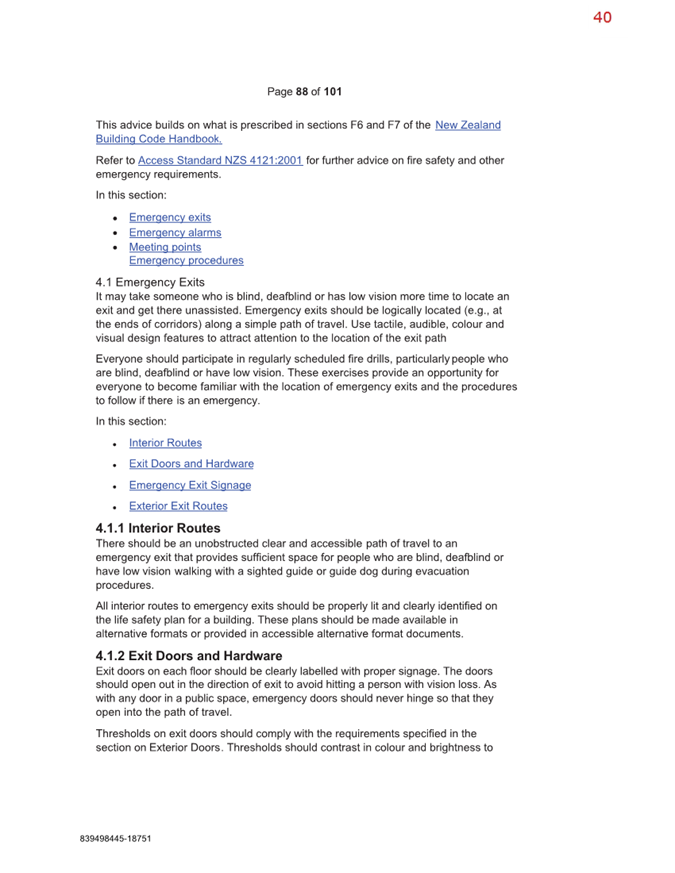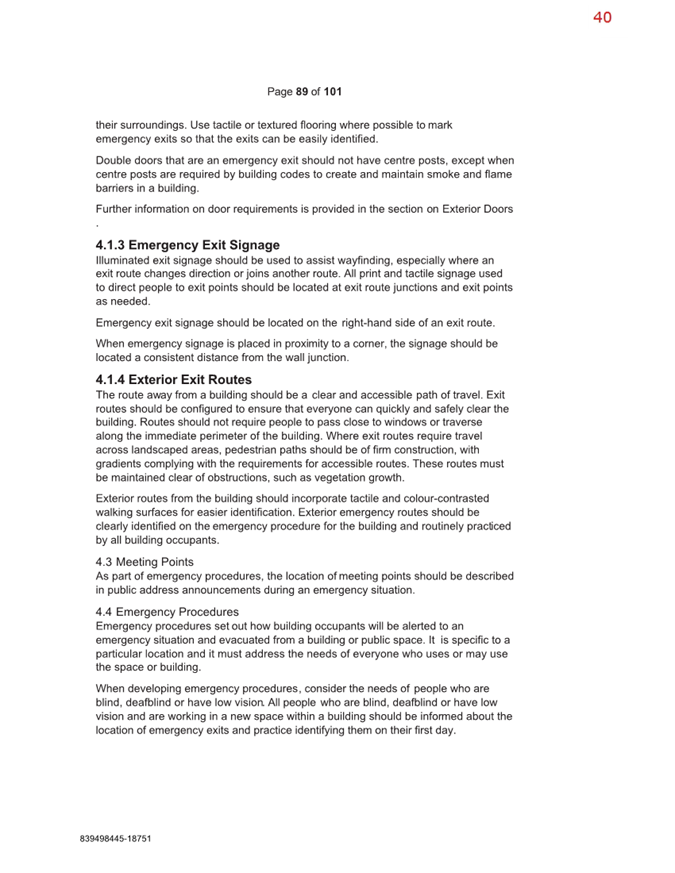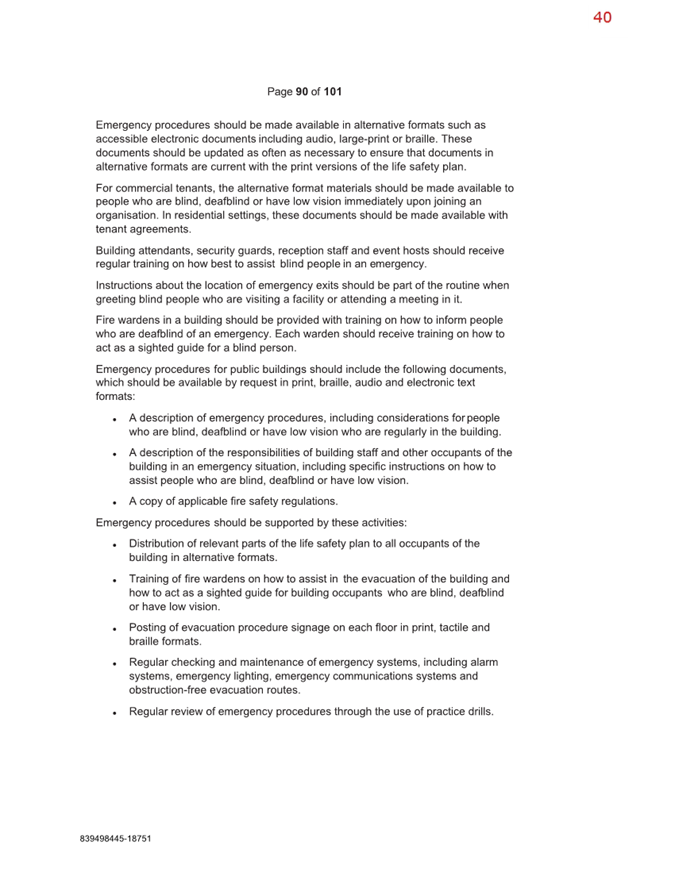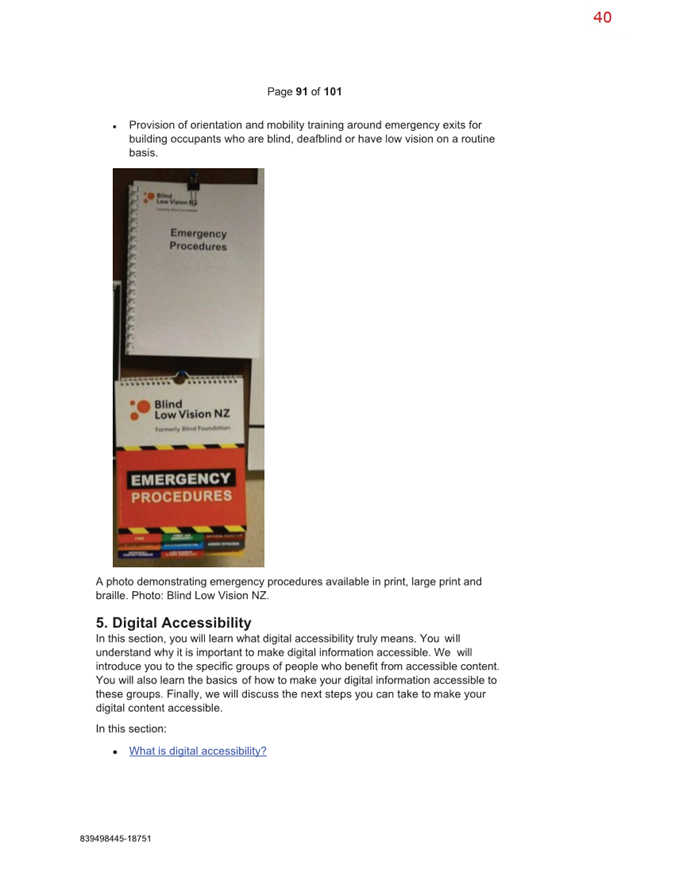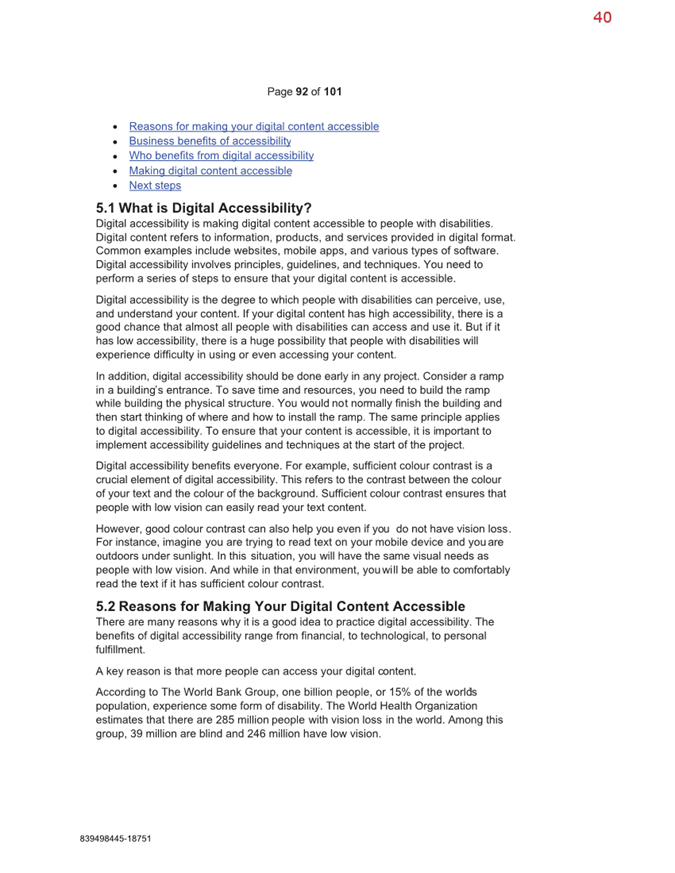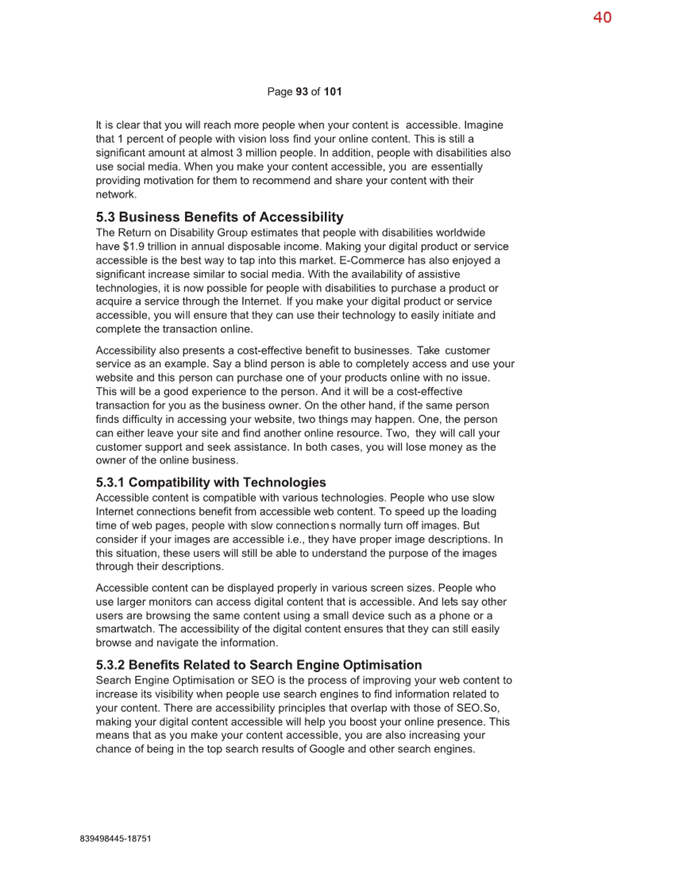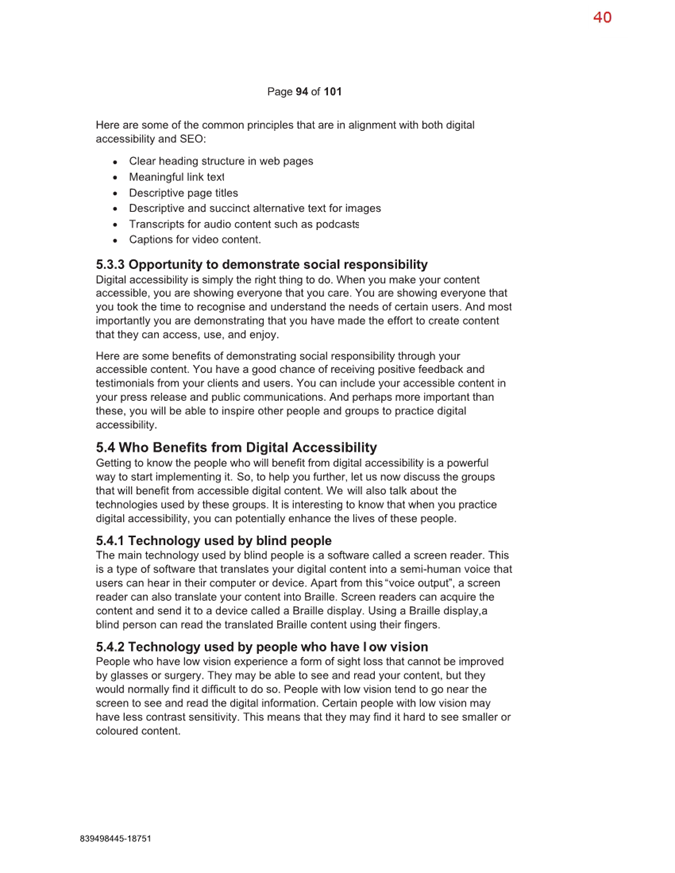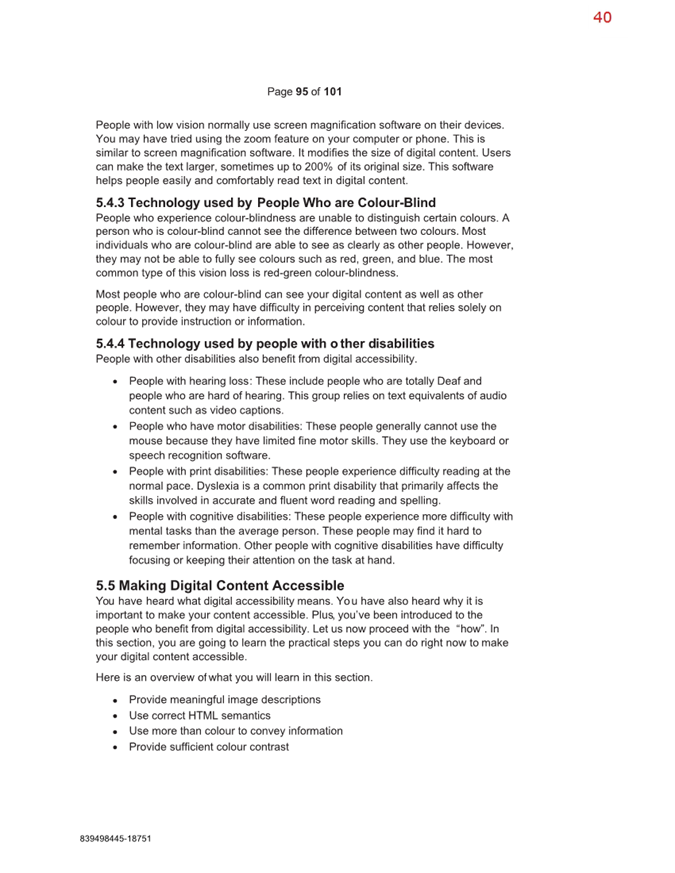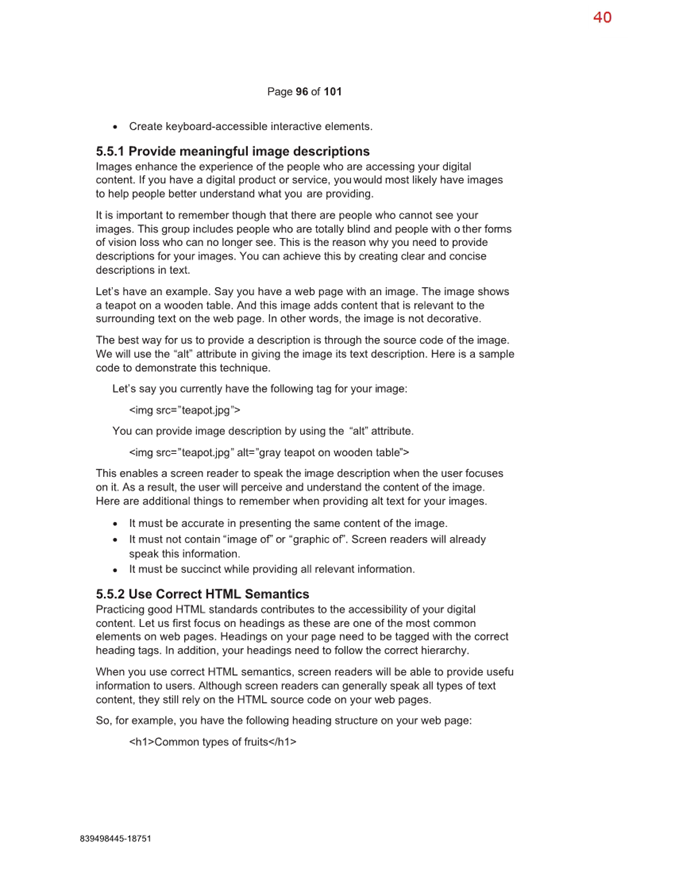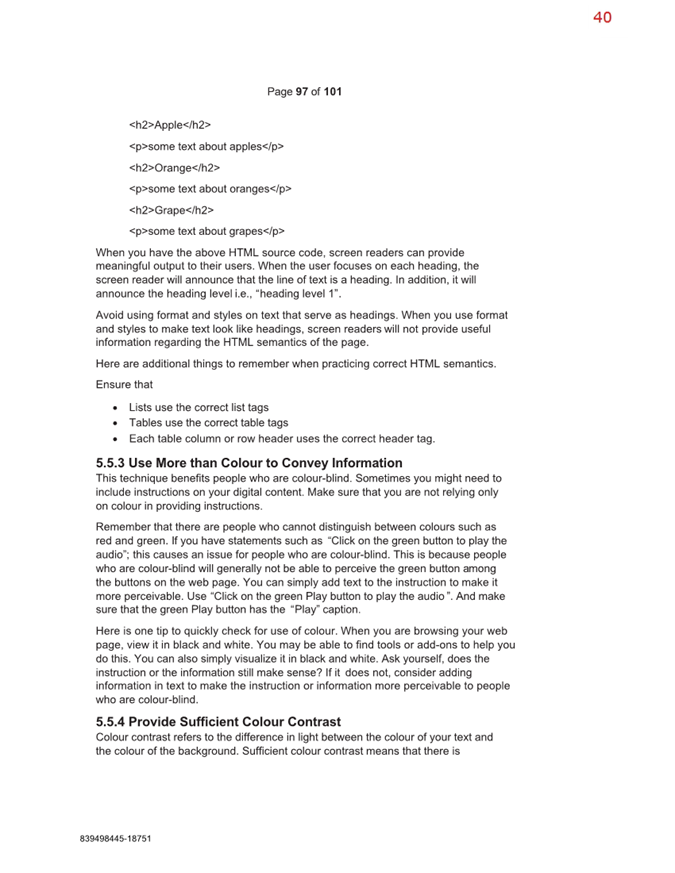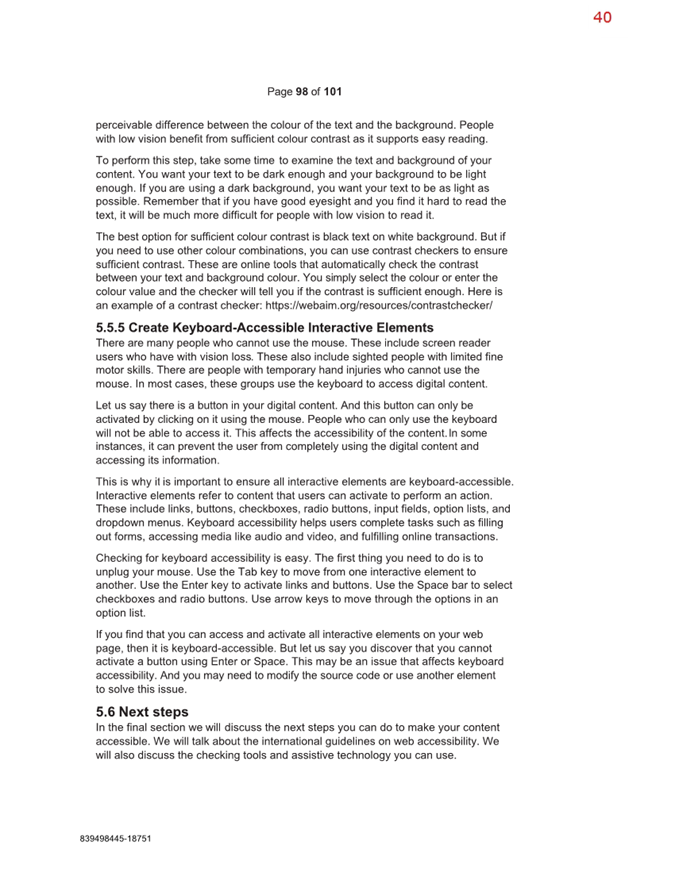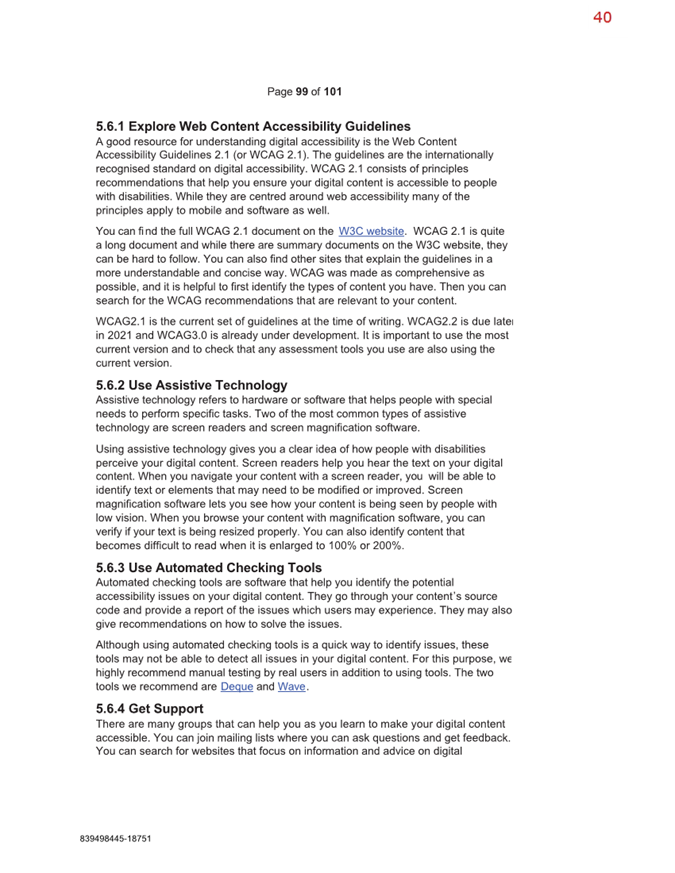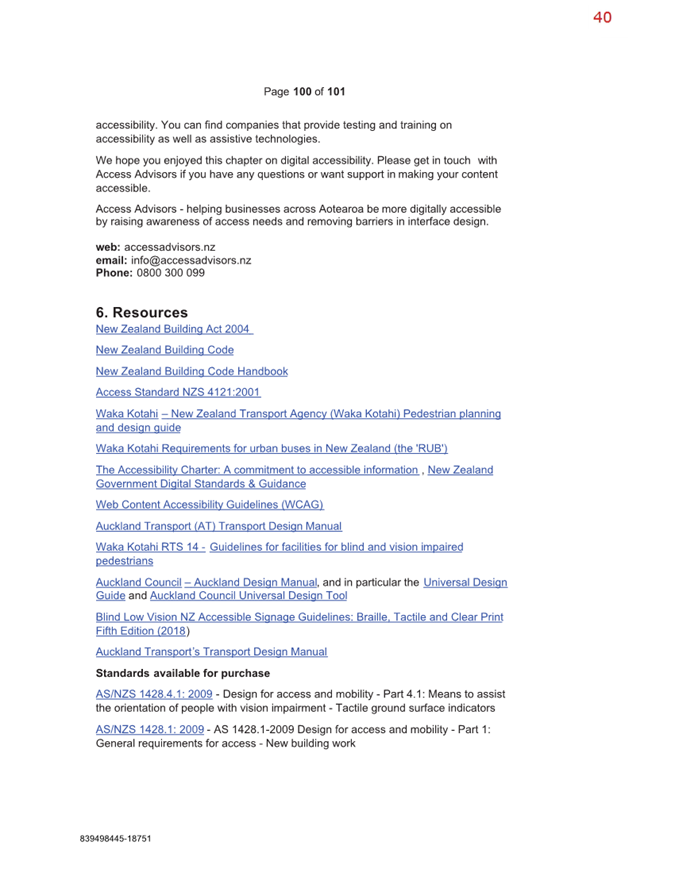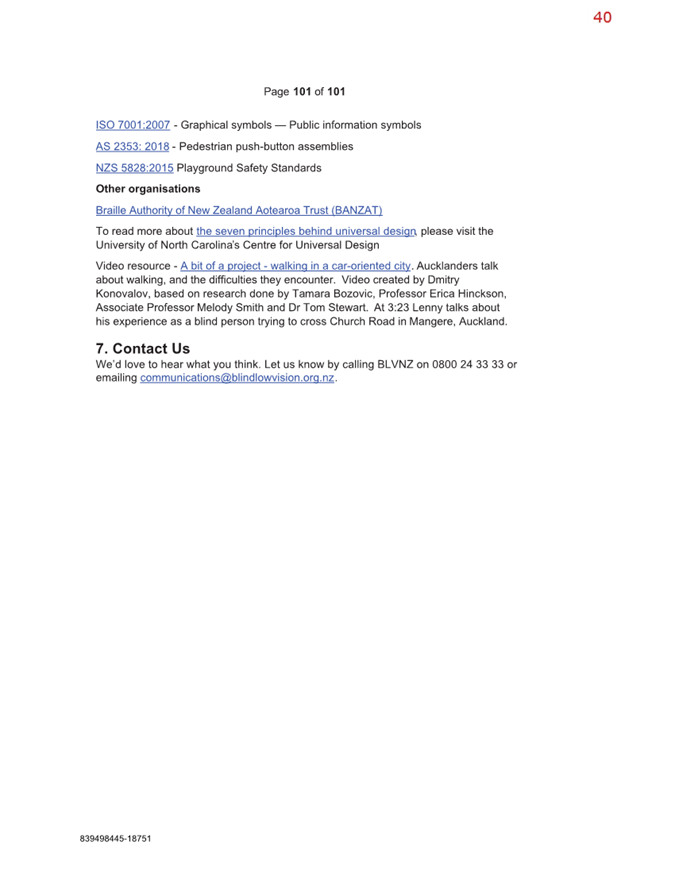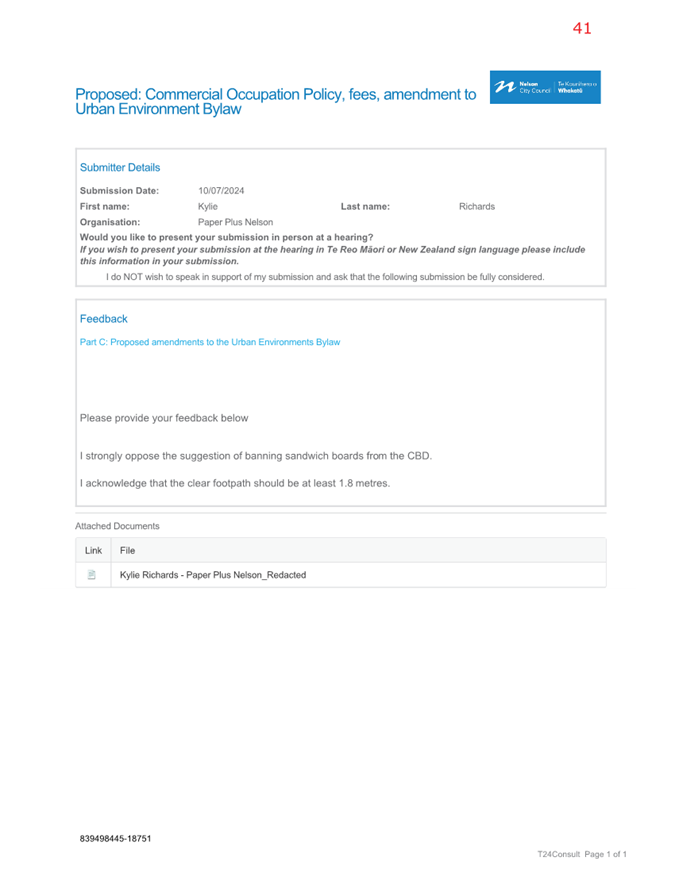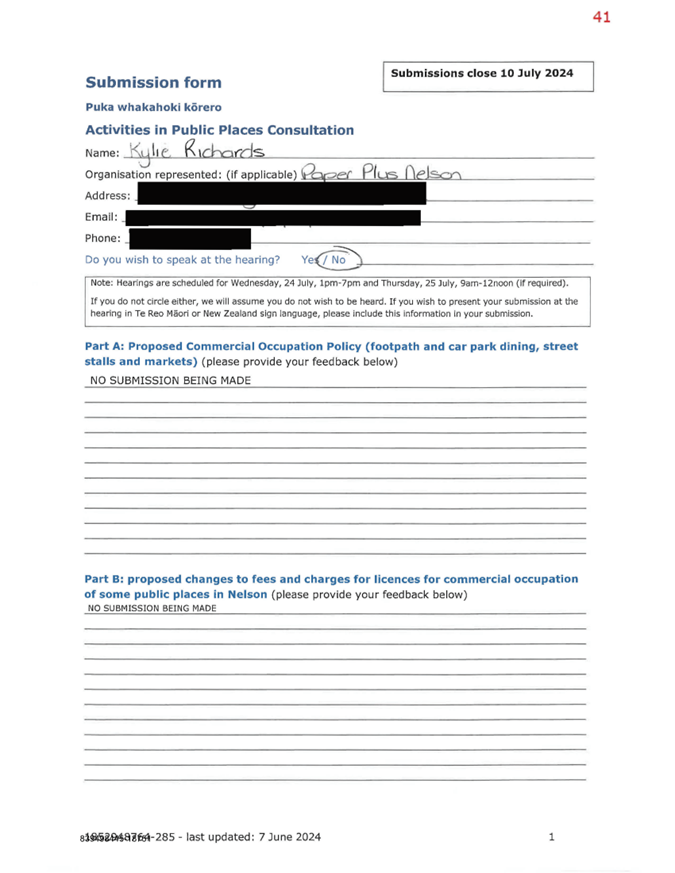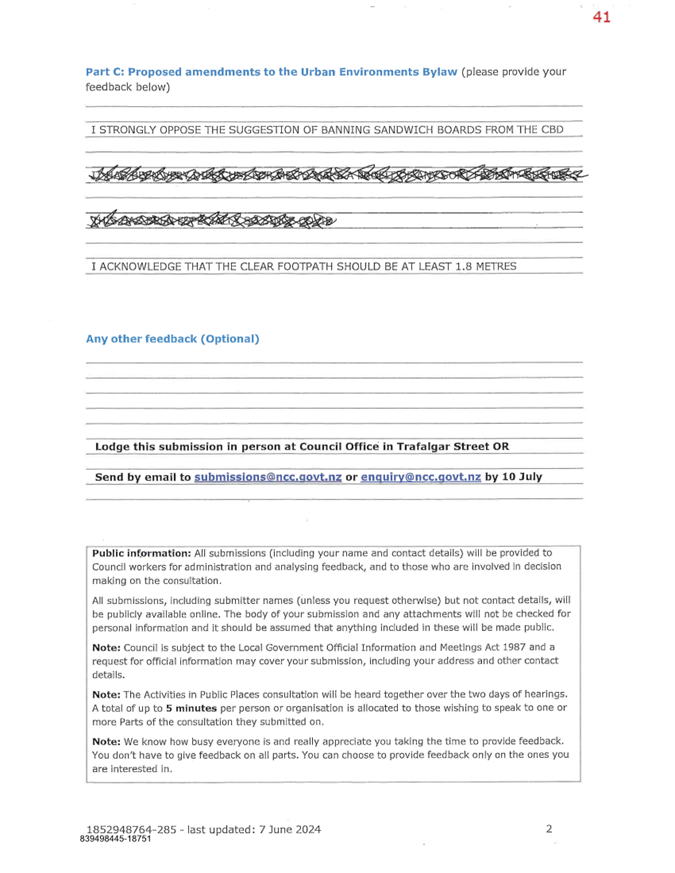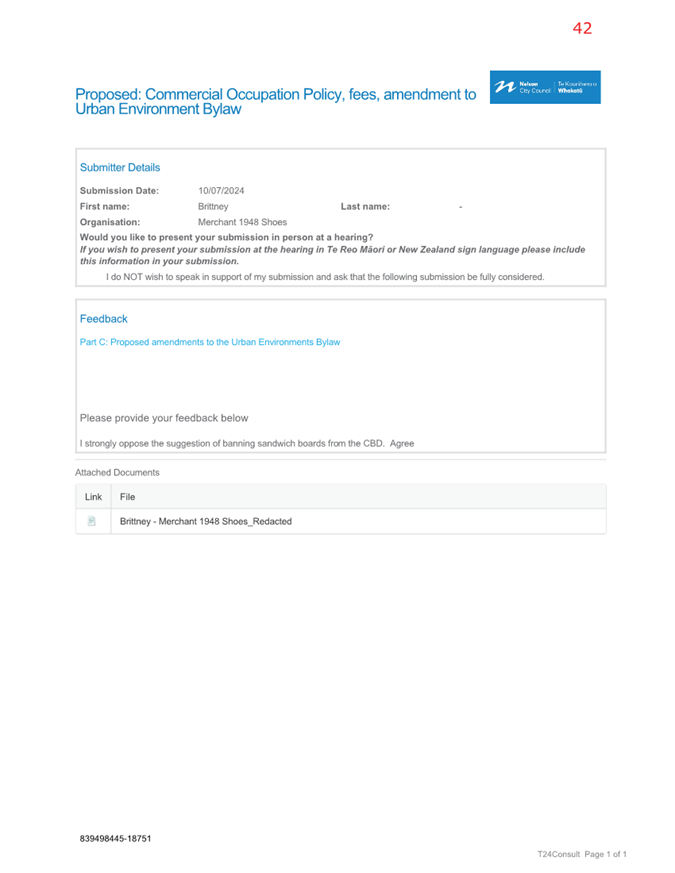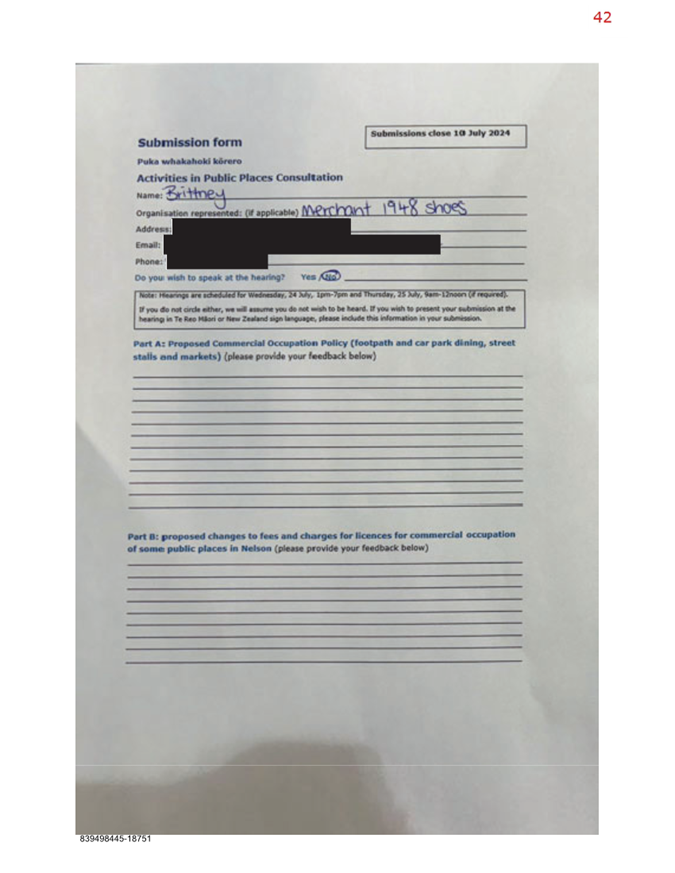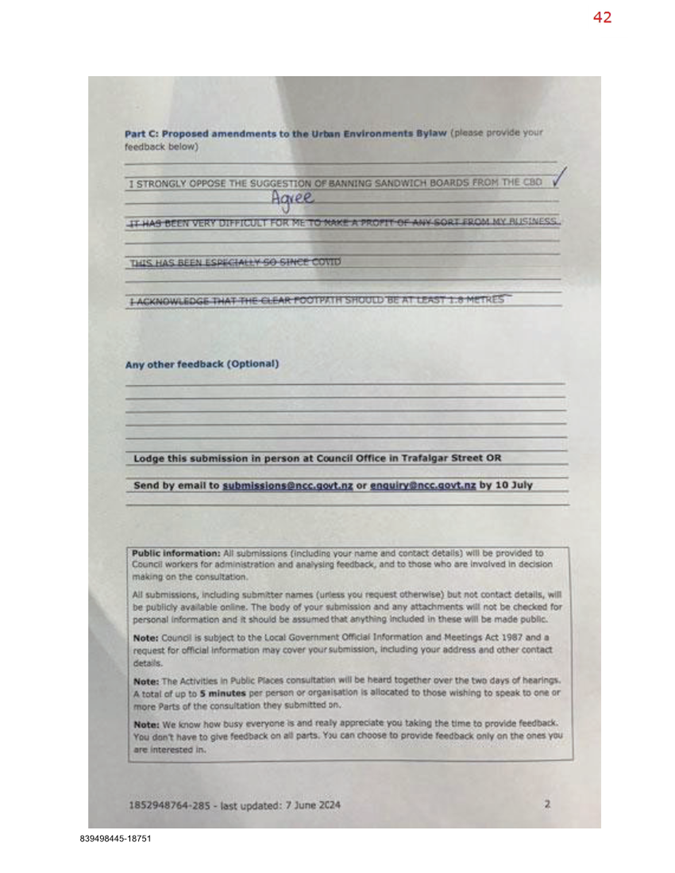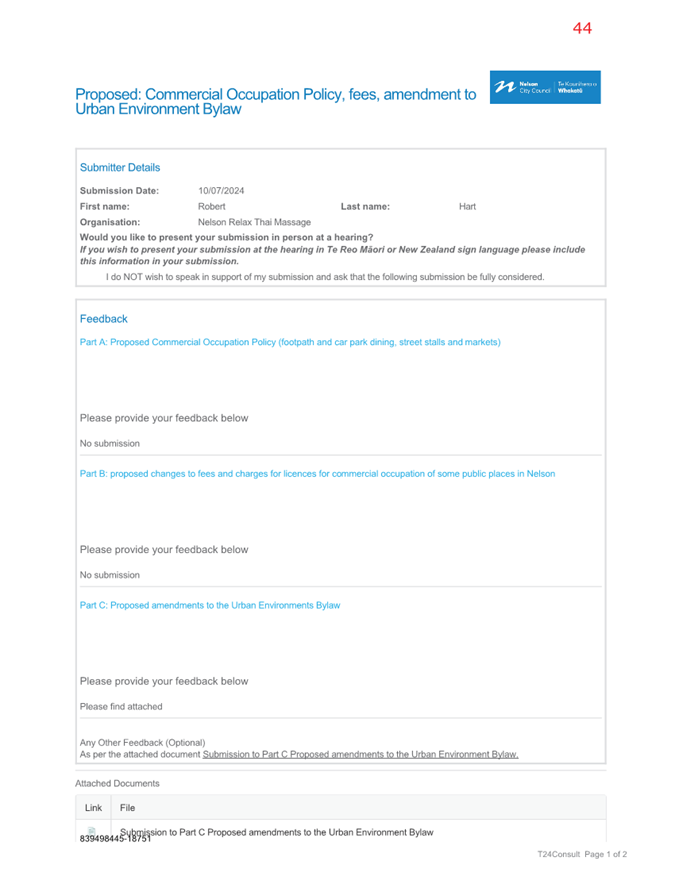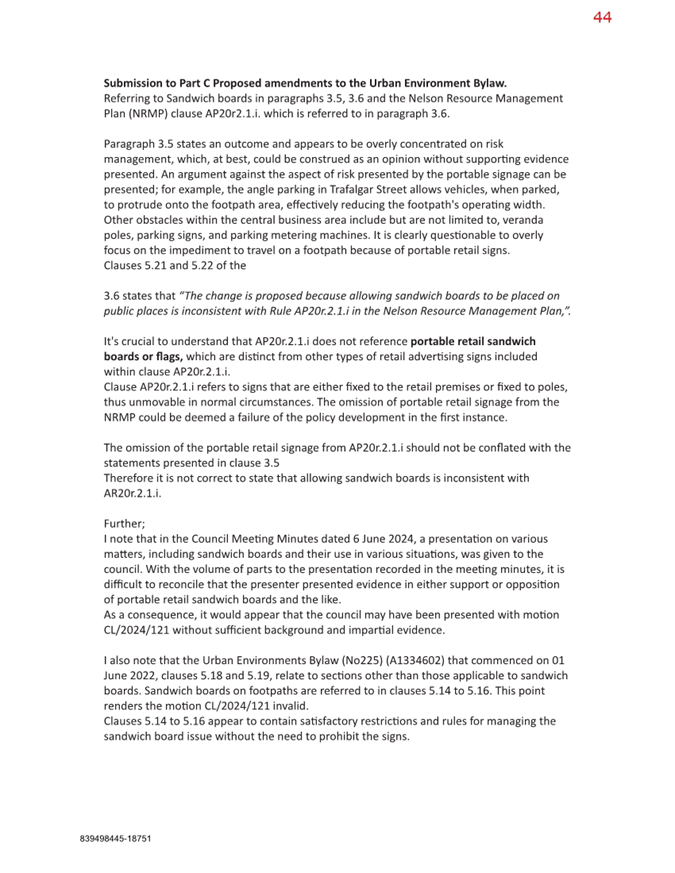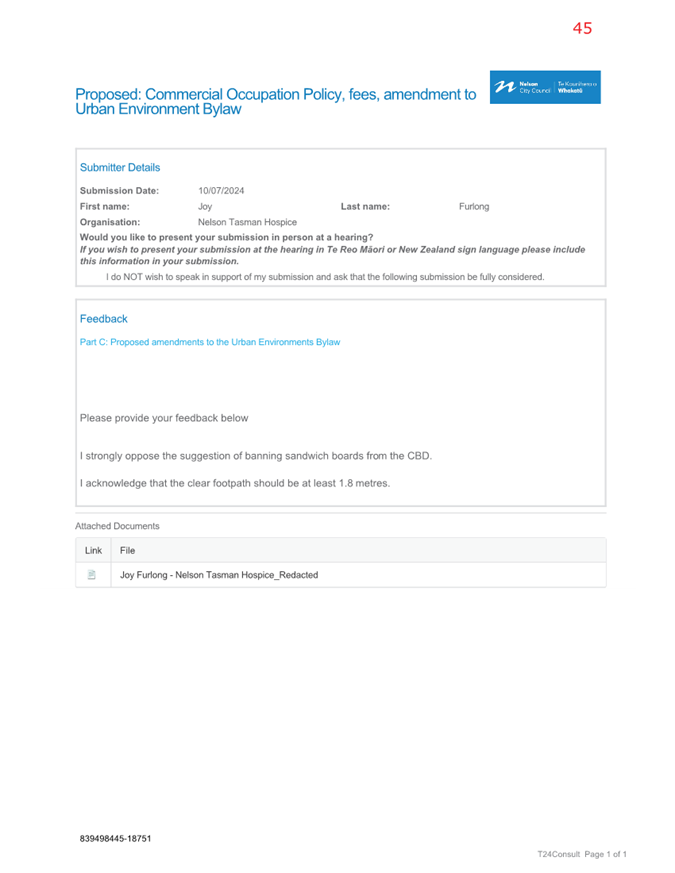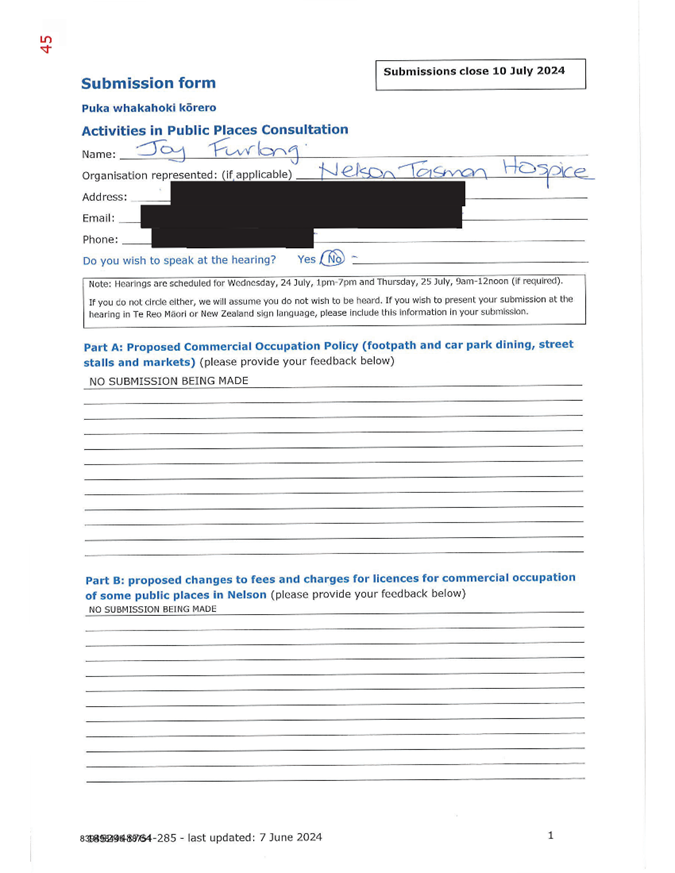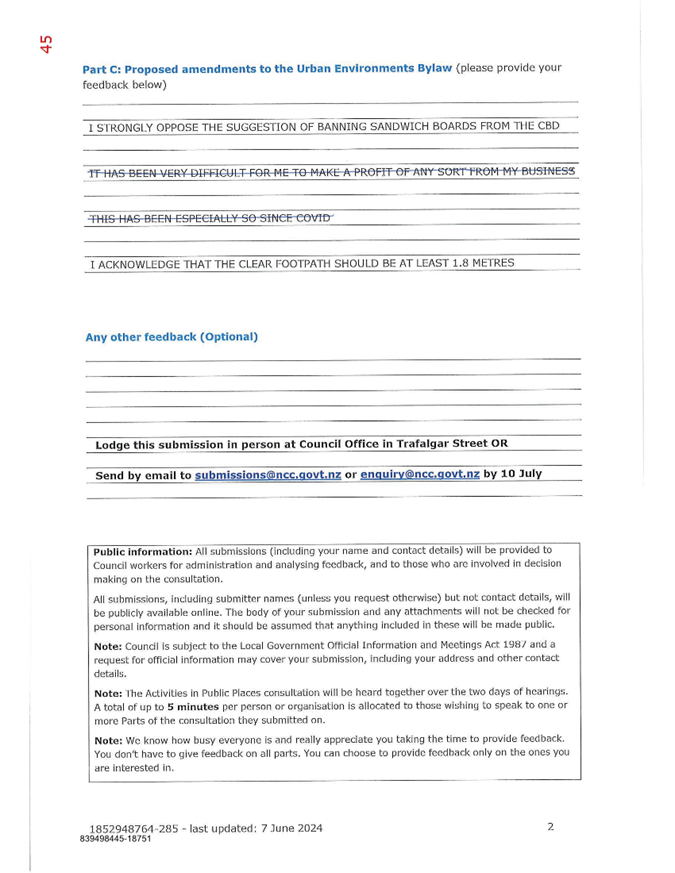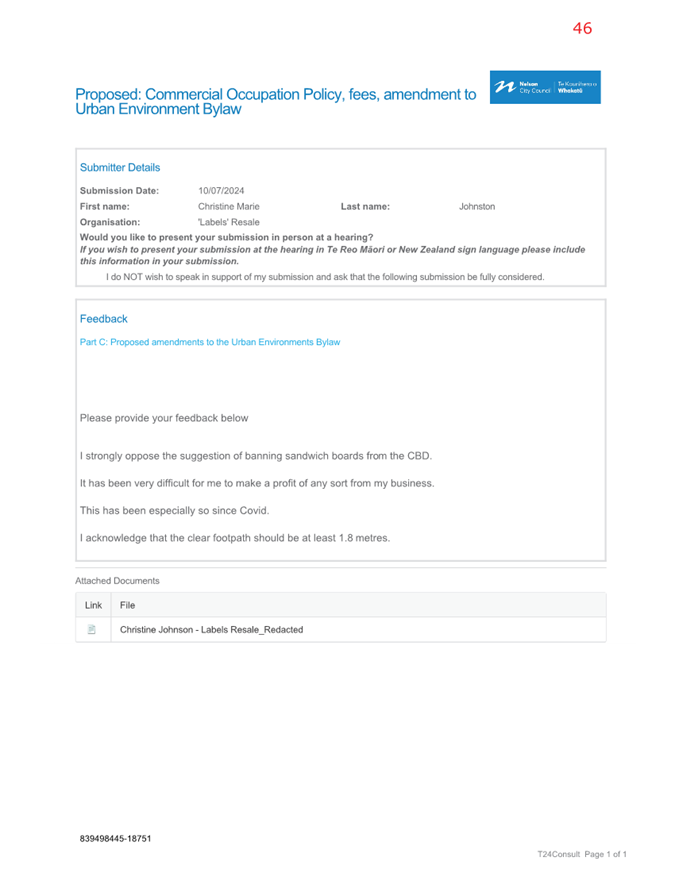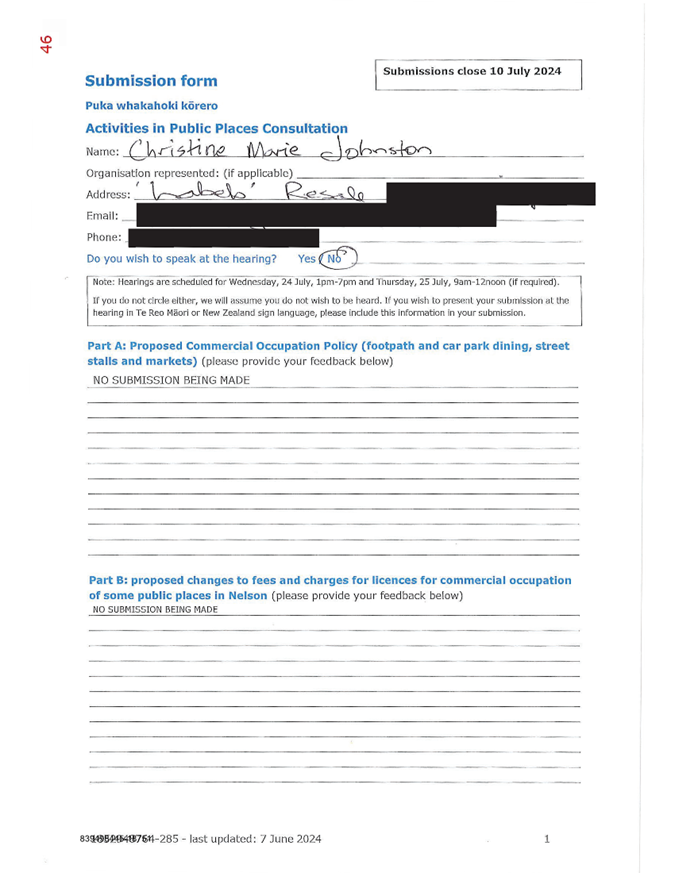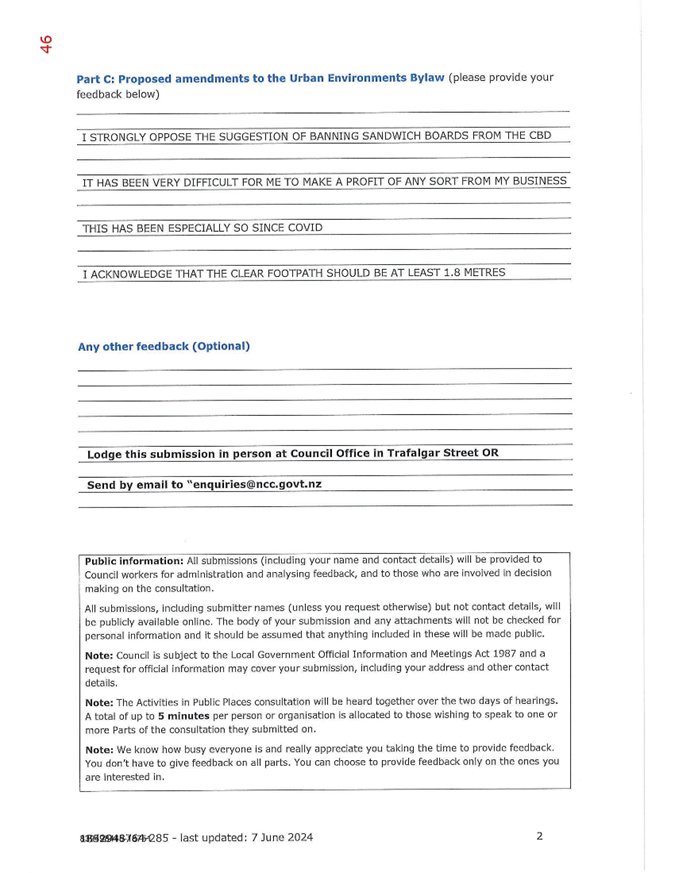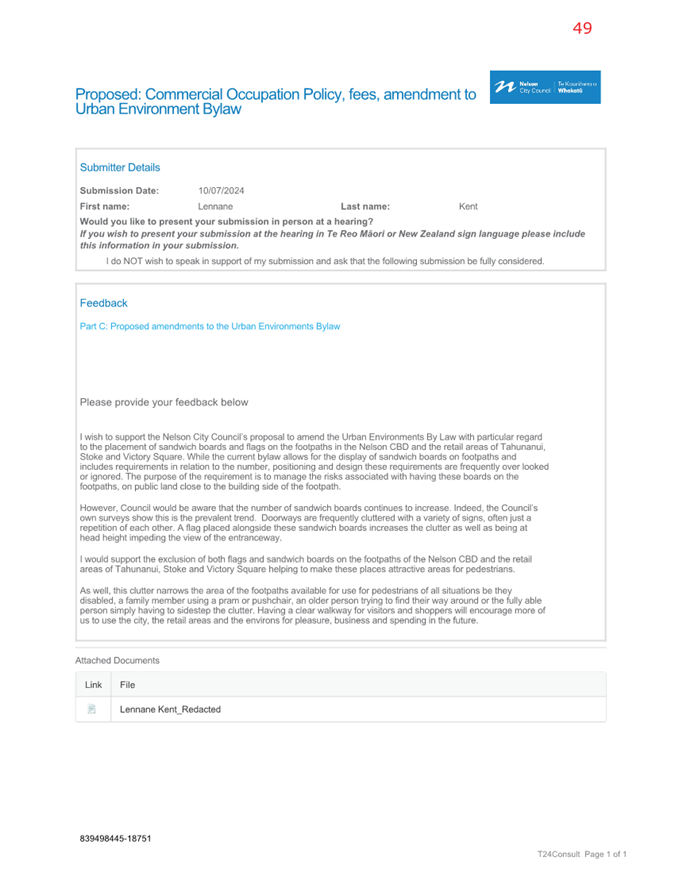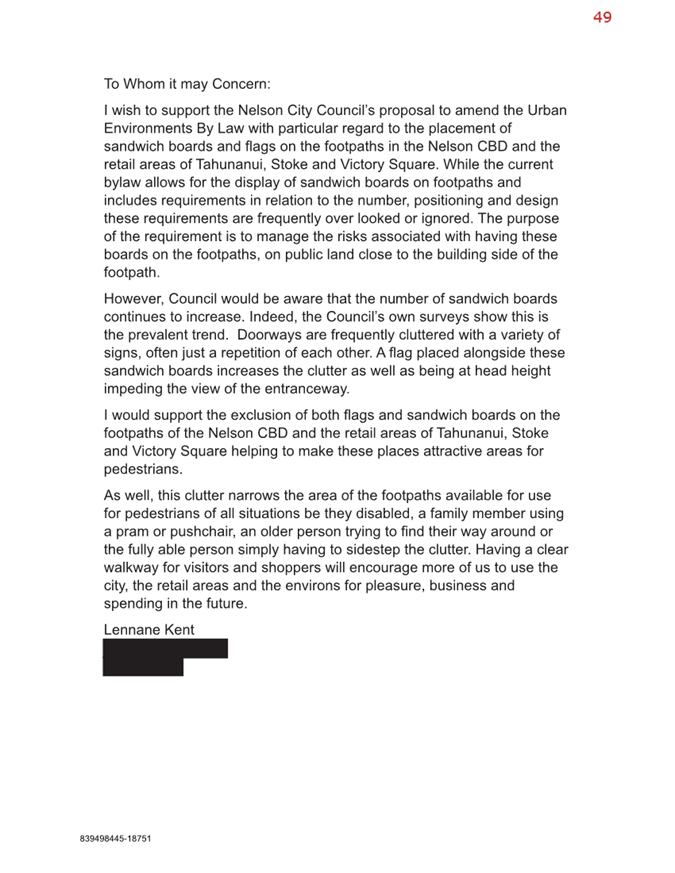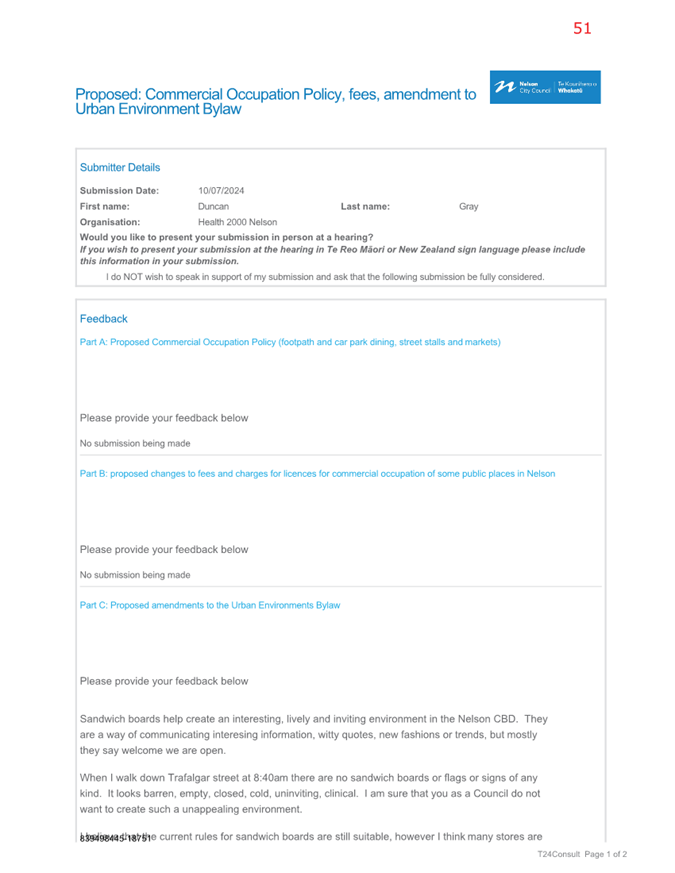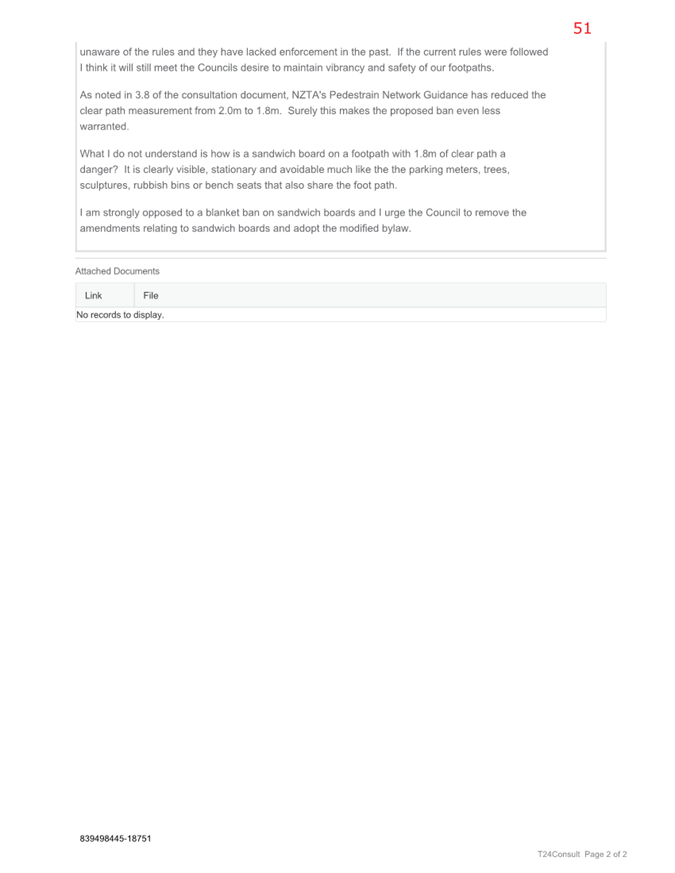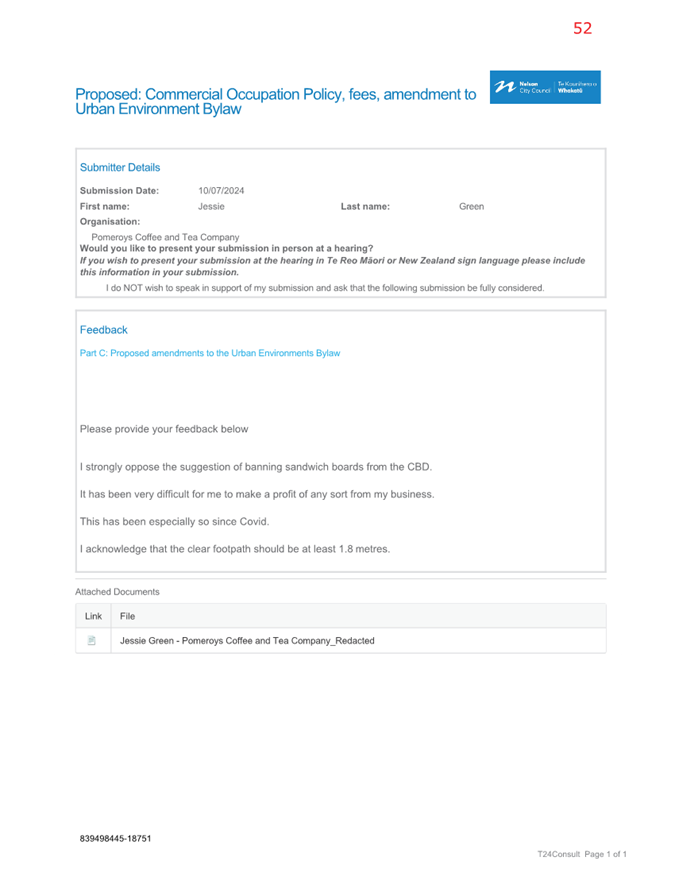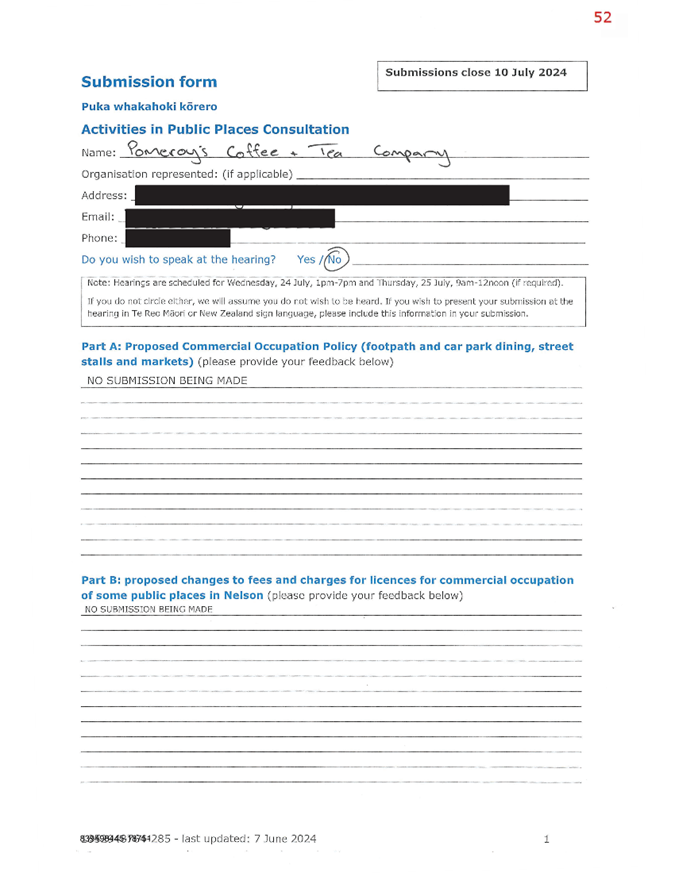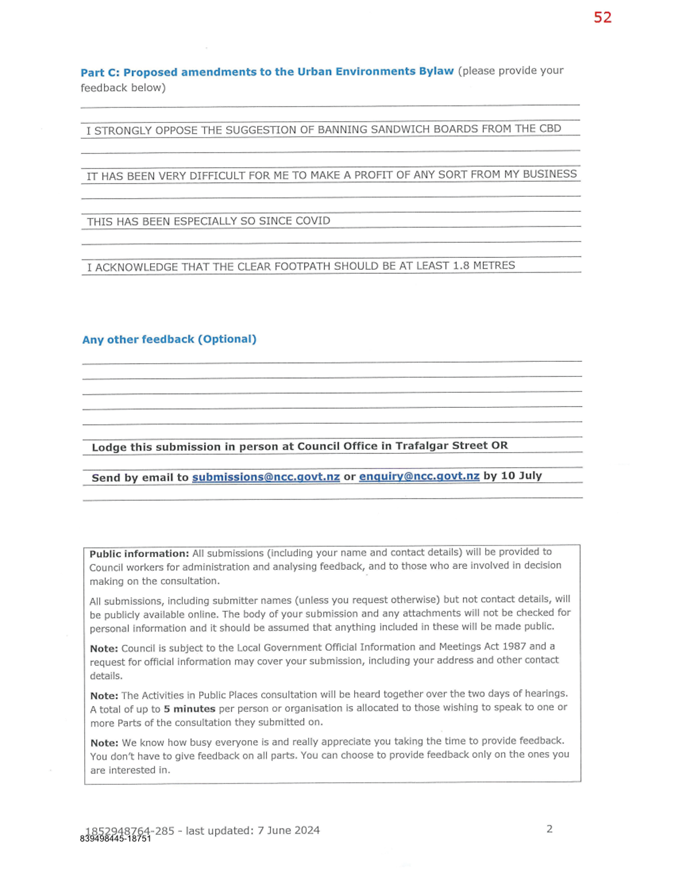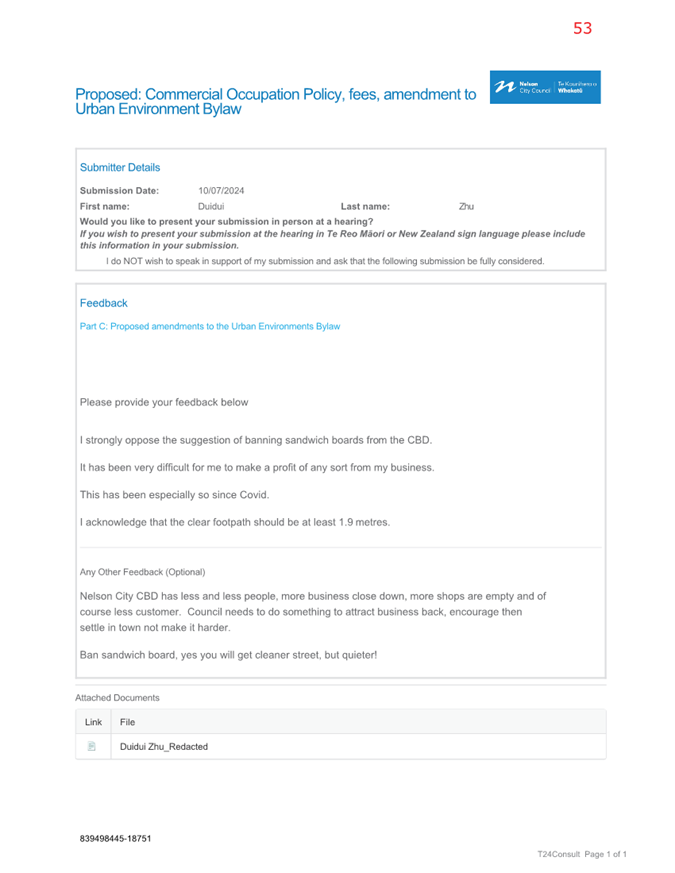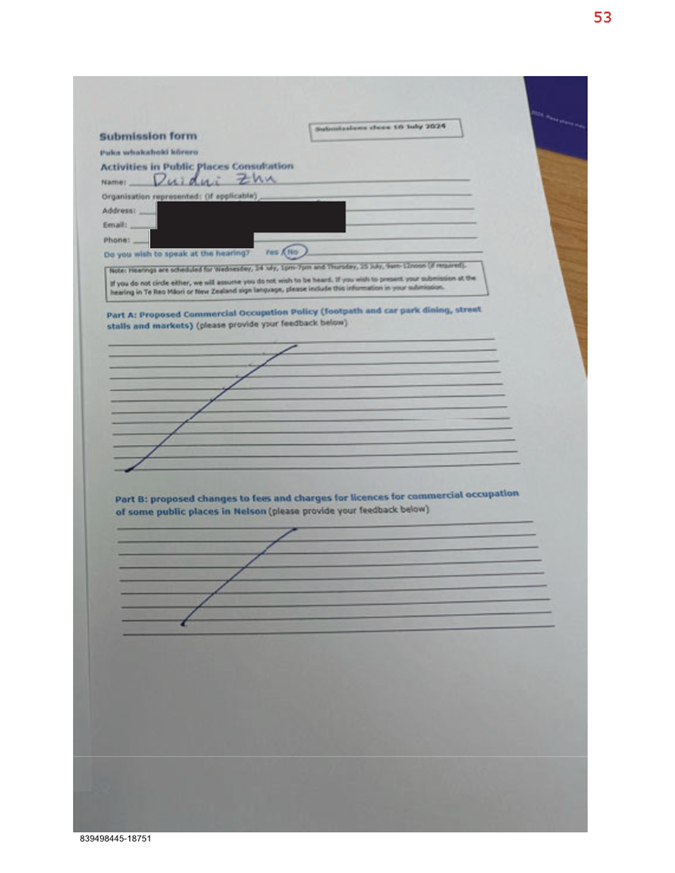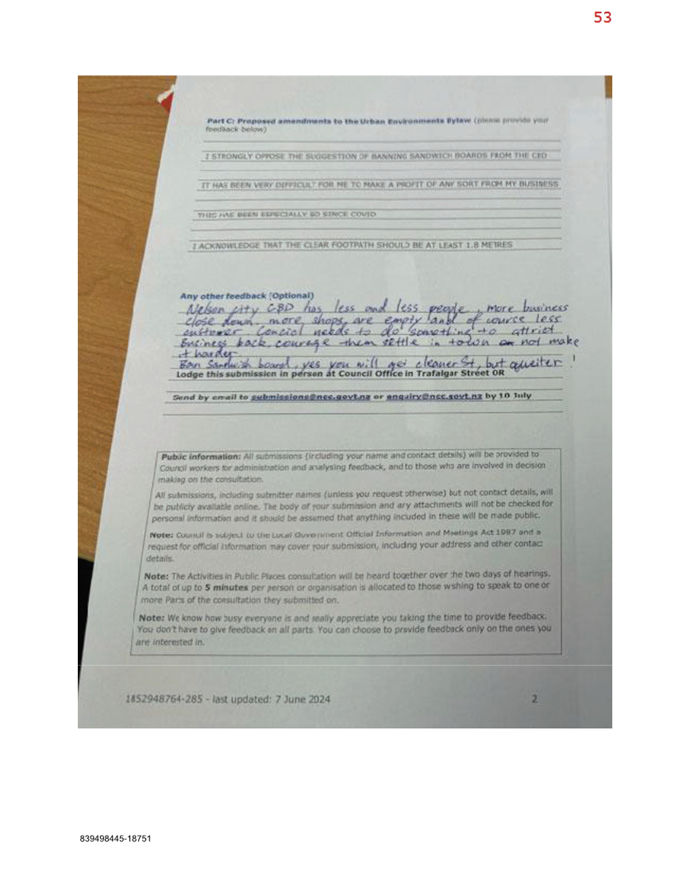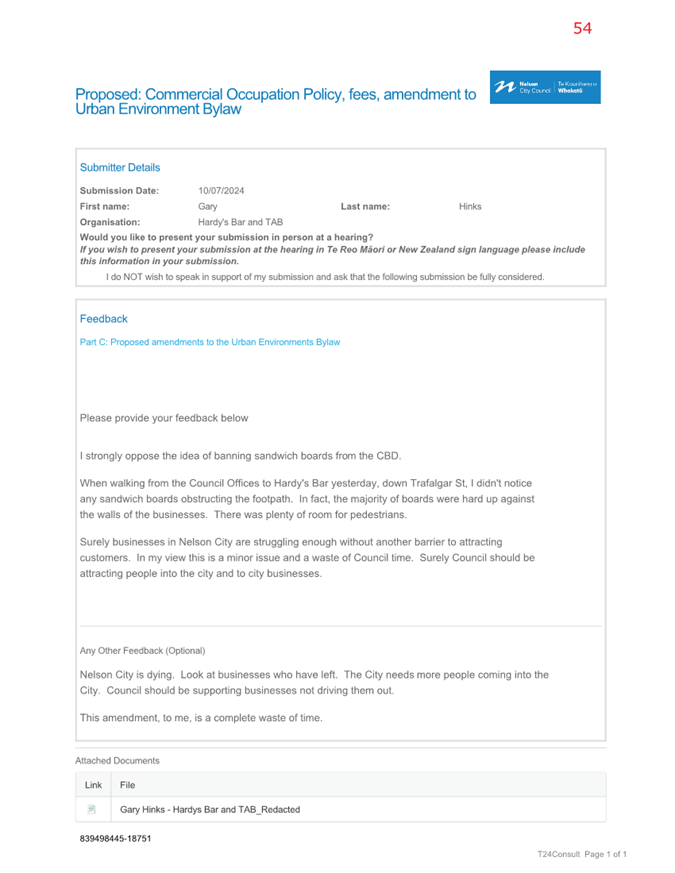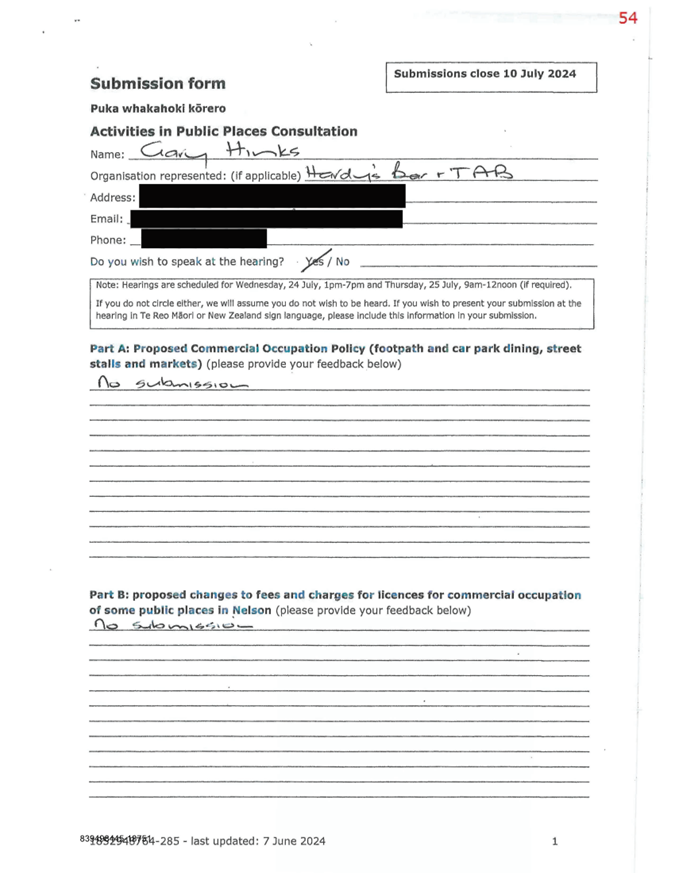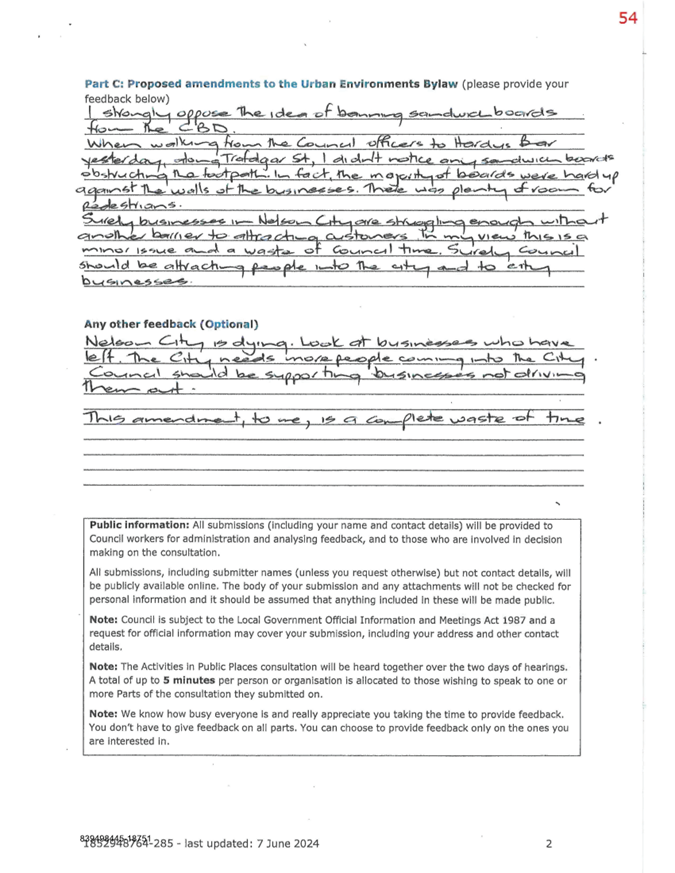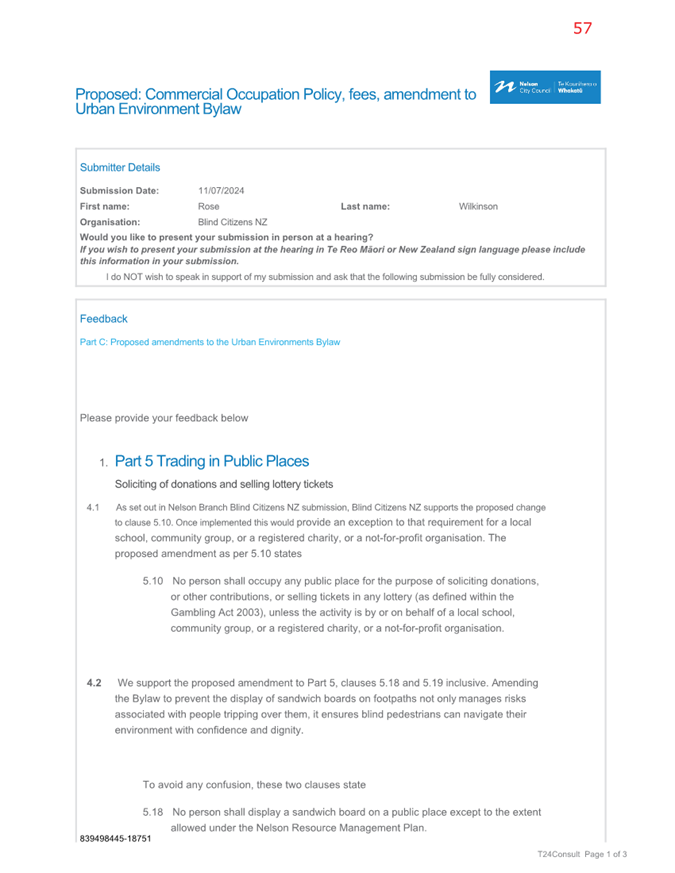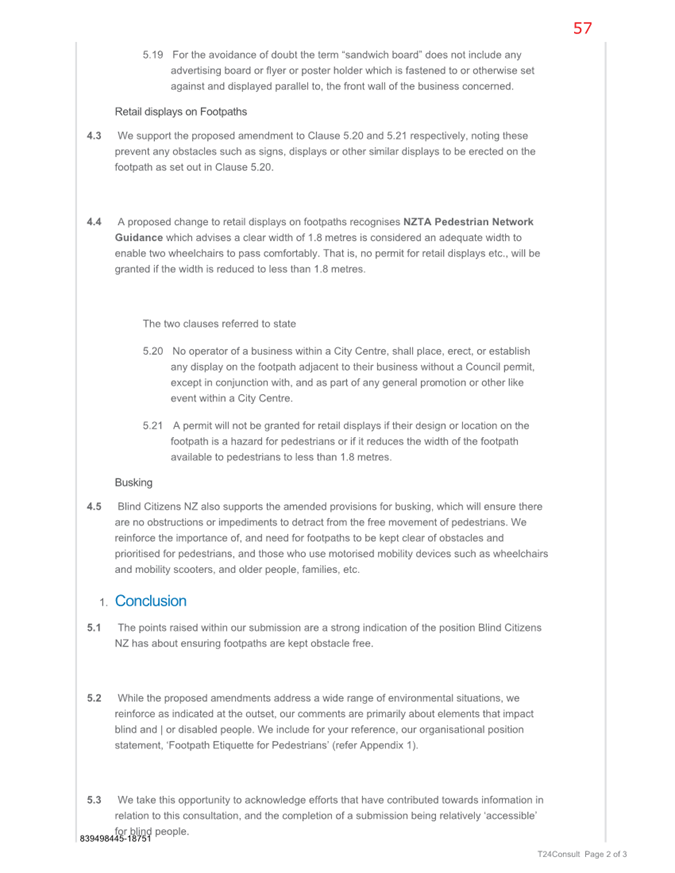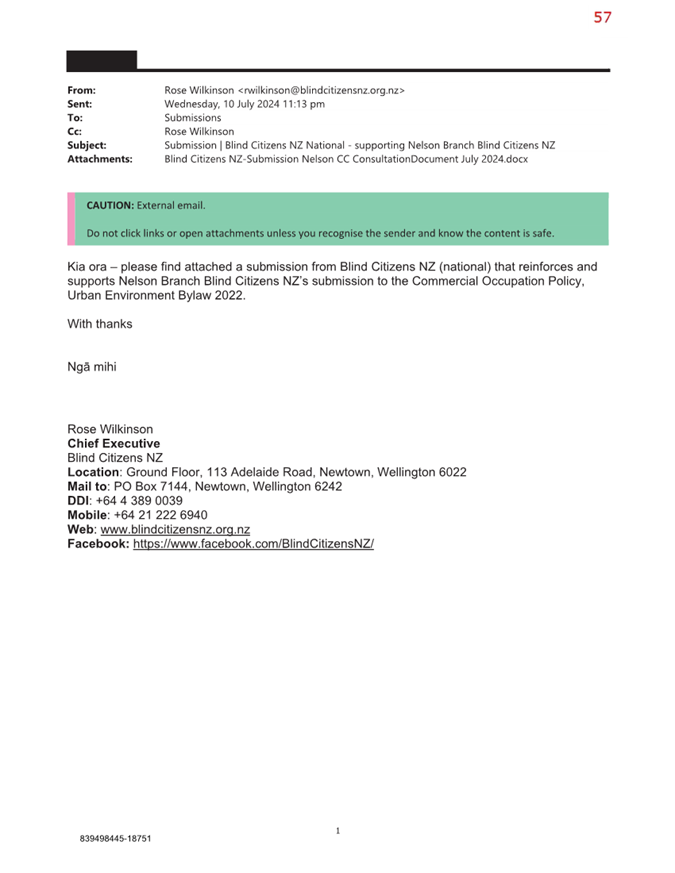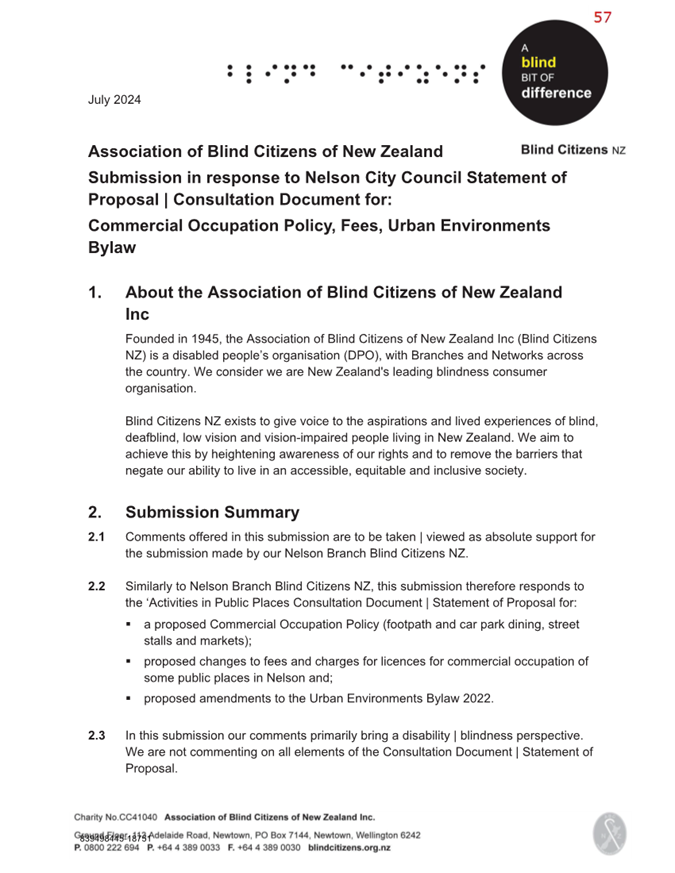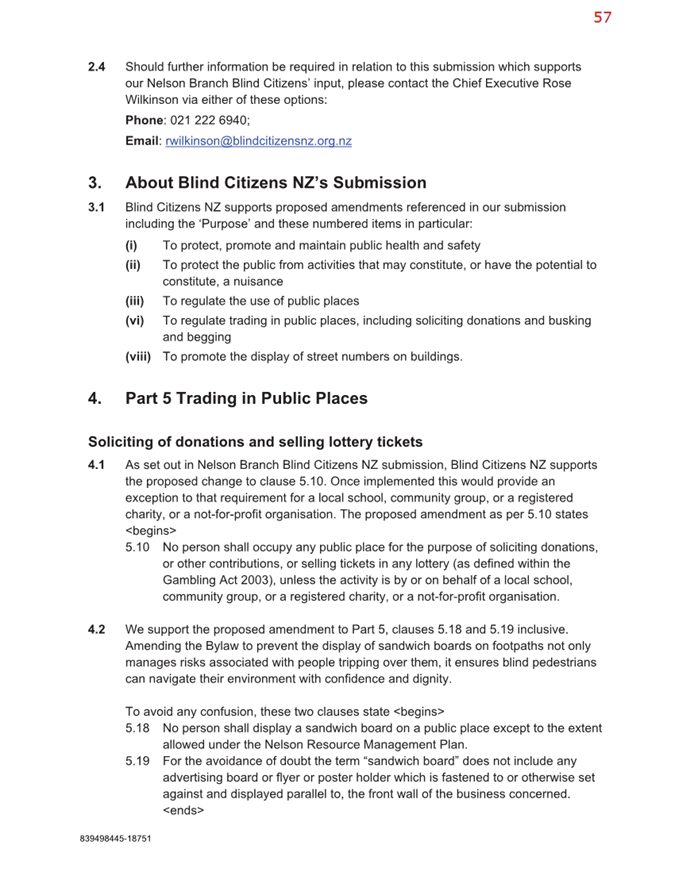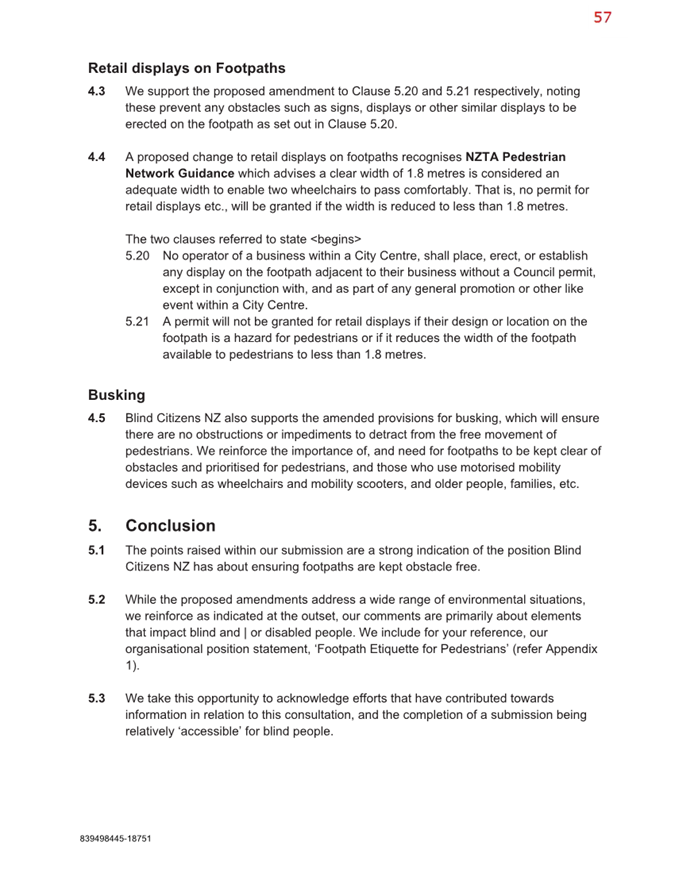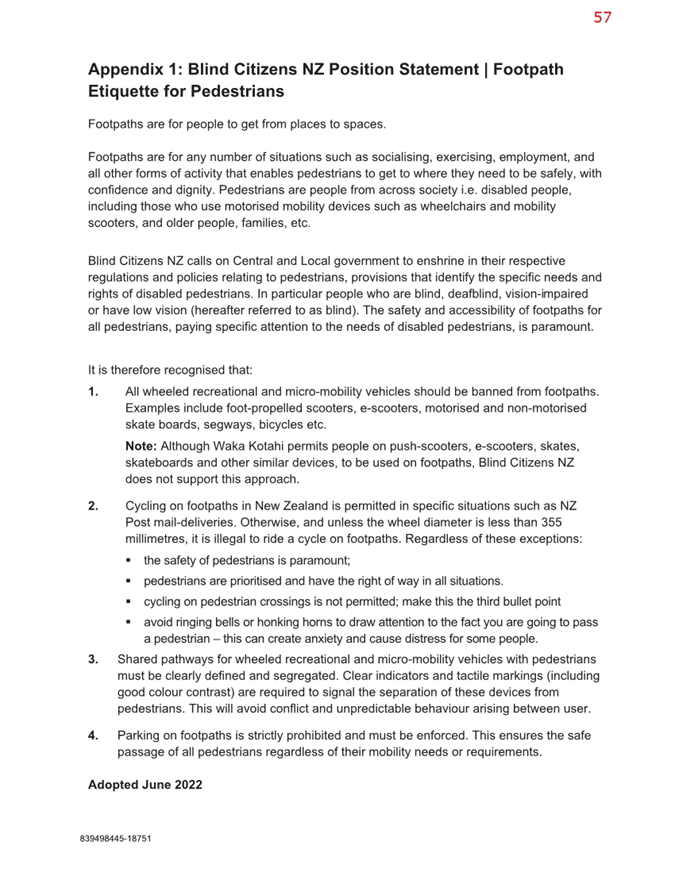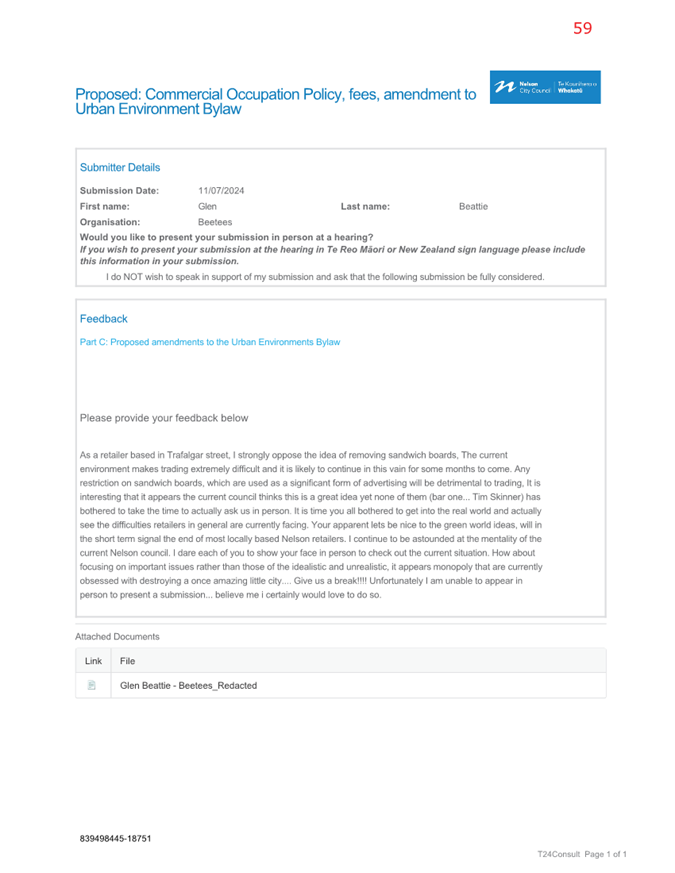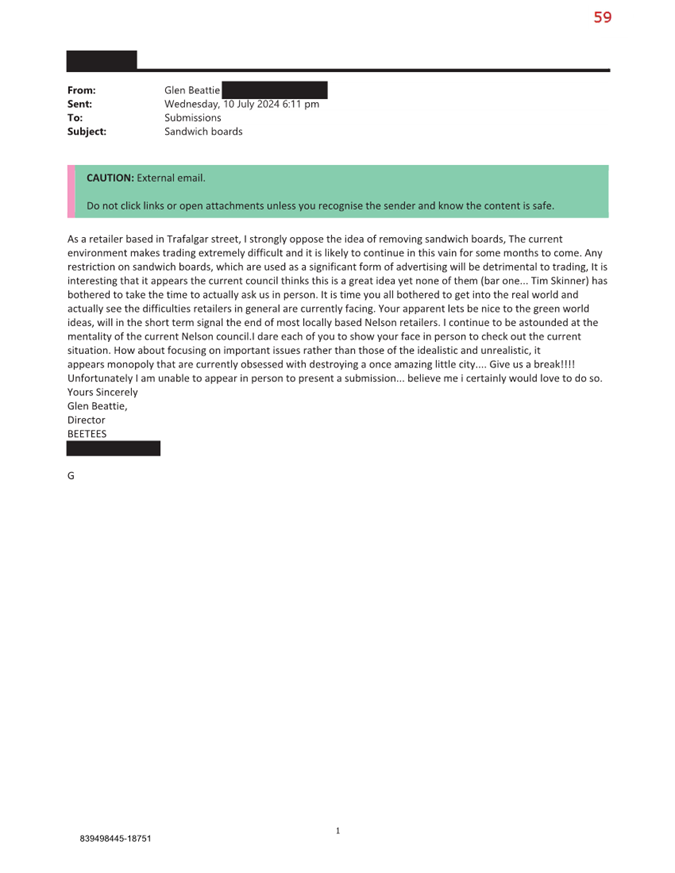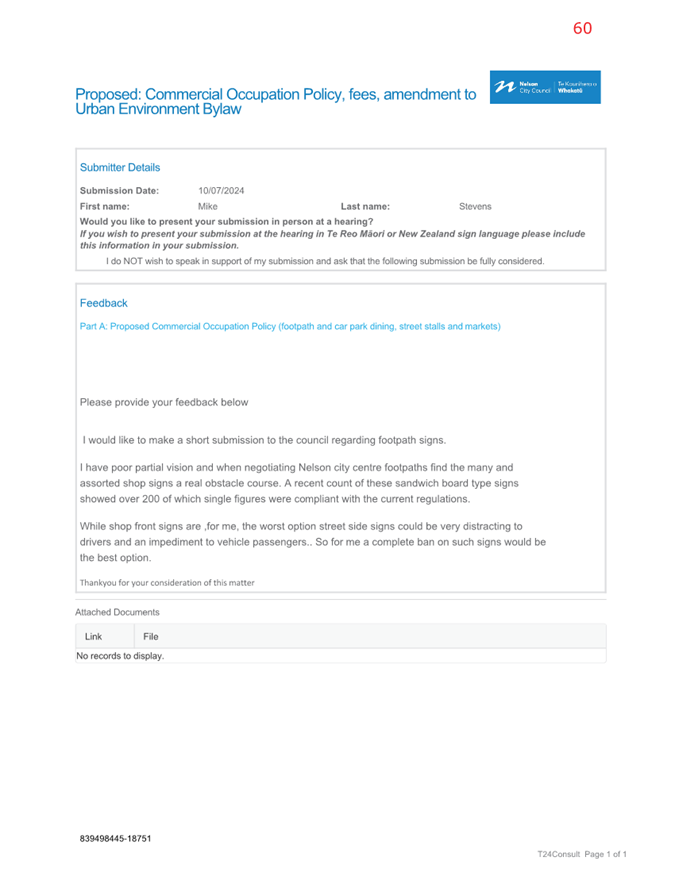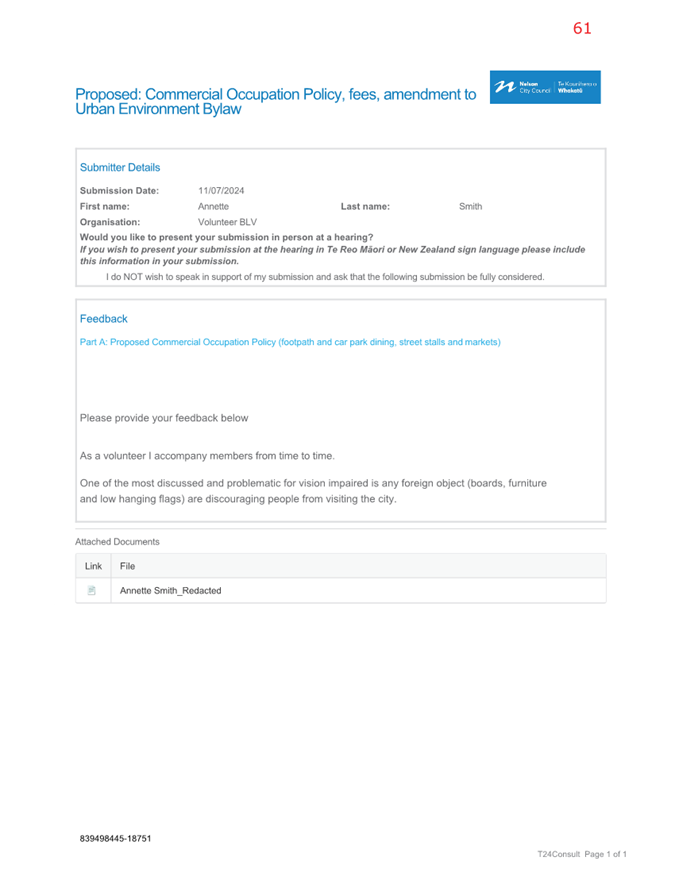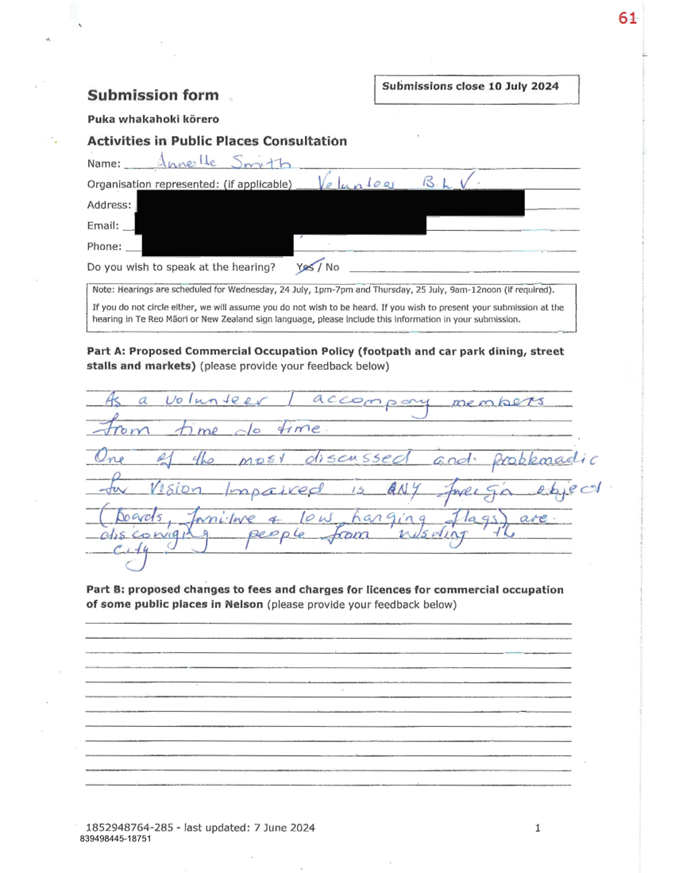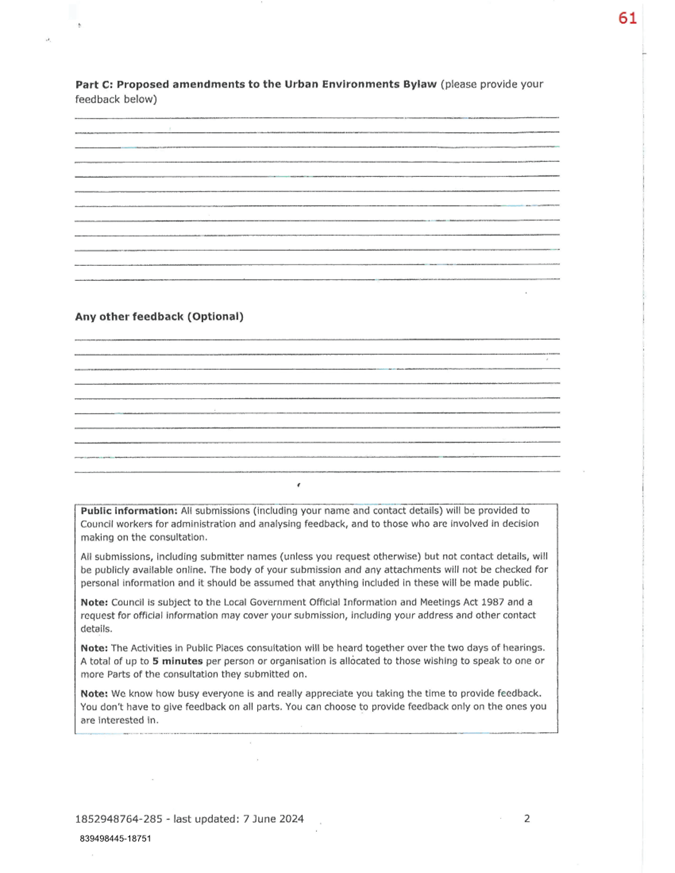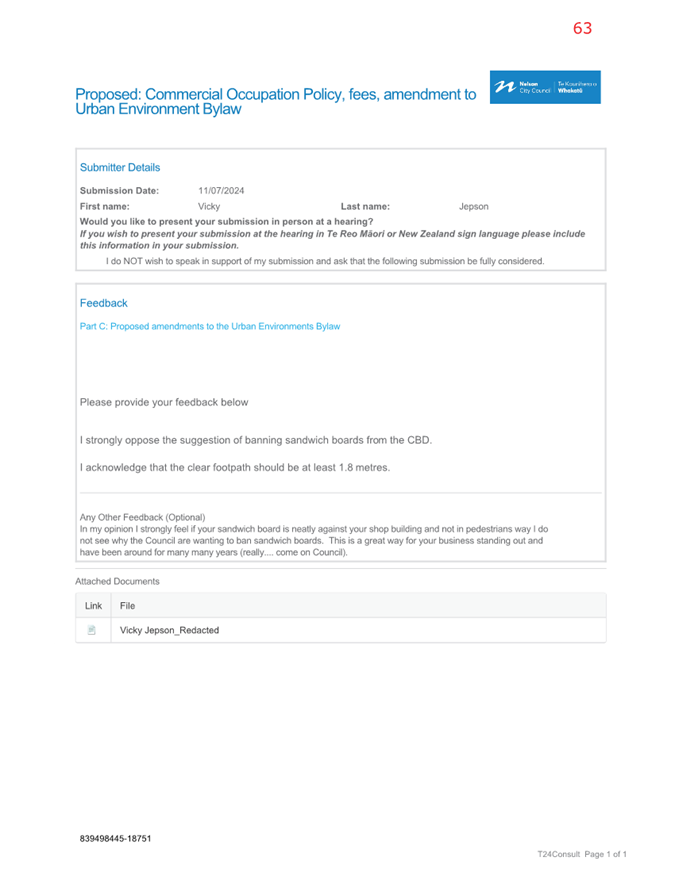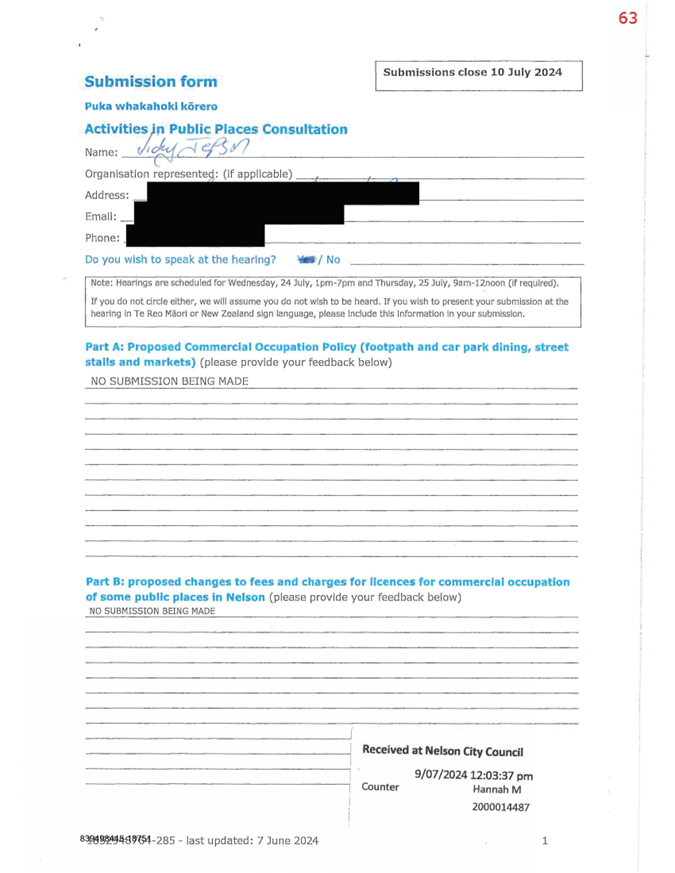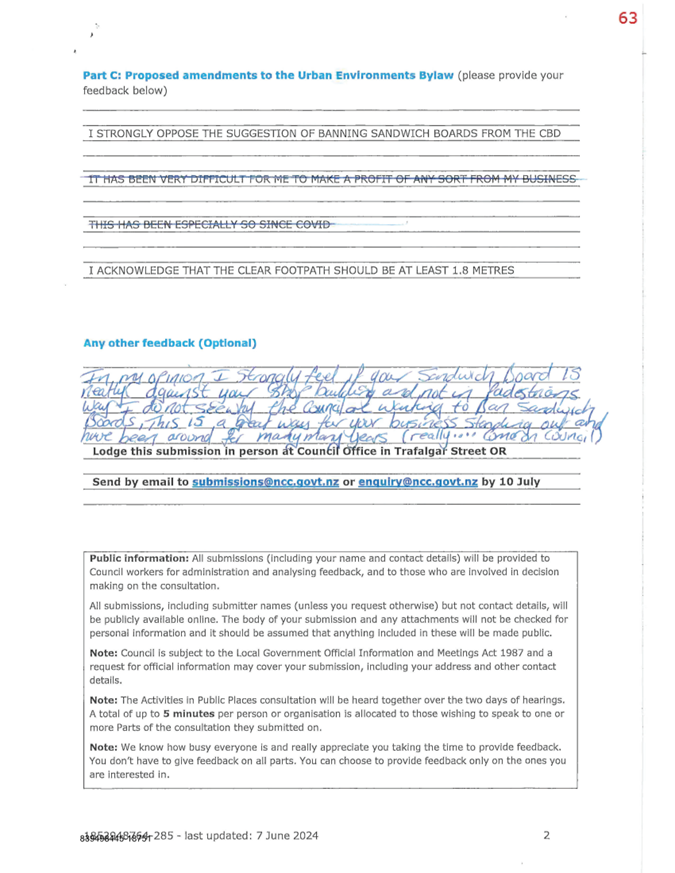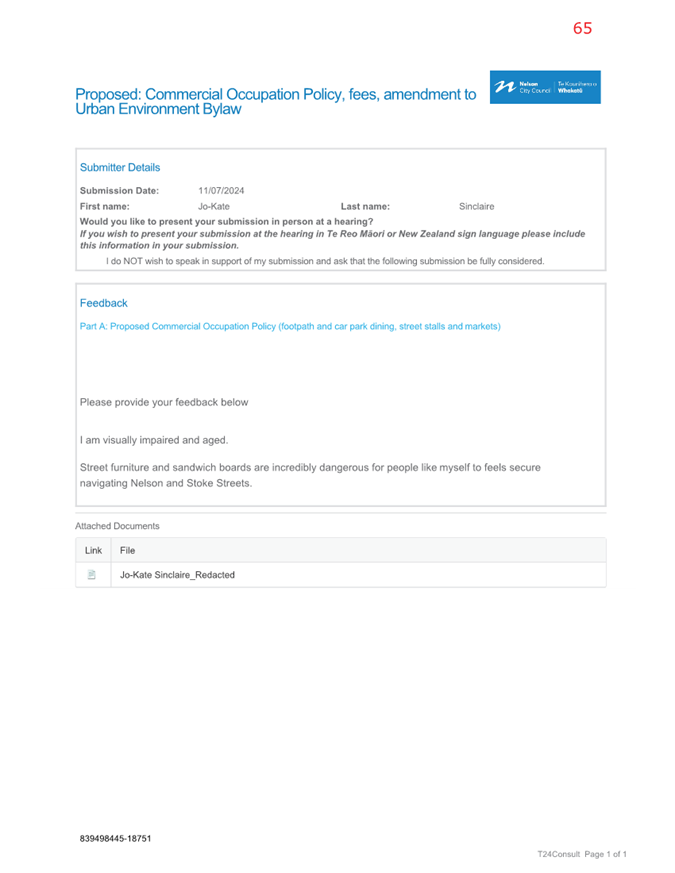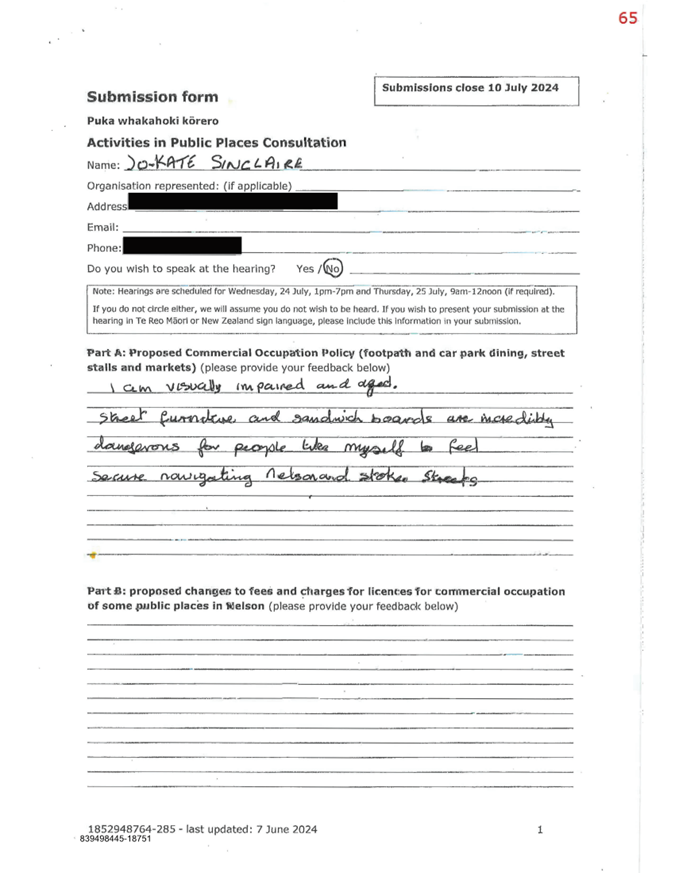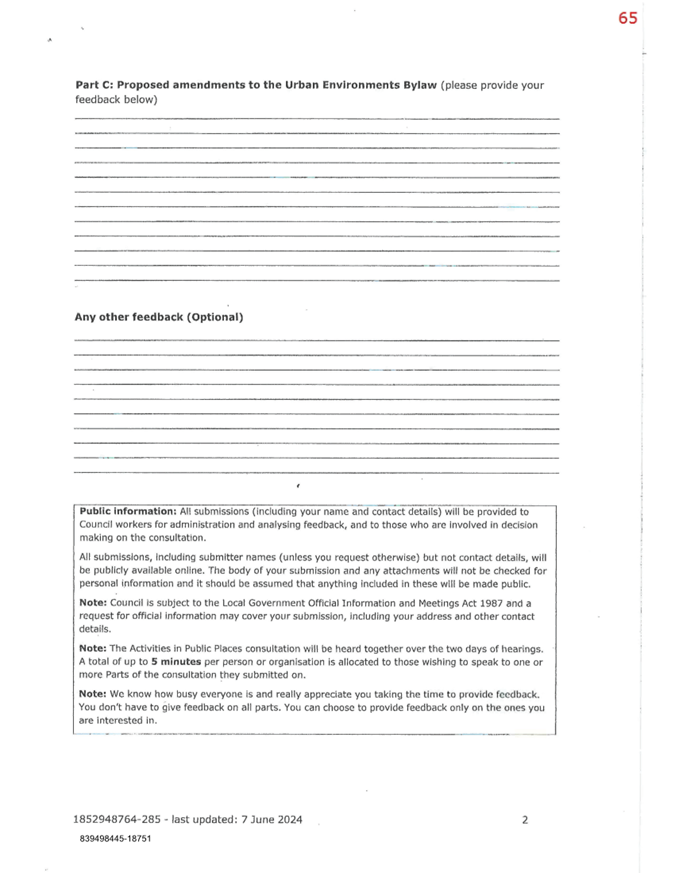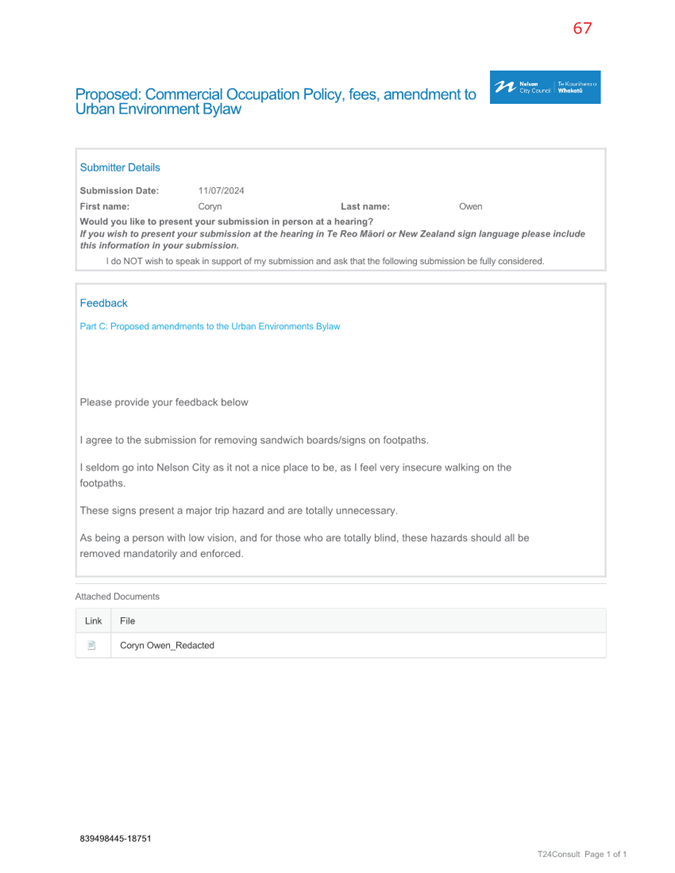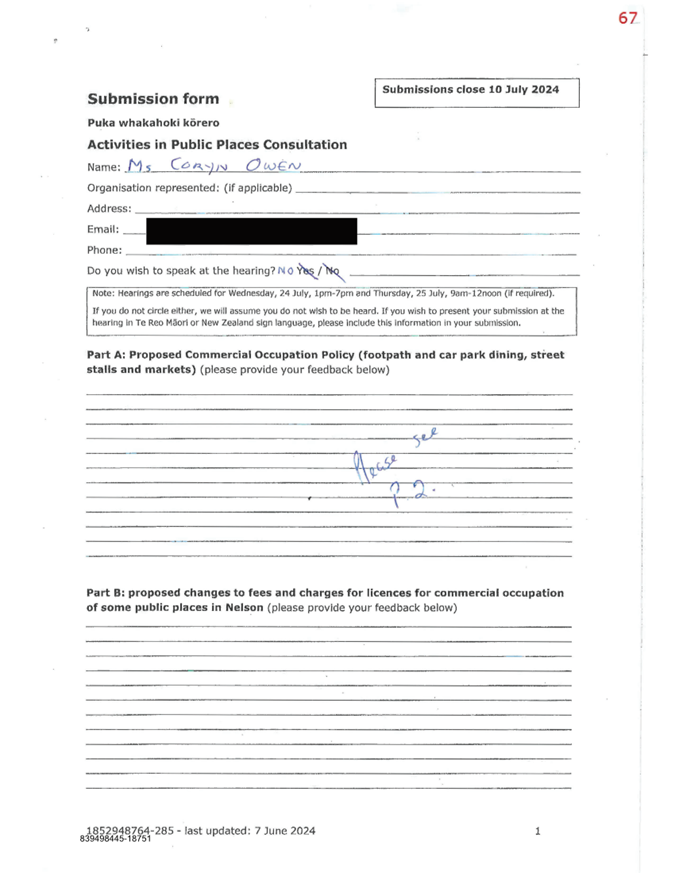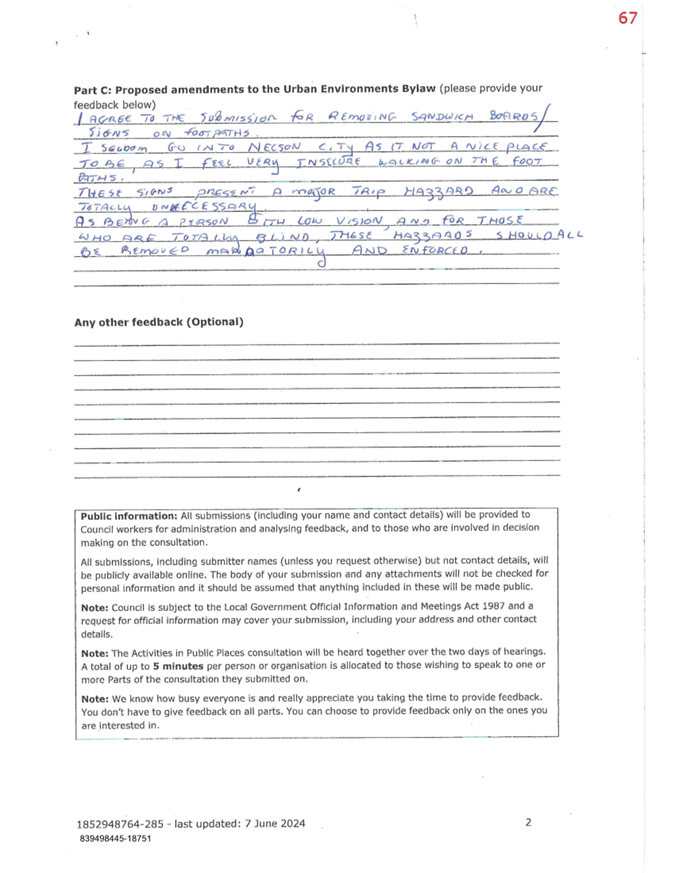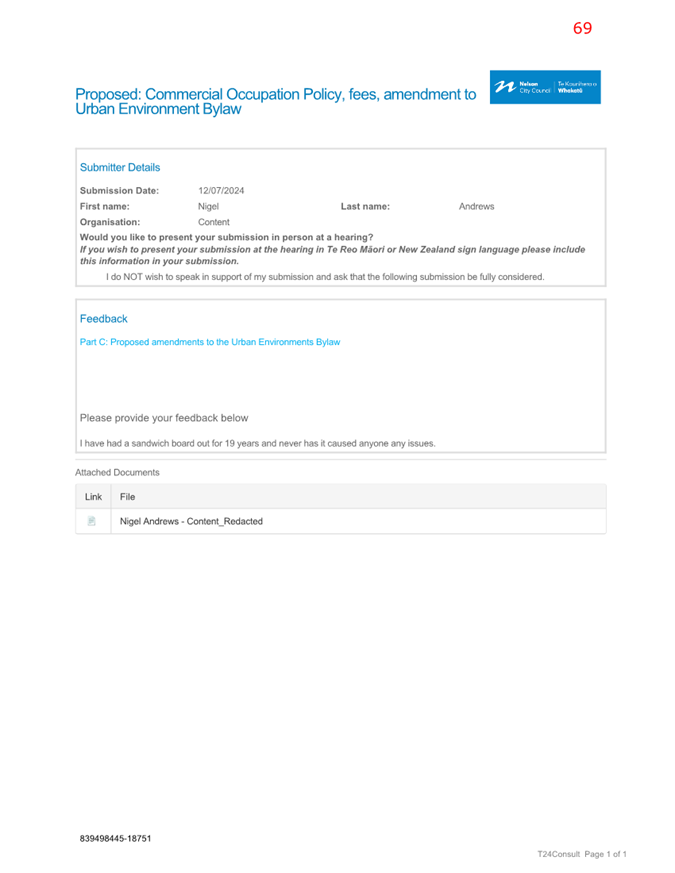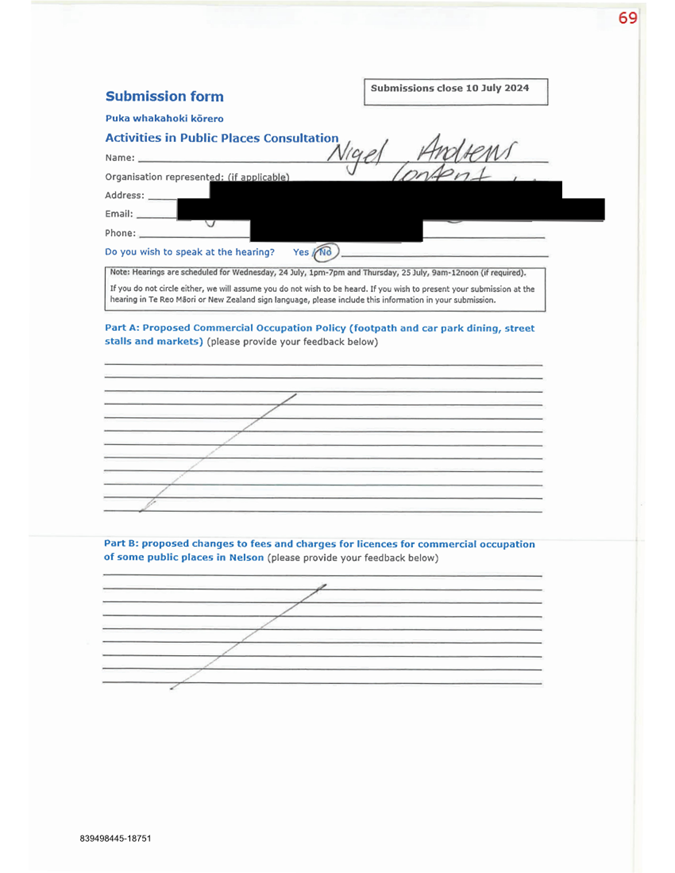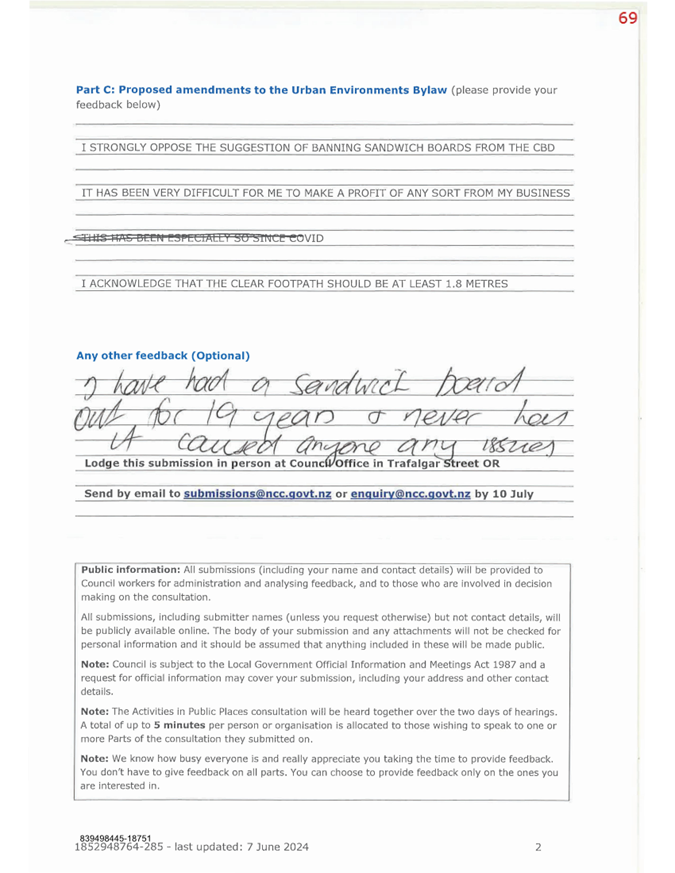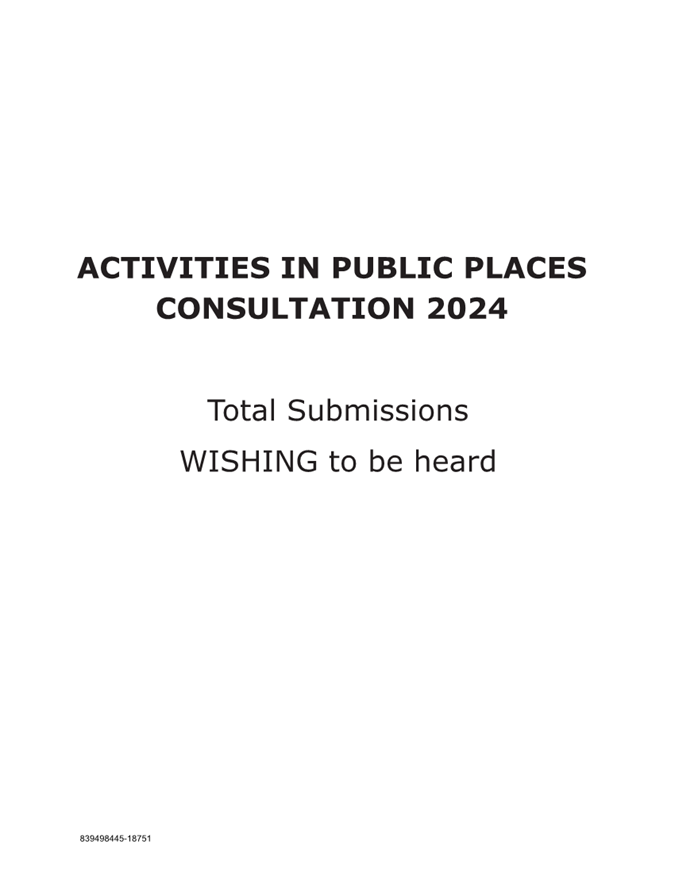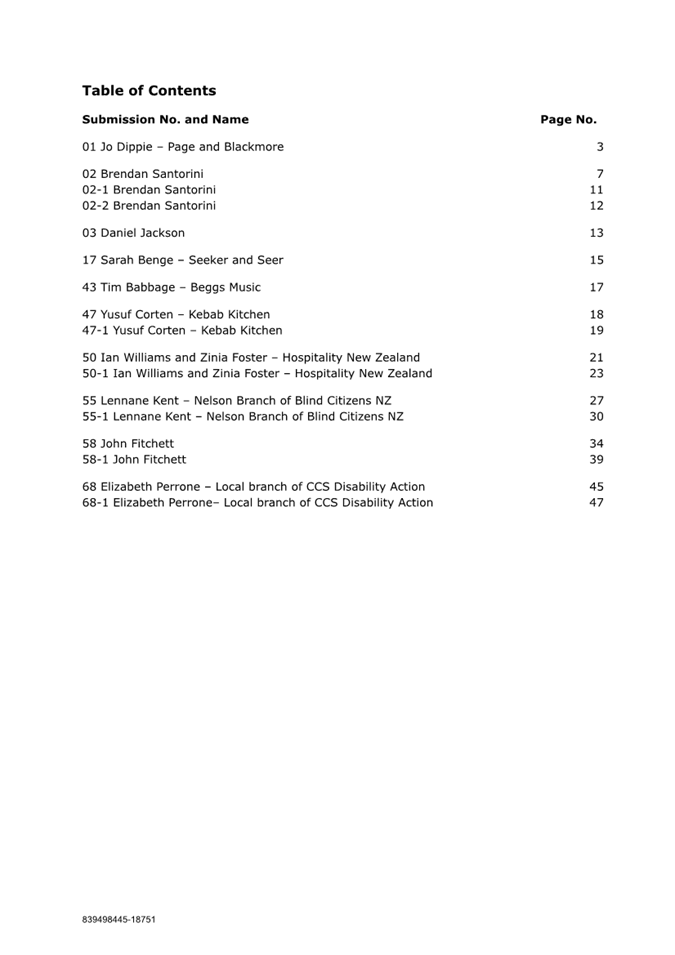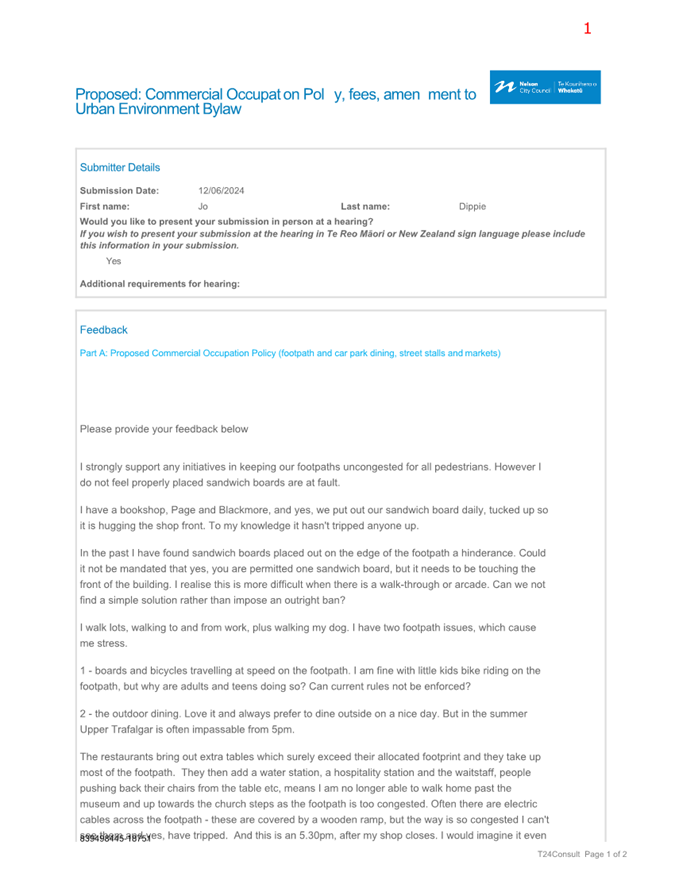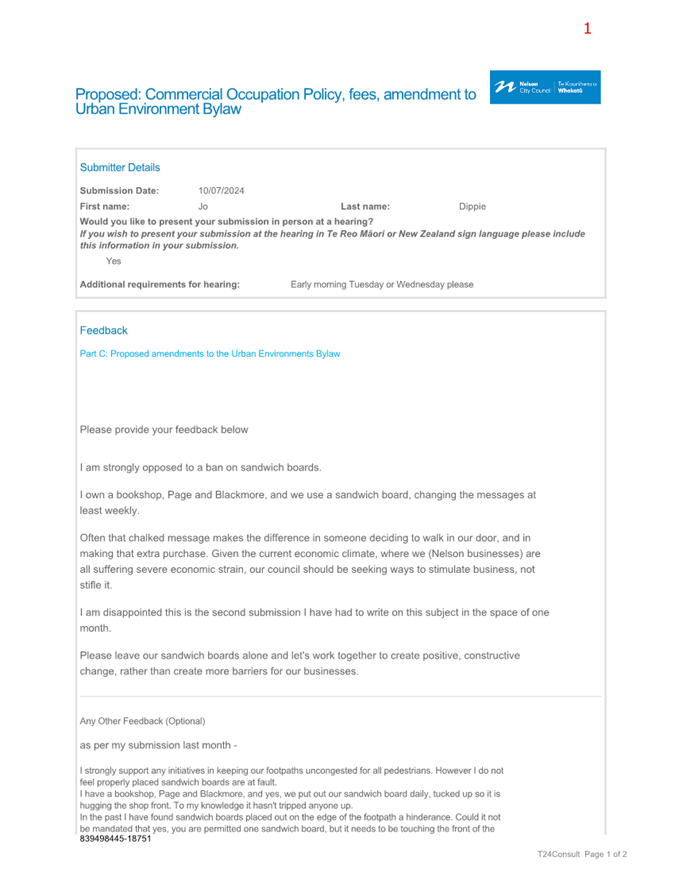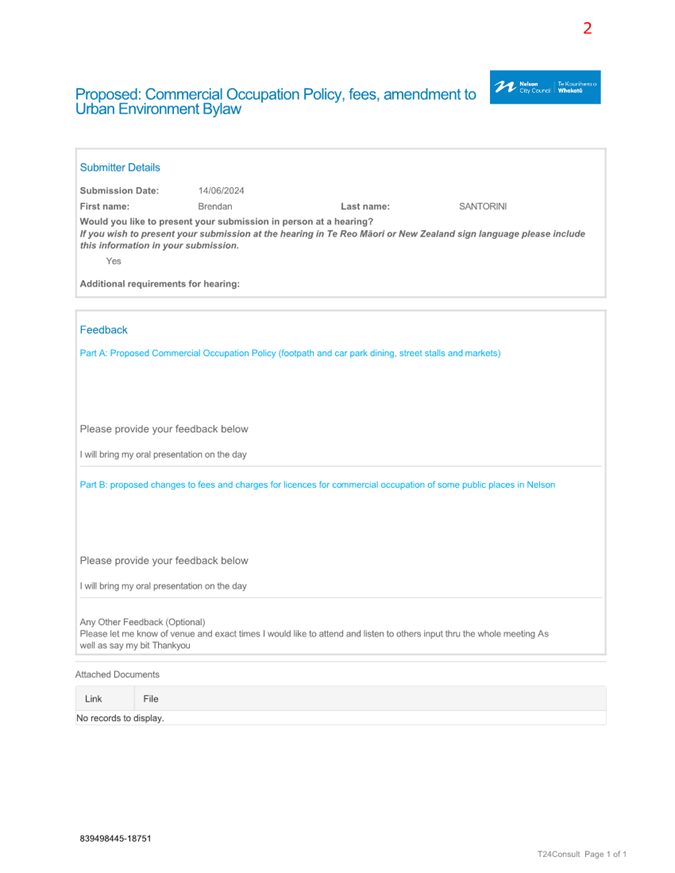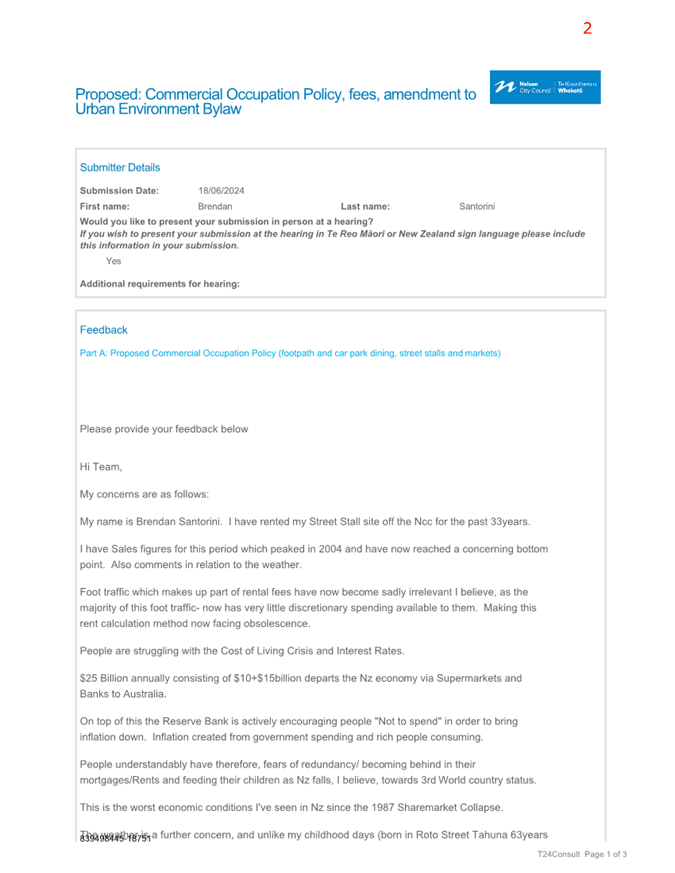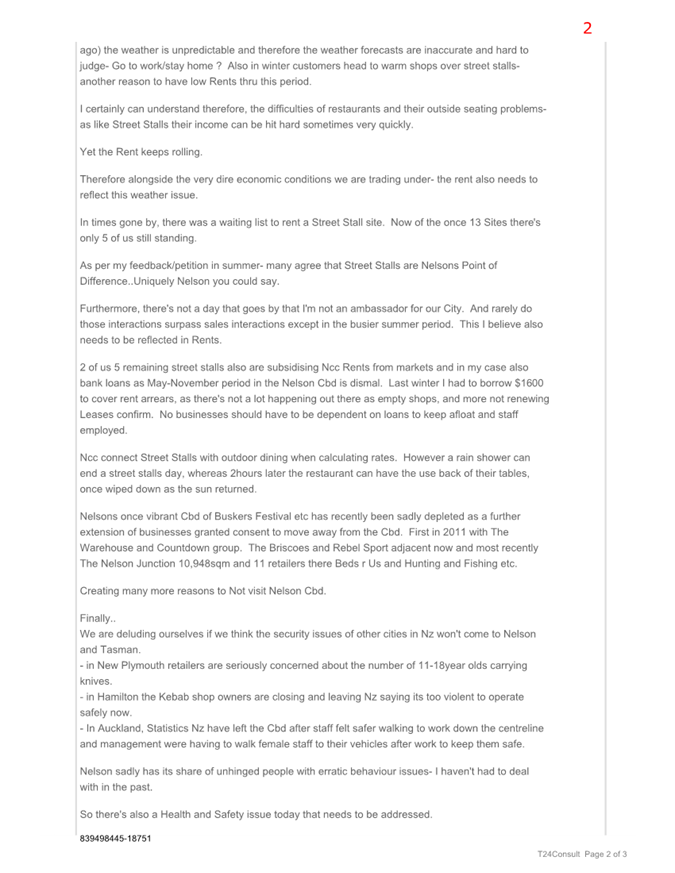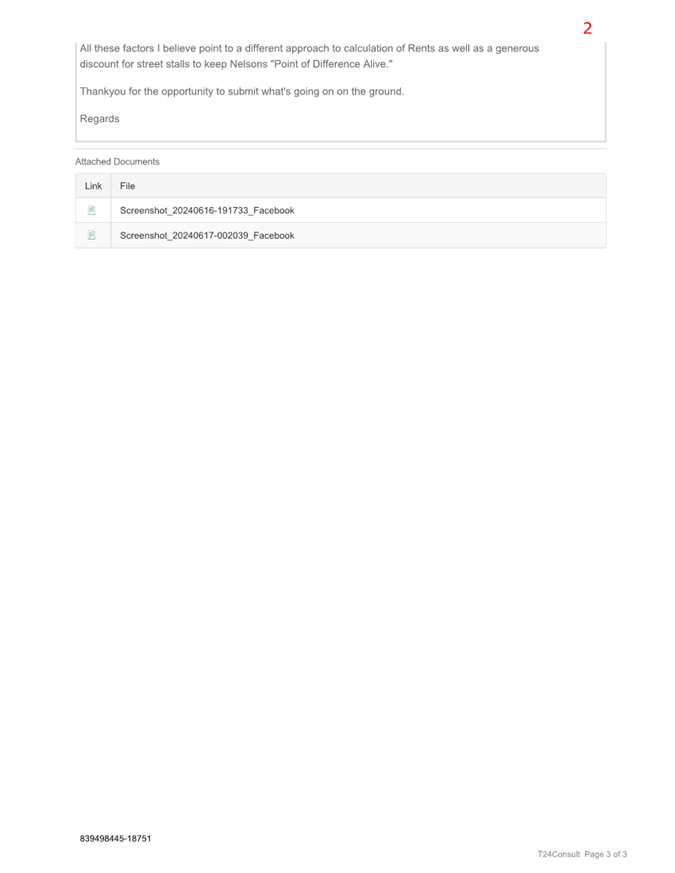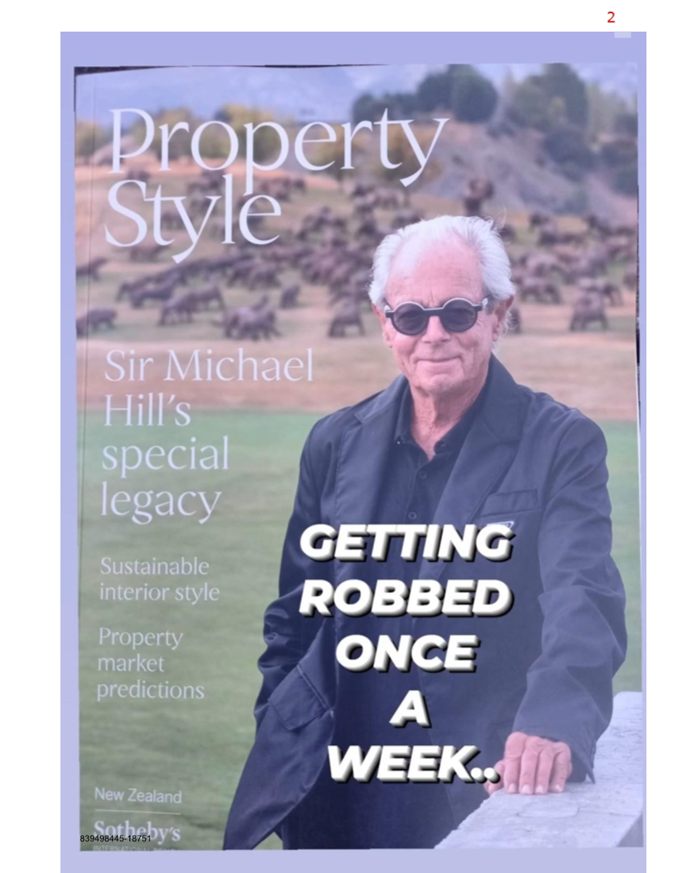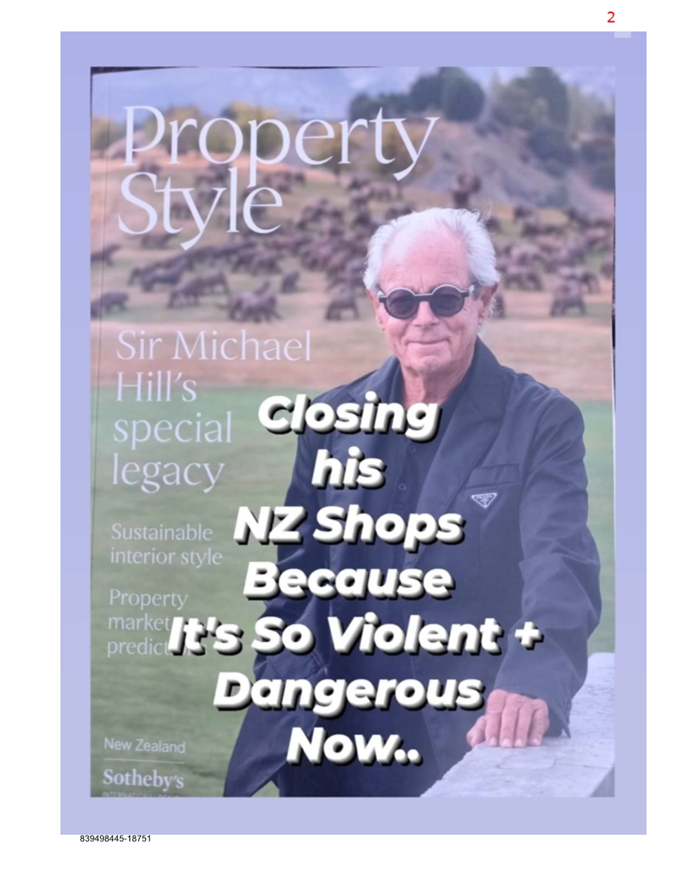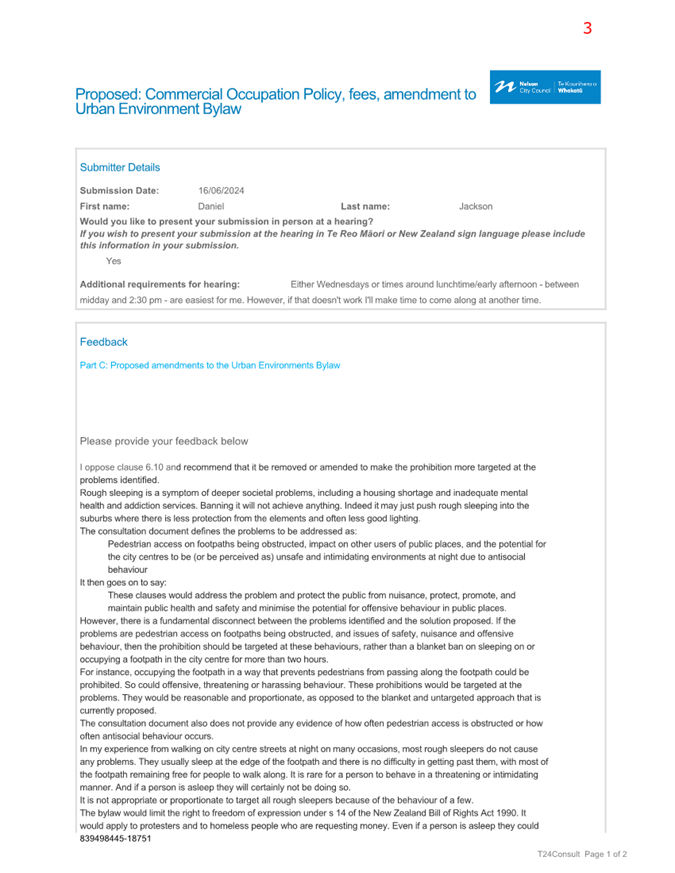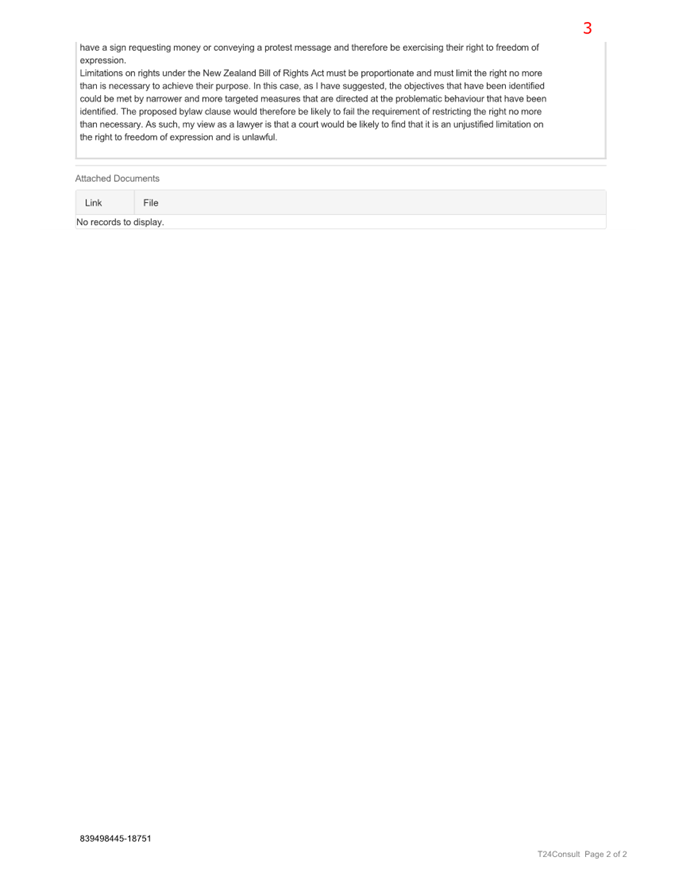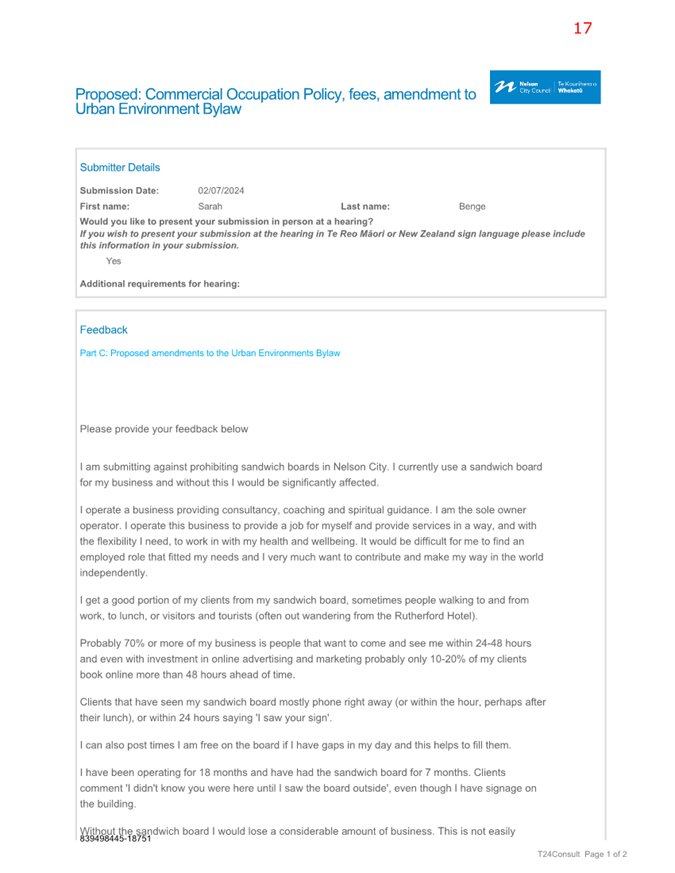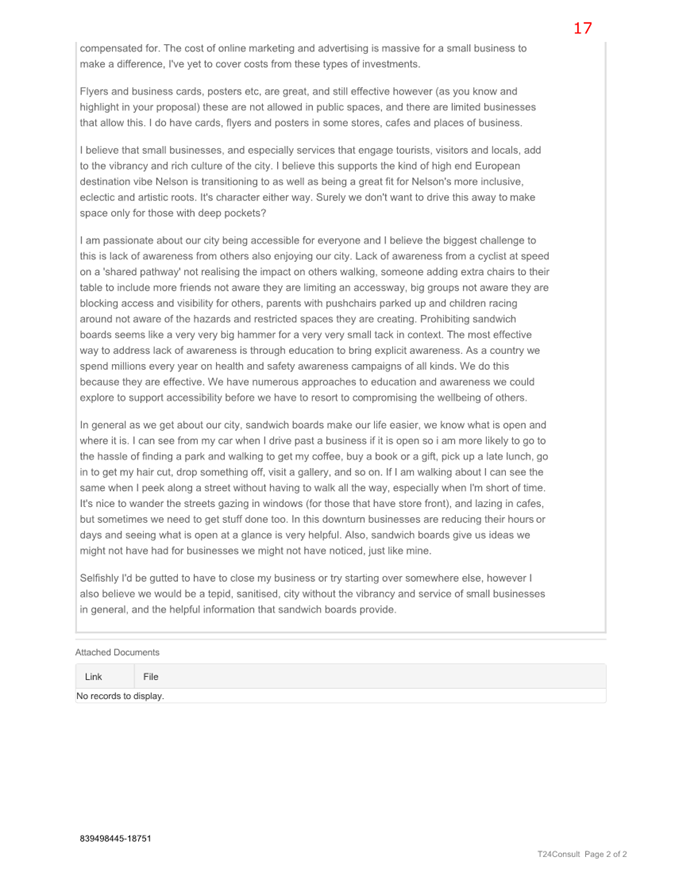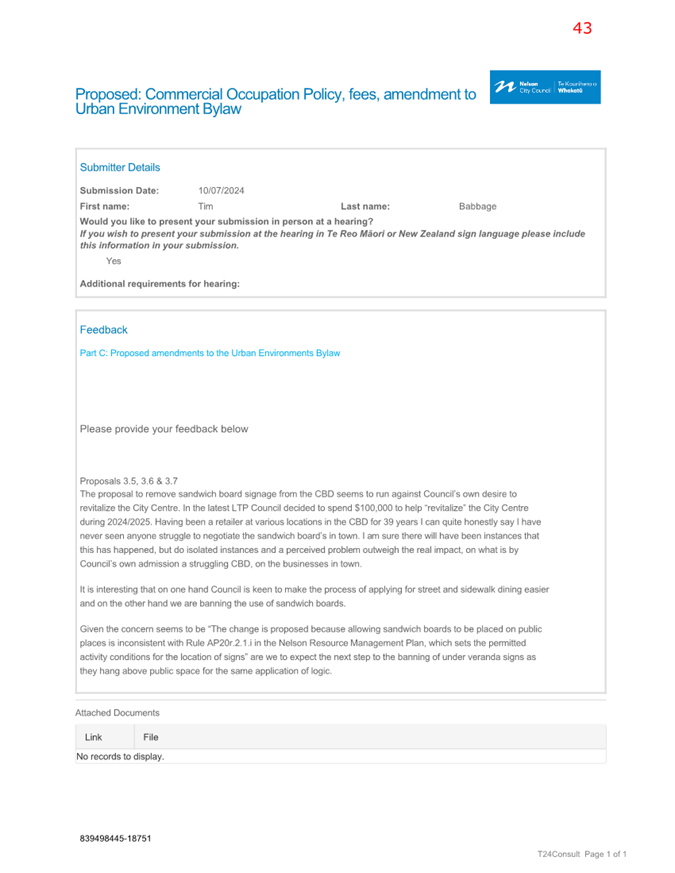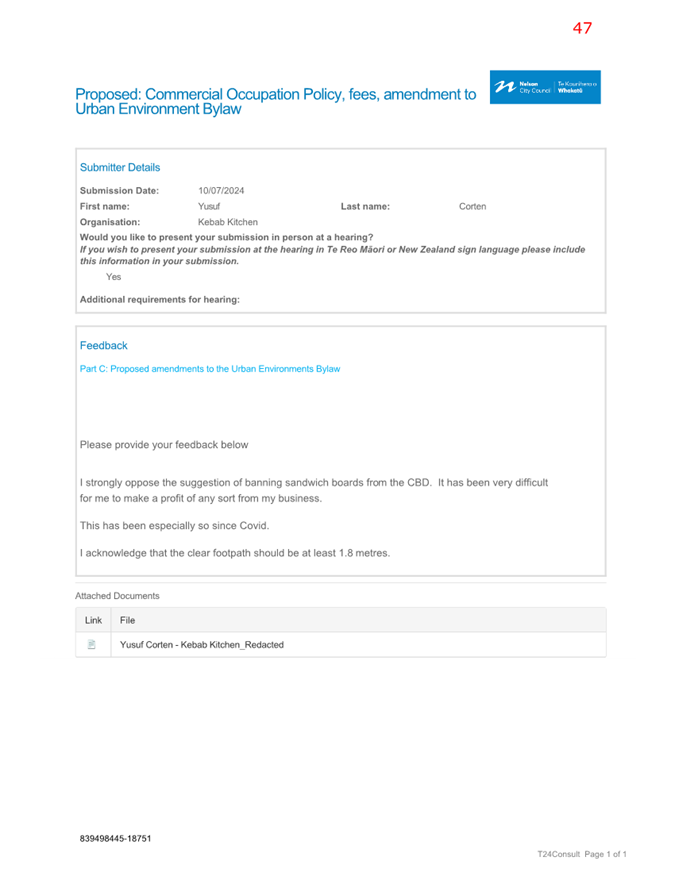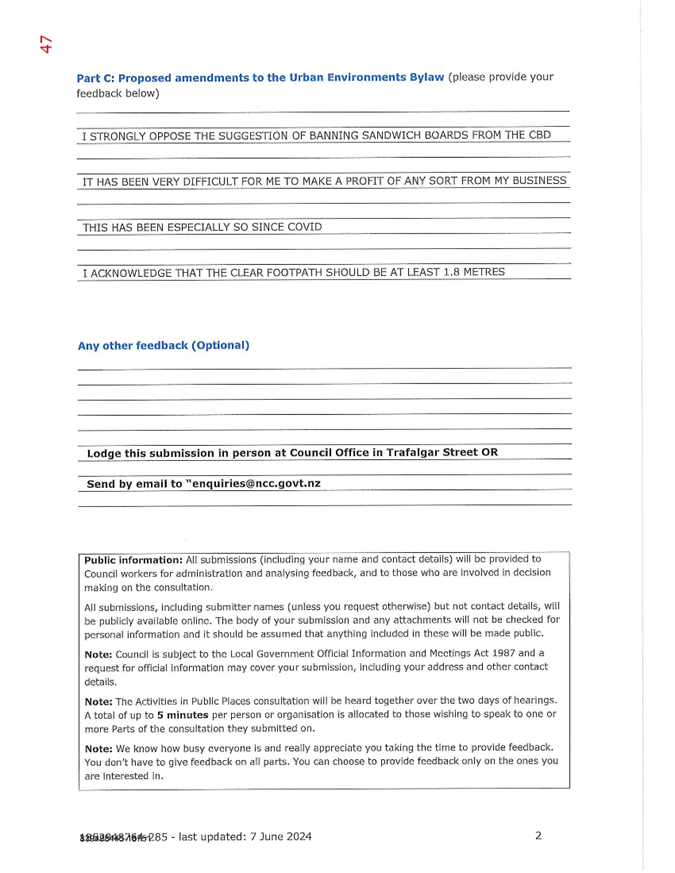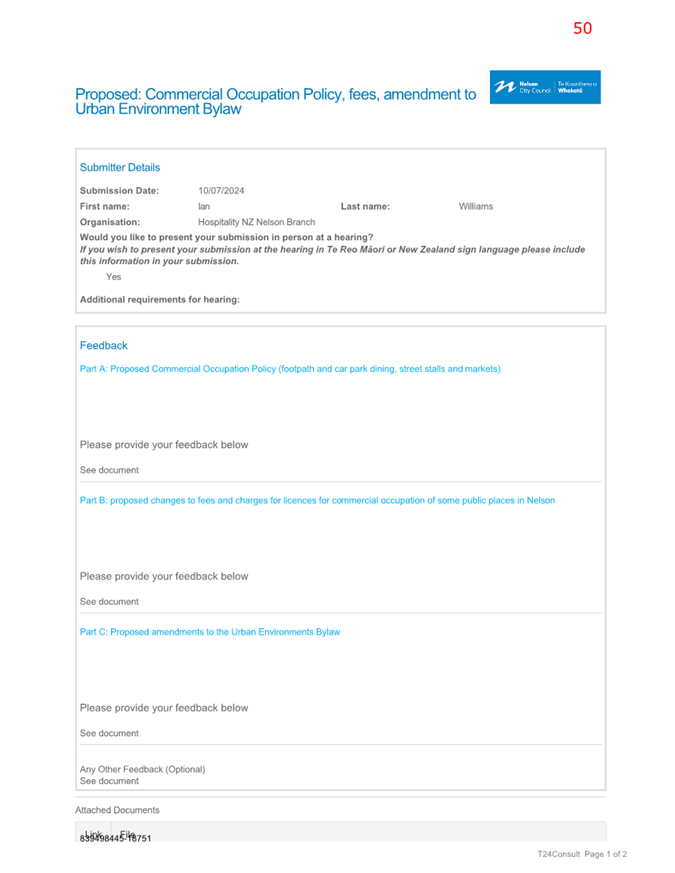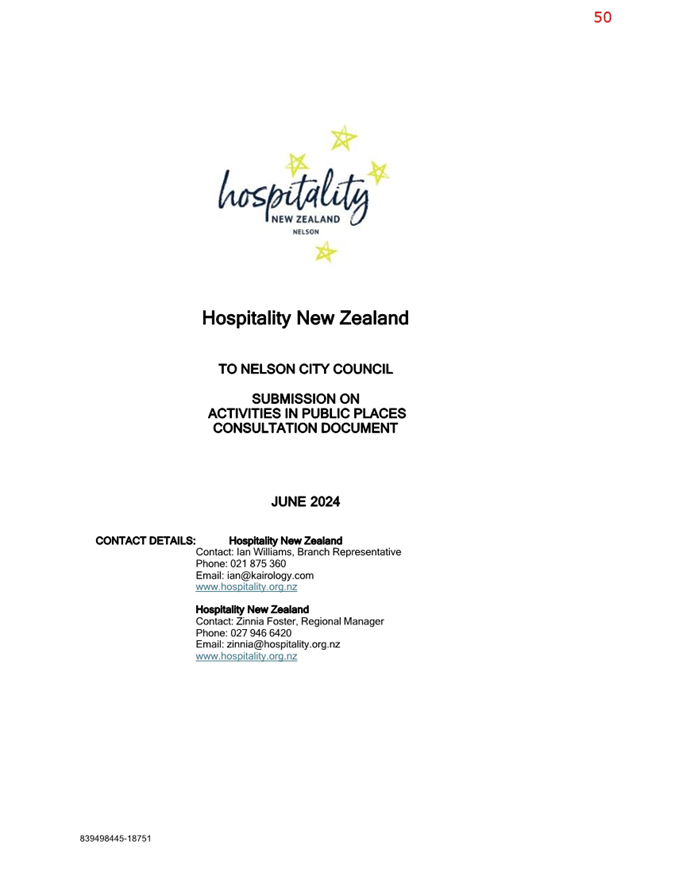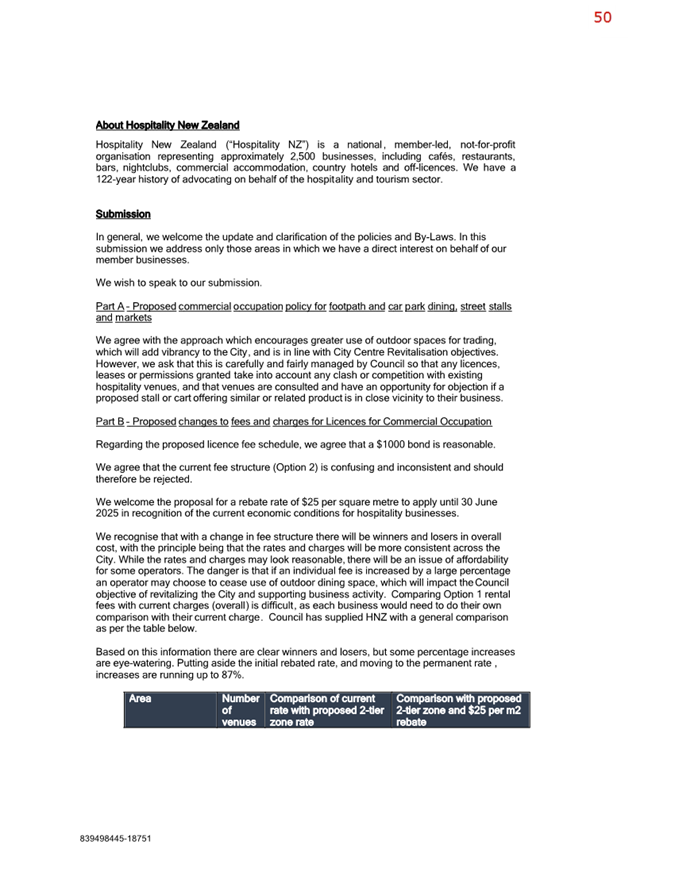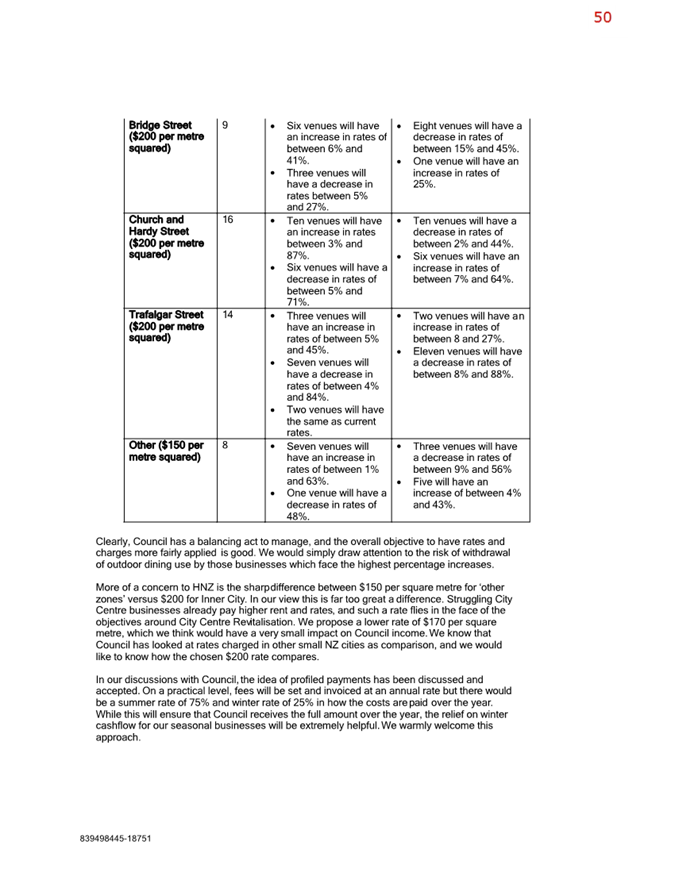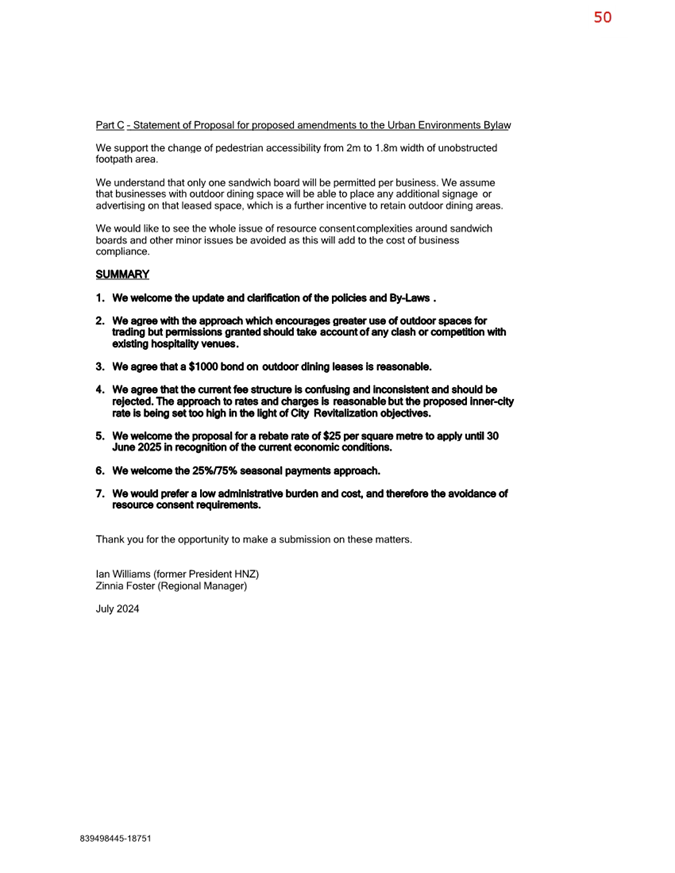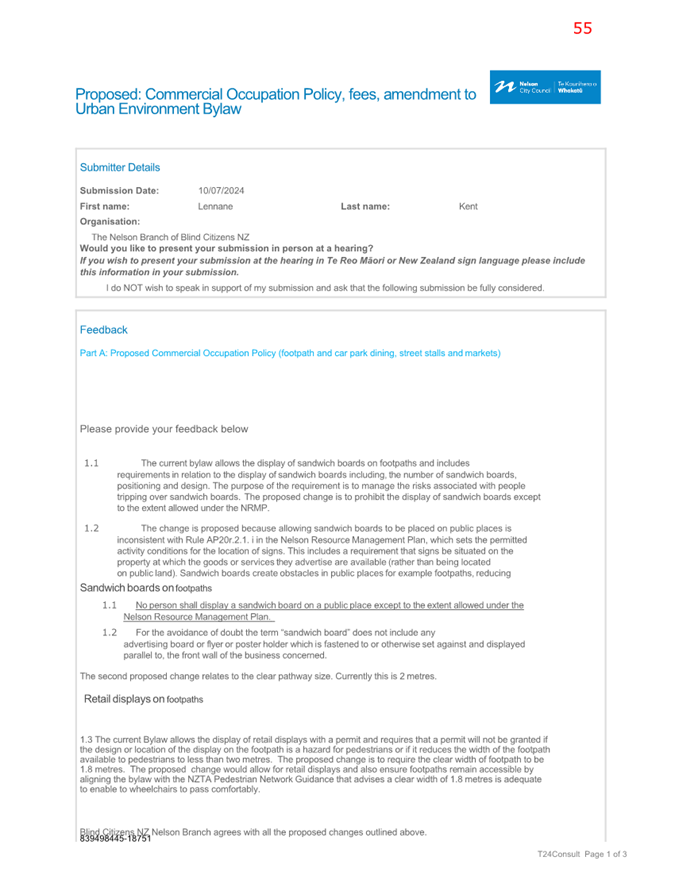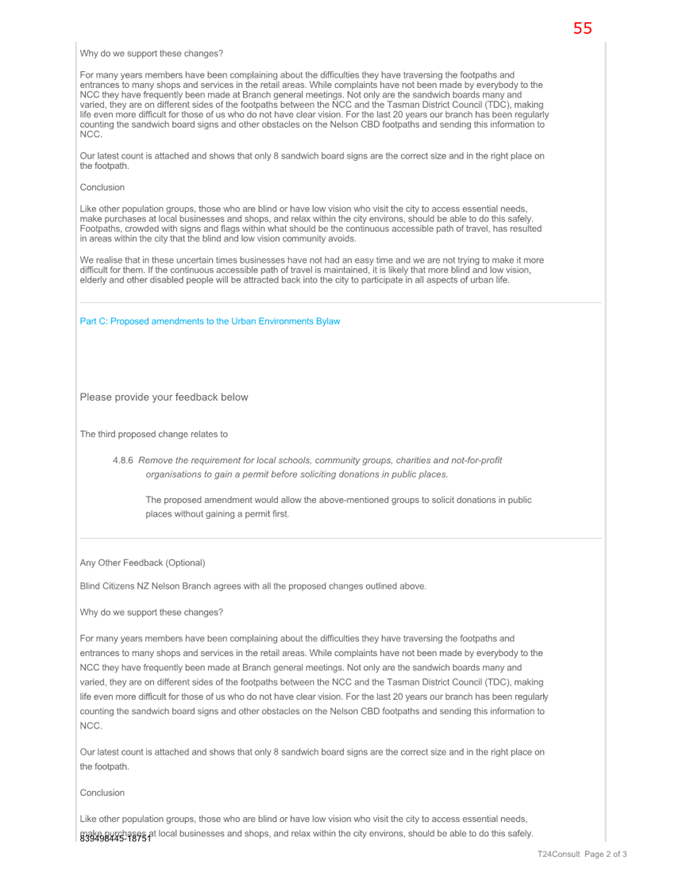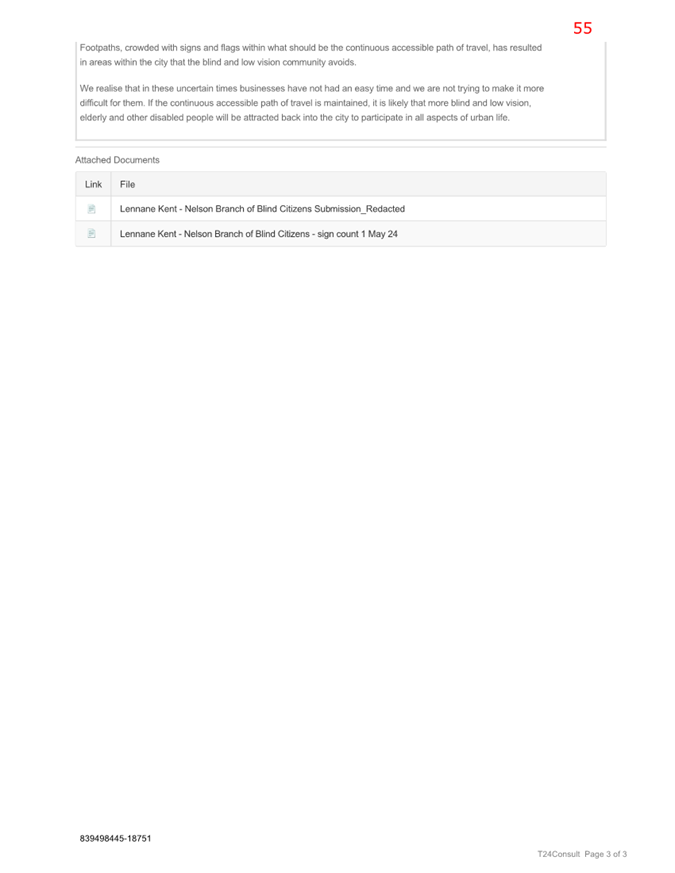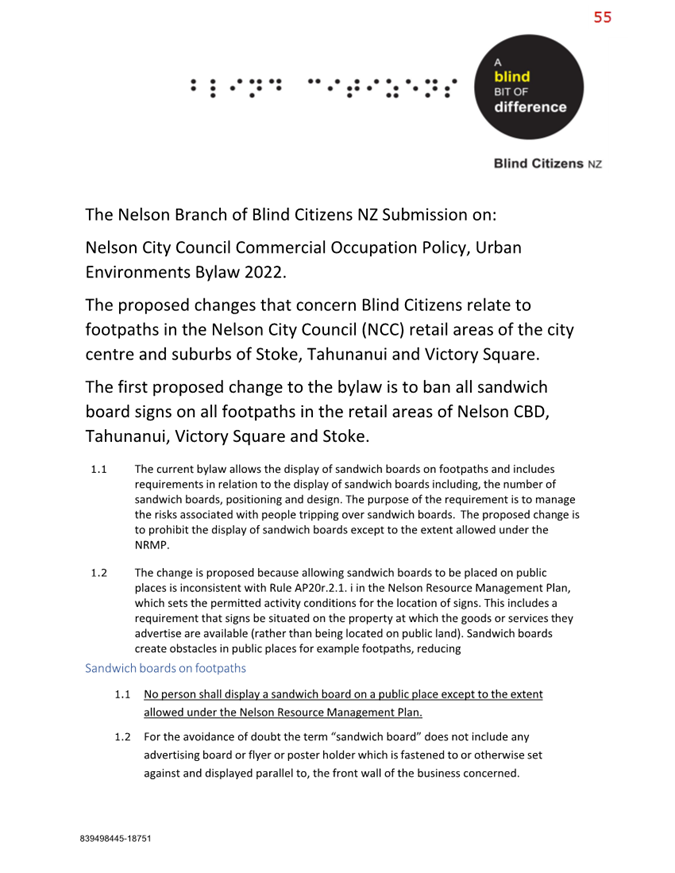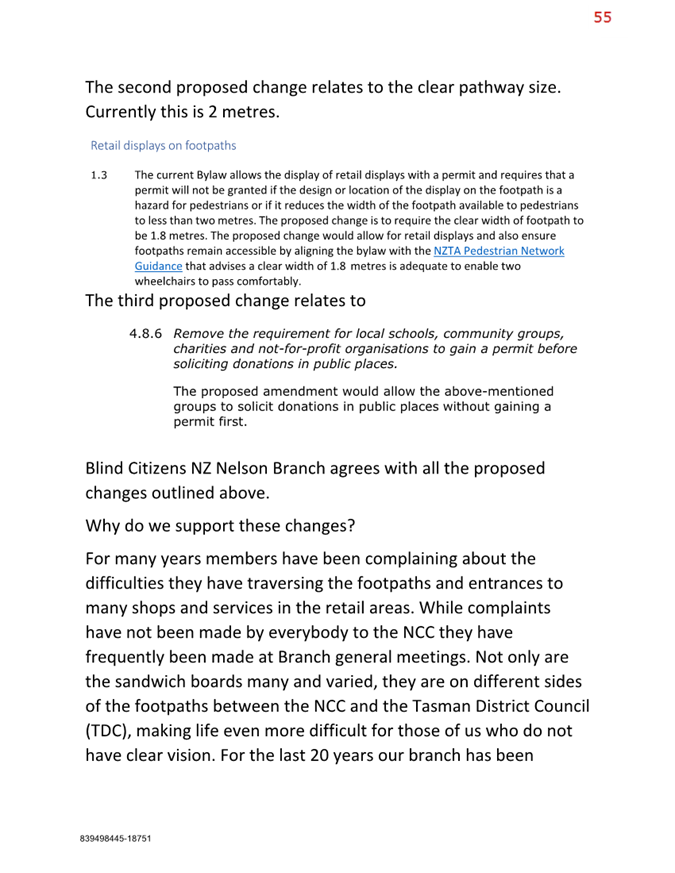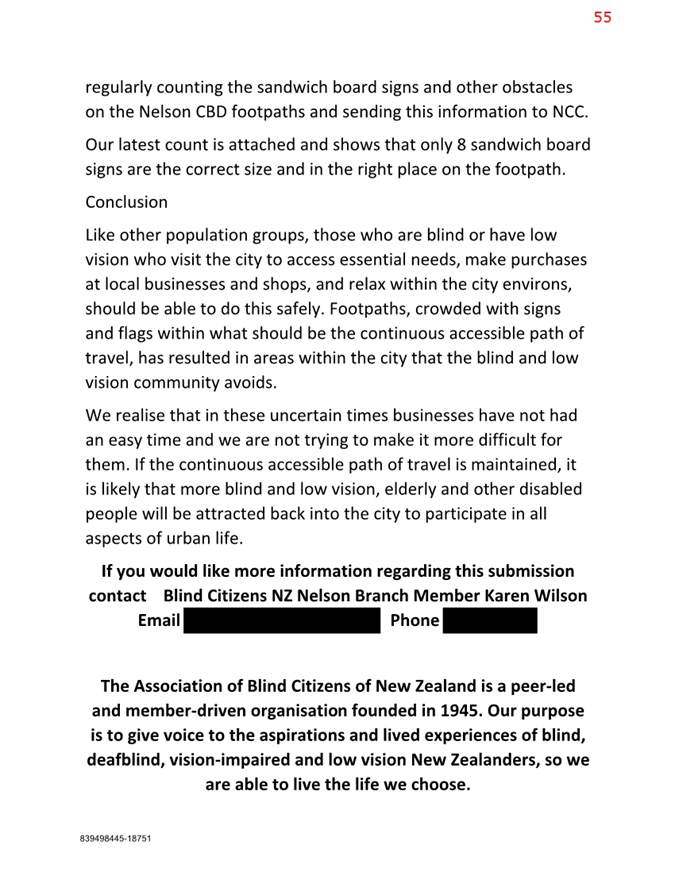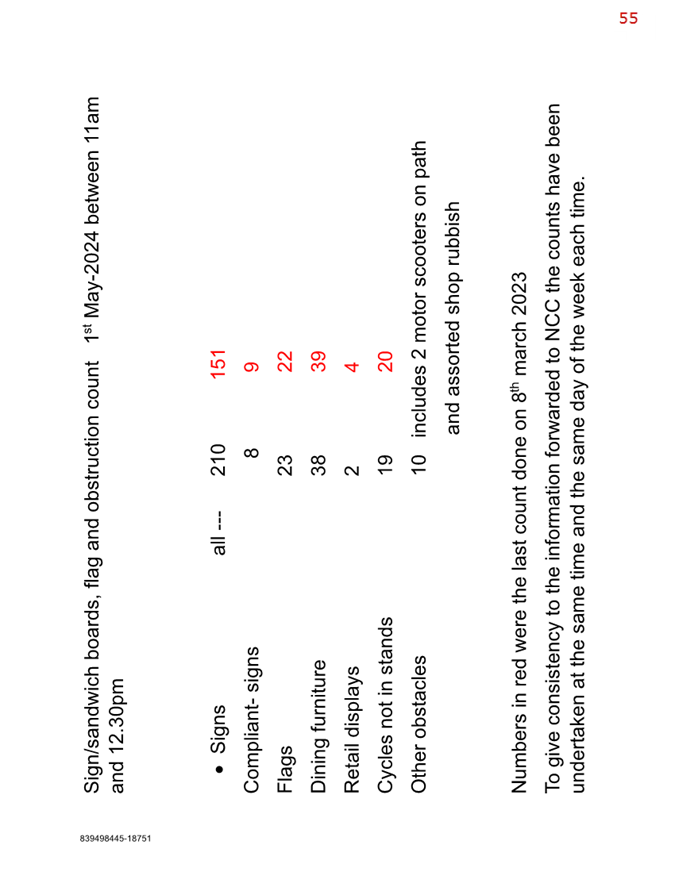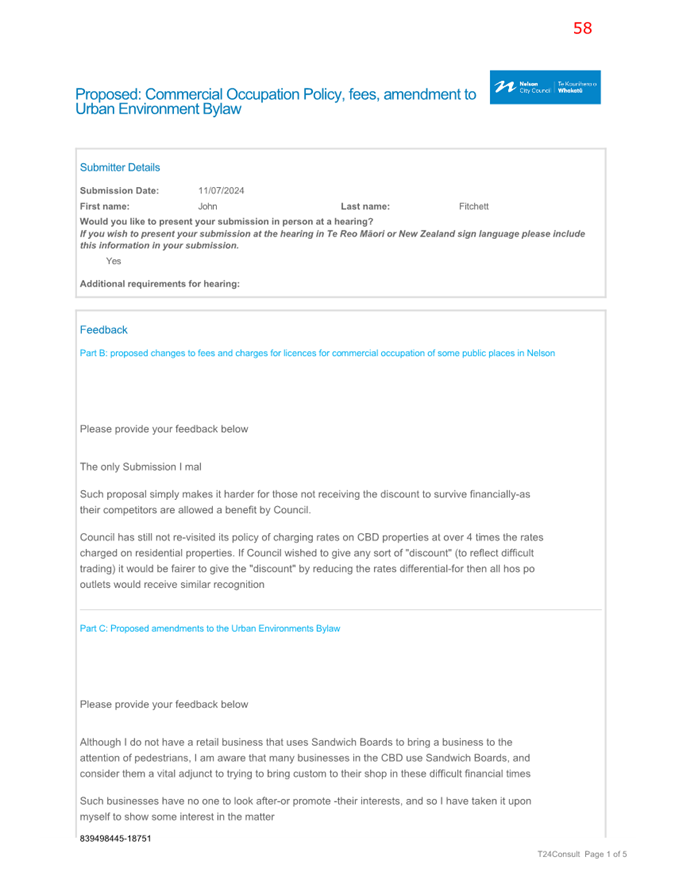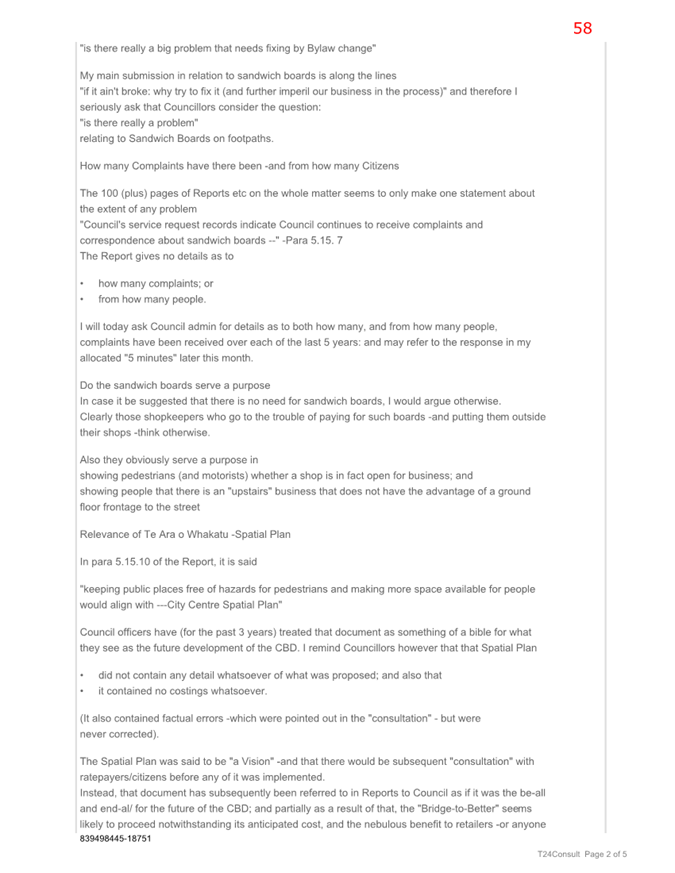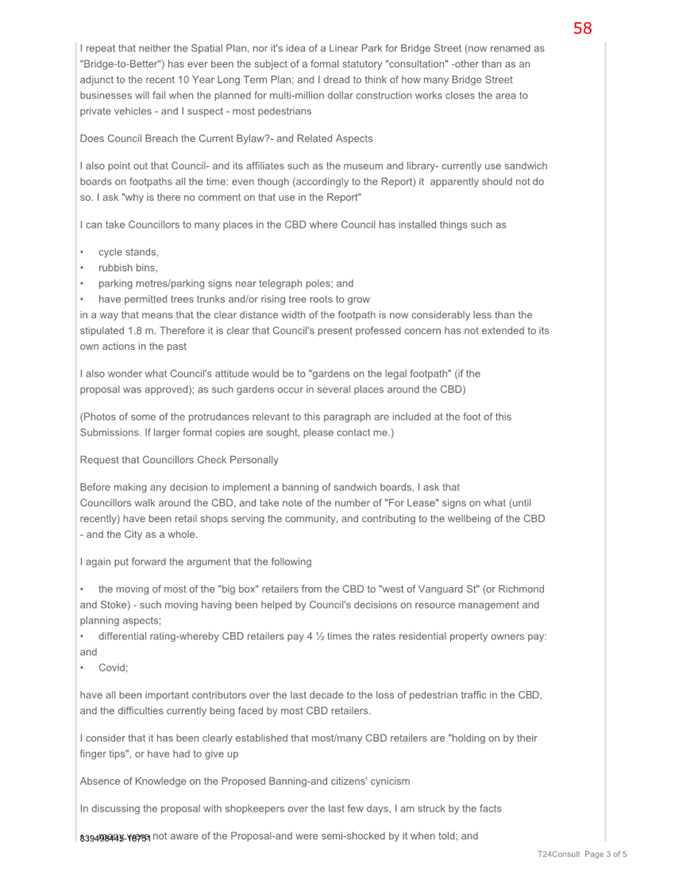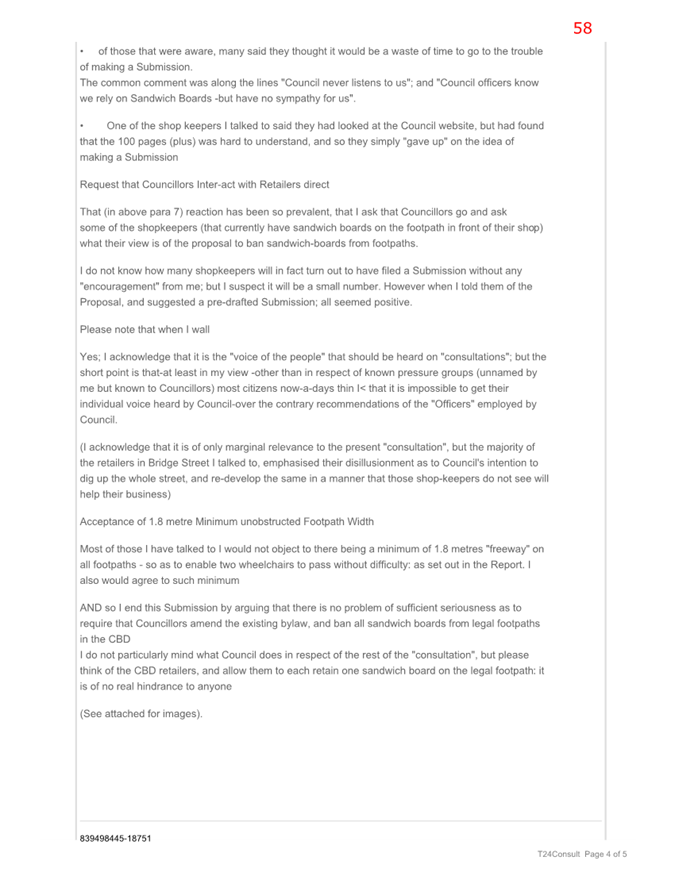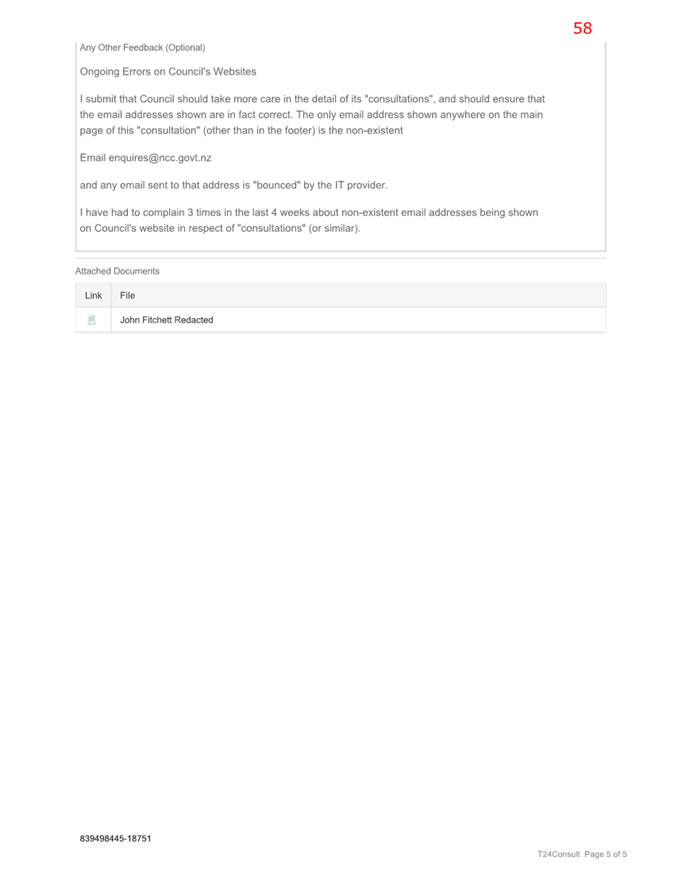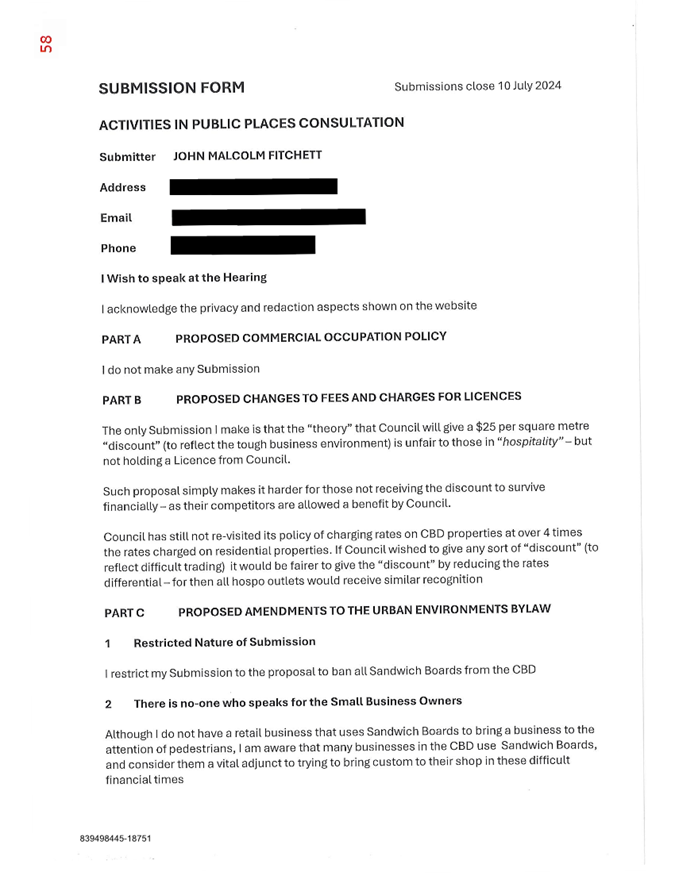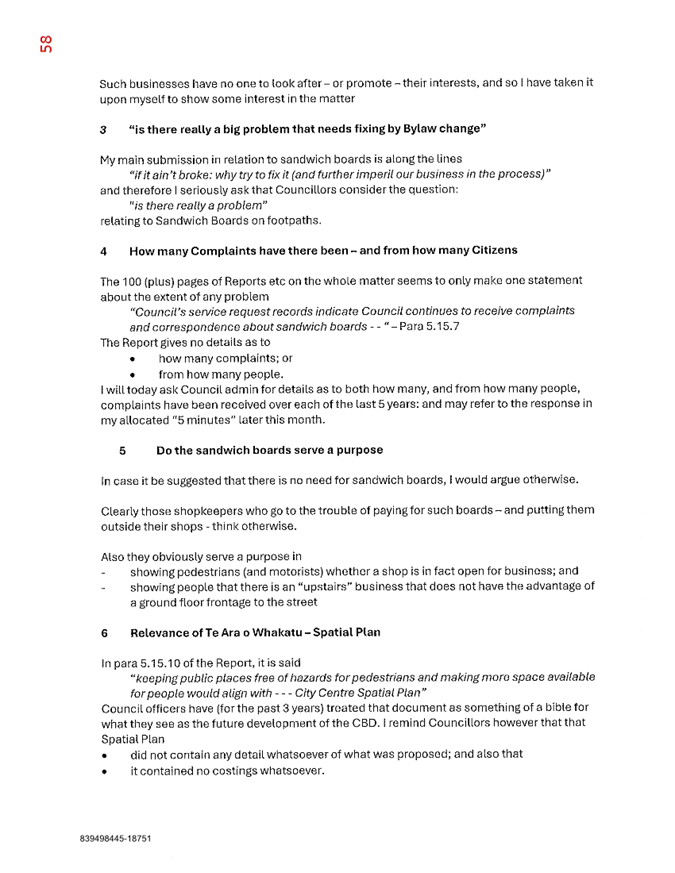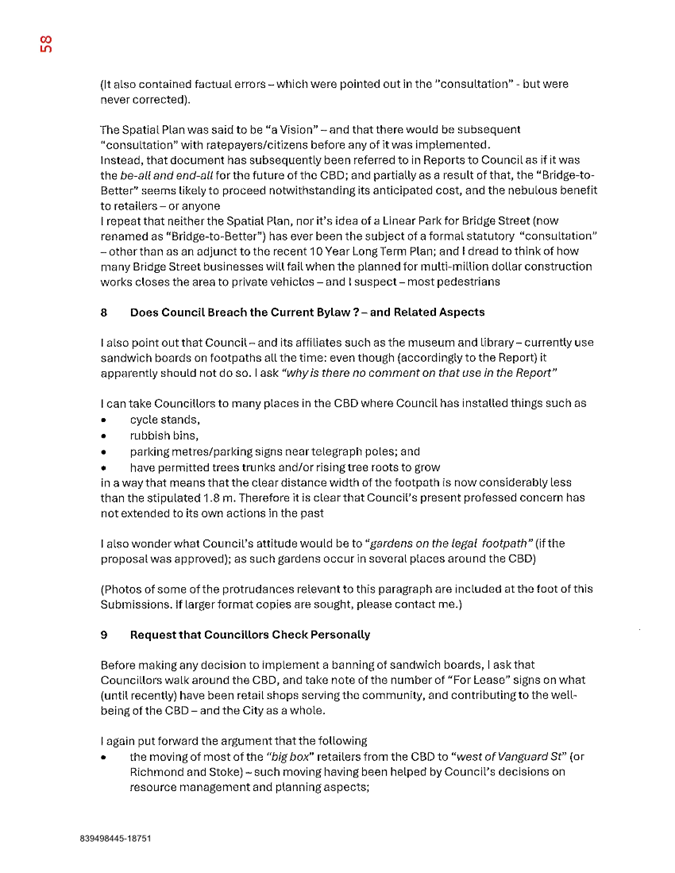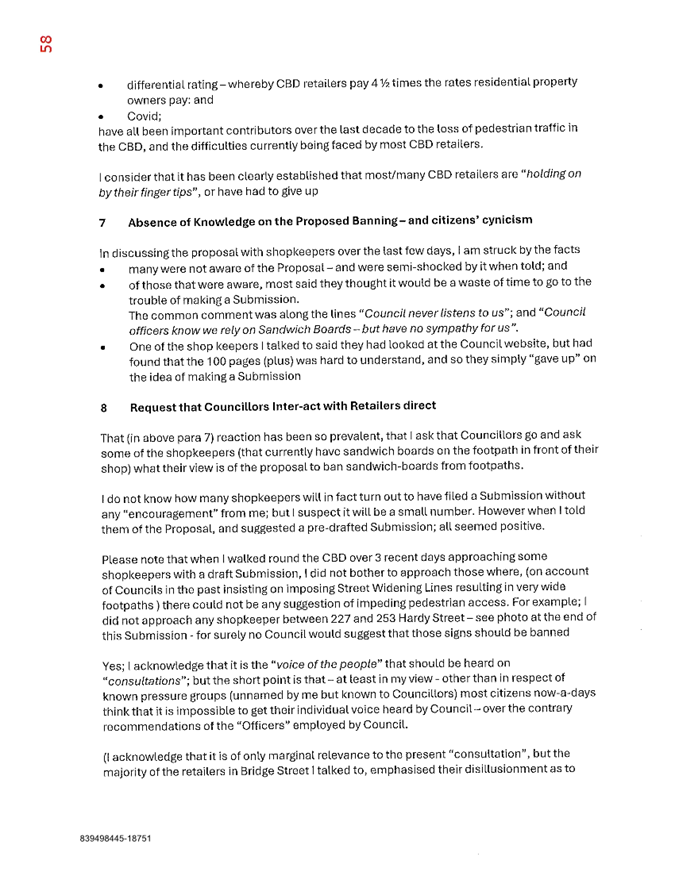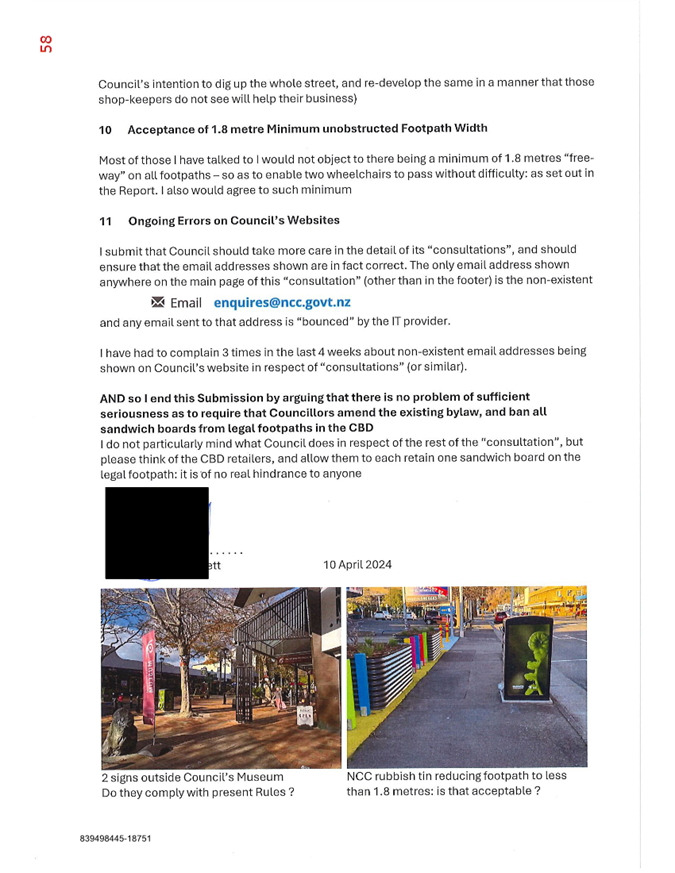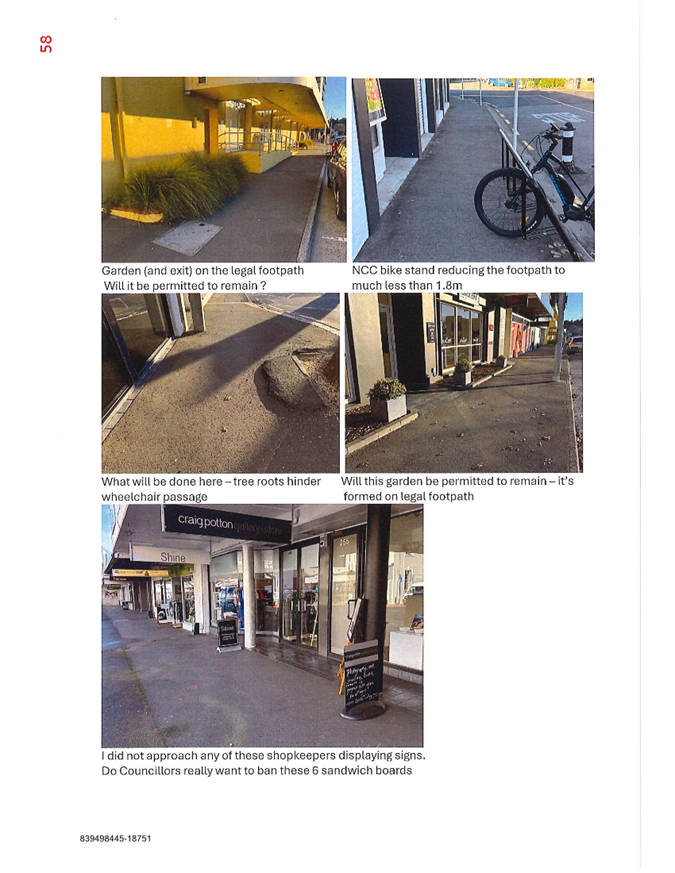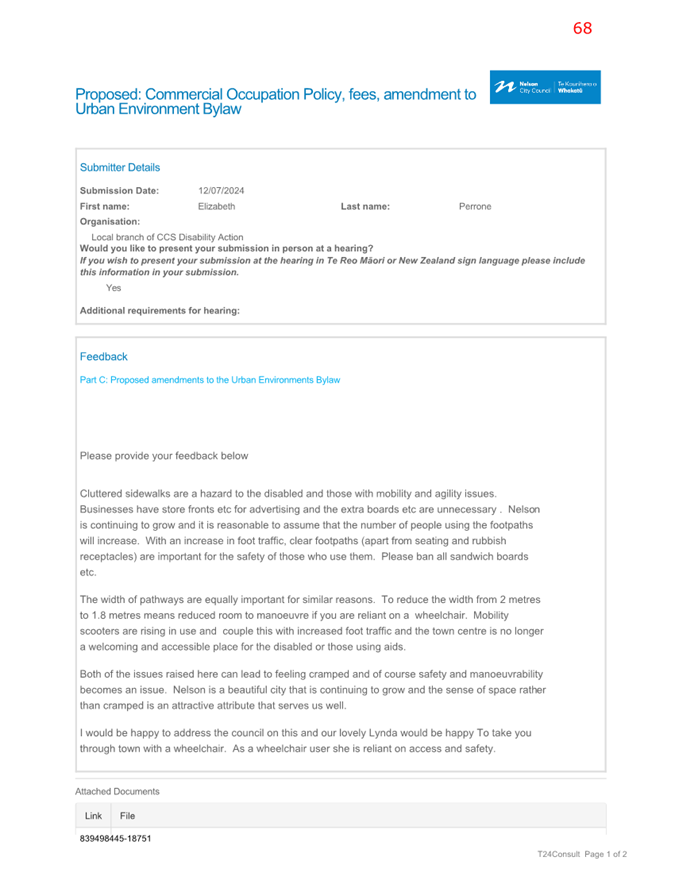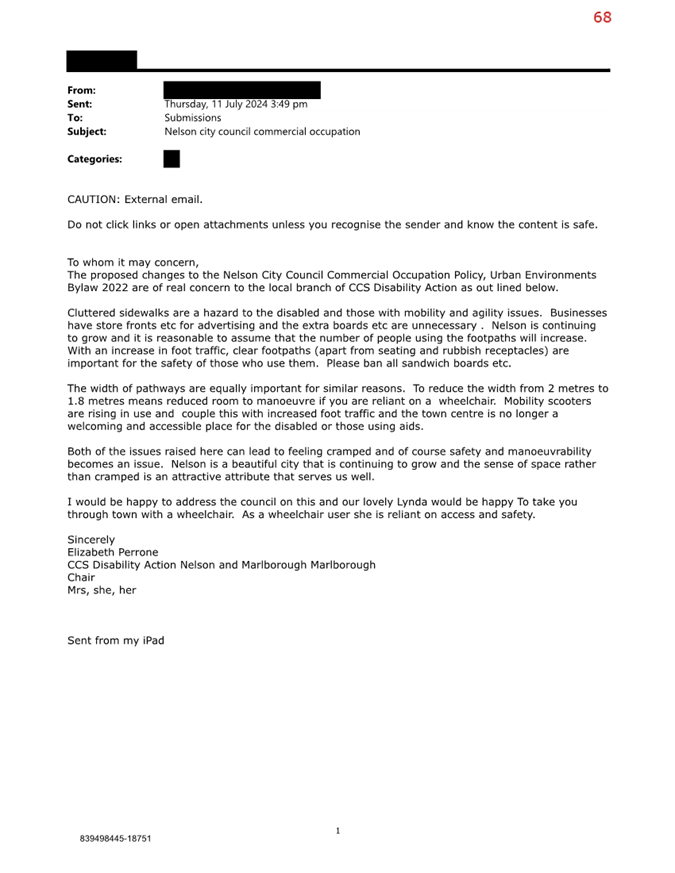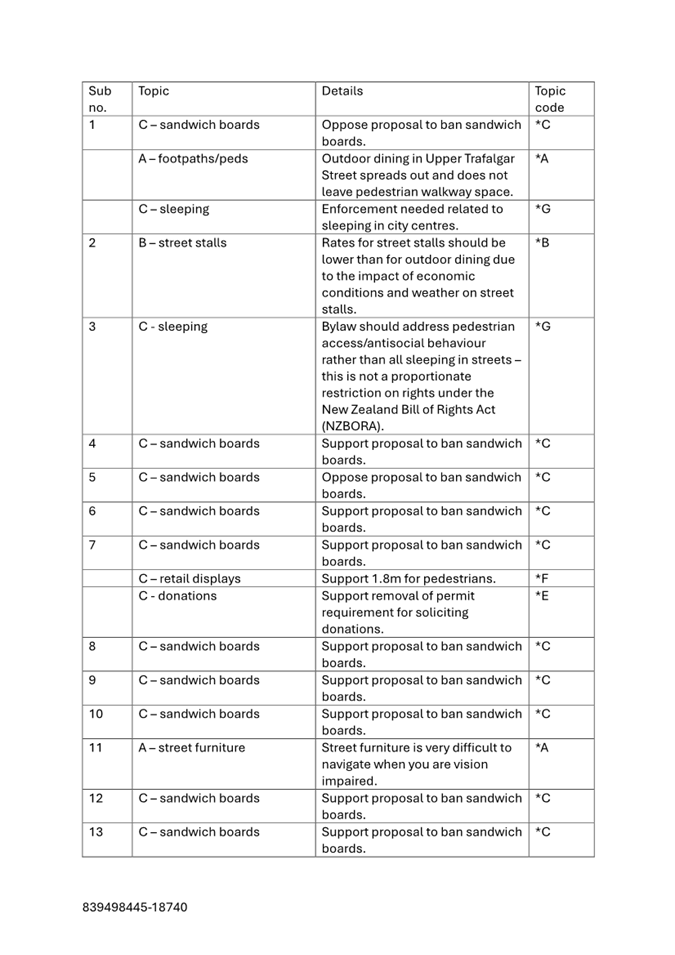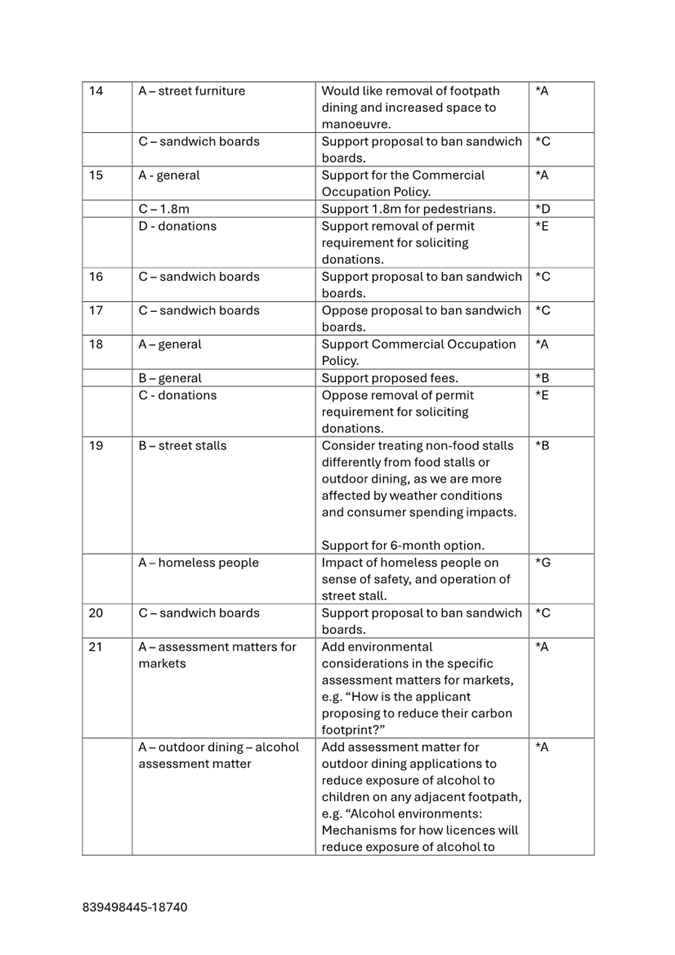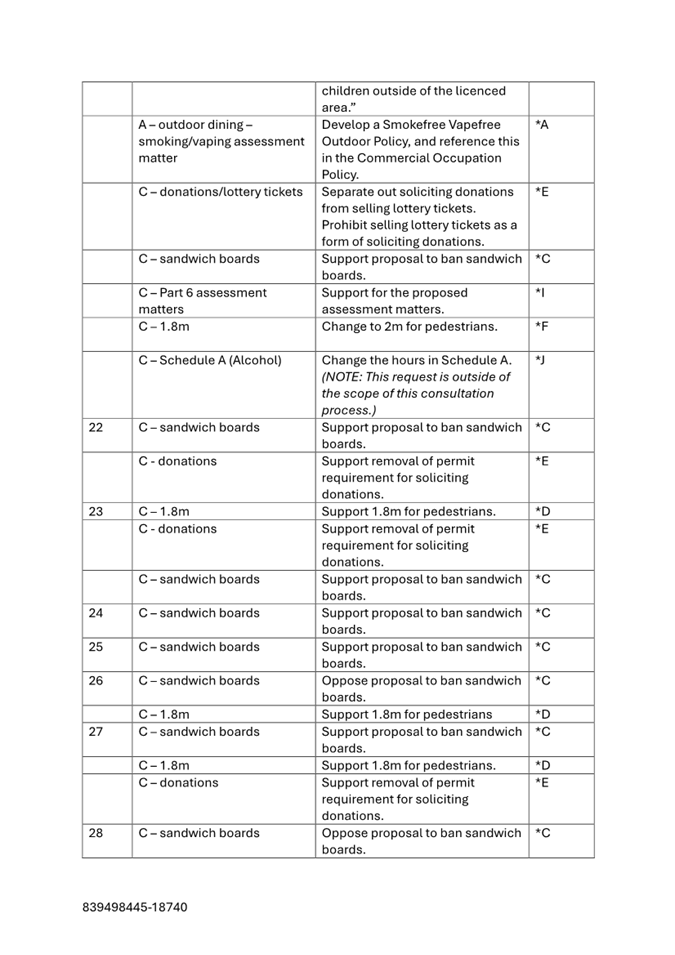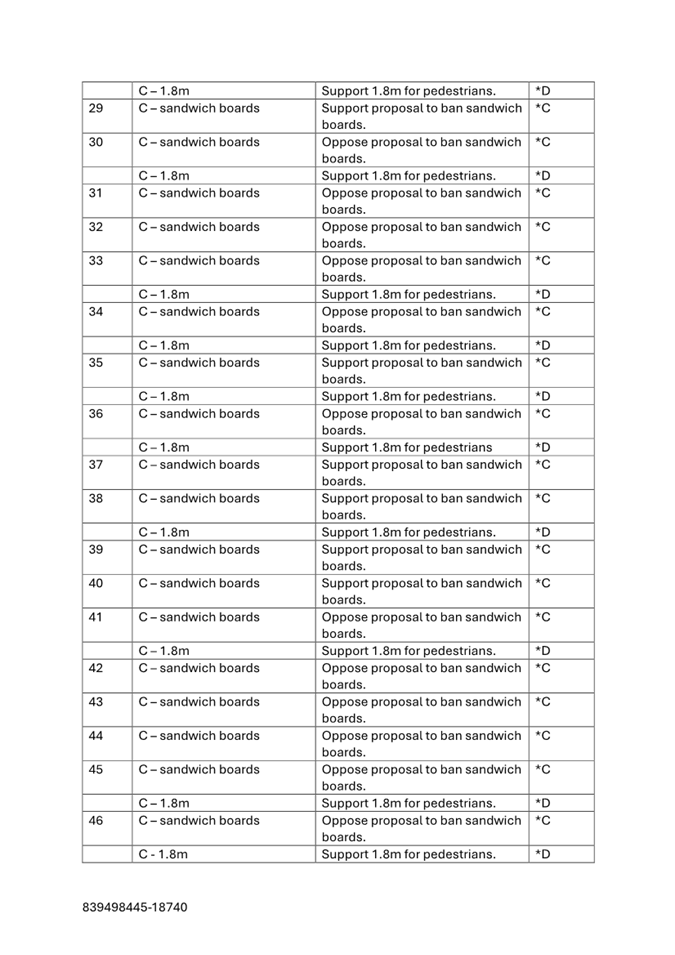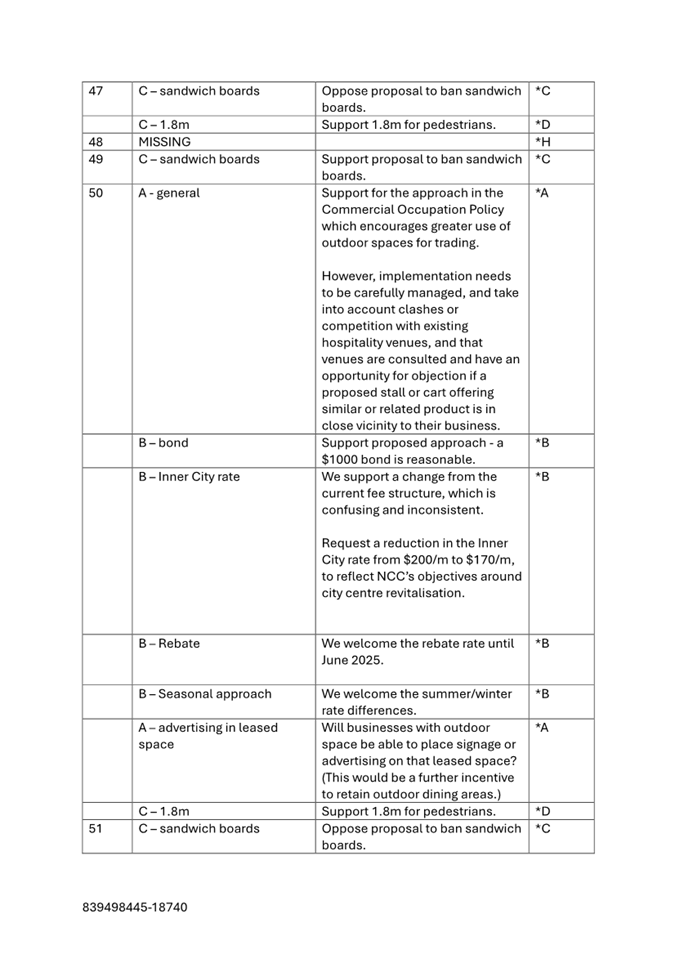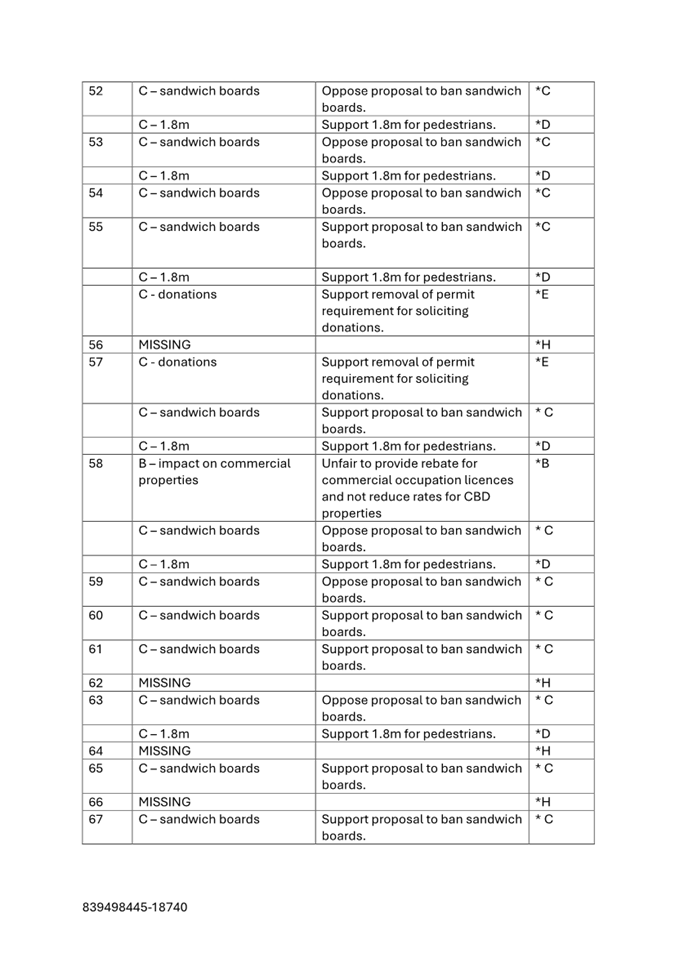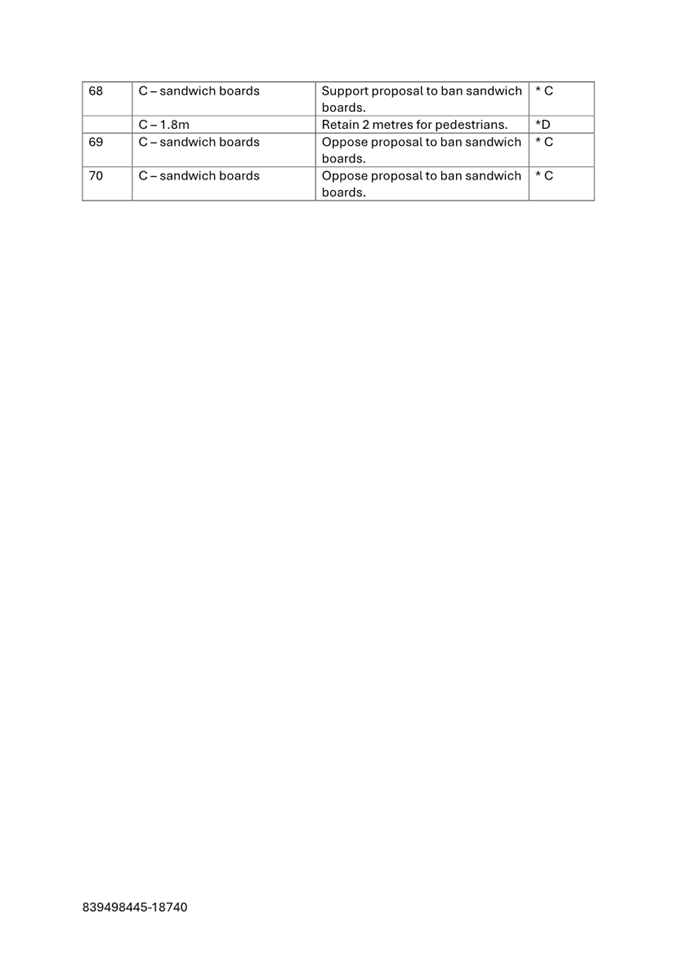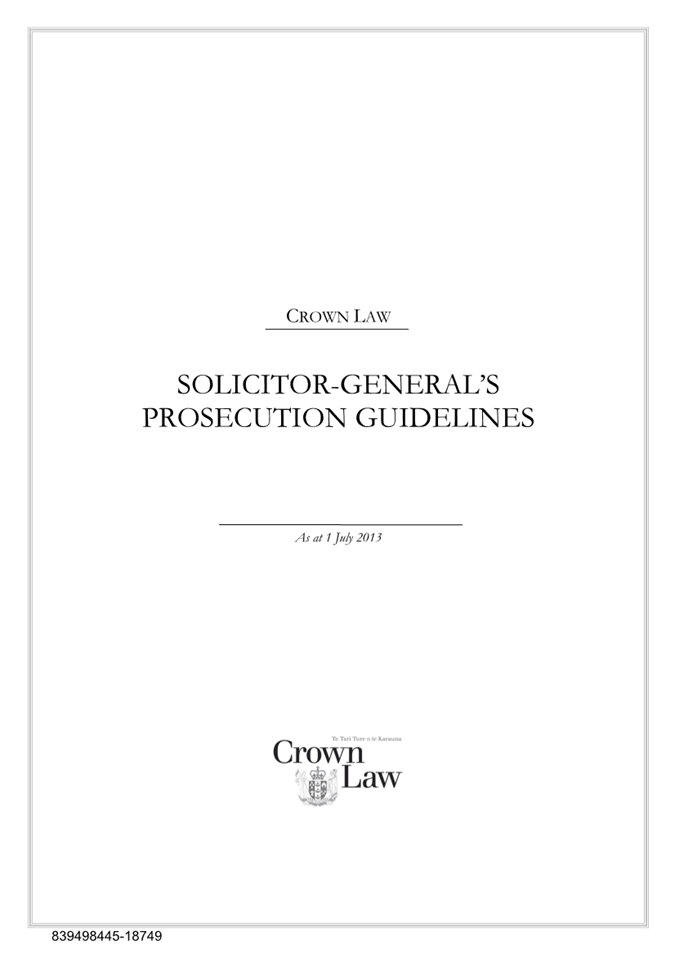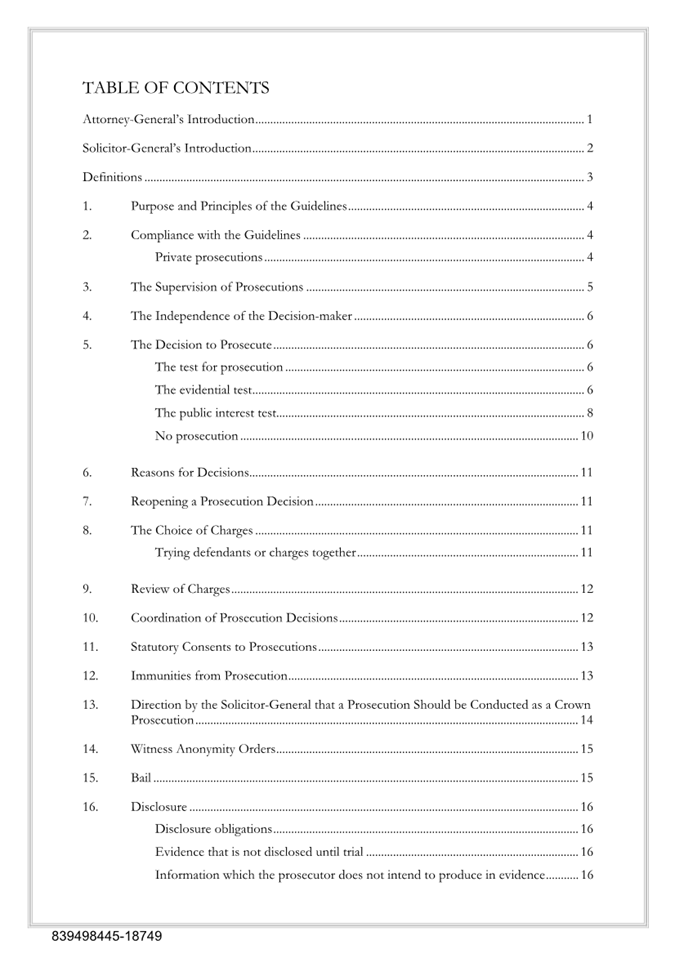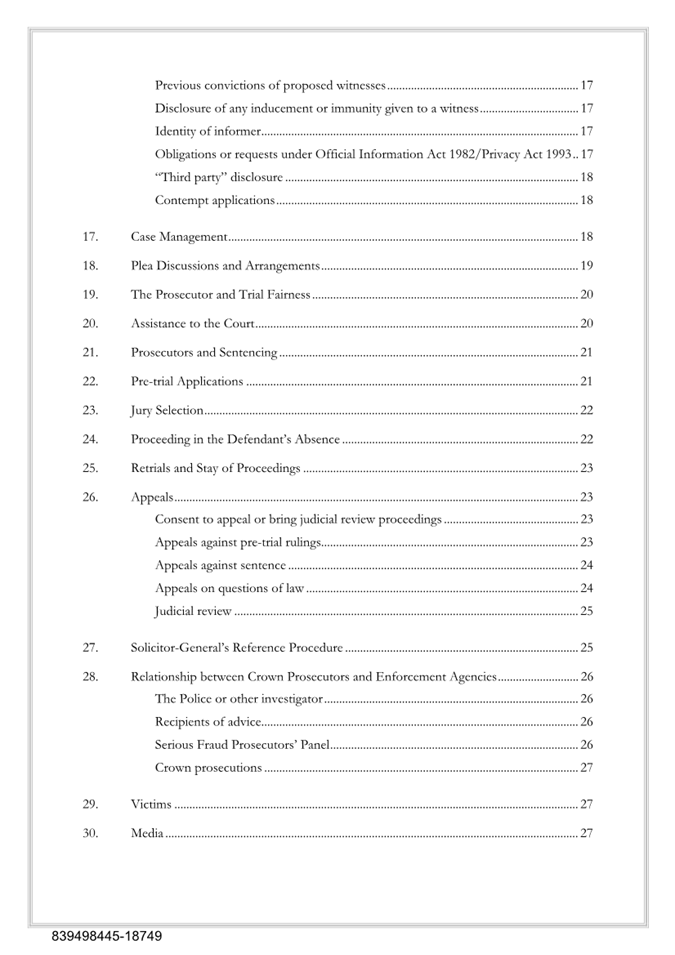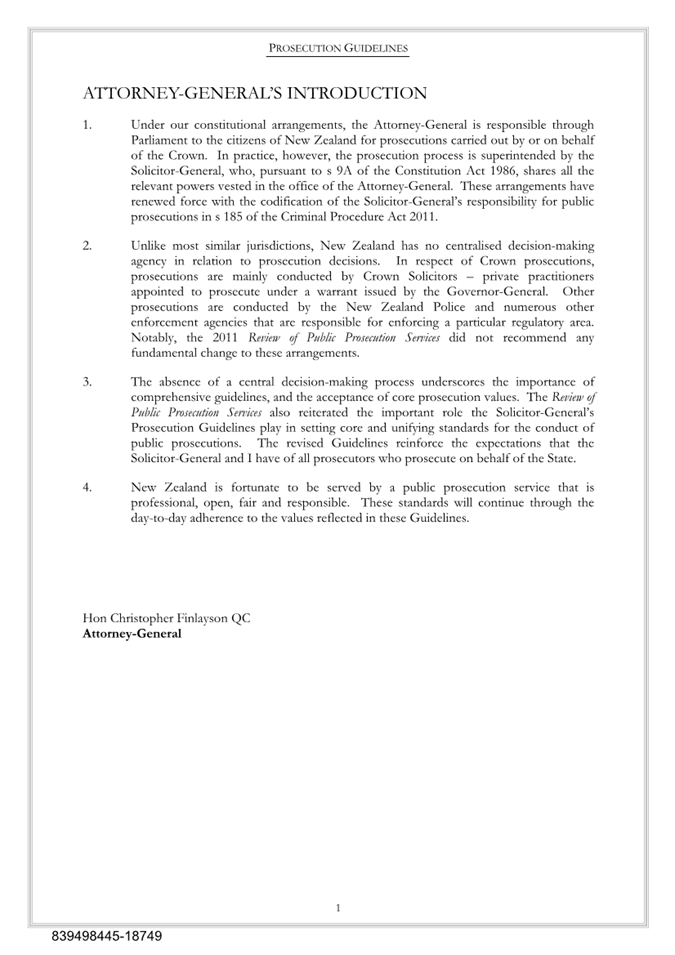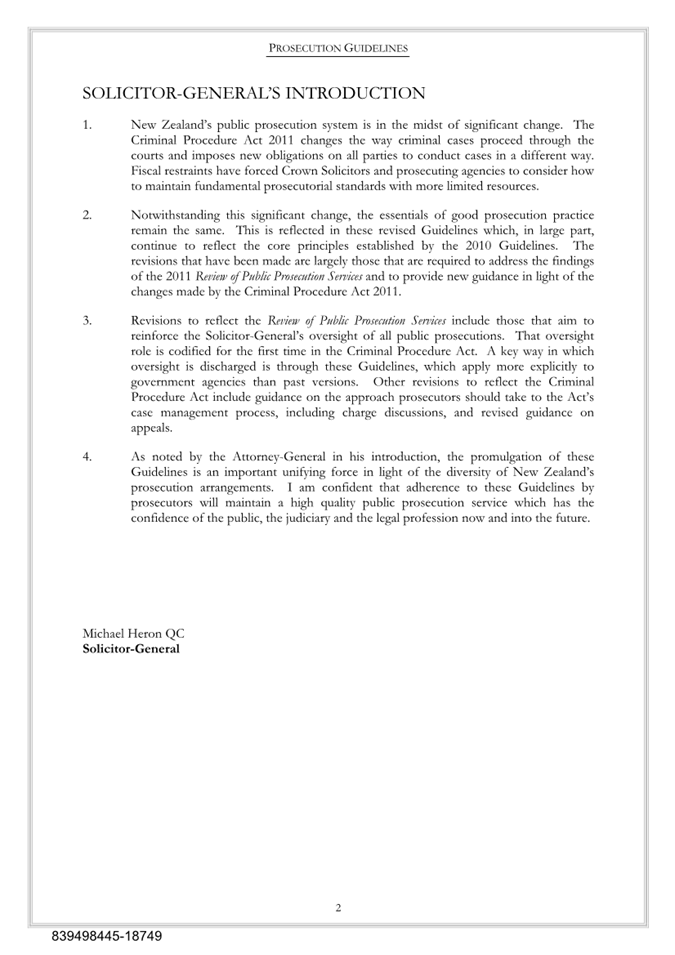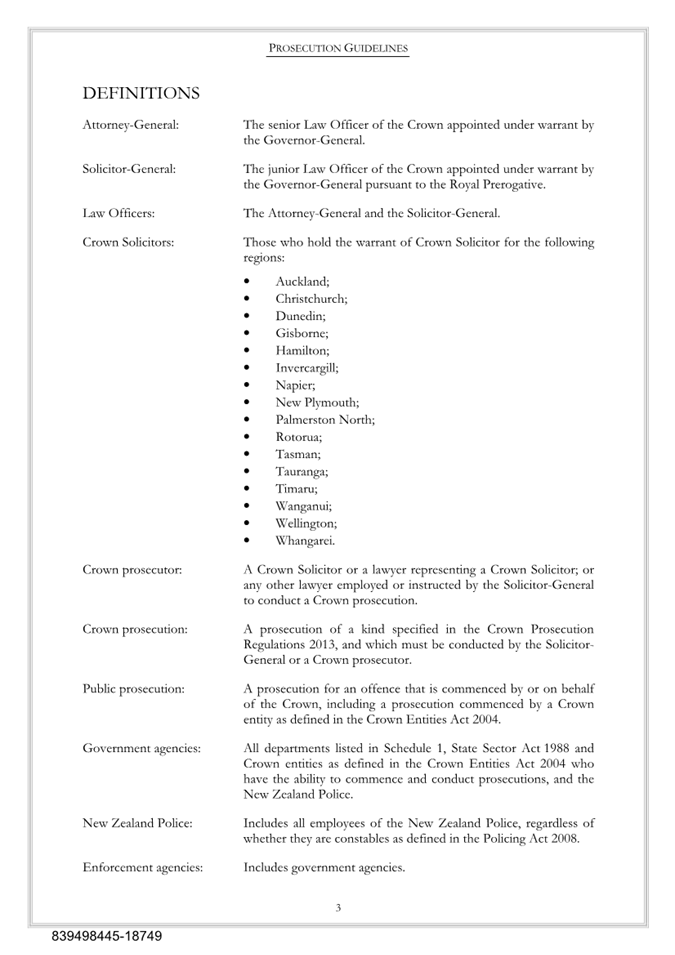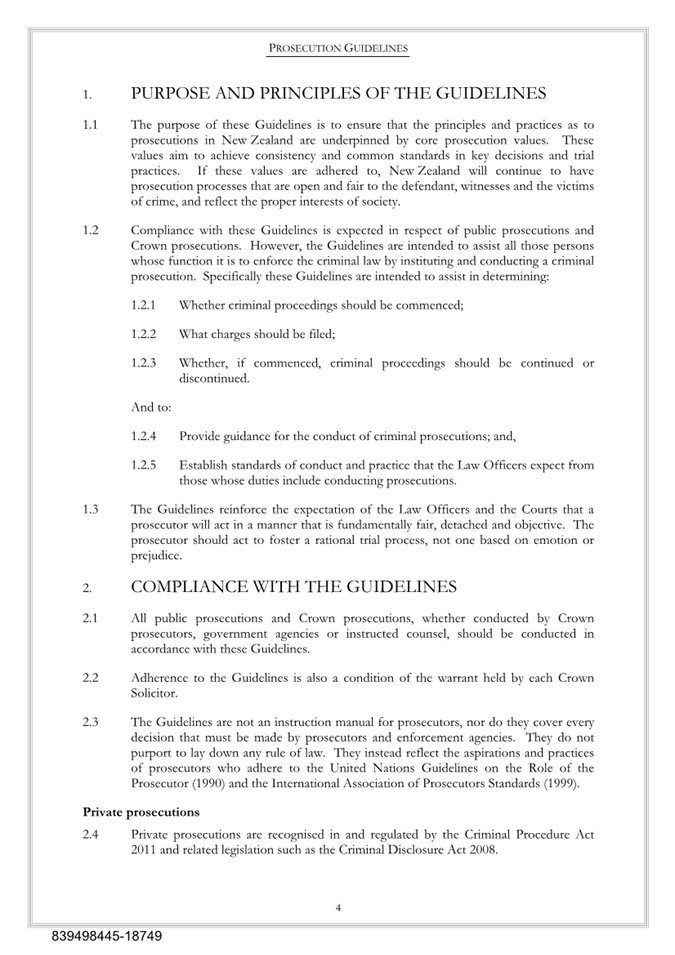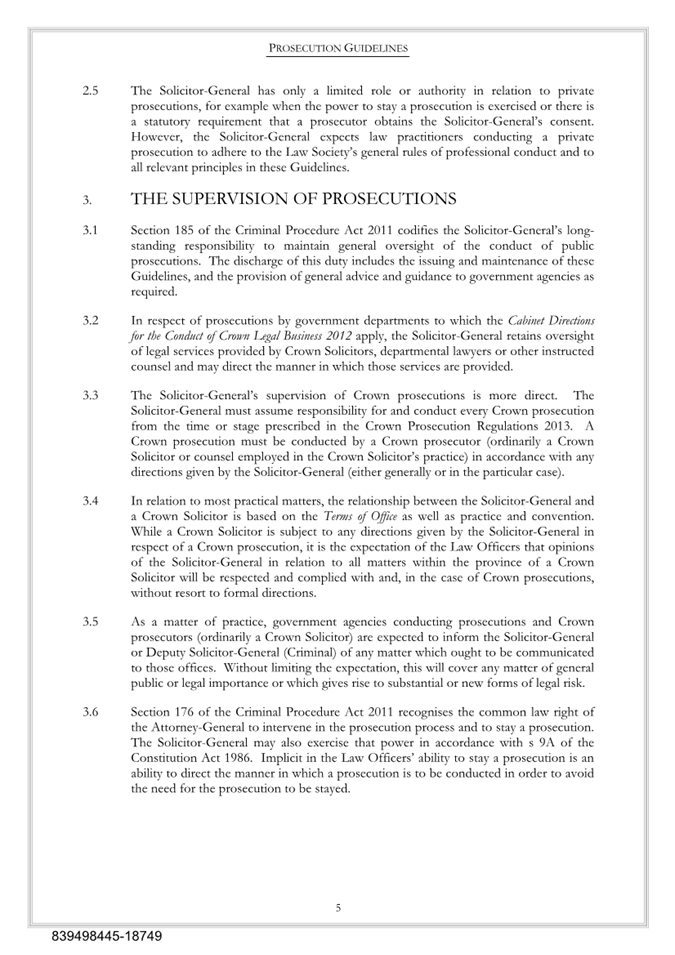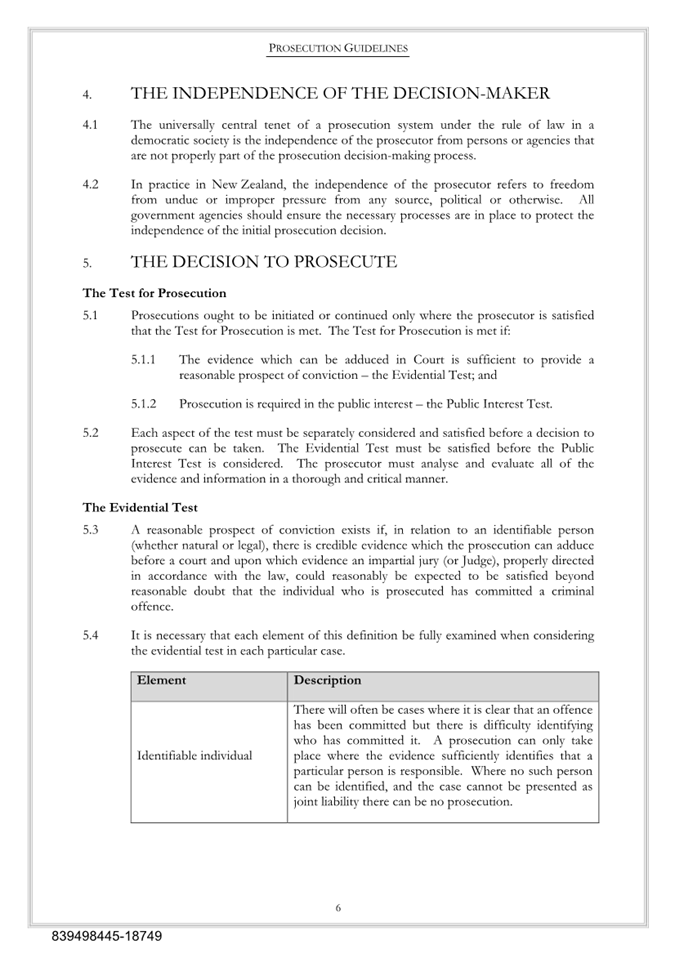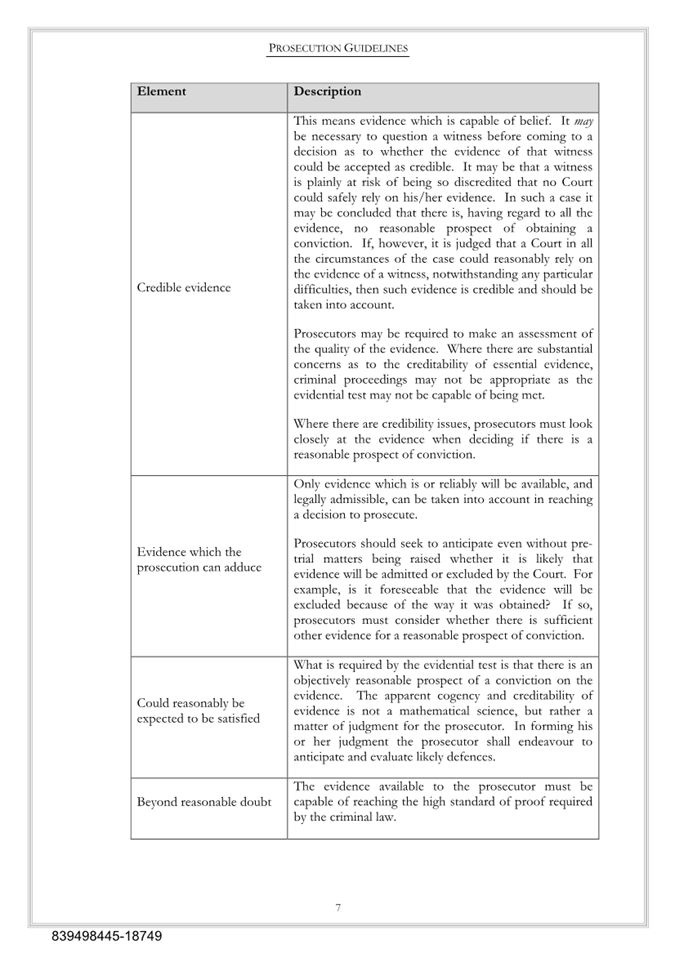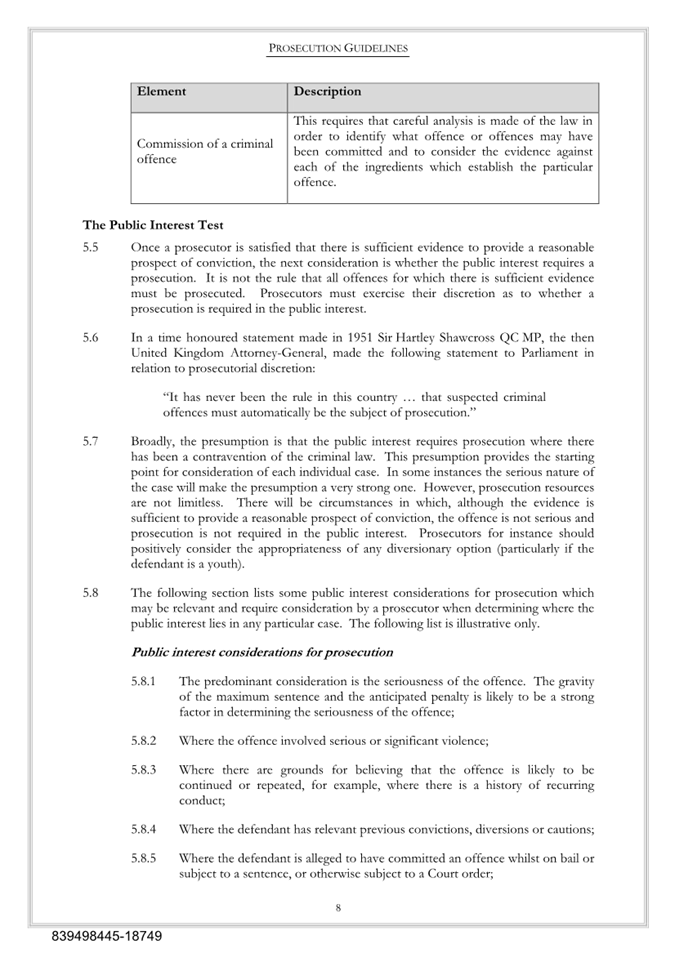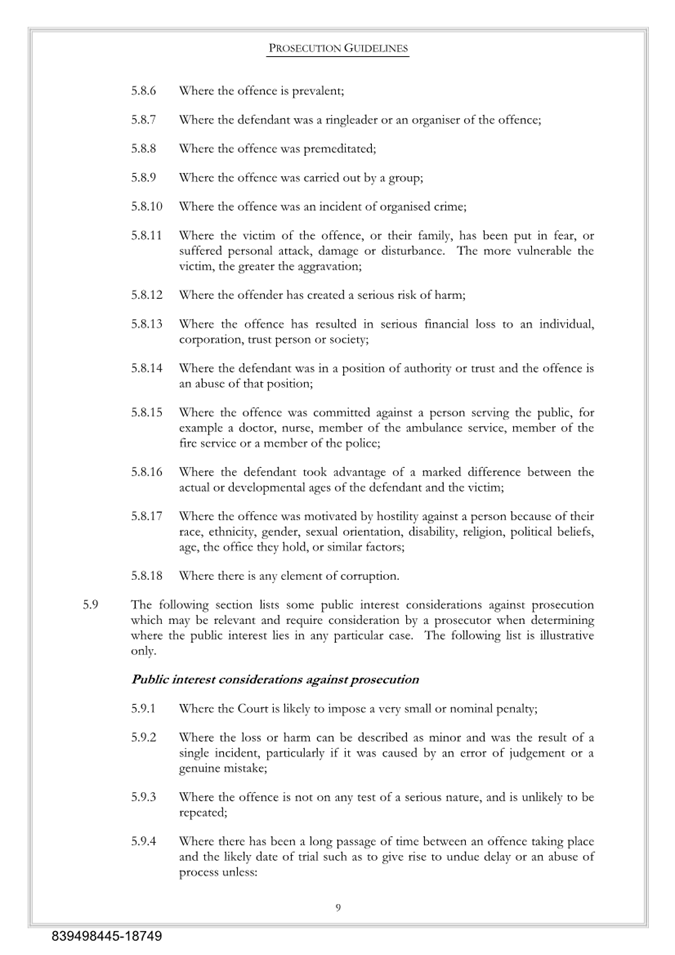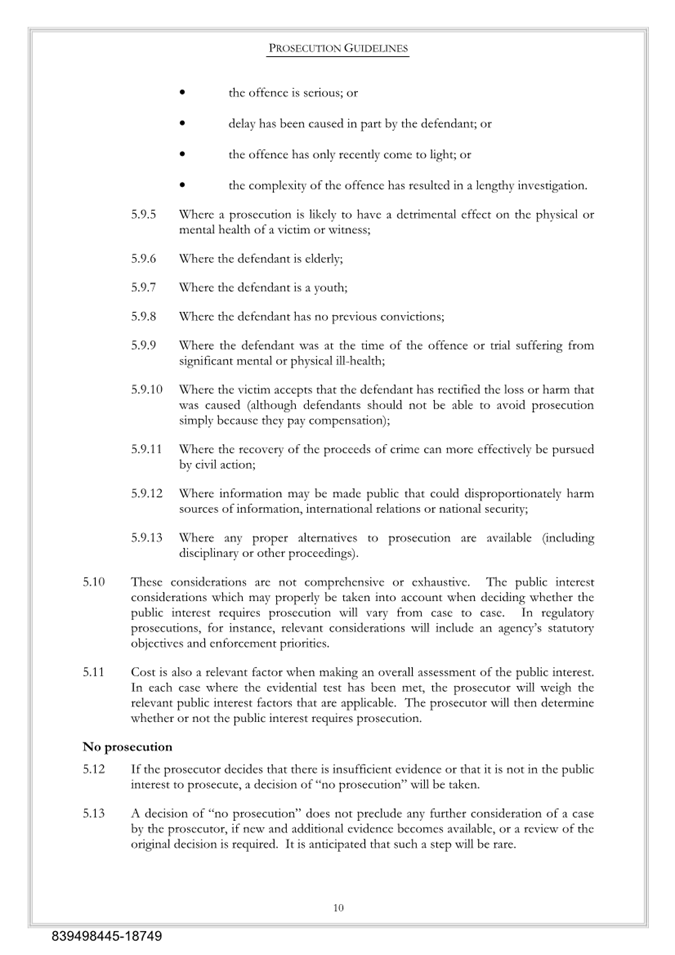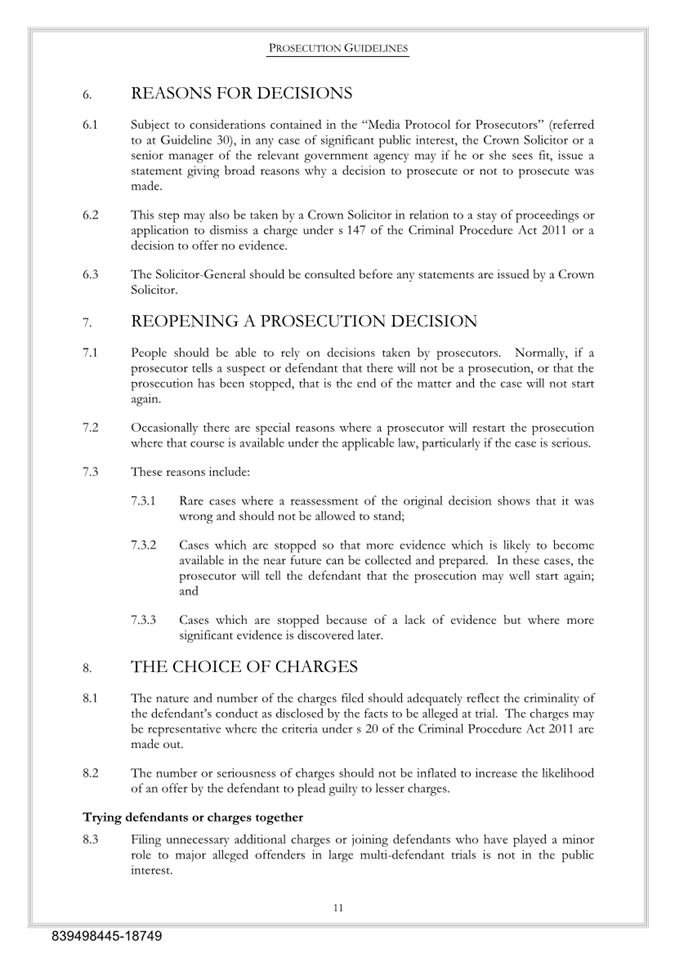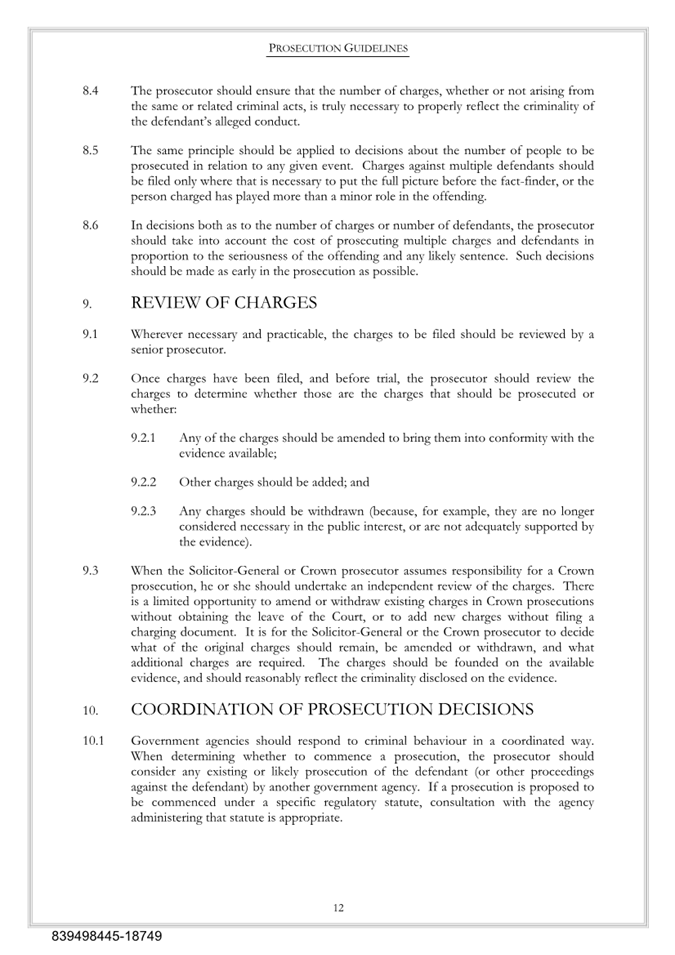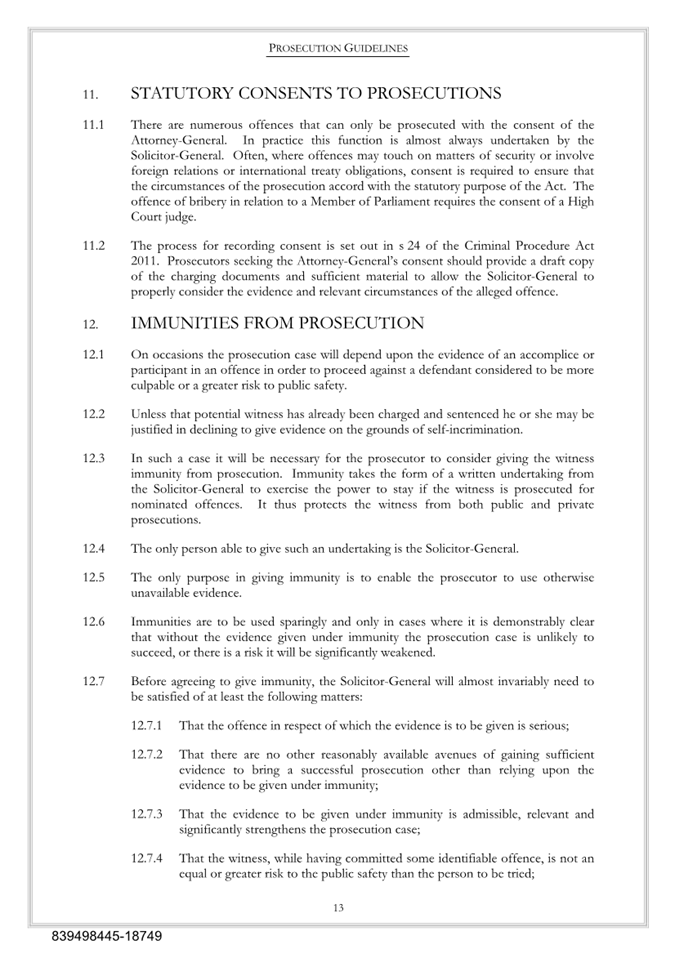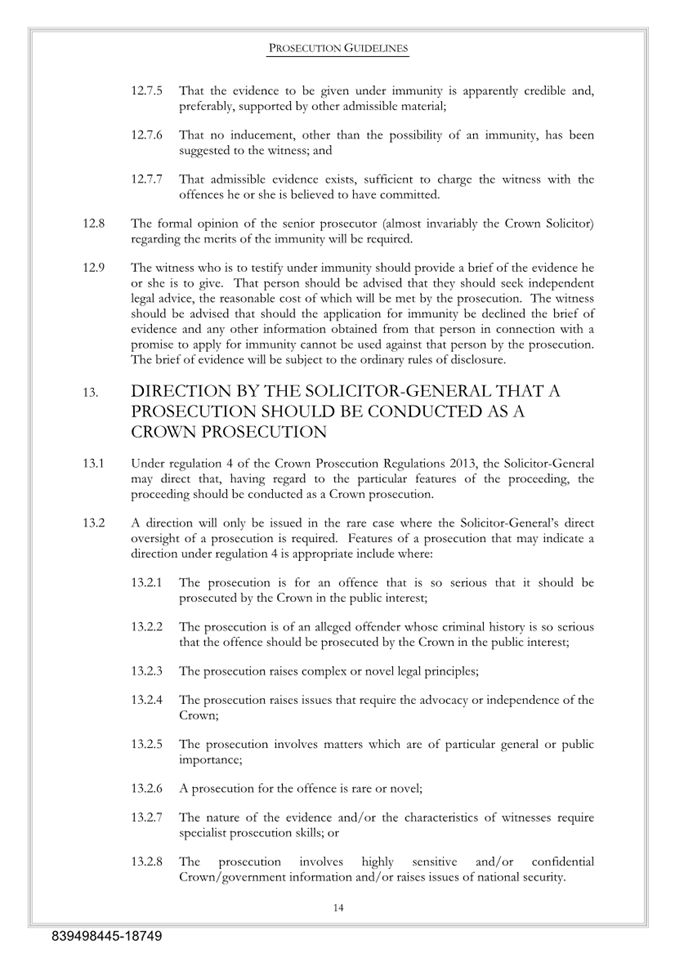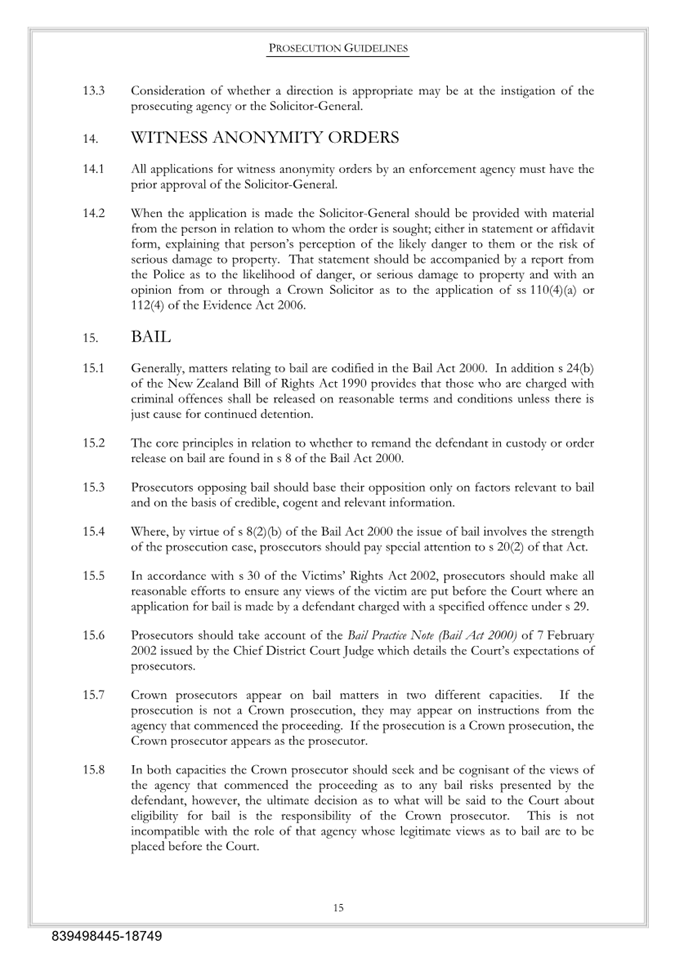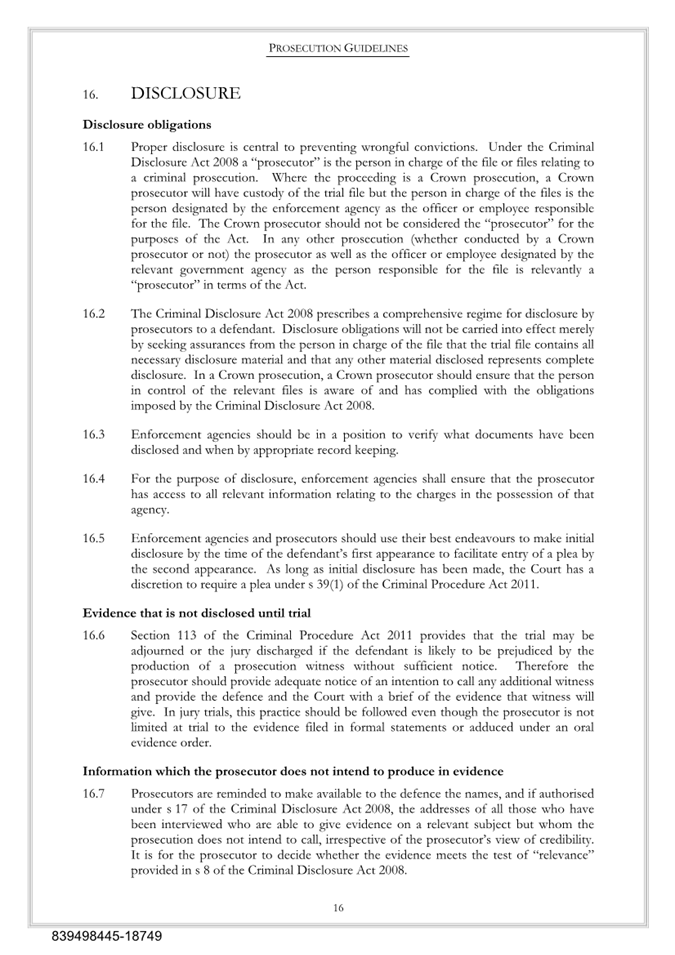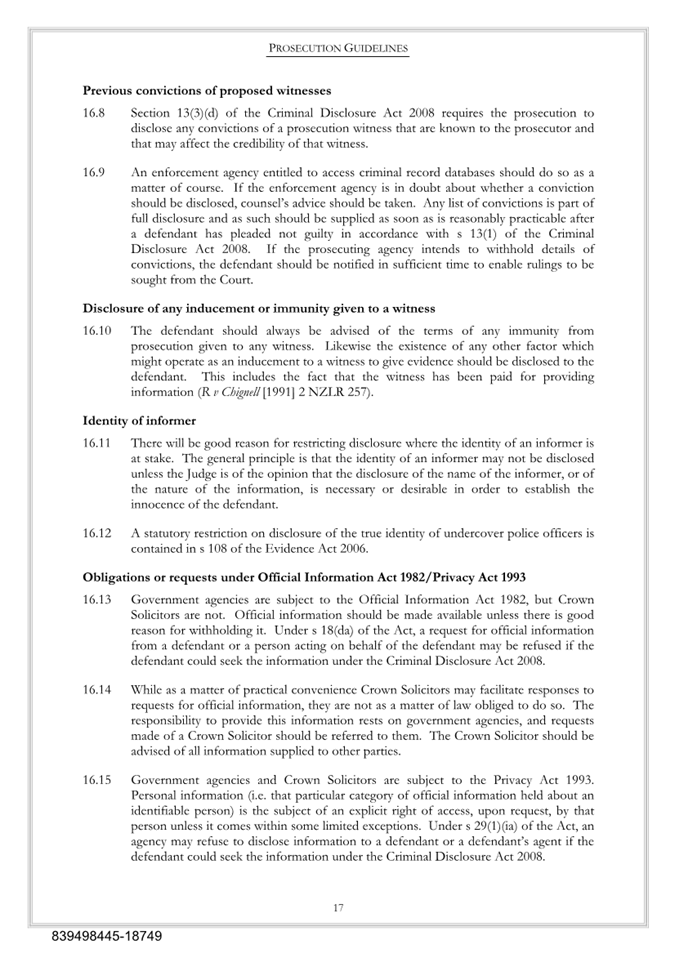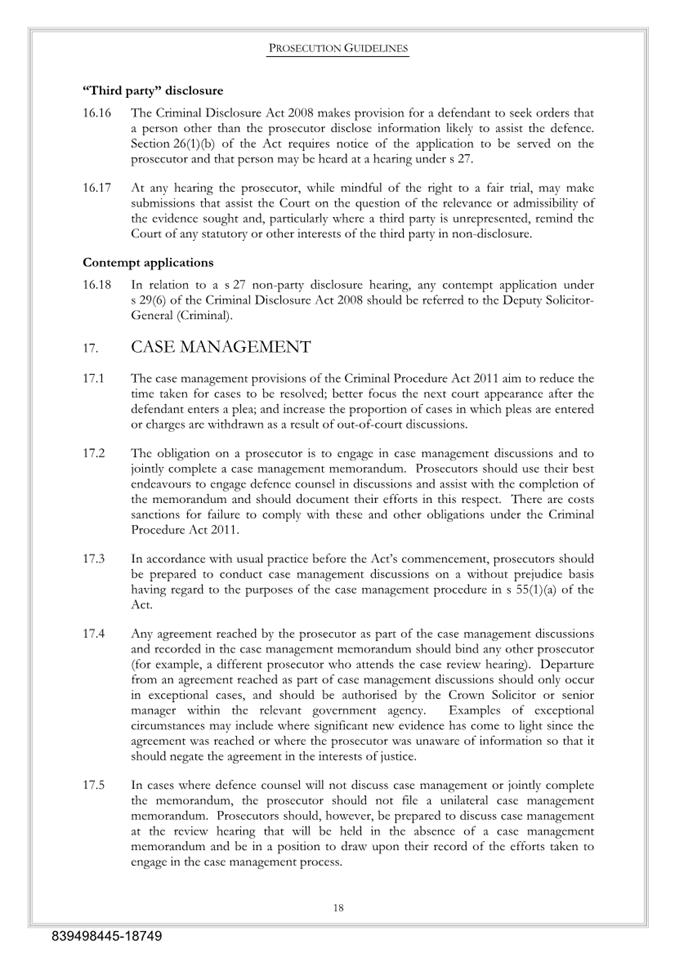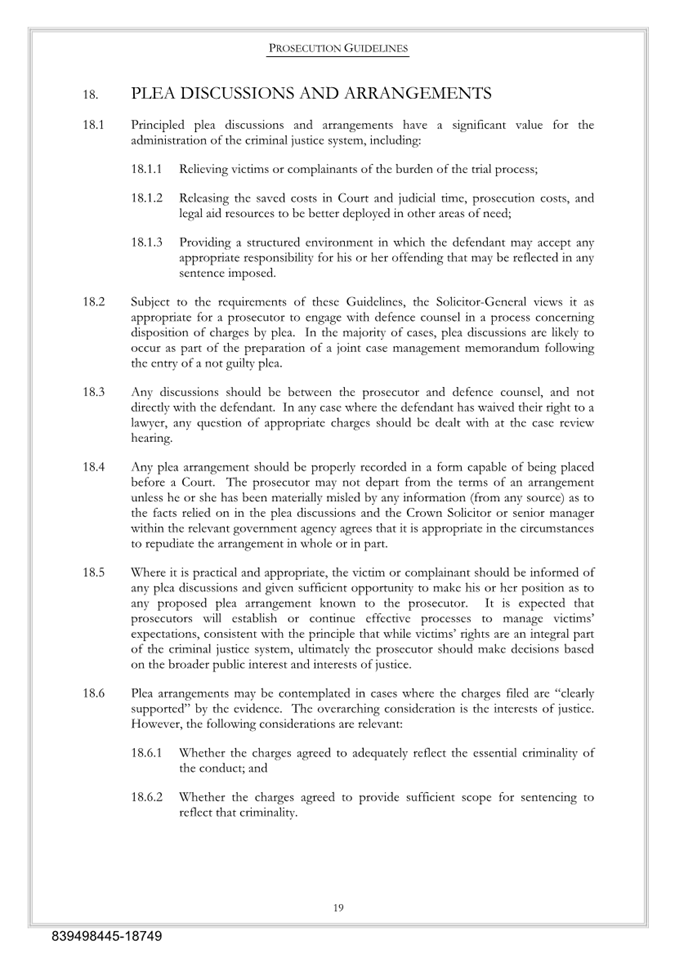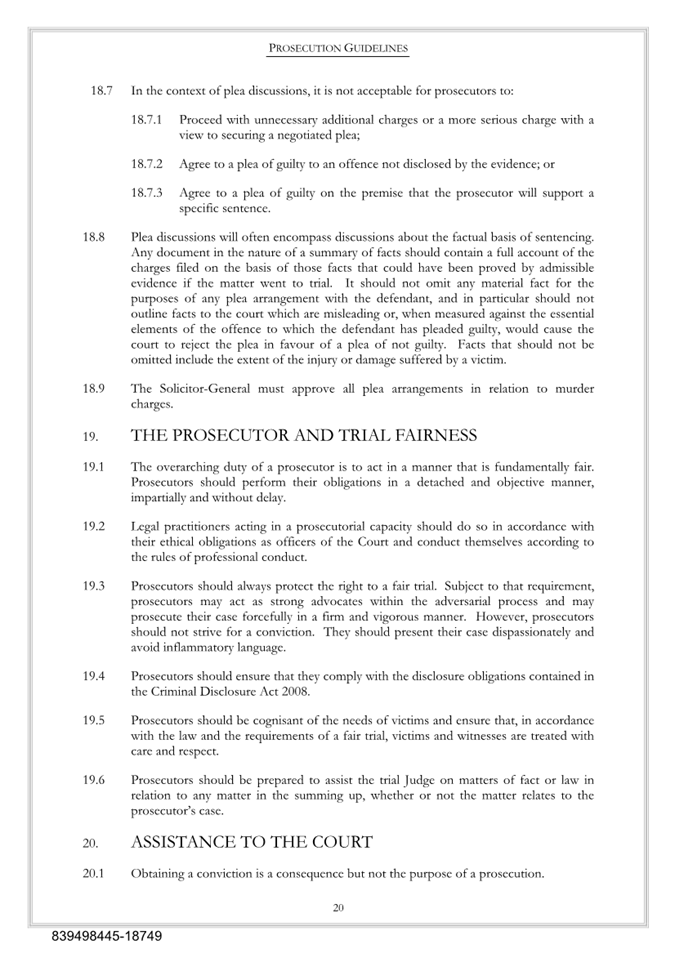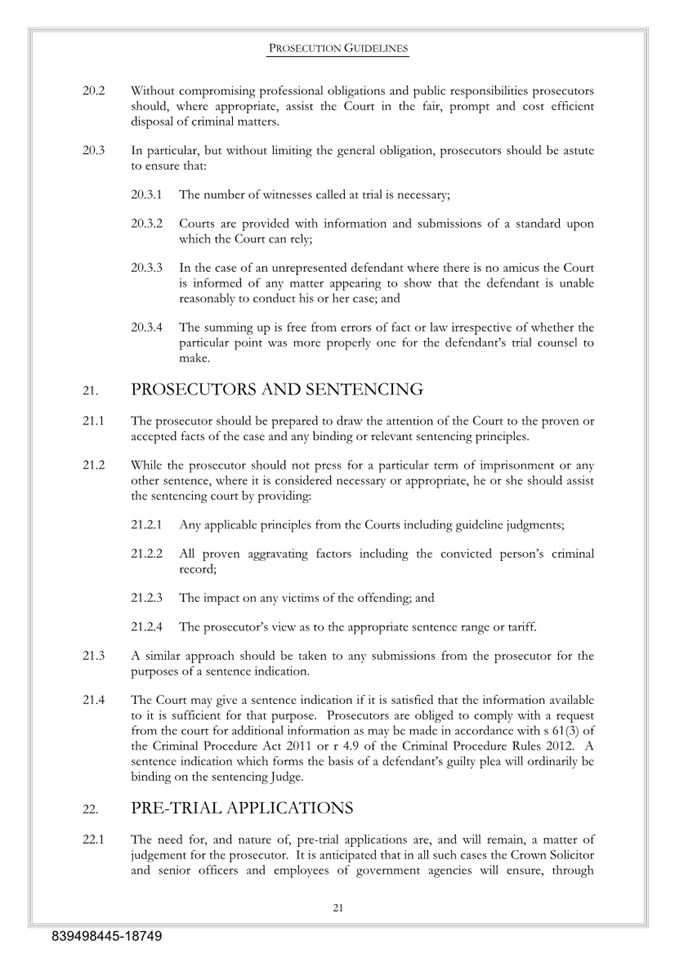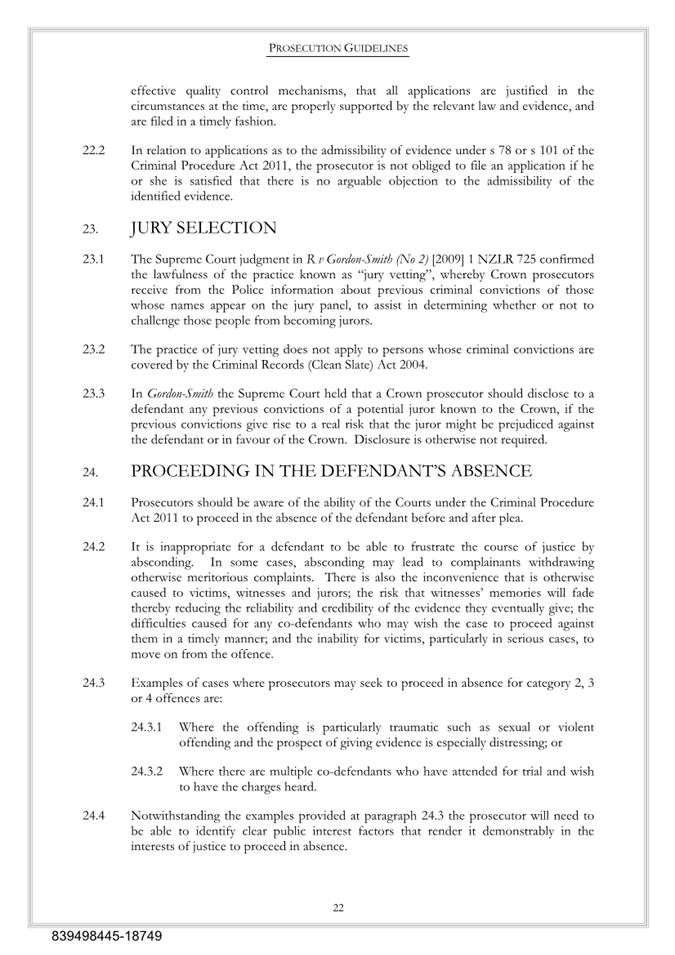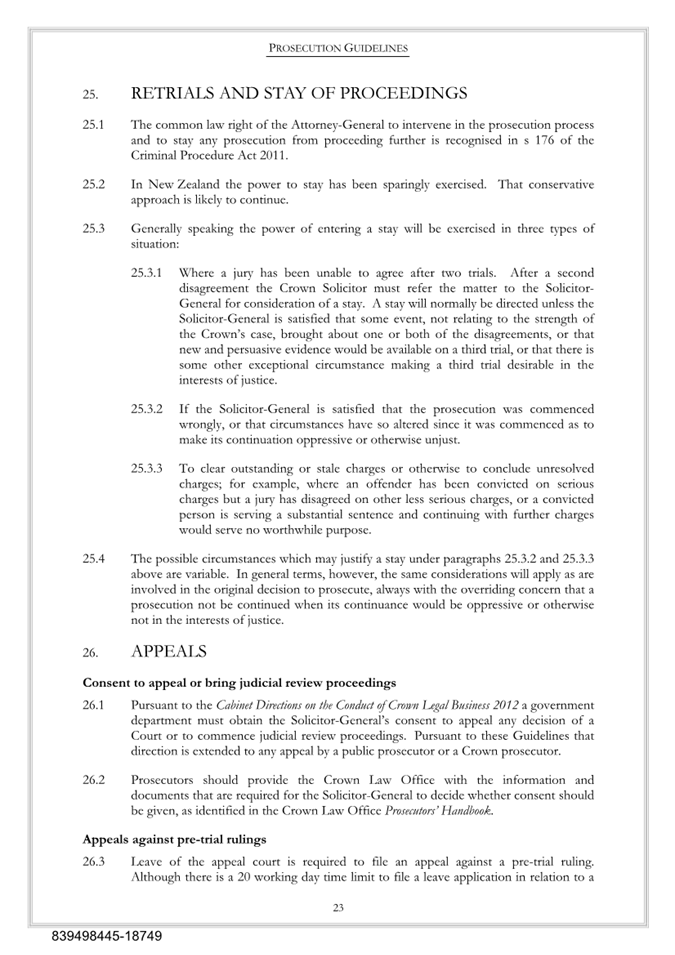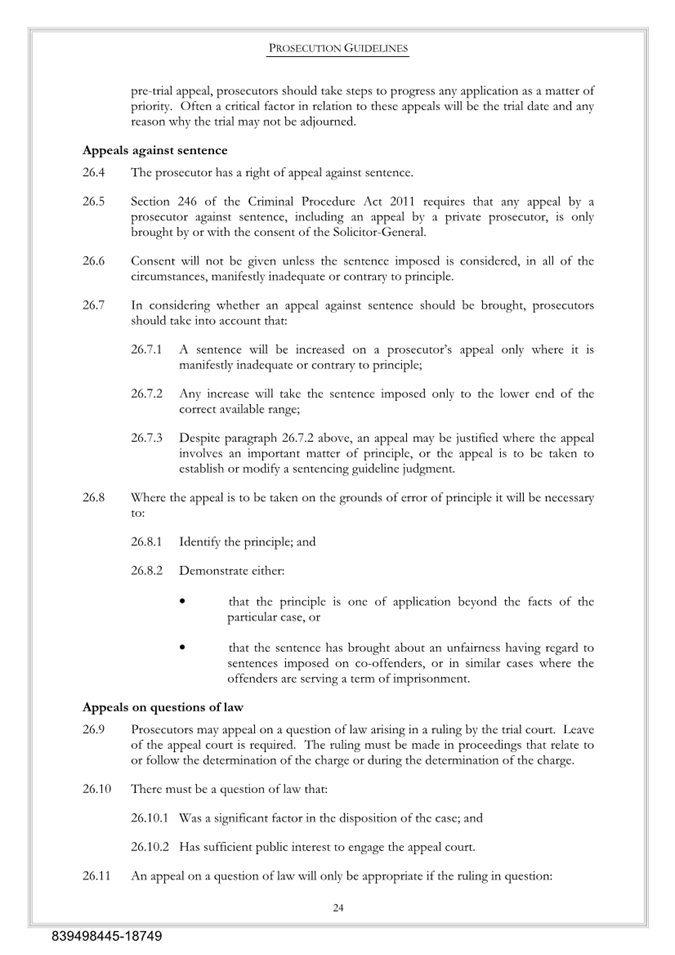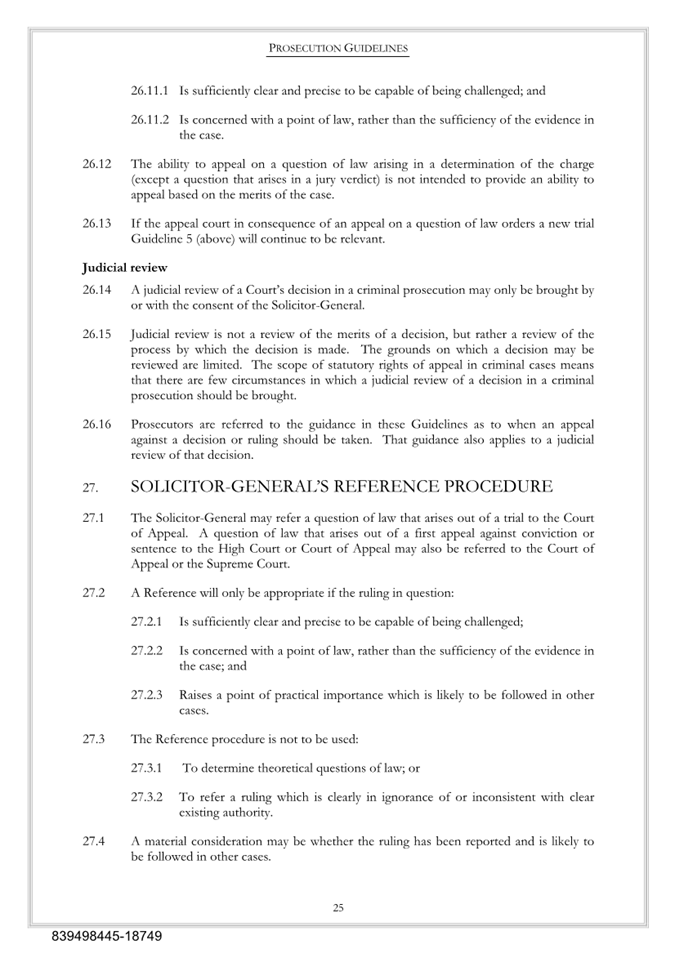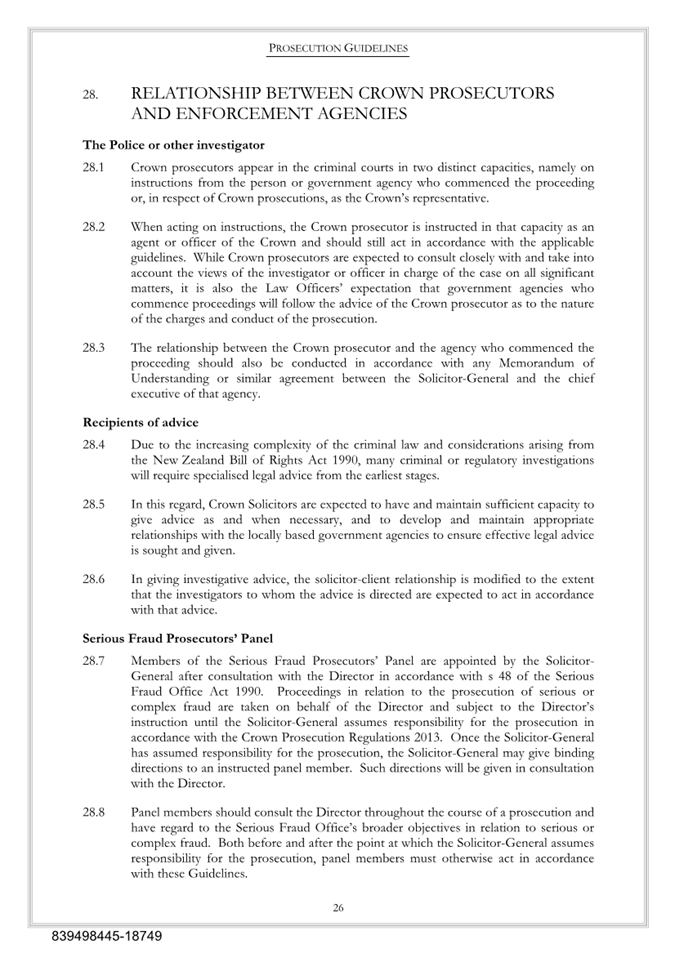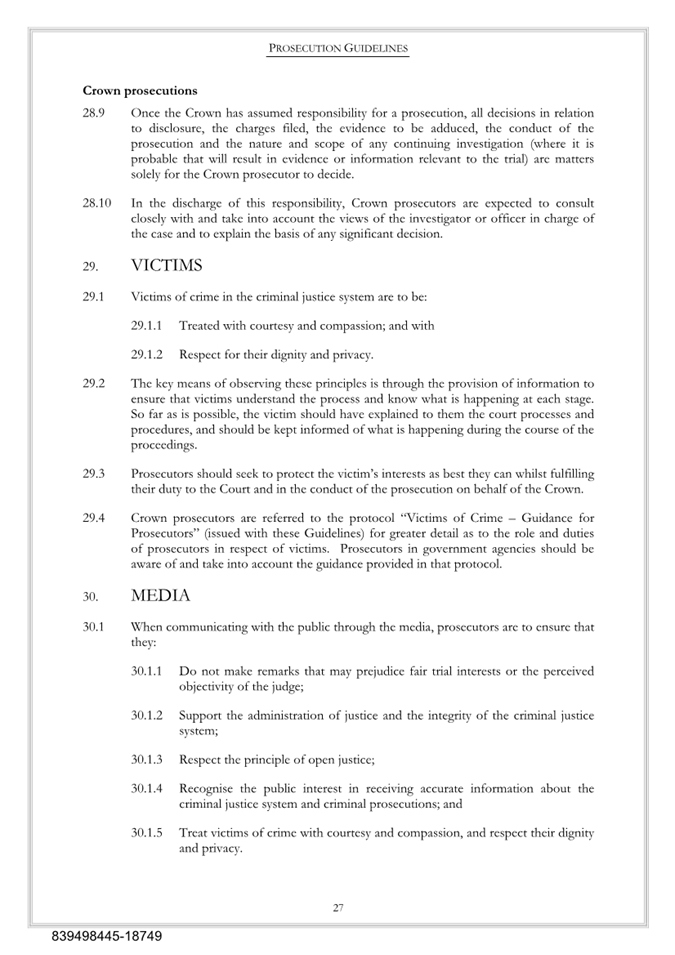Item 5: Activities in
Public Places Deliberations Report
|

|
Consultation Panel
15 August 2024
|
Report
Title: Activities
in Public Places Deliberations Report
Report
Author: Michelle Joubert
- Strategic Adviser Environmental Management
Report
Authoriser: Mandy Bishop - Group Manager Environmental
Management
Report
Number: R28650
1. Purpose
of Report
1.1 To summarise community
feedback received, assess options and provide recommendations for deliberations
on the Activities in Public Places proposals, which include:
1.1.1 A proposed Commercial Occupation
Policy (footpath and car park dining, street stalls and markets); and
1.1.2 A proposed Licence Fees Schedule for
commercial occupation (footpath and car park dining, street stalls and
markets); and
1.1.3 Proposed amendments to the Urban
Environments Bylaw.
2. Summary
2.1 The Activities in
Public Places Consultation Document has been out for consultation and hearings
held. Following analysis of the submissions, this report identifies options and
provides recommendations in relation to decision making on the proposed Policy,
Fee Schedule and amendments to the Bylaw.
3. Recommendation
|
That the Consultation Panel
1. Receives the report Activities in Public
Places Deliberations Report (R28650)
and its attachments (839498445-18750, 839498445-18517, 839498445-18493, 839498445-18751,
839498445-18740 and 839498445-18749); and
2. Delegates the Chair
of the Hearing Panel and the Group Manager Environmental Management to
approve minor corrections or amendments to the Commercial Occupation Policy
(839498445-18750), the Licence Fee Schedule (839498445-18517) and the Amended
Urban Environments Bylaw (839498445-18493) prior to adoption by Council.
|
Recommendation to Council
|
That the
Council
1. Adopts
the amended Commercial Occupation Policy (839498445-18750) and the Licence
Fee Schedule (839498445-18517); and
2. Notes
that:
a. the recommended amendments to
the Urban Environments Bylaw in Attachment 3 of report R28650 in relation to
sandwich boards, differ from the proposed amendments in the Statement of
Proposal; and
b. the recommended amendments to the
Urban Environments Bylaw in Attachment 3 of report R28650 respond to views
presented on the proposed amendments in the Statement of Proposal; and
3. Agrees
that the recommended amendments to the Urban Environments Bylaw in Attachment
3 of report R28650 in relation to sandwich boards:
a. do not require additional
consultation; and
b. are within the scope of decisions
that can be taken following consideration of views presented on the Statement
of Proposal; and
4. Determines,
following consideration of submissions, that the amendments to the Urban
Environments Bylaw as shown in Attachment 3 of the Activities in Public
Places Deliberations Report (R28650) are the most appropriate way of
addressing the perceived problems; are the most appropriate form of
amendments to the Bylaw and do not give rise to any implications under the
New Zealand Bill of Rights Act 1990; and
5. Adopts
the Amended Urban Environments Bylaw (839498445-18493); and
6. Determines
that the Amended Urban Environments Bylaw will commence on 12 September 2024;
and
7. Notes
under section 80 of the Local Government Act, that clause 5.18 of the amended
Urban Environments Bylaw which relates to the display of sandwich boards:
a. is inconsistent with the
Nelson Resource Management Plan Rule AP20r.2.1.i which sets the permitted
activity conditions for the location of signs; and
b. the reason for the inconsistency is
that amending the Bylaw to align with the Nelson Resource Management Plan
now, in the current economic climate, is likely to add to the financial
pressures already being experienced by local Nelson businesses; and
c. that staff are considering
whether the relevant section of the Nelson Resource Management Plan (Rule
AP20r.2.1.i) needs to be amended to accommodate the decision in relation to
the Urban Environments Bylaw and when any proposed amendment to the Nelson
Resource Management Plan could be progressed.
|
4. Background
4.1 On 6 June 2024,
Council approved an Activities in Public Places Consultation Document for
public consultation. This document was a Statement of Proposal for three
related proposals:
4.1.1 A proposed Commercial Occupation
Policy (footpath and car park dining, street stalls and markets); and
4.1.2 A proposed Licence Fees Schedule for
commercial occupation (footpath and car park dining, street stalls and
markets); and
4.1.3 Proposed amendments to the Urban
Environments Bylaw.
4.2 As set out in the
Statement of Proposal for the proposed amendments to the Urban Environments
Bylaw, one reason for this proposal is that the City Amenity Bylaw will expire
in September. The proposed amendments include adding some provisions from the
City Amenity Bylaw to the Urban Environments Bylaw. These are the provisions
that are considered necessary for Council to address issues arising in the city
centres after that bylaw expires. The other provisions will cease to exist when
the Bylaw expires.
4.3 Council delegated the
hearing and deliberations process to a panel of three elected members.
Following consideration of the written and oral submissions on the Activities
in Public Places Consultation Document, the Hearing Panel will make
recommendations to Council.
4.4 Public consultation,
using the special consultative procedure, was undertaken from 10 June to 10
July 2024, and a hearing was held on 24 July. A summary of the submissions is
in Attachment 5 and a copy of the full submissions is in Attachment 4.
5. Discussion
5.1 Staff recommend
changes be made to the proposed amendments to the Urban Environments Bylaw
(Attachment 3) in response to community feedback. Staff recommend the proposed
Policy and Fee Schedule (Attachment 1 and Attachment 2) remain unchanged from
what went out for consultation.
5.2 This report proposes
that the Chair of the Hearing Panel and the Group Manager Environmental
Management be delegated authority to make any minor corrections or amendments
to the Policy, Fee Schedule and Bylaw which are required as a result of the
deliberations meeting, and prior to Council consideration of the Hearing
Panel’s recommendations.
Submissions
5.3 A total of 65
submissions were received on the Activities in Public Places Consultation
Document. Seven submitters spoke at a hearing held on 24 July.
5.4 The submissions
included responses to the following topics (most submissions responded to more
than one topic).
|
Topic
|
Responses
|
|
Proposed
Commercial Occupation Policy
|
10
|
|
Proposed fees
and charges for licences for commercial occupation
|
8
|
|
Bylaw proposal
– not to allow sandwich boards on footpaths
|
48
|
|
Bylaw proposal
– change to 1.8m (from 2m) clear space for pedestrians (including two
submissions specifically related to retail displays)
|
25
|
|
Bylaw proposal
– not to require charitable organisations to gain a permit before
soliciting donations and selling lottery tickets
|
9
|
|
Bylaw proposal
– not to allow sleeping in public places in City Centres for more than
two hours during the hours of darkness
|
3
|
|
Bylaw proposal
– assessment matters in Part 6 of the Bylaw
|
1
|
|
Bylaw
provision – Schedule A
|
1
|
Overview
5.5 There is general
support for the proposed Commercial Occupation Policy and for the proposed Fee Schedule,
with some changes suggested in relation to the proposed amendments to the Urban
Environments Bylaw.
5.6 The most contentious
issue for Council to consider is the proposal to prohibit sandwich boards in
public places except to the extent allowed under the Nelson Resource Management
Plan. This issue attracted the most submissions, with opinions evenly balanced
between support for the proposal and opposition.
5.7 People with
disabilities (and organisations which represent them) are strongly in favour of
the sandwich board proposal. People with businesses are opposed to the proposal
and are strongly in favour of retaining the ability to use sandwich boards to
advertise their businesses.
5.8 Many of the people who
submitted on sandwich boards also commented on the proposal to change from a
2metre to a 1.8metre allocation of clear space for pedestrians. This is
acceptable to almost all of the submitters who commented on this matter.
5.9 Most submitters
supported the proposal to not require charitable organisations to gain a permit
before soliciting donations.
5.10 Two people submitted on the
proposal to include a provision that relates to sleeping in City Centres (one
for stronger enforcement and one opposed to the provision). Another submitter
commented on related impacts on her business.
5.11 One submitter supported the
proposed assessment matters in Part 6 of the Bylaw.
5.12 Nelson Marlborough Health
requested a change to the hours in Schedule A of the Bylaw – Prohibition
of Alcohol in Public Places. However, Council did not consult on this section
of the Bylaw, so the suggestion is considered to be out of scope.
6. Detailed analysis
Commercial Occupation Policy
6.1 The proposal
– The Commercial Occupation Policy provides a framework for footpath and
car park dining, street stalls and markets on all legal road controlled by
Council, as well as the 1903 Square and the Cathedral Steps. It includes
general assessment matters for all licence applications (including retaining a
1.8m footpath width for pedestrians) and specific assessment matters for street
stalls and markets.
6.2 Feedback –
Three submissions expressed general support for the Policy. One submitter noted
that outdoor dining in Upper Trafalgar Street spreads out, impacting on space
available for pedestrians. Three submissions explained that street furniture
for outdoor dining, and more generally, is difficult to navigate for people who
are vision-impaired.
6.3 Hospitality NZ Nelson
Branch (submitter 50) noted that implementation of the Policy needs to take
into account clashes or competition with existing hospitality venues and
requested that venues be consulted and have an opportunity for objection if a
proposed stall or cart offering similar or related product is in close vicinity
to their business.
6.4 Nelson Marlborough
Public Health (submitter 21) recommended:
6.4.1 Including an additional assessment
matter for markets related to how applicants are proposing to reduce their
carbon footprint.
6.4.2 Including an assessment matter for outdoor dining areas where alcohol
will be served, to consider how licensees will reduce children’s exposure
to alcohol when they are on adjacent footpaths.
6.4.3 Resuming development of a smoking/vaping policy and linking to this in
the Commercial Occupation Policy.
6.5 Comments – In response to submitter 50, the proposed
Policy does include an assessment matter for street stalls about the
compatibility with surrounding shops and other activities in the location.
Staff note this may cover consideration of competition with adjacent businesses
or venues but, as a general rule, Council would not interfere with the market.
In terms of consulting with venues on applications to occupy public land, staff
do not consider this to be necessary for existing stalls. However, if a completely
new stall is applying for a licence to occupy a space, staff would engage with
the adjacent business as part of the application process.
6.6 In response to submitter 21’s
suggestion to include an assessment matter about how applicants are considering
reducing their carbon footprint, staff note that Council provides ways to
support and encourage businesses and other groups to reduce their carbon
footprint, including through the Waste Minimisation Grants and the Climate
Change Business Grants. Staff consider this is the appropriate avenue for
Council to encourage businesses to undertake these types of initiatives. It is
not considered to be a realistic option to address this issue in the Policy at
this time.
6.7 In response to submitter 21’s point
on alcohol and outdoor dining, there are already regulations in place under the
Sale and Supply of Alcohol Act 2012 regarding venues with a licence to serve
alcohol. Staff do not consider any changes to the Policy are required.
6.8 Council has previously worked with Te
Whatu Ora on developing a Smokefree Policy for Te Tauihu councils, but progress
has been affected by factors including COVID-19. Council will need to consider
this as part of a wider prioritisation discussion on Council’s work
programme.
6.9 Recommendation – Retain the proposed Policy
without changes.
Proposed Licence Fee Schedule
6.10 The proposal – The Licence Fee Schedule sets commercial occupation licence
fees for use of public land for outdoor dining, street stalls and markets. The
rate for outdoor dining and street stalls is higher in the Inner City –
Centre than in other zones ($200/m2 compared to $150/m2 in other zones). The
fees for outdoor dining and street stalls have the same fees, and there is a
lower rate for markets. A $1,000 bond is required for conversion of car parks
for outdoor dining.
6.11 Feedback –
Three submitters expressed general support for the proposed approach, with two
submitters specifically supporting the different summer and winter fees. The
Hospitality NZ Nelson Branch (submitter 50) said the proposed $1,000 bond is
reasonable for conversion of car parks.
6.12 Hospitality NZ Nelson Branch requested a reduction in the
Inner City rate from $200/m2 to $170/m2, to reflect Council’s objectives
around city centre revitalisation. This submission also provides details of the
financial implications of the proposed changes to fees for individual
businesses (on page 3 of the submission).
6.13 One stall holder (submitter 2) asked Council to consider
reducing the fees for non-food stalls compared to food stalls and outdoor
dining, as they are more affected by weather and economic conditions. This
submitter (Brendan Santorini) also spoke at the hearing and requested a reduced
rate for street stall holders to reflect the difficult economic situation.
6.14 Yusuf Corten (submitter 47) spoke at the hearing, and asked
Council to make outdoor dining licences free.
6.15 Comments
– Staff note the suggestions to reduce the Inner City Centre rate from
$200/m2 to $170m/m2 or to make outdoor dining free, as this could help to
revitalise the city. If Council wanted to provide a reduced rate for the Inner
City Centre, or a higher rebate, the drop in revenue would need to be
considered. Council would risk not complying with section 150(4) of the Local
Government Act 2002, if it made the fees higher than what was proposed, as fees
must not provide for the local authority to recover more than the reasonable
costs incurred for the matter which the fee is charged.
6.16 Staff recommend no changes to what was proposed, as the
proposed recession rebate of $25/m2 is providing some relief and Council will
have the opportunity to consider whether or not to extend the rebate for the
2025/26 year.
6.17 In response to the suggestion that there be a reduced fee for
street stall holders, staff note that outdoor dining licence holders have other
costs to operate their business, such as property rates or rental costs, so
staff consider having the same proposed fee level for street stalls and outdoor
dining is fair.
6.18 Recommendation – Retain the proposed Licence Fee Schedule without changes.
Sandwich board provisions
6.19 The proposal – To remove existing bylaw provisions and to include a provision
in the bylaw stating that “no person shall display a sandwich board on a
public place except to the extent allowed under the Nelson Resource Management
Plan”.
6.20 Feedback
– Opinions were evenly balanced in support of this approach (26
submissions) and in opposition (22 submissions). Submissions in support noted
the benefits for people with vision impairments, and for people using
wheelchairs. Key items raised in the submissions are listed below.
6.20.1 Sandwich boards and advertising flags are
trip hazards. As a blind white cane user it is normal to track along the
building edge as a point of reference. This is impossible in Nelson. Forbidding
such signage would bring people like me into the city to do business and spend
money. (Submitters 4 and 23)
6.20.2 In my job as a support worker, I help
people with a disability to shop, which can be difficult with so many signs on
pathways. If there is an obstacle (sign) in the way we will avoid that shop.
Please think about how much business is possibly being lost due to awkward
signs. (Submitter 9)
6.20.3 Walking with a stick, I try to avoid
places with clutter. As part of keeping up a level of social interaction, and
being part of the community, the choice often goes to those areas devoid of, or
very low on, street clutter. (Submitter 14)
6.20.4 Nelson could set a precedent as a
disability-friendly city with the passing of this bylaw as a start to making
everyday life easier for our residents with disabilities. (Submitter 20)
6.20.5 Nelson’s aging population is
increasing. The number of people using mobility aids such as walkers,
electronic and non-motorised wheelchairs and scooters is likely to increase.
Removing sandwich boards will provide consistent footpath width and reduce
obstacles to navigate. (Submitter 21 – Nelson Marlborough Public Health)
6.20.6 I have a sight disability and any
obstruction of a clear pathway encourages an accident to occur. Serious injury
could occur to any person, disabled or not. (Submitter 22)
6.20.7 Flags are extremely dangerous as we cannot
see them or feel them with our canes and suddenly you get flicked on the face
by one. (Submitter 27)
6.20.8 I broke my hip and now use a walker. I
live in Stoke and prefer to go shopping in Richmond as I can get into the shops
easier. I don’t understand why shops need signs on footpaths as even I
can use Google Maps to find the store. (Submitter 29)
6.20.9 The issue for our members is that more and
more obstacles have been appearing on our shared spaces and public footpaths,
without any warning or consultation with people with low or no vision. Public
spaces that are inaccessible cannot accurately be described as
‘public’. Public spaces must be prioritised as safe and accessible
for all pedestrians, especially pedestrians with vision loss. (Submitter 37
– Blind Low Vision NZ)
6.20.10 Doorways are frequently cluttered with a
variety of signs, often just a repetition of each other. A flag placed
alongside these sandwich boards increases the clutter as well as being at head
height impeding the view of the entranceway. (Submitter 49)
6.20.11 Karen Wilson and Roger Curry spoke at the
hearing on behalf of Nelson Branch of Blind Citizens NZ (submitter 55). They
said signage for businesses down lanes or alleyways, or in malls, could be
addressed through signs on walls or on a signpost. They said Wellington does
not allow flags, and there are no sandwich boards on Queen Street in Auckland.
6.20.12 The Hearing Panel asked Karen and Roger
whether moving sandwich boards to the kerbside would improve the situation.
Karen advised that people using white canes are taught to navigate using the
shop’s edge – so the kerbside is preferable, but there are also
issues with access from cars to the footpath, and sandwich boards falling over.
Signs are also an issue in Stoke, which has narrower footpaths.
6.20.13 Elizabeth Perrone represented CCS
Disability Action (submitter 68) at the hearing. She noted that sandwich boards
aren’t just an issue for people who are blind or who have low vision.
They are also an issue for people using scooters, wheelchairs and prams, and a
hazard for elderly people (over 65 years) who will make up a third of
Nelson’s population by 2043.
6.20.14 The Hearing Panel asked Elizabeth whether
sandwich boards beside shops or on the kerbside was preferable, and she said
the kerbside was preferred but was still not ideal.
6.21 Submitters opposed to the proposal noted the importance of
sandwich boards for the viability of businesses. Key items raised in
submissions are listed below.
6.21.1 One sandwich board touching the building,
with chalked messages on it often makes the difference in someone deciding to
walk in the door and make a purchase. (Submitter 1)
6.21.2 Sandwich boards are a very useful
marketing tool. They signal to visitors that Nelson is open for business.
Footpath markings and tactiles (small round dots) could be used to designate
areas for signs and outdoor dining and could be used as a guide for the vision
impaired. This approach is used in Devonport. (Submitter 5)
6.21.3 Without the sandwich board I would lose a
considerable amount of business. (Submitter 17)
6.21.4 Sandwich boards make our life easier, we
know what is open and where it is. I can see from my car when I drive past a
business if it is open. (Submitter 17)
6.21.5 A blackboard is crucial for getting your
message across, show you are open for business and updating information easily.
(Submitter 28)
6.21.6 The CBD is becoming gloomy. Boards add character
and colour to otherwise shady and dark corners. Empty streets without
advertising create the impression of a ghost town. Boards also dissuade beggars
from settling in outside the front door. (Submitter 31)
6.21.7 I strongly oppose banning sandwich boards.
It has been very difficult for me to make a profit of any sort from my
business. This has been especially so since Covid. This is another kick in the
guts for retailers. We have never had any issues with accessibility around our
sign. (Submitter 32 and many others)
6.21.8 The proposal to remove sandwich board
signage from the CBD seems to run against Council’s own desire to
revitalise the City Centre. It is interesting that on one hand Council is keen
to make the process of applying for street and sidewalk dining easier and on
the other hand we are banning the use of sandwich boards. (Submitter 43)
6.21.9 Having been a retailer in the CBD for 39
years, I haven’t seen anyone struggling to negotiate the sandwich boards
in town. Does the perceived problem outweigh the real impact on the businesses
in town? The prohibition of sandwich boards is without basis and poorly
consulted, and therefore, it should not be implemented. Tim Babbage (submitter
43) also spoke at the hearing where he explained that sandwich boards are the
most effective way to attract customers.
6.21.10 Yusuf Corten (submitter 47) emphasised the
difficult conditions being faced by local businesses, with many of them having
to close down. He said banning sandwich boards will make the situation even
worse.
6.21.11 Early in the morning when there are no
sandwich boards or flags or signs, Trafalgar Street looks barren, empty,
closed, cold, uninviting and clinical. I am sure the Council doesn’t want
to create such an unappealing environment. (Submitter 51)
6.21.12 Nelson City CBD has less and less people,
more businesses close down, more shops are empty and of course less customers.
Council needs to do something to attract business back, encourage then settle
in town, not make it harder. (Submitter 53)
6.21.13 The majority of sandwich boards are placed
hard up against the walls of the businesses. There is plenty of room for
pedestrians. This is a minor issue and a waste of Council time. (Submitter 54)
6.21.14 John Fitchett (submitter 58) spoke at the
hearing. He said sandwich board issues could be resolved through enforcement of
the existing provisions, and that sandwich boards contribute to the richness of
the streetscape. He asked the Hearing Panel to talk directly with the retailers
before making a decision on this issue.
6.21.15 Uniquely Nelson (submitter 70) undertook a
survey of 56 businesses in Nelson City during June 2024 – 54 of the
surveyed businesses were opposed to sandwich boards being removed and two
businesses supported this approach. (The full results of the survey are
included in Uniquely Nelson’s submission.)
Comments and recommendations
Location of sandwich boards
6.22 In response to the submissions received on this topic from
the business community and from/on behalf of people with disabilities, staff
recommend retaining the existing Bylaw clauses, but specifying that all
sandwich boards must be located adjacent to the kerb (instead of some on the
kerb and some adjacent to the shop frontage).
6.23 This would allow businesses to continue marketing their
businesses, products and services through sandwich boards, as many of the
submitters have explained that this is a highly effective advertising method
for them. The change would also increase the accessibility of footpaths by
keeping the sides of buildings clearer.
6.24 At the hearing, Karen Wilson of Nelson Branch of Blind
Citizens NZ, advised that people using white canes are taught to navigate using
the shop’s edge – so having sandwich boards on the kerbside is
preferable to having them adjacent to the edges of shops.
6.25 Elizabeth Perrone, who represented CCS Disability Action at
the hearing, also said that sandwich boards on the kerbside was preferred to on
the edges of shops. The written submission by Submitter 4 advised that white
cane users normally track along the building edge as a point of reference.
6.26 Under the existing provisions, businesses that are located in
lanes, malls and upper floors already place sandwich boards on the kerb.
Locating all sandwich boards on the kerb could potentially lead to issues such
as boards being in the way of pedestrians moving between the road space and
footpath (e.g. to cross the road or get in/out of parked cars), boards being
pushed further onto the footpath by motorists parking along footpaths, boards
preventing people for easily using parking meters and rubbish bins. If the
suggested change is adopted, Council staff will work with businesses to address
these issues if they arise.
Definition of sandwich boards
6.27 Staff also recommend narrowing the definition of sandwich
boards to only include rigid sandwich boards – excluding floppy signs,
flags and banners from this definition.
6.28 This change would respond to submitters concerns that these
items cause additional difficulties for the sight impaired/low vision members
of our community because these types of signs are not static. A number of
submitters specifically mentioned that flags were an issue and supported
removal of them, including submitters 4, 23, 24, 25, 27, 29, 49, 55 and 61.
Nelson Resource Management Plan
6.29 If Council accepts these recommendations, the Bylaw and the
Nelson Resource Management Plan (NRMP) would continue to be inconsistent. Rule
AP20r.2.1.i in the NRMP sets the permitted activity conditions for the location
of signs. This includes a requirement that signs be situated on the property at
which the goods or services they advertise are available (rather than being
located on public land).
6.30 Under s.80 of the Local Government Act, in circumstances
where a Council decision is inconsistent with a Policy, or a Plan required by
the LGA or any other enactment, Council is required, when making the decision,
to identify the inconsistency, the reasons for the inconsistency and any
intention to amend the Policy or Plan to accommodate the decision.
6.31 In light of the difficult economic climate that businesses
currently face, rather than amending the Bylaw to align with the Plan now, staff
recommend taking a practical approach and revisiting this matter through
planning processes. Staff will consider whether the relevant section of the
Nelson Resource Management Plan (Rule AP20r.2.1.i) needs to be amended to
accommodate the decision in relation to the Urban Environments Bylaw and when
any proposed amendment to the Nelson Resource Management Plan could be progressed.
Options
6.32 There are three options for the Hearing Panel to consider
recommending to Council:
6.32.1 Do not
amend the current sandwich board provisions in the Urban Environments Bylaw.
Under the existing provisions businesses are allowed to display one sandwich
board provided the design or location of the sandwich board does not constitute
a hazard for pedestrians or reduce the width of the footpath available for
pedestrians to less than 2 metres. In relation to location, existing provisions
specify that sandwich boards be located adjacent to the business to which it
relates, unless the business is located on an upper floor, or within a lane or
mall, in which case the sandwich board must be located adjacent to the kerb.
The current definition of sandwich board includes “any signboard or other
advertising device, whether rigid or flexible, including ‘floppy’
signs, flags, banners, ‘A’ frame boards and the like designed to be
free standing”).
6.32.2 Amend
the sandwich board provisions as proposed in the Statement of Proposal, which
is to prohibit the display of sandwich boards in public places except to the
extent allowed under the NRMP.
6.32.3 Amend
the proposed sandwich board provisions in a different way, based on community
feedback.
Decision-making scope
6.33 Staff recommend that the Bylaw, as it relates to sandwich
boards, is amended in a different way based on community feedback, as set out
above and as shown in the Bylaw (Attachment 3 - in the definition of sandwich
boards and clauses 5.18 – 5.19). Staff consider that the recommended
amendments are within the scope of decisions that can be made following
community feedback on the Statement of Proposal.
6.34 This is because paragraph 4.2(b) of the Statement of Proposal
indicated that provisions may be amended in a different way based on community
feedback. Business owners submitted that sandwich boards help attract customers
and that losing the ability to rely on sandwich boards for marketing would add
to the financial strain businesses are facing in the current economic climate.
A number of submitters explained that sandwich boards on the kerbside are
preferable to sandwich boards on the edges of shops, due to the standard
practice for white cane users to use the edges of shops to navigate. In
addition, submitters explicitly requested the banning of flags, including
submitters 23, 24, 25, 27, 29, 49, 55 and 61.
Retail displays – keep 1.8m clear for pedestrian space
6.35 The proposal – To not grant a permit for a retail display if the design or
location on the footpath is a hazard for pedestrians or if it reduces to width
of the footpath available to pedestrians to less than 1.8 metres, instead of
two metres. The proposed 1.8metre clear space is reflected in the proposed
Commercial Occupation Policy, and in the proposed amendments to Parts 5 and 6
of the Urban Environments Bylaw.
6.36 Feedback –
Council received 25 comments on this topic with 23 in support of the 1.8m
approach and two submitters preferring a 2m width. Elizabeth Perrone spoke at
the hearing on behalf of CCS Disability Action (submitter 68) in support of
retaining a 2m footpath width clear for pedestrians, as this allowed more space
for pedestrians and users scooters and wheelchairs.
6.37 Comments and recommendation - The recommendation is to adopt the proposed 1.8m
clear space for pedestrians. The proposal would allow for retail displays and
also ensure footpaths remain accessible by aligning the Bylaw and Policy with
the NZTA Pedestrian Network Guidance that advises a clear width of 1.8 metre is
adequate to enable two wheelchairs to pass comfortably.
6.38 Staff also recommend that clause 5.18.3 of the Bylaw, which
specifies that a sandwich board may not be displayed if its design or location
on the footpath constitutes a hazard for pedestrians or reduces the width of
the footpath available for pedestrians to less than 2metres, be amended to
1.8m, to align with the decision in relation to clear space for pedestrians
under clause 5.21 of the Bylaw.
Donations and lottery tickets
6.39 The proposal – To not require charitable organisations to gain a permit before
soliciting donations or selling lottery tickets.
6.40 Feedback
– The proposed change was supported by eight submitters and opposed by
one. Nelson Marlborough Public Health (submitter 21) suggested not permitting
the selling of lottery tickets due to its potential to encourage gambling
habits.
6.41 Comments and recommendation - Council did not consult on a proposal to prohibit
the selling of lottery tickets. The Gambling Act defines lottery as a scheme or
device involving multiple participants for which a person pays consideration to
participate, directly or indirectly; and prizes of money are distributed
according to a draw that takes place after all participants have entered; and
it includes lotto, raffles, and sweepstakes.
6.42 As many of the fundraising activities undertaken by local
schools, community groups, charities and not-for-profit organisations include
raffles and sweepstakes, prohibiting the sale of lottery tickets (as defined by
the Gambling Act) is likely to limit the fundraising activities of these groups
and therefore it is not recommended that this be prohibited.
6.43 Staff recommend adopting the proposed approach of not
requiring a permit for the purpose of soliciting donations, or other
contributions, or selling tickets in any lottery (as defined within the
Gambling Act 2003), if the activity is by or on behalf of a local school,
community group, or a registered charity, or a not-for-profit organisation.
This change will make it easier for these groups to undertake fundraising
activities.
Sleeping in public places in City Centres
6.44 The proposal – To include a provision in the Urban Environments Bylaw that
states “No person shall sleep or otherwise occupy a public place in the
City Centres, unless permitted to do so by an authorised officer, during the
hours of darkness, for a period of two or more continuous hours.”
6.45 An explanatory note is also included: “Where a person
is homeless and is not protesting, Council’s first response will be
engagement with social services to try to locate alternative accommodation or
solutions.”
6.46 Feedback –
One business owner said enforcement is needed related to sleeping in city
centres (submitter 1). Daniel Jackson (submitter 3), who also spoke at the
hearing, said the Bylaw should address problem behaviours such as pedestrian
access and antisocial behaviour rather than prohibiting all sleeping in
streets, as this is not a proportionate restriction on freedom of expression
rights under the New Zealand Bill of Rights Act (NZBORA).
6.47 In addition, one submitter who runs a street stall in
Trafalgar Street (submitter 19) noted the impact of homeless people on her
sense of safety, and the operation of the street stall.
6.48 Comments and recommendation - Taking into account the submissions received on this
topic, adopt the proposed provision, including the explanatory note which
provides information on how Council will approach situations where complaints
are received about people sleeping in the City Centres.
6.49 The proposed amendment in clause 6.10 of the Bylaw requires
Council permission to sleep or otherwise occupy a public place in the City
Centres for two or more continuous hours during the hours of darkness. The
purpose of this clause is to protect, promote and maintain public health and
safety; to protect the public from activities that may constitute, or have the
potential to constitute, a nuisance; to regulate the use of public places and
to minimise the potential for offensive behaviour in public places.
6.50 At the Council meeting on 6 June 2024, Council considered
whether the restrictions imposed by the proposed amendments to the Urban
Environments Bylaw unreasonably infringed the freedoms that are protected under
NZBORA and decided they are proportional and reasonable limits for the purposes
of allowing reasonable use of Nelson's City Centres. The relevant NZBORA
freedoms are section 14 (freedom of expression), section 16 (freedom of
peaceful assembly), and section 18 (freedom of movement).
6.51 Limitations of these freedoms is considered proportional and
reasonable, and can be demonstrably justified in a free and democratic society
because:
6.51.1 There is a rational connection between the
limitation and the objective of ensuring a safe environment for all people
using public places.
6.51.2 The area the Bylaw provision relates to is
geographically limited to public places in Nelson's City Centres.
6.51.3 The provision is limited in relation to
duration (more than two hours) and the time of day (during the hours of
darkness).
6.51.4 Where a person is homeless and is not
protesting, Council's first response will be engagement with the appropriate
social services to try to locate alternative accommodation or solutions.
6.52 In relation to the matters raised by submitter 3, with
reference to paragraphs above, staff consider that to the extent the proposed
amendment engages the protected right of freedom of expression, the limitation
of this is proportional and reasonable, and can be demonstrably justified in a
free and democratic society.
6.53 In relation to the matters raised by submitter 1, Council
responds to complaints received from the community in relation to breaches of
its bylaws. Council’s current approach where a complaint is received
about someone sleeping in the City Centres, is for Council staff to talk to
that person with the aim of facilitating practical assistance. Unless the
complaint includes details about matters that only the Police can deal with,
Police are not involved in these conversations.
6.54 Staff also assist in connecting the person with social
services and other organisations that can provide support and alternative
accommodation. This approach is referenced in the explanatory note
which is proposed to be included in the Bylaw: “Where a person is
homeless and is not protesting, Council's first response will be engagement
with social services to try to locate alternative accommodation or
solutions”.
6.55 Council may enforce breaches of its bylaws under the Local
Government Act 2002. A breach of a bylaw is an offence. Infringement
notices are not available because there is no infringement regime for the
general breach of bylaw offence. Enforcement options include applying for an
injunction under s 162 of the Local Government Act (to restrain commission of
offences and breaches of bylaws) and criminal prosecution in the District
Court.
6.56 In circumstances where prosecution of a bylaw offence is
being considered, the Solicitor-General's Prosecution Guidelines will provide
the basis for considering whether a prosecution should be initiated or
continued.
6.57 Under the Solicitor-General's Prosecution Guidelines
prosecutions ought to be initiated or continued only where the prosecutor is
satisfied that the test for prosecution is met. This is met if:
6.57.1 The
evidence which can be adduced in Court is sufficient to provide a reasonable
prospect of conviction – the Evidential Test; and
6.57.2 Prosecution
is required in the public interest – the Public Interest Test.
6.58 Each aspect of the test must be separately considered and
satisfied before a decision to prosecute can be taken. The evidential test must
be satisfied before the public interest test is considered.
6.59 The Solicitor General's Prosecution Guidelines are attached
(Attachment 6) and includes an illustrative list of some public interest
considerations for prosecution which may be relevant and require consideration
by a prosecutor when determining where the public interest lies in any
particular case.
6.60 The recommendation is to adopt the proposed provision and the
explanatory note.
7. Options
7.1 The options in
relation to the proposed Commercial Occupation Policy, proposed Licence Fee
Schedule and the proposed amendments to the Urban Environments Bylaw are set
out below.
7.2 Staff recommend:
Option 1 in relation to the proposed Commercial Occupation Policy, proposed
Licence Fee Schedule; and Option 1 in relation to the proposed amendments to
the Urban Environments Bylaw.
Proposed Commercial
Occupation Policy and Licence Fee Schedule
|
|
|
Advantages
|
· The proposed
Commercial Occupation Policy encourages businesses to establish outdoor
dining, street stalls and markets; aligns with Council’s strategies,
plans and bylaws; and provides a framework for consistent decision-making on
commercial occupation licences.
· The proposed
Licence Fee Schedule establishes a transparent and consistent approach to
setting licence fees and complies with Section 150(4) of the Local Government
Act 2002.
|
|
Risks and Disadvantages
|
· Doesn’t
address the submissions that requested reduced fees or no fees for commercial
occupation licences.
|
|
|
|
Advantages
|
· Allows fees to
be set at a higher or lower rate in response to public feedback.
· The proposed
Commercial Occupation Policy encourages businesses to establish outdoor
dining, street stalls and markets; aligns with Council’s strategies,
plans and bylaws; and provides a framework for consistent decision-making on
commercial occupation licences.
|
|
Risks and Disadvantages
|
· A change to the
fees as proposed would impact on the revenue generated. If a lower fee
is recommended, Council would need to consider how the shortfall would be
addressed. If a higher rate is recommended, Council is at risk of not being
compliant with Section 150(4) of the Local Government Act 2002, of it not
charging more than the reasonable costs incurred for the matter which the fee
is charged.
|
|
Option
3: Do not recommend adopting the Commercial Occupation Policy and Licence Fee
Schedule
|
|
Advantages
|
· Nonobvious.
|
|
Risks and Disadvantages
|
· Council would
continue to rely on the Commercial Occupation Policy adopted in the year
2000, which does not provide certainty about licence fees, assessment matters
or licence expiry dates, and does not reflect Council’s current
strategic direction.
|
Proposed amendments to the
Urban Environments Bylaw
|
Option
1: Recommend adoption of the proposed amendments to the Urban Environments
Bylaw with changes based on community feedback
|
|
Advantages
|
· Council would
continue to be able to regulate those matters that are currently addressed in
the City Amenity Bylaw, (which expires on 11 September 2024), that it
considers it is necessary to continue addressing.
· The Bylaw and
the Commercial Occupation Policy would be aligned (subject to decision on the
Policy).
In relation to sandwich boards
provisions:
· would increase
accessibility and safety in public places, consistent with the purpose of the
proposed amendment.
· allow businesses
owners to continue using sandwich boards to attract customers.
· most in the
business community are likely to be supportive of this decision.
|
|
Risks and Disadvantages
|
In relation to sandwich board
provisions:
· the Bylaw will
still be inconsistent with the NRMP.
· those who
supported the prohibition of sandwich boards as originally proposed, may be disappointed.
· business owners
that rely on floppy signs and flags for advertising are likely to be
disappointed.
|
|
Option
2: Recommend adoption of the proposed amendments to the Urban Environments
Bylaw as set out in the Statement of Proposal
|
|
Advantages
|
· Council would
continue to be able to regulate those matters that are currently addressed in
the City Amenity Bylaw, (which expires on 11 September 2024), that it
considers it is necessary to continue addressing.
· The Bylaw and
the Commercial Occupation Policy would be aligned (subject to the decision on
the Policy).
In relation to sandwich boards
provisions:
· the Bylaw would
be consistent with the NRMP.
· would help to
make the public places safer and more accessible for all pedestrians.
|
|
Risks and Disadvantages
|
In relation to the sandwich board
provisions:
· submitters from
the business community are likely to be disappointed.
· removal of
sandwich boards as a marketing tool, may add to the financial pressures local
businesses are experiencing.
|
|
Option 3: Recommend no amendments be made to the Urban
Environments Bylaw
|
|
Advantages
|
· Those who
opposed the proposal in relation to sandwich boards would be supportive of
this decision.
|
|
Risks and Disadvantages
|
· The existing
City Amenity Bylaw 2017 will expire on 11 September 2024, after which Council
would have no ability to regulate those matters previously included in the
City Amenity Bylaw which are proposed to be included in the Bylaw.
· There will be
inconsistencies between Bylaw and the Commercial Occupation Policy (subject
to decision).
In relation to sandwich board
provisions:
· the Bylaw will
still be inconsistent with the NRMP.
· lost opportunity
to increase safety and accessibility of public places for all pedestrians.
|
8. Conclusion
8.1 Adopting a new
Commercial Occupation Policy and a Fee Schedule will provide clarity on
commercial occupation of public places and help to encourage people to set up
outdoor dining, street stalls and markets.
8.2 Amending the Urban
Environments Bylaw as recommended will help to ensure that Nelson's city
centres are positive environments for social and commercial activities, with
improved accessibility.
9. Next Steps
9.1 The recommendations of
the Hearing Panel will be provided to Council for consideration at the Council
meeting on 5 September 2024. Council will make the final decisions about
adopting the Policy, Fee Schedule and Urban Environments Bylaw.
Attachments
Attachment 1: 839498445-18750
- Proposed Commercial Occupation Policy ⇩
Attachment 2: 839498445-18517
- Proposed Licence Fee Schedule ⇩
Attachment 3: 839498445-18493
- Amended Urban Enviornments Bylaw ⇩
Attachment 4: 839498445-18751
- All submissions received on the Activities in Public Places Consultation ⇩
Attachment 5: 839498445-18740
- Summary of submissions received on the Activities in Public Places
consultation ⇩
Attachment 6: 839498445-18749
- Solicitor General's Prosecution Guidelines ⇩
|
Important considerations for decision making
|
|
Fit with Purpose of Local Government
The proposed
Commercial Occupation Policy and proposed Licence Fee Schedule support the
social, economic and cultural wellbeing of the Nelson community by
encouraging activities which attract people to our city centres to socialise
and support local businesses.
The proposed amendments to the Urban Environments
Bylaw also support the social, economic and cultural wellbeing of the Nelson
community by managing activities with the potential to adversely impact on
people’s experiences of public places in Nelson.
|
|
Consistency with Community Outcomes
and Council Policy
The proposed Commercial
Occupation Policy, proposed Licence Fee Schedule and proposed amendments to
the Urban Environments Bylaw support the following community outcomes:
· Our urban [and
rural] environments are people friendly, well planned and sustainably
managed.
· Our communities
are healthy, safe, inclusive and resilient.
|
|
Risk
Not
adopting the proposed Commercial Occupation Policy and proposed Licence Fee
Schedule leaves licence holders without a modernised framework for commercial
occupation that aligns with Council’s strategic objectives, and without
a transparent fee structure for commercial occupation licences.
Not adopting the proposed amendments to the Urban
Environments Bylaw would leave Council relying on its existing City Amenity
Bylaw 2017, which is due to expire on 11 September 2024. After this
time, Council would have no ability to regulate those matters previously
included in the City Amenity Bylaw which are proposed to be included in the
Urban Environment Bylaw.
|
|
Financial impact
There are no immediate funding implications over
and above the current costs of administration and enforcement.
|
|
Degree of significance and level of
engagement
The proposed amendments to the Urban Environment
Bylaw concern the use of public places in the city centres and were therefore
assessed as being of significant interest to the public and likely to have a
significant impact on the public.
The proposed Commercial Occupation Policy and
proposed Licence Fee Schedule were assessed as being of high interest to
current and future licence holders.
Consultation through a special consultative
procedure has been undertaken.
|
|
Climate Impact
Climate
change has been considered but none of the matters included in the proposed
Commercial Occupation Policy, proposed Licence Fee Schedule and proposed amendments
to the Urban Environments Bylaw have the capacity to assist with (or to
affect) climate change mitigation or adaptation.
|
|
Inclusion of Māori in the
decision making process
No engagement with Māori has been undertaken
in preparing this report.
|
|
Legal
context
· Council has the
power to make these decisions under the Local Government Act 2002.
· Council’s
decisions must be made in accordance with Parts 6 and 8 of the Local
Government Act 2002. In relation to the decision on the proposed bylaw
amendment, this requires specific consideration of requirements when making,
amending or revoking bylaws made under section 156 of this Act.In relation to
the decision on the proposed fee schedule, this requires specific
consideration of the requirements for prescribing fees under Section 150 of
the Act.
|
|
Delegations
The Council is responsible for final adoption of a
bylaw but can delegate the following matters:
· Reviewing
and determining whether a bylaw or amendment, revocation or replacement of a
bylaw is appropriate.
· Undertaking
community engagement, including all steps relating to special consultative
procedures or other formal consultation processes other than final approval.
|




















































































